FATHER ALF’S HOMILY
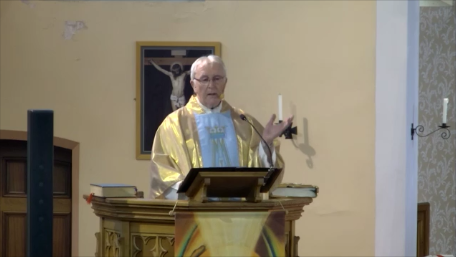
15.09.24 ~ 24th SUNDAY IN ORDINARY TIME
(To hear audio file ~ click here)
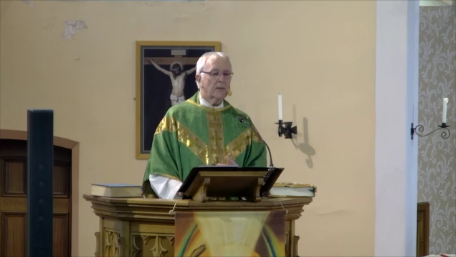
01.09.24 ~ 22nd SUNDAY IN ORDINARY TIME
(To hear audio file ~ click here)
In 1984, as I was just starting a Northern Ireland tour of duty in Omagh, I suffered a TIA, a sort of mini stroke, and was rushed up to Musgrave Park Hospital in a helicopter. After a couple of hours, I felt fine and asked to be taken back to my Unit. But, the Army, being the Army, stood me down for three months while I went for all sorts of tests, in various specialist hospitals. At the Woolwich, the Consultant let two young Army doctors loose on me. They were thrilled because they’d just got hold of a digital vascular imaging machine and wanted to try it out on me. Basically, it fired magnetic dye through the blood vessels and gave an instant read-out of their performance. Everything was fine, so they asked if they could fire some through my heart? “Steady on” I said. But they told me it was safe and would show how my heart was doing. So, I said ok, and it turned out my heart was doing very well.
Today’s scriptures are all about testing the heart, not what makes it tick physically, but spiritually. Just as we take care of our physical heart by not eating too many fatty foods, so we need to keep an eye on what we allow to find their way into our spiritual heart. In the first reading, Moses, the great Law Giver, had instructed the people : “You must add nothing to what I command you, and take nothing from it, but keep the commandments of the Lord your God just as I lay them down for you”. The ten commandments are the heart of the Law. All other laws derive from them. However, over time, the Israelites developed many traditions and customs which, although not part of the Law, came to overshadow its heart. So, by the time Jesus arrived on the scene, the Scribes and Pharisees had the whole Jewish way of life, ruled by external observation of the traditions and customs of the elders, so were not happy with what they were hearing about this new young Rabbi’s attitude.
In today’s gospel, he’s up North in Galilee, and they’re clearly worried, because they’ve come all the way from Jerusalem to see what he’s up to. While everybody else seems to be listening to what he has to say, they are watching what people are doing, noticing that some of his followers were eating with unclean hands, implying that Jesus doesn’t give a fig about the traditions handed down by their elders. Their complaint allows him to emphasise the distinction between man-made rules and the commandments. It’s a clear case of them unable to see the wood for the trees. What he means, is that their refinement of the law into minutiae, governing every aspect of personal and public life, obscures the one essential thing needed in a relationship with God, ie a loving heart. God is not as interested in outward observation, as he is in the way we put our hearts into what we do for him. Anything we do in the practice of our faith, should be an outward expression of the love of God we have in our heart. Otherwise, it can become a false show of piety which masks what we’re truly feeling, which may well be anything but love. That’s why Jesus accuses them with Isaiah’s words to their forefathers: “You honour God only with lip-service, while your hearts are far from him”.
It’s fair to say that over the centuries, the Church itself had developed many customs and traditions that were peripheral to the central heart of Christianity, which is to develop a personal relationship with Christ. But, happily, in the last 60 odd years since the Vatican Council, many of them have been done away with, in order to bring us back to what’s essential, ie that we are in love with a person not a rule book, and that the love we have for God in our hearts, must overflow to how we live our lives outside. “Pure unspoilt Religion, in the eyes of God our Father” St James says, “is coming to the help of orphans and widows when they need it, and keeping oneself uncontaminated by the world.”
For us, then, life is not about prohibitions and laws, but about the exercise of those virtues which come from the heart and draw us ever closer to him who wants all of us to be holy. “You must do what the Word tells you, not just listen to it and deceive yourselves”. As St Augustine says, “Love, and do what you will”. As I said earlier, today’s scriptures invite each of us to undergo a spiritual ECG, a test of the heart, to reveal the truth of who we really are, before God and our neighbour.
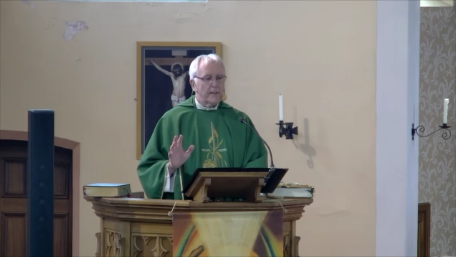
25.08.24 ~ 21st SUNDAY IN ORDINARY TIME
(To hear audio file ~ click here)
As I was reading today’s scriptures, an old song from ‘The Clash’ came into my head. “Should I stay or should I go? If I go there will be trouble, and if I stay it will be double, so you gotta let me know, should I stay or should I go?” Most of us, at some point in our lives, will have reached a crossroads and, as the name suggests, had to make a decision on which way to go. Some may have found it easy, like those people who plunge straight into the cold water of a swimming pool, others take forever, dipping their toe in bit by bit, before committing. Either way, the decision we made will have been a major turning point, and that’s what we’re seeing in the theme of today’s Mass.
Joshua’s challenge, as the Israelites are about to enter the Promised Land, “Choose today whom you wish to serve”, came after a long speech, in which he recalled all that God had done for them. In the history of the Covenant God made with his people, this is a real turning point. The people are free to go or stay. If they go back to worshipping the gods of Egypt or adapt to the gods of the Amorites in the Promised land, it might mean trouble. But, if they stay faithful to the true God of Israel, they will have to live by different values and customs from their contemporaries, which may well cause them double trouble. It’s a tricky one, but their choice is, “We will serve the one Lord, for he is our God”.
In the gospel there’s a major turning point for the followers of Jesus, over 5000 of whom he had fed with five loaves and two fish. Now, they are asked to choose. Will they go or will they stay? Most choose to go. In some ways you can’t blame them. The very idea of eating and drinking the flesh and blood of Jesus is intolerable language. “How could anyone accept it”, they say. Of course, at this stage they have no idea he is talking of the Eucharist, because the Last Supper hasn’t taken place. Nor have the 12 apostles. So, when he asks them, In the face of near total rejection from the huge crowd, “What about you: do you want to go away too?”, he is staking everything on their response. Imagine his relief and the sheer joy of hearing “Lord, to whom shall we go? You have the words of eternal life”. It’s a phenomenal act of faith on their part, because, up to now, they have only had glimpses of who he truly is. Yet it’s enough for them to commit their lives to him.
In today’s second reading, we see another major turning point in life; the commitment to marriage. St Paul says that the union of man and wife is so holy a mystery, that it symbolizes the marriage of Christ and his Church, which is the model put before every engaged couple, as they prepare to make their life-long commitment to their partner. Husband and wife must think less of themselves as individuals and more of each other as a couple. Marriage vows affirm the choice to stay, not to go.
But long before that, the first major turning point in the life of a Christian is Baptism, the beginning of our long journey to the Promised Land of Heaven. It’s the time when you have to decide should I stay or should I go? When I ask parents and godparents, ”Do you promise to bring your child up in the Faith?” they always say yes, which sounds fantastic, like the Israelites promising to serve the one Lord, or the apostles staying with Jesus, because he has the words of eternal life. But, in reality, very few honour their promise to go with Jesus, to take their children on that journey, preferring to stay with the more familiar pagan gods of football, celebrity, fashion or whatever the world has to offer.
“What about you?” is a question Christ asks of all his disciples, in a world which largely rejects the gospel. Like Joshua, he always leaves us free to go, and many do. It’s understandable that people find it easier to blend in with what’s trending on social media, than what the Church teaches. You can like or dislike, not commit to anything, and avoid speaking up for your faith. But that’s not the Christian way. Jesus says, “If anyone declares himself for me in the presence of men, I will declare myself for him in the presence of my Father in heaven. But the one who disowns me before men, I will disown in the presence of my Father”. So, think about that: ask yourself, “Do I stay or do I go?”
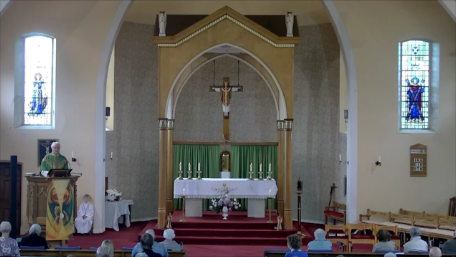
18.08.24 ~ 20th SUNDAY IN ORDINARY TIME
(To hear audio file ~ click here)
On the news this week there was talk of a great breakthrough for the use of British air space. Was it solar powered aircraft or giant helium propelled transport balloons? No – it was Amazon, announcing a fleet of drones which will deliver your order to your door, only one hour after you’ve ordered it. Some may see that as fantastic service and amazing concern for the consumer, but let’s not forget, the more stuff they get rid of, the richer they get. But, what about those addicted to shopping? A lady I once knew used to sit in front of her tele all day ordering stuff, all of which was piled up around her, like the Old Curiosity Shop, lots of parcels not even opened. A man I knew couldn’t resist a Bogof and always ordered the two. Wisdom for Amazon certainly, but is it folly for those who can’t wait?
In the Old Testament, Wisdom is always personified as a woman and, in Proverbs, there is a delightful verse which tells of her role in the Creation. “I was beside the Master Craftsman, delighting him day after day, ever at play in his presence, everywhere on his earth, delighting to be with the children of men”. She is completely wrapped up in the love of God, entranced by his creativity and the beautiful works of his hands. But in today’s extract from Proverbs, there’s another woman, and her name is Folly. She is not quite so impressed with what the Lord has done. Both these ladies invite people to share the food they have prepared. Wisdom has built a house on seven pillars, seven being the sign of perfection, which means she has put down roots and settled among us, as the means to save us from Folly, but, as we know from our own experience, Folly does not give up easily.
I was talking to a young couple planning to get married, the other day, who are very aware that, having been brought up in a consumerist society, they can be easily infected with the desire for instant gratification, which, when taken to extremes, can be summed up as “I want it all, and I want it now”. We talked about how in the old days, people used to wait until they got married before living together. During the courtship, the emphasis would be on preparation for a completely new way of life, the anticipation of which was the spur to work hard and save up, to achieve something worth waiting for. I suspect that the majority of married couples who did it that way round, are still together.
In the letter to the Hebrews, the author says, “For the sake of the joy that lay in the future, Jesus willingly went to the cross”. It’s a rather sobering way of saying some things are worth suffering for. The pain of childbirth is often forgotten when a mother holds her newborn. Olympic athletes would never dream of just turning up on the day and expect to win a medal, without years of training, which often includes injuries and setbacks. Instant gratification doesn’t last. Working through a pain barrier, overcoming obstacles, and persevering in the pursuit of the joy which lies in the future, produces long term results, for ourselves and, like Wisdom, those among whom we live, move and have our being.
In the recent riots, we saw hundreds of people use the murder of three little girls as justification to loot and steal things they would normally have to work to pay for, which was a wicked thing to do, a victory for Folly over Wisdom. 2000 years ago, St Paul wrote “This may be a wicked age, but your lives should redeem it”. How? Slowly and with conviction. For example, St Peter, writing about the dignity of women, based on Our Lord’s teaching on equality, was well aware that their right to be equal partners in a male dominated society, could not change overnight. So, he encouraged them not to draw attention to their outward appearances, but to go quietly on proving their innate dignity as equally beloved children of God our Father, by the way they lived the gospel. In the long term this small but necessary step would change perceptions and overturn the injustice of their situation.
Similarly, in our own time, much injustice and wickedness abound, and our lives should redeem it. We know we can’t do it without the strength of Christ which comes from the food he provides in the Eucharist. “My flesh is real food, and my blood is real drink. He who eats my flesh and drinks my blood lives in me and I live in him”. So, at the risk of being mocked, misunderstood or dismissed as being out of touch, if we try to do our best to live the gospel in the quiet conviction of always having in mind the joy that lies in the future, we might just help to redeem this wicked age.
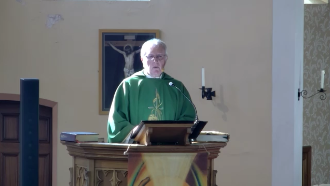
11.08.24 ~ 19th SUNDAY IN ORDINARY TIME
(To hear audio file ~ click here)
Last week, there was a programme on the radio called ‘God Next Door’. It was about a landscape gardener from Wythenshawe called James, who thinks he is God, not a god, or a messenger from God, but the Absolute Divinity, a conviction which is shared by a few locals. His mission is to bring peace to the world using fitness sessions, games and Q&A evenings. He looks and dresses like any other young man of our time but, unless he begins to perform miracles and the kind of things people expect from God, not many will be convinced. I mention James because there’s an echo in him of what we see in today’s gospel. Jesus proclaimed, “I am the bread come down from heaven” but is not accepted, especially by those who’ve known him all his life as the son of Joseph and Mary, simple people like themselves. Other people feel the same: he’s too much like us to have come from heaven,
On Tuesday it was the feast of the Transfiguration. Up till that moment, the apostles saw only what everybody else saw – a man like them, although blessed with extraordinary powers, but now they are given a glimpse of his divinity, manifested in blinding brightness. What’s going on, and why are Moses and Elijah talking about what is to happen? Was Jesus wavering? Was he thinking he’d had enough, knowing that, regardless of the signs given, he will be rejected? Were they there to encourage him to persevere, knowing, from their own experience, how utterly alone he would be, especially in Gethsemane the night before the whole nation turns against him? If they were, it was understandable. Both of them had wanted to give up, Elijah when the people failed to turn back to God, even after his outstanding victory over the prophets of Baal: Moses, when, in spite of leading them out of slavery, they rebelled against God, and started worshipping a golden calf. They’d both had enough, but God made it clear their work wasn’t done. But whatever was said on that mountain, and, although the apostles wanted to stay there for ever, Jesus insisted they must return to the mission field and carry on
I think it’s fair to say that many of us will have, at some time, been tempted by setbacks or ingratitude to throw in the towel. ‘Why do I even bother’, may be a refrain you’ve heard yourself saying. But then, remember that we have accepted the invitation to be Christ’s disciples, and in doing so have accepted all that goes with it which, as with him, can mean rejection, frustration and dispiriting failure. It goes with the territory. But, before we throw in the towel, think about what’s happening in today’s gospel. Jesus says “No-one can come to me unless he is drawn by the Father who sent me”. The fact that we are here today is because the Father has drawn us to Jesus, but we still have a lot to learn. It was the same with the apostles. Although they were very privileged to see his glory on Tabor, they still had a long way to go. For example, when they were ordered to tell no-one about what they’d seen until after he had risen from the dead, they hadn’t a clue what he was talking about and were too frightened to ask. Besides, back down among the people he looked exactly the same as he always did. Slowly, slowly, they were being drawn by the Father to learn more about Jesus and why he had come.
Like them, we too are being slowly drawn by the Father to a deeper union with Christ. How does the Father draw us on? Unsurprisingly, very like an earthly parent. When I was in Carlisle with Fr Gerry, there was a little boy who used to ask his dad questions out loud during Mass. “What’s he doing dad? Is he doing the washing up dad”? Because of the way I held the host up, he thought it was an owl, so when I consumed it, he blurted out, “Dad, he’s eaten it”. In the background I could hear the low rumble of his dad’s voice quietly explaining what was going on. Recently, we had Matt’s lovely view from the pew, reflecting on how he finds the loving power of parish community life, in the safest and most nurturing of environments, to be invaluable to Anna's upbringing in a myriad of ways.
If we look back on our own lives we may see how we have been drawn on by the Father in a similar way. He uses our parents, our teachers, the Church, the scriptures, to teach us to appreciate all Jesus has done for us. We know we won’t see him transfigured in glory in this life but are still happy to experience the intimacy of being in his presence, whenever we receive him in holy communion. All we’re asked to do is trust him, as Elijah, Moses and the apostles did, despite many disappointments and trials, knowing he will continue to draw us to the ultimate goal he wants for all his children: our complete union with Christ forever, in heaven, in the glory of the Blessed Trinity and all the saints.
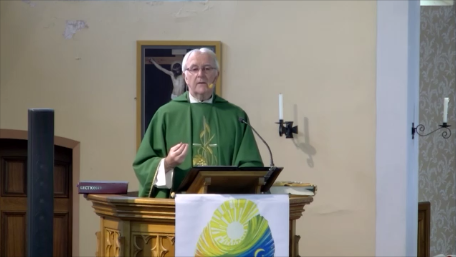
04.08.24 ~ 18th SUNDAY IN ORDINARY TIME
(To hear audio file ~ click here)
Last weekend was a celebration of grandparents, and quite right too, for all the love and care they lavish on their grandchildren. Jim Bellamy told me of a post on Facebook, of a beautiful, fresh-faced child looking at her grandad’s wrinkled face, and asking ‘Grandad, who made you?” “God made me” he said. “Grandad, did God make me too? “Yes, he did Sweetheart”. After a pause, she replied, “He’s getting better, isn’t he”.
Facebook has come up quite a lot in conversation this week, and not because all the posts are as sweet as the one Jim quoted. Several people have told me of nasty posts about the demolition of St Edmunds: “the Pope wants more money; they’ll be building houses there now for illegal immigrants; it’s disgusting – I made my 1st HC there”. When he read that last one, a parishioner said he was tempted to reply, “Well if you’d been coming to St Edmund’s regularly, and brought your children, it might yet still be here”.
Trolling, seeing negativity in everything, and bad-mouthing people you know very little about, is not new. It’s part of original sin and was considered so destructive, that it was included in the ten commandments – “Thou shalt not bear false witness against thy neighbour”. That’s not as eye-catching a commandment as murder, adultery or theft, but malicious gossip is just as lethal. What’s different today is the sheer volume and extent of its malevolence, made possible by unregulated social media, as we saw in Southport earlier in the week and many towns since. Thousands were aroused, by co-ordinated posts, to inflict maximum damage, on police and property, based on the say-so of undocumented agitators, with no possession, or proof, of the facts.
So, how do we Christians deal with it? Firstly, it’s important not to respond in kind. As we see from the escalating conflict in the Middle East, retaliation does no good whatsoever. Besides, we’re supposed to love our enemies. One way is to look at what St Paul’s letter to the Ephesians has to say. He talks about the aimless kind of life that pagans live, and urges us to avoid it; to live as a new man in the goodness and holiness of the truth, as exemplified in Christ: and, how did he deal with the trolls of his day, who caused his death? He asked his Father to forgive them, as they didn’t understand what they were doing. In a similar way, we have to rise above the hatred and vitriol, being spewed out on social media, a) by refusing to join in spreading evil about people: b) if we do decide to respond, to make sure not to assassinate anyone’s character, but simply speak up for the truth. c) to pray for a change of heart in those, who don’t really understand the harm they are causing.
Not helping to fuel the fire may feel like being alone in a hostile desert, but we’re not alone. God will provide. As we saw in Exodus, the Israelites accuse Moses of wanting to starve them to death in a hostile desert, which was certainly not true. But, with the whole community complaining against him, can you imagine how alone he felt? Luckily, there was no internet then, otherwise their complaints would have gone viral. Think of the joy and schadenfreude, their erstwhile Egyptian slave masters, would have derived, from knowing how badly things were going for the Israelites. But Moses wasn’t alone. God provided and the people stopped grumbling, at least for a while. Unfortunately, it wouldn’t be long before they began to grumble again, while taking the Manna for granted. The daily miracle didn’t seem to bring them any closer to God who provided it.
Something similar happens in the gospel. Jesus had fed the 5000 but it’s obvious they hadn’t understood what the miracle is pointing them to. “You’re not looking for me because you have seen the signs, but because you had all the bread you wanted to eat. That bread doesn’t last. You’ll need more tomorrow. Work for food that endures to eternal life”. He means, look beyond worldly needs, to God the source of all life, who is so much greater. Sensing from those words that he has more to offer than just filling empty stomachs, they ask why they should believe in him. His reply is “On me the Father, God himself, has set his seal. I am the Bread which comes down from heaven, for the life of the world. He who comes to me will never hunger or thirst” to which we could add ”for the understanding of the true purpose and meaning of what life is all about”. If we get that, we have the key to dealing with all hatred, internet-based or otherwise.
The whole point of being fed regularly here with the bread of life, is to put Christ at the centre of all we say and do. With him underpinning our own lives, and the way we deal with others, doing our best to keep his two great commandments, ‘Love God and your neighbour as yourself, we’re hardly likely to exercise hatred and cruelty, be it face to face, or as a cowardly keyboard warrior, hiding behind anonymity.
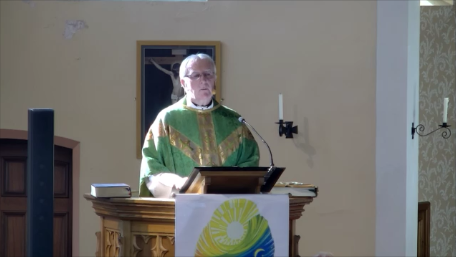
28.07.24 ~ 17th SUNDAY IN ORDINARY TIME
(To hear audio file ~ click here)
On Friday, in spite of a co-ordinated attack on the French railways by saboteurs, we had the opening ceremony of the Olympic Games in Paris. For the next few weeks we will be watching finely-tuned athletes, at the peak of their fitness, competing at the very highest level to be the strongest, highest and fastest. St Paul, who was very familiar with the original Olympic Games, 2000 years ago, often uses images of athletics, as metaphors for the Christian life. As individuals, we must fight the good fight, run the race to the finish and keep the faith, to win a crown that will last forever. But, we’re also members of a team. We are different parts of the Body of Christ which all need each other if it is to function properly. This interconnectedness is vitally important, because it allows us to feed off each other’s gifts and talents, to share what each of us has, for the common good, and for our neighbour, whom we are commanded by Jesus to love as we love ourselves. Today, we see that command put into action by Jesus himself.
A human body needs a sustainable environment to live in, which includes food, warmth and shelter. Jesus picks up on this when he makes the decision to feed those 5000 plus hungry people, stranded without food or shelter in a lonely place. What’s important to note is how he does it. He is well aware, that most of them have followed him to the lakeside, not for himself, but because they’re impressed by his miracles. It would have been so easy to impress them even more, by conjuring up bread and fish from thin air, but that would only have caused even more people to follow him, for all the wrong reasons. Instead, he chooses to teach them how grace builds on nature, that without God we cannot, but without us he will not. So, he decides to feed them with the cooperation of a small boy who’s willing to share the little he has for the common good.
Such generosity, no matter how small, lets God in, and through it, God does what he does best, provides for his people. This is how God works in the world, so if we truly want to be a blessing to others, we should bring to Jesus what we have, because, as we see in this story, in his hands a little goes a long way. By collaborating with the little boy, he prepares the ground for Paul’s teaching, which I mentioned earlier, that the Church is the Body of Christ, in which we all work in partnership with him. If we share with others what we have received, be it our time, talents or treasure, they will multiply and overflow to where they’re needed. We’re all blessed in different ways, so we can’t all offer the same things. God will never ask of us what we haven’t got, but we’ve all got something we can share, no matter how small, and it’s that we should offer.
On Thursday I watched the story of a young man from Cornwall called Chris Parry who, when he saw the plight of the Ukrainian people, unable to flee from the Russian bombardments, went out there to volunteer as an evacuator, driving a jeep to the Front Line, to rescue people, mainly elderly, from their bombed-out homes and take them to safety. He could not speak Ukrainian, had no weapon, no military or medical experience, but felt he had to do something, which he did, often accepting solo assignments to places nobody else was willing to go. This eventually got him killed, shot dead by Wagner mercenaries. He’s credited with bringing out over 400 stranded civilians, in twos and threes, which meant a huge number of journeys into that Hell hole. I don’t know if he was a Christian, although, coincidentally, the name Christopher means Christ Bearer, but what he did was extremely Christlike, giving his life to save others. He generously gave what he could.
Whether Chris was Christian or not, it’s important to remember that Christ died for the whole of humanity, and made it clear that ’He who is not against us is for us’. So, anyone who gives of themselves for others, is a partner of Christ, even if they do not know him. This is shown by what happens after all, presumably Jewish, have been fed. At Cana, Jesus had provided far more wine than was needed, and he does the same with the bread and fish. The apostles fill twelve baskets, one for each of them, but what does it mean to have so much left over?. This clearly wasn’t a litter-picking exercise. The bread will last and provide for those weren’t there: nothing gets wasted. The superabundance means that there’s plenty left for everyone.
Telling the apostles to pick up the pieces, is his way of signifying their future role in distributing the food of everlasting life, the Eucharist, for all those who come later, should they accept his invitation to the banquet. We are those people, blessed to have been included in the leftovers. Over the next few Sundays, we will see Our Lord build on today’s unpromising start, of people just wanting to see miracles, to introduce the concept of his being the living bread, come down from heaven, for the life of the world.
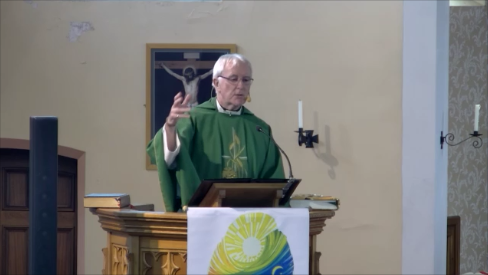
21.07.24 ~ 16th SUNDAY IN ORDINARY TIME
(To hear audio file ~ click here)
Seeing Annie’s note offering to take our petitions to Lourdes, reminded me of a story of a young man from Lancashire, who was in love with two girls, Jane and Maria, and couldn’t make up his mind which one to ask to marry him. So, he went to his parish priest for some advice, who told him to go on pilgrimage to Lourdes and to ask Our Lady. No sooner had he got there, he saw his prayers were answered. Above the Rosary Basilica in huge letters, were the words “Ave Maria”.
Going on pilgrimage, to see the places where and why God has intervened, always leaves us with a deeper appreciation of our faith. Those of us who went to the Holy Land recently, came away greatly enriched by hearing the words of the gospel in the very places they were first spoken by Our Lord. One of them was the Mount of the Beatitudes where Christ fed the 5000 immediately after the events in today’s gospel. The apostles, having been sent out by Christ for their first taste of missionary work, have just returned, bubbling like excited children, bursting to tell him all about their adventures and what they had accomplished. He, in turn, no doubt after congratulating them, sees that they are worn out and need a break from “so many coming and going that they had no time even to eat”. He suggests they go off to a lonely place where they can rest and recover. On arrival a large crowd is waiting for them. On seeing this, Jesus decides to take over, and sets himself to teach the crowd at some length, thus allowing the apostles to maybe get their heads down.
As for the apostles, they must have been pretty impressed to see all these people chasing after them to hear more. Their message had obviously hit home much more powerfully than what they usually heard from their own ‘shepherds’ and rulers, who had allowed the flock of God to be destroyed and scattered. King Herod lived in luxury in a huge palace, courtesy of cosying up to the Roman Forces of Occupation. The Pharisees occupied the Chair of Moses, took the place of honour at banquets and the front seats in the synagogues and so on. ‘Scattered sheep’ from all the surrounding towns, rush to a remote, lonely place, hungry to hear more from the apostles, the true shepherds, Jeremiah prophesied, whom God would raise up for them, when the ‘Virtuous Branch for David, who will reign as a true and wise king” comes. Jesus had sent the apostles out with no earthly resources, no purse, haversack or spare tunic. He insisted that they were to rely on God’s providence, to ensure they did not become self-serving, like the bad shepherds Jeremiah refers to. Their job was to lead people to Jesus, which is exactly what happens in this story, and it is Jesus who satisfies their hunger.
If ever there was a time when the world was full of scattered sheep, it is now, awash as it is with thousands fleeing starvation or persecution, often from their own self-serving leaders, who live in luxury. Self-interest also raises its ugly head in supposed more enlightened Democracies, with people held in thrall to politicians unable to see beyond their own country’s interests, promising anything which they think might be popular, in order to get elected. It’s ironic that a certain country, made up of immigrants from around the world, who took the land from its natives, wants to build a wall to keep other would-be immigrants out, an attitude very similar to that of pro-abortionists who, although having been allowed to be born themselves, deny that basic human right to other babies.
Only Christ, whom Jeremiah calls “The Lord-our-integrity” can sort the mess out, and he needs us, as good shepherds who really care about our fellow human beings, to help him do it. Like the apostles we must point people in his direction, introduce him into ordinary, everyday conversations about the kind of issues I’ve just mentioned. It’s very important that his voice is heard whenever we come across injustice, be it in our own country or on the world stage. Don’t shake your head and feel helpless. Write to your MP. Support protest marches. Don’t worry about what to say – the Holy Spirit will provide, as he did for the Apostles. The mission of the Church doesn’t depend on politics or patriotism. It comes entirely from Christ’s compassion for people with no shepherd and no hope.
14.07.24 ~ 15th SUNDAY IN ORDINARY TIME ~ SEA SUNDAY
I’m sure you all know the one about a rather condescending Mayor visiting an Old Folks’ Home, dressed in all his finery, who asked one of the residents, “Do you know who I am”? He replied, “No, but if you ask Matron, she’ll tell you”. In today’s first reading Amaziah, the high priest of Bethel, is more than condescending to Amos, a lowly shepherd, sent to warn him that God was going to punish the people of Bethel, if they didn’t stop exploiting the poor. He accuses Amaziah of getting into bed with leading politicians and the elite, and benefitting from their patronage, while God’s people starve. Sad to say, that sort of thing has also happened in the Church from time to time, and is even now, as witness the Patriarch of Moscow’s support for Putin’s invasion of Ukraine. Rather than pay heed to the message, Amaziah, decides to attack the messenger, to make it personal, as people do when they feel they’re losing an argument. He dismisses him as a small-time seer, not worthy to be heard in the royal sanctuary, the national temple where the State religion exists to promote loyalty to the status quo. Amos retorts that he has no claim to be a prophet. He’s a simple farmer, given a job to do by God and he must obey God not man. Take it or leave it.
This idea of take it or leave it, is very much at the heart of today’s gospel too. Last week we saw Jesus rejected by his own villagers in Nazareth, as he would be later by most of his contemporaries, but, as I mentioned, he still faced the music and danced. Today we see him involving the apostles for the first time, sending them out to spread his message, but without softening it. “If they refuse to listen, shake off the dust from your feet, and move on”. It’s a direct challenge, and when the apostles return, they report that some did, others didn’t, which it is how it’s meant to be. No-one is forced to follow Christ. Our job as disciples is simply to invite, as Jesus did with the first two apostles: “Come and See”. Of course, that might not be as easy as it sounds.
In the Sunday Times last week there was an article called ‘Help, I’m a people pleaser’. It was all about our fear of upsetting anyone. Examples were, do you automatically say sorry if someone bumps into you and it’s not your fault? Do you outwardly agree with opinions you internally disagree with? Do you say yes to plans when you already feel overloaded? Do you allow someone to call you the wrong name for years? Looking back on my life, I think I may be one. I usually answer the waitress who asks “Is everything all right with the meal?” with “Yes, thank you” even if the steak needs a chainsaw to cut it. I haven’t found the courage yet to ask a friend to turn his phone off when we’re playing golf. However, I did recently tell an elderly man my name is Alf, after he’d been calling me Ged for quite some time, but that was only to spare him ending up like a certain American President. The article went on to say that people pleasers often end up in lopsided friendships, trapped in cycles of endless plans because they can’t work out how to say no without hurting someone’s feelings, or being the one to make all the effort to keep the relationship alive.
Even if we’re not a people pleaser, many of us will feel we are not the right person to introduce people to Christ. If so, we’re in good company. The Apostles, like Amos, were amateurs, and did not have special missionary training. They simply let the Holy Spirit speak through their mouths and act through their hands. We’re amateurs too. Very few of us have been sent by God to proclaim the gospel in far-off lands, in public, on the beach or in the townhall. But all of us, as disciples of Christ, are asked to witness to the gospel in our daily lives, at home, at work or in our neighbourhood, relying totally on the Holy Spirit, to awaken the times we live in, to the mystery of Jesus and his kingdom.
Of course, some might possibly argue from Paul’s letter to the Ephesians today, that we are just pawns in a great cosmic game, predestined to be saved or not as the case may be, and, if that is the case, what’s the point of sharing the good news? But not so. Paul makes it very clear, “God has let us know the mystery of his purpose, the hidden plan he so kindly made in Christ from the beginning. Each, by faith, freely chooses for or against God.”. It’s all there. We don’t have to argue with people or upset them by being too pushy. We simply need to show that our Faith is a natural expression of who we are, the source of our joy. After that, it’s up to them to take it or leave it.
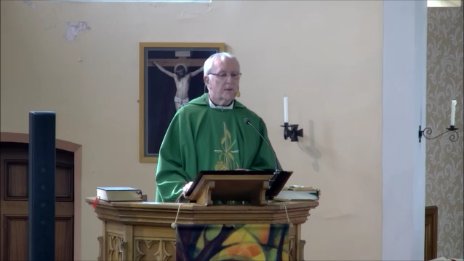
07.07.24 ~ 14th SUNDAY IN ORDINARY TIME
(To hear audio file ~ click here)
“There may be troubles ahead, but while there’s moonlight, music, love and romance, let’s face the music and dance”. Facing the music: we’ve all had to do that from time to time, and it seems to be the theme running through today’s scriptures. All three main characters see troubles ahead, but they all face the music and dance through them. Ezekiel knows his mission to the rebel Israelites will be ignored but goes anyway. Paul is inhibited by a thorn in the flesh, but soldiers on regardless. Jesus knows he was predicted to be a sign of contradiction but still begins his mission. All three are aware that they did not choose their mission: God chose it for them, which means that, no matter if people listen or not, his messengers must be faithful and speak the words God wants his people to hear.
You might wonder in the face of such opposition why God would bother. It’s because he never waivers in his love for us, and will never abandon the covenant he has made with us, even if we do. He’s like Gabriel Oak in ‘Far from the Madding Crowd’ who never gives up on Bathsheba Everdene, who leads him a merry song and dance, before he finally wins her heart when she comes to realise how loyal and faithful he has remained, in spite of her cavalier treatment and ingratitude.
As Christians, like St Paul, we are called to continue Christ’s mission to win people back for God, even when obstacles, such as people’s desire to be constantly entertained, overcome the need for serious conversation. I had ten minutes to spare before the 10pm news on Thursday, which was due to start with the Exit polls for the general election. So, I flicked through the channels and landed on Love Island, which I’ve heard a lot about but never watched. For 5 minutes I watched a muscle-toned hunk, trying to decide which pneumatically endowed goddess he would select, from a harem draped around the pool. I don’t know how it ended as I soon lost the will to live. Some of you may feel the same about football. But, I wondered to myself, if the millions of people who watch it, think that’s real life. Like a lot of “Reality TV”, a misnoma if ever I heard one, it has echoes of ‘Bread and Circuses’, the method used by the ancient Romans, to keep the people happy, and divert their attention from having anything to do with the things that really matter. In our day, the things that really matter are climate change, social justice, an end to so many conflicts, and equal distribution of the world’s resources, none of which will happen if people ignore God, which, with so many diversions, is easy to do.
This isn’t something new: we’re not unique. It has always been like this. People don’t change. Every generation since time began, has had people who ignore God. But because, as I said earlier, he will never give up on us, he continuous to send messengers to call them back, and we just happen to be his messengers at this time in history. Some of you might think, “I couldn’t possibly do that. I’m not good enough, clever enough or brave enough”. But, without the power of the Holy Spirit, nor were any of those prophets God sent in earlier times. Remember, the Holy Spirit’s still here: he hasn’t gone on holiday. So, we shouldn’t be held back by thinking no-one will listen to us. Whether people listen or not is up to them, but they should know, as God said to Ezekiel, that there is a prophet among them, ie someone who lives his/her life in the presence of the living God, and is happy to make him known..
Being a modern-day prophet can take many forms. As you know, in our secular society, a culture of death is slowly creeping in as a panacea for all social ills. MPs have proposed assisted dying, not just for the terminally ill, but for anyone fed up with life. They also want abortion up to birth, not just for medical reasons, but to make it virtually on demand. In contrast to such negative thinking, at 17yr old Summer Atkinson’s funeral on Thursday, her mum, Stacey, proclaimed, to a largely non-church-going congregation, that she felt truly blessed to have been entrusted by God with the precious life of her disabled child. It was a powerful counter-cultural statement, from an ordinary person, about the sanctity of human life in whatever form it comes to us. People may or may not have agreed with her, but at least they heard the word of God from a prophet among them. My prayer is that whatever troubles come our way, personally, or as Christians called to be light to the world, and salt to the earth, on the things that really matter, all of us will face the music and dance, as followers of Jesus, the Lord of the Dance himself, “who has leapt up high and will never, never die”.
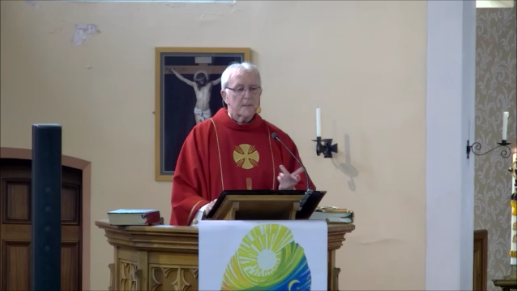
30.06.24 ~ FEAST OF SAINTS PETER & PAUL
(To hear audio file ~ click here)
On Wednesday I had to make a difficult choice, whether to watch the leadership debate between Rishi Sunak and Keir Starmer, or Georgia v Portugal in the Euros. It was quite difficult, but after about ten seconds I chose the football. However, I caught the highlights of the debate later, one of which was a man asking both leaders “Of all the people in this great country of ours, are you two really the best we’ve got?” It’s a question many people in America are asking about Joe Biden and Donald Trump. Today we are celebrating the feast of St Peter and Paul. Had they been subject to a leadership contest, would the early Christians have asked the same question? Luckily for them, their leadership was by divine appointment, so the question didn’t arise, but we’re still entitled to ask “What did Jesus see in them which led him to entrust them with the continuation of his work?
Peter was physically strong, a man used to hauling heavy fishing nets. He also had a stubborn streak, unwilling to have his feet washed by Christ, and an overinflated idea of his own courage, begging Jesus to let him walk on the water, and bragging that, should all the others desert him, he would certainly not. Well, we all know what happened there. Paul was mentally strong, very clever, well educated, with powerful connections, filled with fanatical zeal and ready to destroy Christianity before it really got going. As we know, he got his comeuppance on the road to Damascus and had to eat humble pie. Even after such a dramatic conversion, though, his character didn’t really change. He had his own way of doing things, could be impatient and didn’t suffer fools gladly. You wouldn’t call him a romantic, and yet he wrote that great hymn to love which thousands choose for their wedding. But it’s no surprise that his version of love is not the sloppy sentimental kind, but real self-sacrificing giving of oneself – the nitty gritty of patience, kindness, not taking offence, lack of envy etc.
Both Peter and Paul, in their respective apostolates, brought to fruition the kingdom Christ came to inaugurate on earth, to which we are proud to belong, and, like them, we are called to do the same. So, how did they do it? Clearly, they were both independently minded characters, but, by submitting their own wills to Christ’s, and their openness to the inspiration of the Holy Spirit, these two unlikely characters made it clear, that God can, and does, use all sorts of people, some we’d never have thought capable, to do his work, and often with spectacular results. He asks for neither strength nor willpower: only love. Don’t forget he calls and empowers whoever he likes. No matter how poorly equipped, lacking in talent or sinful we consider ourselves to be, he can do wonderful things through anyone who answers the call. As Paul says, “It is the Lord who stands by me and gives me power”.
Going back to the election, we are promised many beneficial things which we are assured will be fully costed and easy to deliver, as though politicians think we’re only interested in what we can get. But the gospel teaches us to think the opposite, paraphrasing JFK’s inaugural address “My fellow citizens, ask not what your country can do for you, but what you can do for your country” a sentiment taken directly from Catholic Social Teaching, which is all about service to the Common Good. So, what can Christians do for the common good, at this particular time of general malaise and dire political woes? A parishioner told me the other day, that a lady she works with is intrigued by what Christianity has to offer, to a world she’s completely disillusioned with, as it seems to have no purpose besides birth, a meaningless life, then death. I suspect she’s not the only one. In the Post Office a lady expressed concern about so many young people dying? Have they no reason to live?
With all this searching for meaning and purpose going on, I think the time is right, to help people by sharing our gift of faith in a completely natural way, making our relationship with Jesus a normal part of conversation. We don’t have to give the whole church package. We can simply say something like, “I find my faith in Jesus helps me to deal with most things” then leave it to the Holy Spirit to do his thing. In this simple way we can actively get the gospel message of Hope out there. We know the influence of the Church is not as great as it used to be, but we also know from experience, reassured by Christ’s promise to Peter, that “The gates of Hell will never prevail against it". So, let’s continue to fight the good fight, run the race to the finish, keep the faith, and share it with those who need it most.
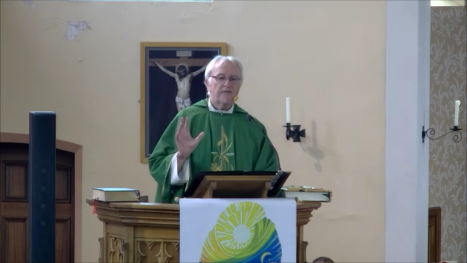
23.06.24 ~ 12th SUNDAY IN ORDINARY TIME
(To hear audio file ~ click here)
When I was studying for the Priesthood at Valladolid 50 years ago in Spain, there were quite a few protest rallies against the UK for the return of Gibraltar. On one particular day, a huge crowd was demonstrating outside the British Embassy in Madrid, banging drums, blowing whistles and generally causing mayhem, all of which caused the Ambassador to go down to the gates to talk to the crowd. When it had finally stopped shouting “We want Gibraltar”, he calmly replied, “Well it isn’t in here, you know”, at which many of the protesters burst out laughing. The passionate Spaniards thought his cool, understated reply was hilarious, and it completely defused the situation.
To be able to keep a cool head, when all around there’s chaos, fear or panic, and restore calm, is a wonderful gift, something Jesus had in spades, as we know from his many clashes with the Pharisees, when to have lost his cool, could have landed him in big trouble, long before they finally had him killed. In today’s gospel we see calmness personified. To put it into context, Jesus had been teaching all day at the lakeside, and because so many people had come to listen to him, he had got into the boat and pushed out a bit so they could all see and hear him. This also allowed him to avoid being mobbed by the crowd when he’d finished, and to get some sleep which he clearly needed. Then came the storm, which terrified the apostles and panicked them into waking Jesus, who calmy defused the situation, before giving them a gentle ticking off for their lack of faith in him.
When Mark wrote his gospel, 30 years or so after the Resurrection, it was during the Emperor Nero’s persecution of Christianity, which was terrifying. It was one of the many storms the early Church would go through, and, by reminding his readers of what happened on the Sea of Galilee, Mark was exhorting them to have faith in Jesus, who is always there, even when he seems to be asleep
But, there’s another side to the story. As we saw, preaching all day to his own people had exhausted him, and yet he says, “Let’s cross over to the other side”. The other side was pagan territory, which was a lot tougher proposition. So, was Jesus deliberately giving them a hint of what he would charge them with at the Ascension, “Go therefore, make disciples of all nations”? And was the storm at sea a lesson that, in order to go to the pagans, they would have to leave the calm waters of what they were used to, and brave the gales and waves of uncertainty, trusting only in him whom the sea and wind obey? It seems to me that in every era of our Church history, that’s precisely what he was doing.
And so we come to our own times. As I said last week, I truly believe God is doing a new thing and he wants us to be part of it. Our Church storm today is indifference and apathy. It’s not really a storm. We are not being persecuted. Nobody outside of our parishes is really bothered about falling numbers, or whether our church will close. So, there’s no pressure. We are completely free to take risks, and we should, because there’s an awful lot of people looking for something, other than consumerism, to give their life meaning, especially young people aged 15-25, among whom, we are told, there is a growing interest in Catholicism. So, don’t be risk averse. One of the speakers at the Catholic Summit last week said he just introduces people to the unfiltered Jesus, and lets the Holy Spirit do the rest. He meant that when we first share the Gospel, we don’t have to give them the whole Church package. As we heard earlier, the apostles took Jesus in the boat ‘just as he was’ with no frills, and that’s how they presented him to others, who in time, would be given the grace to look at this man but also see God.
Using today’s image of the sea again, lots of fish swim past the harbour mouth, but none are caught if the boats stay tied up in the harbour. Lots of people pass our churches every day but won’t come in if not invited. Why not risk inviting someone? If they say no, you’ve lost nothing. If they say yes, who knows where the Holy Spirit may lead? Don’t forget, these days conversations on exciting things go viral very quickly. As Cathy Anderton wrote in her reflections on the Summit, “We can sit in our pews which we have sat in for years, and continue to watch our parishes get smaller and smaller, and our churches close, or we can get out there and turn back the tide. It’s not going to be easy, but then, things worth having don’t often come easily. With the Holy Spirit, we know anything is possible.
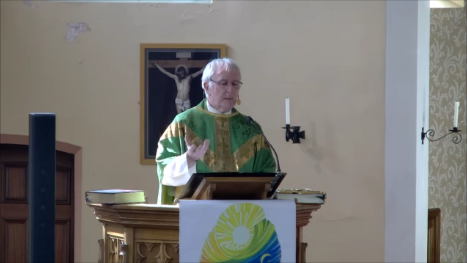
16.06.24 ~ 11th SUNDAY IN ORDINARY TIME
(To hear audio file ~ click here)
Frozen or Chosen? You may have heard in the news recently that the tiny Austrian village of Halstatt, is being swamped by up to 10,000 tourists every day, because it’s believed to be the model for the Disney film ‘Frozen’. The two hundred villagers have had enough and are going to put a stop to it. No-one buys anything or stays over. They just take selfies and drive on, a bit like people who take a photo of a priceless artwork instead of spending time to appreciate it. You may also have heard of the phenomenal worldwide success of ‘The Chosen’, a beautiful series on the life of Christ, which you can watch free on the Angel App. Very few people who watch it simply move on without taking in the profound message it portrays. So, are you a ‘Frozen’ or ‘Chosen’ when it comes to our Catholic faith?
The reason I ask is because, with four of our parishioners, I have just got back from the national Catholic Parish Summit, which was all about mission, based on the fact that, in the gospels, Jesus spent 75% of his time evangelising, and we are meant to do the same. Having said that, I’m going to drop the word evangelise, because for us Catholics, it conjures up the image of Jehovah’s Witnesses or Mormons, knocking on doors, interrupting your tea, the Euros or Coronation Street.
I prefer to talk about generously allowing ourselves to be used by the Holy Spirit to tell people, who know nothing about Jesus, the good news, when the occasion arises. Oh good, you might think. That’s not likely to happen very much! And it won’t if you are not generous about sharing the faith, which requires action, going fishing, not sitting in the boat hoping the fish will simply jump in. One of the inspirational speakers told how every morning she prays, “Lord, bring me someone today who I can share you with”. She then applies VIA. Vigilance to spot someone in need. Initiative to start the conversation. Action to help in whatever way the Holy Spirit guides her. I prayed that prayer myself yesterday, and something wonderful happened, which I hope will bear fruit in the next few weeks.
The reason we went to the Summit is because we are realists. We have accepted the fact that cultural Christianity is dead and gone in our country, and even in our own parishes. Most people coming for baptism or 1st Holy Communion are like the Frozen fans. They don’t join in the life of the parish or come back after the photos. The lapsed are hardly likely to come back to the type of church they have chosen to leave. So, it’s time for change, and I personally believe that God is doing a new thing.
Rather than a dead post Christian era, we are entering a new pre-Christian era, in which thousands will be hearing the gospel for the first time, and it’s our privilege to share it with them. For those who think we’re ok as we are, there’s no need to do more, it’s the difference between working in the parish and on the parish. If we want to simply grow old and fade away, we don’t need to do anything at all. It will happen because, each year, we all get a year older. But, if we decide we want to go down and out, ie to lower the average age of our congregation, and boost it with new people who have not heard the gospel, then we have to be church in a different way in this new apostolic age.
The lead speaker showed us a slide of an archipelago in the Caribbean of which only five or six islands are still above water. Most of the Islanders have gone, but the Mayor and 12 others are determined to stay, making the stilts of their houses ever taller. Soon they will be no more. In our secular society, so many are in the similar danger of being swamped by the rising tide of materialism, addiction, mental health problems, cost of living crisis and the rest. They need rescuing by the Holy Spirit’s lifeboat, in which we are all crew members, working together, to haul aboard those who are drowning. So, it’s time to start taking risks and put out into the deep for a catch.
With that in mind, I’d like to call a meeting of as many members of our two parishes as possible to create a clear vision for the way ahead. The point is that evangelisation is the work of the Holy Spirit. So be not afraid. All we have to do, is make ourselves available to be used by him, which means we don’t have to fret over success or failure, as though we stand or fall by our own efforts. Like the guy in today’s gospel, we simply do the sowing. God does the rest. It’s like conception, which starts a long, sometimes painful, process to birth, but when it finally comes, everyone wants to hold the baby.
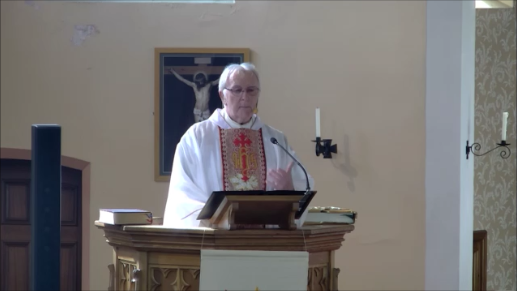
02.06.24 ~ CORPUS CHRISTI
(To hear audio file ~ click here)
Yesterday we celebrated the feast of St Justin, Martyr, who was a Palestinian Christian murdered for the Faith in the second century. He had been an unbeliever searching for the meaning of life, when he met an old man who told him he would find it in the Christian Faith, and he did. His life’s work then became to teach and spread the gospel as much as he could by founding a school, to which hundreds of people came over the years. This caused a great deal of jealousy among the pagans, and they contrived to have him executed as an enemy of the gods. Two of the books he wrote survive, one of which, his Apologia, written about 154 AD, says this about the Mass: (Quote from Chapter 65, “Administration of the Sacraments”).
Although the nucleus of the Mass has remained constant, the liturgical form has changed many times depending on circumstances. We are all familiar with Mass celebrated in parish churches as well as by thousands in football stadia, or in small gatherings in hospital chapels, schools, prisons, or on a kitchen table. The variety of ways in which Mass is celebrated, represents the infinite variety of tastes and traditions from all over the world. But whatever the style or nation, what unites Catholics throughout the world, is the real presence of Christ in the Eucharist, which is what today’s feast is all about. The Eucharist is the source and summit of Catholic life, and throughout our history many thousands, like St Justin, have given their lives for it.
One of the most recent to do so, although he wasn’t martyred, was Blessed, soon to be Saint, Carlo Acutis, a 15 yr old computer Whizz, who died of Leukaemia in 2006. He saw the internet as a missionary tool for spreading the gospel. While investigating his cause for beatification, his computer was analysed by forensic technicians to see what websites he visited. There was no pornography, trolling on social media or anything malign. All his research was done for what was very close to his heart, Jesus really present in the Eucharist. He was very concerned by people growing away from the Church and the sacraments and wanted to bring them back. In 2004, he created a website, visited by millions, detailing all the Eucharistic miracles, recognised by the Church, from early Christianity to our own time. Most occurred because of unbelief, even by priests and bishops, as well as a woman who couldn’t believe the bread she had made could become the Body of Christ. For these doubters, blood flowed from the host at the consecration.
Carlo was born in England but brought up in Italy.. His mum never went to Mass before he was born, but his faith and persistent questions brought her back. An Indian Brahmin who worked for the family, after many talks with Carlo about Christianity, asked to be baptised and was followed by his friend and his friend’s mother. Perhaps he was sent to our modern world to help rebuild God’s church, as his favourite Saint, Francis of Assisi, did. It’s true our Church is crumbling, as people turn elsewhere to football or celebrity worship. Eg, next week, the Taylor Swift Juggernaut comes to the UK for a series of sell-out concerts which will make millions. Many of her songs are autobiographical, dealing with her break-ups, which her legion of Swifties will enjoy, but will they be inspired by those songs to do something great with their lives? One day, as musical tastes change, Swifty will swiftly be gone. When she has, will fans just follow the crowd onto the next big thing? Carlo used to say, “We’re all born originals, but many of us die as photocopies”.
Carlo, however, will be forever inspirational, because he is now a saint, someone for all of us, especially young people, to look up to. By using his computer skills, while remaining an ordinary teenager, who loved fashion, gaming and Italian car design, to bring others back to Jesus in the Eucharist, he joins other young saints like Bernadette, Dominic Savio and, more recently, Akash Bashir, a young Pakistani, killed while preventing a suicide bomber entering his parish church. May all these young saints inspire us to a deeper love for Our Lord in the Blessed Sacrament.
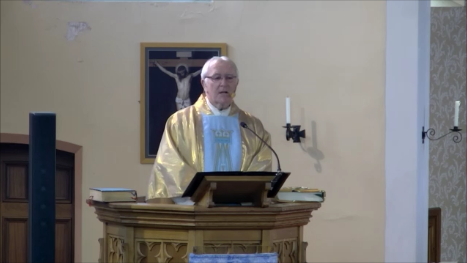
26.05.24 ~ TRINITY SUNDAY
(To hear audio file ~ click here)
Before every exam at College, we used to write AMDG (For the greater glory of God), then start with the sign of the cross. When you see so many footballers making the sign of the cross, is it fanciful to think that many of them, especially the Catholics, are giving glory to God for their talent? In his fight with Tyson Fury, Oleksander Usek did it before each round. Catholics are recognisable by the sign of the cross, and like so many of our signs and symbols in the Church, it is a profession of faith. It shows to anyone watching that we believe in the Blessed Trinity, Father, Son and Holy Spirit, the fundamental mystery of the Christian faith, which underpins everything we believe and do
The mystery of there being three persons in one God, has exercised the minds of many great thinkers throughout history, but no-one has solved it, precisely because it is a mystery. Even an intellectual giant like St Augustine had to admit defeat, after a dream he had of a young boy trying to empty the sea into a hole on the beach. He told the boy what he was trying to do was impossible. The boy replied that so was what he was trying to do in solving the mystery of the Trinity. So, the conclusion reached by most spiritual writers, is that the mystery of the Trinity is understood more easily with the heart than the mind. The Trinity is Pure Love. The Father is the Lover, the Son is the Loved, and the Spirit is the Personification of the love between them.
There have been lots of good ideas over the years to help us understand the life of the Trinity, and how it is possible to be three in one: St Patrick’s use of three distinct leaves which nevertheless form only one shamrock. St Cyril of Alexandria’s use of only one sun but with light and heat, each distinct with their own roles to play. St John Damascene’s spring, river and sea, three distinct roles but all the one nature of water. He also has root, branch and fruit, but all forming the substance of only one tree.
However, all these descriptions, although helpful to us, don’t really solve the mystery.
The only reason we know there are three persons in one God, is because Jesus told us. In doing so, he was building on what had gradually been revealed of the nature of God in the Hebrew Scriptures over 2000 years. In the first reading the Chosen people are about to enter the Promised Land where they will be surrounded by many exotic, colourful and tempting religions, based on idol worship. So, Moses makes it very clear to them that they should never forget there is only one God. “Understand this today and take it to heart: the Lord is God indeed, in heaven above as on earth below, he and no other”. They accept what Moses says but, over the centuries, realise that, although God is only, he is never lonely, because he is in constant dialogue with them, through his word and the signs he gives.
Jesus completes the revelation, when he unveils himself as the Son of God and gives us the Holy Spirit, which sets up our personal relationship with God the Father. As St Paul says, “Everyone moved by the Spirit is a son of God, so we are God’s heirs and coheirs with Christ”. Our God is not cold or distant, or a riddle to be solved, but is the love which beats in the very heart of all of us and needs to be recognised in each person we meet. As we’ve seen from the examples above, the three persons of the Trinity do not act separately, but it can be helpful to our prayer life, if we think of the Father as Provider, who created us out of love, keeps us in being, and wants us to know him, love him and serve him in this world, so as to be happy with him for ever in the next: the Son as Saviour, who lived, died and rose again, to make that possible: the Holy Spirit as Comforter and Sanctifier, who gives us the strength and guidance to face the challenges of life, remembering Jesus’ last words to the apostles in today’s gospel, “And know I am with you always; yes till the end of time”..
With that power, may we try to live for the greater honour and glory of God, the salvation of souls, and our own personal sanctification, and may the grace of Our Lord Jeus Christ, the love of God the Father and the fellowship of the Holy Spirit, be with us all now and forever. Amen.
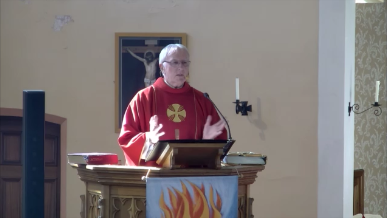
19.05.24 ~ PENTECOST SUNDAY
(To hear audio file ~ click here)
Water is very much in the news at the moment. You’re not allowed to swim in the Thames in case you catch a disease. Lake Windermere has had 3000 tons of raw sewage accidently pumped into it. Devon’s water supply is contaminated. Blackpool’s might be too. In many other parts of the world there is drought. Mexico City, which was built surrounded by water, has now almost dried up. If only we could ship them some of ours – we’re never short of rain in Fleetwood!
Water is essential. Without it there can be no life. So, it’s no surprise that the action of God’s life-giving Spirit, is often represented by the image of rain, which, as the prophet Isaiah says, never returns to heaven, without first watering the earth, and causing everything it touches to grow. Every single blade of grass, every plant or tree, with its distinct life form, is enabled to grow and flourish by the outpouring of water, and each of them has something unique to offer to the eco system of our common home. In the same way the grace of the Holy Spirit is poured out on each of us individually, so that we may grow, flourish and, through the use of our unique talents, contribute to the building up of the Body of Christ, and the spread of the gospel, which is what this great feast is all about.
Before his ascension Jesus bequeathed us two things, a promise and a request. His promise was that to all who follow him he would give the gift of eternal life. His request was that we should “go out to the whole world and proclaim the good news to all creation”. While the promise is very comforting, the carrying out of his request can seem very daunting. But is it? At Pentecost, the Holy Spirit turned a group of hesitant, frightened disciples, into fearless missionaries who spoke that day to thousands of foreigners, as well as to people they lived and worked with and saw every day. When persecution started in Jerusalem, far from being cowed or discouraged, they set off to evangelise in other regions, relying solely on the power of Christ’s spirit within them.
Apart from the power of their preaching, what really impressed people, was they set up teams to deal with orphans, widows, the poor and those who had nothing. They were living proof of faith and good works working together. So, from the earliest days of the Church we learn that there are many ways of proclaiming the good news. Not everybody can get up on a soapbox and preach, as the Apostles did, but none of us should ever be afraid to proclaim our faith. It’s equally important for people to see how well we look after each other, and what we contribute to the common good. As Jesus says, “It is to the glory of my Father that you should bear much fruit, and then you will be my disciples”.
Our Church is changing, as it has had to do many times over the centuries, but the mission remains the same. The most obvious change, as we have now come to experience here in Fleetwood, is the lack of priests. Clearly, the Holy Spirit is doing a new thing, bringing to the fore the Lay Apostolate, and taking us down the route of collaborative ministry, which means priest and people working together as equal partners, each one of us using the gifts and talents we have been blessed with, to proclaim the faith and keep it alive. As a living cell of the Body of Christ, each of us must know what spiritual, physical, natural gifts or acquired skills we have to offer to the Common Good, then put them into action, either here in the parish or out in the community. There are as many ways to exercise our baptismal commitment as there are people; you can be a hospital visitor, Foodbank volunteer, help slow readers at school, drive someone to Mass, run an Alpha course or prayer group, foster a child, support unchurched parents seeking baptism, be a welcoming face to visitors. If we all chip in together, we will become like a well-oiled machine, producing much fruit for the glory of our Father. Let us ask the Holy Spirit to fan into a flame the kind of Christian action which proclaims the good news, that Jesus is still very much alive and has much to offer to our self-indulgent world. As Paul says, “What the Spirit brings is very different: love, joy, peace, patience, kindness, goodness, trustfulness, gentleness and self-control. Since the Spirit is our life, let us be directed by the Spirit”.
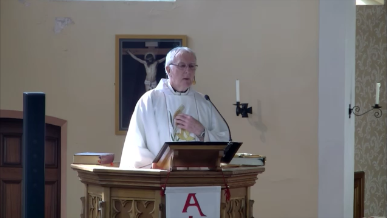
12.05.24 ~ 7th SUNDAY OF EASTER
(To hear audio file ~ click here)
Today most Catholics are aware of the image of the Divine Mercy with rays of light coming from Jesus’ outstretched hands. Back in the 80s not so. A priest friend of mine was shown a holy picture of it, and the lady asked him which saint it was. He hadn’t a clue, so he said, “Oh, That’s St Lazer”. His bluff reminded me of our Maundy Thursday washing of the feet this year. George could only get 11 instead of the normal 12. One of my friends watching on live stream thought it was very clever of us to leave Judas’ chair empty signifying he had already gone out. I must confess I was tempted to accept his compliments, but I knew that if he read St John’s account he’d be able to call my bluff.
What actually happened was that after the Ascension, the eleven remaining apostles, with a good number of disciples, went back to the upper room to pray, as they awaited the gift of the Holy Spirit, which Jesus had promised. As they prayed it became clear that they needed to replace Judas. They needed to be twelve again. Twelve was a mystical number in Hebrew history. There had been twelve tribes of Israel. Now, there were to be twelve foundation stones for the Church. Twelve, like three or seven, denoted perfection. It denoted strength and unity.
All of us probably know the ancient story of the Carthaginian general whose men were terrified of going into battle against the all-conquering, all-powerful Romans. He simply took a bundle of sticks and asked a soldier to break them. The soldier couldn’t. The general untied the sticks and gave them to the soldier one by one, and they broke easily. He taught his men that as individuals they were indeed weak, but that together they were strong and would not break so easily. The apostles, then, needed to be complete as a body for the beginning of their mission, and that’s why Christ prayed at the last supper, “Holy Father, keep them in my name, that they may be one as we are one”. The apostles’ strength was to lie in their unity based on Christ. Christ must be the centre of unity for our world too.
In recent years, there have been lots of behavioural studies done on humans. Perhaps the most famous was “The Naked Ape”, by Desmond Morris. Some of them don’t show us in too good a light. We war and fight like wild animals. The truth is that, at any given moment, somewhere in the world, human beings are trying to kill other human beings. We consider ourselves a civilised country, but even here our children roam the streets, like feral cats, angry and spoiling for a fight, or to inflict damage on people or property. It’s not so long ago that the Police offered an amnesty to people if they handed in their knives, and now they are offering another one, in the light of a number of stabbings, not to mention a yoUng man in Liverpool having a hatchet buried in his head, simply because he was the “wrong” colour.
People are saying that there is a moral vacuum in society today. There is grave danger of disintegration into relativism, where anything goes. We believe, and anybody with any sense can see, that the Gospel is the answer. The Christian way of life can and does fill that vacuum, with the inspiration to live with one another in unity and love. By ourselves we are not capable of freeing ourselves from our aggressive characteristics. We need to go outside ourselves to find release. Today’s gospel shows us how that release comes by unifying ourselves with Christ, whose human nature, allied to his divine nature, is perfection itself.
A few weeks ago, Christ used the metaphor of himself as the Vine, and us as the branches. Like the Carthaginian General’s sticks, we are weak and unproductive on our own, but grafted onto Christ, and living with his strength within us, then we have immense strength and power to take the battle for goodness to our streets.
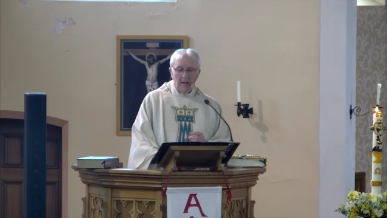
05.05.24 ~ 6th SUNDAY OF EASTER
(To hear audio file ~ click here)
Over the last couple of Sundays, we have had Our Lord revealing to his disciples the mystery of their union with him. I am the Good Shepherd, you are the sheep. I am the vine, you are the branches. And today, he reminds us that we didn’t choose him: he chose us. So, it’s very clear to see who’s in control. There are two ways of looking at control; one evokes the image of power, being in command, dictating the play. In a war situation, if you want to beat the enemy, the first thing to do, is destroy their command-and-control structure. Without it there can be no co-ordination, which causes chaos, especially among isolated Units. The other way to see control, is as a benign force for good, such as crowd control at huge public events, to keep people safe. It’s the benign sort we are looking at today. Although Our Lord is exercising control, by giving us a commandment, it’s very much for our good.
The other day, a Sociologist was talking about the huge rise in mental health problems, especially amongst the young, often caused through feelings of loneliness, made even worse because of Covid, when they were in isolation for such a long time, relying on virtual friends via the internet, in place of physical interaction with their real friends. Her solution was to supply millions of pounds to fund psychiatric help. Coincidentally, on the same day, I read an article by a bishop, who suggested that a solution to so many of our contemporary problems, would be to bring God back into public life, and, at Bible share the other night, we felt the same. The problem with that idea, I suspect, is that most of our contemporaries, who may never have read the Bible, have a preconceived, fixed idea of God as being irrelevant to real life. And yet, if they were to read the gospels, with an open mind, they would see just how relevant they are, in dealing with most of the problems we human beings face. That, apparently, is what has just happened to Russell Brand, who got baptised last Sunday, then told his millions of fans, how it has delivered the tranquillity and peace he has been looking for all his life.
How many more lost souls are looking for tranquillity and peace, and how do they know where to get it? Russell Brand’s wife is Catholic, so perhaps it was her example that did the trick. Who knows? We’re Catholics. So, in a world crying out for purpose and meaning, we need to be talking up our faith, at every opportunity. As St Paul says in his letter to the Romans, "How can they call on him to save them unless they believe in him? And how can they believe in him if they have never heard about him? And how can they hear about him unless someone tells them? So, tell them. Encourage your friends and acquaintances to give the gospel a try; maybe even invite them to come to Mass with you, to hear God’s word and mix with lots of people who clearly do treasure the faith, as a source of peace and tranquillity, especially when it comes to bereavement, serious illness or depression. Because faith underpins everything we do, it helps us to see things sub specie aeternitatis, in the light of eternity. So, get the good news out there. Talk openly and fearlessly about our faith. You may save someone’s life.
And what about the lapsed? I once attended a talk where the keynote speaker said that the biggest cause of lapsation is ‘material cholesterol’. Consumerism so clogs up the arteries of grace, that the Christian perspective on morals, sex, justice, money and just about everything else is lost and, without it, they leave the Church. Objective morality is either forgotten or overruled, in favour of individual choice. People like to be in control of their own lives.
To us who have the faith, it’s pretty obvious that to give Jesus control of our lives, doesn’t mean that we will be spared contemporary problems, but it does mean we have the tools to deal with them, the greatest of which is today’s commandment: “Love one another as I have loved you”. A child learns love by being loved, and to be deprived of love can be devastating, as we have seen in recent cases of children fatally abused by their parents. For a child to be loved is the best feeling in the world, and it’s the same for God’s children. St John says, ‘The love I’m talking about is not our love for God, but God’s love for us. We have been loved into existence by our Father and nourished by the love of his Son. Because we have been loved first, we learn to love others, whoever they are. By sharing our faith and telling of his never-ending love for them, we can help to bring some of our Father’s estranged children safely home to him. We can also give them the key to finding tranquillity and peace.
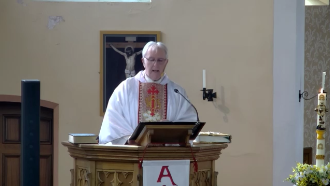 28.04.24 ~ 5th SUNDAY OF EASTER
28.04.24 ~ 5th SUNDAY OF EASTER
(To hear audio file ~ click here)
In my first parish, we were four priests. At the Good Friday Liturgy, when it was time for Holy communion, the key of the Lady Chapel tabernacle broke in the lock and none of us could open it. The church was packed, everyone wondering what we were going to do next, as were we, by the way. Then, quite unexpectedly a man, unknown to any of us, slipped into the chapel and reappeared seconds later having opened it. As we were close to the prison, we wondered if he may have been a recently released safe-cracker! It's not unusual for God to use unusual suspects to sort his Church out
One of his most surprising chosen instruments was Saul, later known as Paul. Today, we see him trying to join the apostles, but they can’t believe he really is a disciple, and are afraid of him, with good reason. The last time he was in Jerusalem, he was part of the gang who had stoned Stephen to death, then had left, breathing fire and threatening to annihilate any Christians he could find. But, thanks to Barnabas, they accepted that Paul had changed, and were able to see it for themselves, by the way he started to go round with them in Jerusalem, preaching fearlessly in the name of Jesus.
Although Paul’s conversion was pretty spectacular, his subsequent missionary life was not all plain sailing. He was constantly reminded by Jesus that, in spite of his amazing achievements, like all of us, he was merely a vine branch which needed to be pruned regularly in order to bear much fruit.
When Jesus used the image of the vine, with the need for regular pruning, he was very conscious that it had been used before, deep in the history of Israel, to express God's displeasure with their ingratitude and their failure to blossom as his people: "I came looking for grapes, but you produced only sour grapes that set the children's teeth on edge". In spite of their constant unfaithfulness, Isaiah prophesied that, no matter how long it took, a new and magnificent true vine would eventually be produced, and would yield good fruit. He was right. After centuries of pruning, by punishment and exile, the time is ripe to receive the fulness of God’s revelation in the person of Jesus, the Messiah. But, they refuse, as he knew they would. He predicted it in the parable of the vineyard, where, not content with killing the owner’s messengers, the tenants also kill his son. They prefer to cling to the Law, under which they felt safe, rather than live in the freedom of the Spirit, which the gospel offers.
In contrast to the Authority’s refusal to believe, the apostles accept him for who he is, the Christ, the Son of the living God. They get it. That’s why he says, “You are pruned already, by means of the word I have spoken to you”. The mission he gives them is to live by the law of love, love their enemies, wash unworthy people’s feet, cleanse the sores of lepers, provide for widows and orphans, serve, not be served, all of which they accomplished. But, however much they achieved, they weren’t perfect, so needed pruning from time to time. In Paul’s case, pruning meant a lot of beatings and physical suffering, but for most of us it simply means making a good, humble, sincere confession, designed to deal with our weaknesses or the sins we commit, which stunt our spiritual growth. This can be a painful process, but it works, because God’s grace can then flow freely through Christ the vine, to renew the life of our inner spirit and enable us to produce the fruit of good works.
The lovely thing about this image is that it’s organic. We are not stuck onto the vine or tied to it by rope: we are grafted on, we are part of it, we are absorbed by it. Isn’t it a lovely feeling to know that, at our baptism we were grafted onto Christ, so that the spirit which flowed through him and animated his ministry, is the same spirit, or grace, by which we live and move and have our being. The key phrase of today’s gospel for me is “Make your home in me as I make mine in you”. By these words, Our Lord is saying, “Don’t be just my acquaintance, my friend, my servant. Live in me, share my life, drink, whenever you can, the water of eternal life, from the fountain of my word and sacraments. Make room for me in your heart, so that the life I share with my Father I will also share with you”.

21.04.24 ~ 4th SUNDAY OF EASTER
(To hear audio file ~ click here)
PASTORAL LETTER FOR THE FOURTH SUNDAY OF EASTERTIDE ~ GOOD SHEPHERD SUNDAY 2024
APPOINTED TO BE READ AT ALL PUBLIC MASSES IN ALL CHURCHES AND CHAPELS
IN THE DIOCESE OF LANCASTER ON THE WEEKEND OF 21st April 2024
My dear people,
Following the tradition established by my predecessors, I write this Pastoral Letter to you on the theme of Christ, the Good Shepherd, model for the pastoral ministry of priests. Genesis tells us that each of us is made in the image and likeness of God. Jesus tells us that each of us must try our best to live lives after the example He has given us. Remember, Jesus would never ask us to do something He knows we are incapable of. In fact, He continually puts within our reach and ability what we are tempted to give up on ever achieving: Holiness of life,
forgiveness, peace, healing and reconciliation, life without grief and sadness, life restored. All these are possible through and with Jesus who has risen from the grave.
It crossed my mind that Jesus may have chosen the image of the Good Shepherd because He knew well His disciples’ habit of ‘woolly thinking’, meaning a way of thinking that doesn’t amount to much and doesn’t give what is needed. Or maybe it is our ‘woolly prayers’, so often lacking heart, focus and conviction. Contrast all this with the bold, clear statements we find in today’s Gospel,
‘I know my own and my own know me’,
‘I know the Father’,
‘The Good Shepherd lays down His life for His sheep’,
‘I lay down my life in order to take it up again. No one takes it from me’.
Here is a boldness and firmness of intent that lifts the heart of the listener and inspires confidence. It is with the same firmness of intent that Our Lord chose men to serve as priests in the Church, not as any kind of super-privileged class, but as a means of guaranteeing that the Church would truly be the Mystical Body of Christ, able to live the life of Christ throughout time. He wanted it this way.
Let us pray for those clergy who have died recently, and I call to mind Father John Heaney and Father Tom Forster. I give thanks for the faithfulness of those who celebrate significant anniversaries this year, remembering especially Mgr Frank Slattery, celebrating his seventieth jubilee, a remarkable achievement. I pray for Deacon Simon Marley, due to be ordained priest for the Diocese in the autumn, and please pray for Stephen Bamber and Christopher Sumner, in formation for the priesthood in Rome.
I am grateful for all the priests serving in the Diocese (and some beyond our boundaries), with deep gratitude for those who have come to us from far afield. At the same time, I ask for prayers for vocations from amongst our local men. As we see our numbers decline it does not seem right that we constantly draw in clergy from abroad, where they are needed even more than here. But it seems to me that I have no right to ask for more priestly vocations if I am not looking after those priests I already have.
Undoubtedly, as the years carry us forward, we will continue to see our parishes change, and the number of Masses will reduce, at least for the time-being. We may have to travel a little further for Mass or wait a little longer for Mass to be available in our local church. May we resist living our faith out of what is convenient for us. Hardships and inconveniences invite us to make personal acts of love as gestures of gratitude and confidence in our loving Shepherd.
‘I know my own, and my own know me.’ These words can bring us comfort and reassurance even in what can rightly be called a global trauma. Jesus rose and retained the scars of the crucifixion. If together we are the Body of Christ, it is the vocation of some to be the wounds of Christ, and we can see that blood is still weeping from those wounds even though the Lord is risen indeed. The Good Shepherd knows this and will tend those wounds with outstanding love and gentleness. We have His word. The art of the pastoral ministry is to tend those wounds with the care and gentleness of Christ. May the Lord ensure that we always have priests able to serve in this way. May our Catholic schools create a culture within which our young people will hear God’s call and choose to follow Him as priests, deacons, religious and consecrated single people, as well as in holy matrimony.
With my blessing for you and your families,
 +Rt Rev Paul Swarbrick
+Rt Rev Paul Swarbrick
Bishop of Lancaster
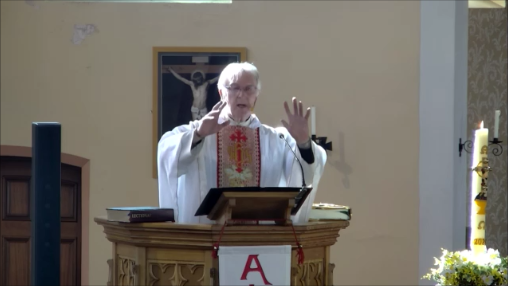
07.04.24 ~ 2nd SUNDAY OF EASTER
(To hear audio file ~ click here)
At the Easter Vigil last week, we had the great joy of welcoming Holly and Simon into the Catholic Faith. An adult who converts to Catholicism naturally approaches it differently from someone born into it. Everyone’s journey in faith is different and personal. For some, it begins with questioning life’s meaning, for others it’s the search for certainty to anchor their life to. Very often it comes from mixing with cradle Catholics for whom the faith is as natural as eating and drinking, whose very sense of belonging, being part of a family, is an inspiration to those who feel they have no spiritual home. Simon has written a beautiful view from the pew, which encapsulates much of what I have just said.
But, however we receive the Faith, it is neither a birthright nor something we can earn by intellectual effort. It’s a free gift from God, for anyone and everyone, who would like to receive it. But it’s a gift which has to be opened, and acted upon, in the way today’s scriptures spell out: love God, love our neighbour. It's pretty easy to work out how to love our neighbour in a practical way, but what about God? St John says, “Loving God is keeping his commandments” one of which, ‘Thou shalt not kill,’ calls for all Christians, especially with what’s going on in the world, to be proud to proclaim their gospel faith, as a better way than conflict, for making the world a safer and more peaceful place”.
Being proud to proclaim our faith in public, has a lot to offer, because it knows how to cope with the problems of life, in a world which seems to have no cohesive strategy for the common good of all, resulting in excessive nationalism or individualism. I had a funeral at St Mary’s this week of a man I didn’t know, but his sister told me a little about him, the most striking being, that he was proud of his Catholic Faith. I said how refreshing it was to hear that, in contrast to what you hear from so many people in the media, for example who say “I was brought up Catholic but no longer practice”, as if it were a badge of honour, to make them more acceptable to a non-religious and secular audience.
Many people who reject the gospel trawl the internet, or social media, in pursuit of anything that may bring happiness, or self-worth, by the number of ‘likes’ they can notch up. But it’s not working! Last Monday the NHS revealed that in 2022-23, 86 million anti-depressants were prescribed by GPs. Some will have been genuine cases of clinical depression, but I suspect most were just going through a bad time, which is part of life, not a mental health issue. Scotland now has a ‘Hate Crime’ law. Hatred is seen in thousands of innocent men, women and children being blasted to smithereens in Palestine and Ukraine. Saying nasty things about people because they have a different point of view is hardly hatred.
The two essential fruits of the resurrection, are missionary witness and the sharing of material goods, as showcased in the first reading from Acts, where the whole group of believers was united, heart and soul. We know that through our faith we become children of God with a child’s natural love for the heavenly Father ‘who begot us’ as St John puts it. So, it makes sense that Jesus’ first commandment is to love God, then secondly our neighbour. When we love in that order, it’s like a beam of light striking one of those dance hall revolving mirrors, which diffuse light all over the place. We, like millions of our fellow Christians, want our love for God to be reflected in the good we do, in all directions, on all kinds of people, as an antidote to the destructive power of evil, so prevalent in our world today.
But to do this well and consistently, we need the inspiration of the Holy Spirit and absolute trust in the Lord who, unlike Thomas, we can’t see, but believe in. Thomas didn’t trust his friends when they told him Jesus was alive, nor did he trust Jesus. He had to learn that a true loving relationship with God, does not have to be subject to proof and scrutiny. Like Thomas, many people want to understand before they believe, whereas it should be the other way round. Only when we accept that Jesus is truly alive and with us always, do we discover our faith deepening and maturing, as our reason begins to sift the evidence of the first eyewitnesses. Our relationship with Christ is like any human friendship. It grows and develops over the years through both the joys and sorrows we share, precisely because it’s based on faith and trust. Faith in what we can’t see is an everyday part of life’s experience, and so is faith in God. As it says in the Rite of Baptism, “This is our faith: we are proud to profess it”.
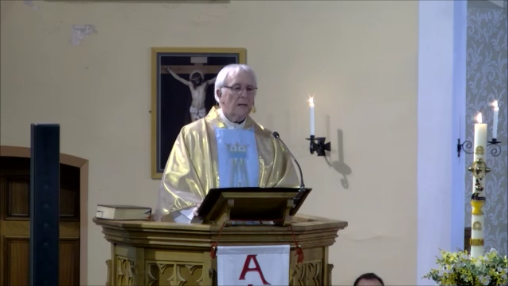
30.03.24 ~ EASTER VIGIL
(To hear audio file ~ click here)
I imagine that most of us, from time to time, will have met an atheist, who will proclaim the victory of science over religion, as the only answer to life’s questions, but, for those of us who have faith, life’s questions must be answered in two ways. Science can tell us ‘How’ but only religion can tell us ‘Why’ So, for us, there is no conflict between science and religion. In fact, many of the greatest scientists the world has ever known have been believers. For example, a Catholic priest called Fr Georges Lemaitre. In 1927, in a paper to the Scientific Society of Brussels, he presented the idea of an expanding universe, which has expanded from an initial point, which he called the ‘Primeval Atom’. Over the years, his idea has dominated modern cosmology, as the most important scientific theory, of the origin and development of the universe. In 1949, it became known by scientists as the ‘Big Bang’.
I was reminded of this when reading an article by Martin Bennett, who writes, “To sit and listen to all the readings at the Easter Vigil is to be taken from the dawn of time, and to have an overview of many thousands of years of history, which, with the benefit of hindsight, allows us to see how God has always been with us. From the ‘Big Bang’, which Christians think of as his first explosion of love, through which he created all the universes, God always wanted us to be like him, so he made us in his own image and likeness”. It’s a wonderful story.
Unfortunately, however, we see in the Old Testament Readings, that we have often failed to live up to his likeness, and yet God never fails to call us back. He doesn’t want to lose us. At first, he sent his people messengers, to appeal to their sense of loyalty to him, who, at the Passover, had freed them from slavery. But his prophets were rejected. People didn’t like the idea of being beholden to a God whom they saw as remote, not one of them, unaffected by the slings and arrows of outrageous fortune. That’s why he decided to send his only Son into the world so that, through him, he could be with us in a different, more personal relationship. This, Jesus attempted to teach, throughout his public ministry, referring often to us as his brothers and sisters, children of the one he taught us to call ‘Our Father’. As we know from Good Friday, this message was not accepted by the Powers that be, and in fact led to his death for blasphemy – they raged at the very idea of the claim that he and the Father are one. He failed to move them from their entrenched position, that when it came to God, they knew best, and so suffered the same fate as the Prophets. Even the apostles, apart from John, lost faith in him that day.
Only after the resurrection did things change. I’m reading a book, at the moment, called ‘Strangers in the House’. It’s about soldiers and other servicemen coming home after WWII, sometimes after five /six years away, and the profound effect their homecoming had on the wives, children and families they had left behind, as well as on themselves. For many hundreds of them, although safe and free from the horrors they had been through, it meant a new way of living from what they had known before. For some it renewed and intensified their love, for others it led to the parting of the ways.
Today is the feast of Jesus’ homecoming after the horrors of Good Friday, to Galilee where they first began, where they had their most success, where they were most comfortable, and where they felt safe. His friends reacted in different ways, some with incredulity, fearing he was a ghost: others, like Mary Magdalen, consumed with unbridled love, wanting to cling to him for ever. However, they all knew that things were now different, and changes would have to be made to their way of living with him. From now on, he would always be with them, but spiritually. He was aware that many followers would want to cling on to the security of the Law, simply following the commandments and avoiding controversy. But he also knew many more would welcome his call to an intimate, living relationship with him. His masterplan was to pour out his Spirit on anyone and everyone who opens their heart to receive his word. He promised that if they did he would live in them. The Risen Christ, still bearing the wounds of the Passion, is the same Jesus they knew before, alive again, continuing where he left off, asking each of us to join him, in helping others to bring about a real, tangible love for God, whose son did indeed know the same slings and arrows of outrageous fortune as we do, was not remote, and definitely was one of us, in all things but sin.
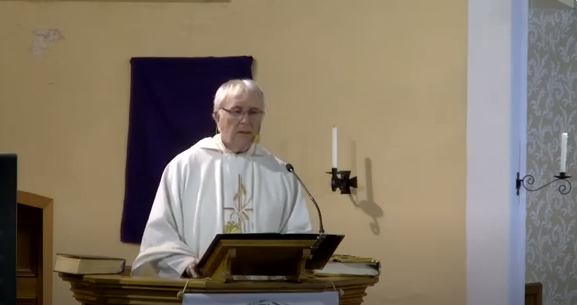
28.03.24 ~ MASS OF THE LAST SUPPER ~ MAUNDY THURSDAY
On the news this morning, it said that, because of his illness, King Charles will not be able to attend today’s church service during which Maundy money is distributed to 75 couples, one for each year of his age. However, he has sent a message to be read, the theme of which is friendship, in which he renews his coronation oath, to serve and not to be served, the same commitment that we priests of the Diocese made this morning, at the Chrism Mass.
The word Maundy comes from the Latin ‘mandatum’ which means command, and is directly connected to our Lord’s new Commandment to ‘Love one another as I have loved you’. So, the Maundy money in days long ago, would be real money given to real poor people, by kings and queens emerging from their palaces in response to that command, echoing the thoughts of the Apostles at the Last Supper, who presumed that was what Judas was leaving the meal to do. He would, of course, have missed what came later, the washing of the feet.
Nowadays, the Maundy money is largely ceremonial and is used to honour worthy citizens from the relevant Cathedral City’s population. Had the king been well enough to attend to distribute the money, it is highly unlikely, even though he has pledged to serve, not to be served, that he would have gone on to imitate Jesus by offering to wash people’s feet.
When Jesus left the table to set about washing the apostles’ feet, no doubt they were surprised or even shocked, but as they were accustomed to seeing him do unusual things, like touching a leper, talking to a Samaritan woman unaccompanied, delaying his response to Martha and Mary’s plea to come to save their brother, they probably just went along with it. But not Peter! He spoke out, maybe with the silent approval some of the others too. “You, the Lord and Master! You’re not washing my feet. That’s the job of the lowest slave”.
But that’s precisely why Jesus took it on. Remember he had just ordained them priests, and given them the same power to heal and forgive sins as he had, powers they had seen him use many times. Perhaps as they were finishing their meal, their thoughts could have strayed to the time when they would be allowed to use those powers, and how wonderful people would think they were – maybe, even, how important they were. Time for a lesson in humility!
Jesus washing their feet was a hard lesson for them to learn, but essential. ”The Son of Man came to serve, not to be served” and they must do the same. Thankfully, it was a lesson well learnt, and in time, they did indeed go on to do for others what he had done for them, something the Church continues to do today. Thankfully, we are still the people of the water and the towel, something we should be justifiably proud of in spite of the institutional faults and failings of the Church in recent years.
Apart from being given the power to forgive sins, and receive forgiveness, which 40 odd people benefitted from, who took advantage of the Penitential Service last night, he also gave them the power to celebrate the Eucharist, in memory of him, and to make him present to all peoples of all times, until the very end of time.
All these blessing which we enjoy, came at a terrible price for Jesus, which began not long after this last meal they shared together. Later tonight, at the altar of repose, there will be time to spend with Jesus, as if we were in the Garden of Gethsemane, before his arrest, a time so filled with anxiety and fear, that in his agony, he burst minor blood vessels, mingling droplets of blood with his sweat. May this most holy night of celebration and sadness, always keep us mindful of Christ’s saving work, so that we will never forget what he has done for us and be ever grateful.
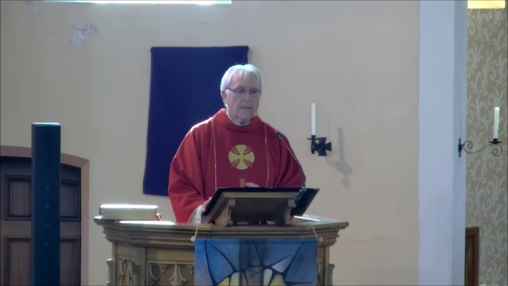
24.03.24 ~ PALM SUNDAY
(To hear audio file ~ click here)
As we keep getting reminded, this is a year of elections in many countries. Russia’s has just finished: the USA’s and our own are to follow in the Autumn, most of the Candidates committed to a populist agenda, designed simply to get them elected, or keep them in power, but devoid of any real principles. However, I have a feeling, that thinking people are beginning to wise up, and to discern the difference between content and substance. An example would be the huge number who defied the Kremlin, and came to place flowers on Alexei Navalny’s grave, or poured paint into the ballot boxes, in protest against the rigged election; a demonstration by ordinary folk of what they really want.
In some ways, that was what was happening on Palm Sunday, when the ordinary folk welcomed Jesus into Jerusalem, strewing palms before him, and shouting Hosannas to the Son of David, in defiance of their rulers. Unfortunately, it didn’t last – the Establishment was just too strong. They didn’t have the military might to put such an insurrection down, as happens in so many dictatorships today, but they were able to manipulate the crowd on the strength of their superior religious knowledge and authority. “This rabble knows nothing about the Law – they are damned.” Even when one of their own number, Nicodemus, suggested that the Law does not allow judgement to be passed on a man, without giving him a hearing” they turned on him. “Are you a Galilean too? Prophets do not come from Galilee”. So, it was decided, rather like what happens in Russia today, that any hint of opposition must be crushed.
While all their plotting was taking place during the week, what do you think was going on in Jesus’ mind, knowing full well how painfully this was going to end? For an answer to that we need to look at the Song of the Suffering Servant in the first reading, which highlights the constancy of his hope in God. It is so strong that he is prepared to go through anything, trusting that in the end all will be well. “I offered my back to those who struck me, my cheeks to those who tore at my beard, I did not cover my face against insult and spittle, but the Lord comes to my help, so that I am untouched by the insults”. When I was taking the children around the stations of the cross on Thursday, I explained to them how narrow the streets of the Via Crucis are, which meant that, as Jesus stumbled along through the crowd, he was in easy range of those who did want to spit at him, slap or punch him. So, he would definitely have had to set his face like flint, so as not to give them the satisfaction of seeing him react or retaliate, an unusual response, but very much in keeping with his teaching to love our enemies. Perhaps seeing, from so close a vantage point, how Jesus dealt with such hatred, may be the reason Simon of Cyrene later became one of his disciples.
Although to the Jews, Jesus was a blasphemer and law-breaker, in St Paul’s letter to the Philippians, we get a reminder of just who it is we are talking about here. When we realise that, we may wonder why he didn’t simply manifest his power there and then, to avoid the fate of the Suffering Servant. But what’s clear in Paul’s hymn, is that Jesus is not some sort of fantasy Superhero. Yes, his state was divine, but he did not cling to his equality with God in order to impress, cajole or scare people into loving him. He had no desire to become a Northern Korea style ‘Beloved Leader’ lording it over his people, forcing them to submit to his will on pain of death. Instead, he assumed the condition of a slave, a state in life unlikely to lead to him having a mass following.
At the presentation in the temple, Simeon had foretold that Jesus would be a sign of contradiction, and in assuming the condition of a slave he certainly was. He turned the whole human way of interaction upside down, serving rather than being served, seeking the common good rather than our own glory. We live in a world of excessive consumerism where, as the Bible puts it “People have exchanged the glory of the living God for the image of a bull that eats grass”. Being a humble servant, he does not try to impose himself on us as a popularist but seeks out those who have eyes to see and ears to listen, thinking people, who don’t mindlessly follow the crowd, like lemmings over a cliff. His appeal is for each of us to see the false gods and idols of today’s society for what they are, and to see him with the eyes of someone who understands they are being invited to know him personally, to be cherished and loved by him, who says to us all, “Do not be afraid – I have called you by your name: you are mine
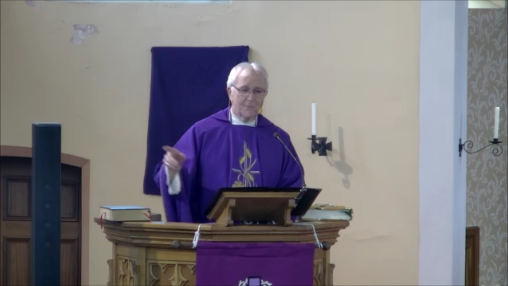
17.03.24 ~ FIFTH SUNDAY IN LENT
(To hear audio file ~ click here)
Before I had learnt to ski, I was invited by members of the Mess I lived in, to join them for a days’ skiing in the Harz Mountains. After an hour or two showing me the basics, how to snow plough etc, they left me to my own devices. The problem was that the baby slopes were so short that I had to keep taking off the skis and walking back up, which was exhausting. So, I decided to take the lift to the top, which seemed a good idea at the time. However, from the top, rather like standing on a 10-meter diving board, the downhill slopelooks terrifying. But there was no other way down, so, very gingerly, I set off to negotiate a bend, but as I didn’t know how to turn, I went crashing into a snowbank, burying one of the skis, which other skiers, vey kindly, helped me to dig out.
On the piste itself, I kept falling over and getting covered in snow. Then, to make things worse, having put my skis back on for the umpteenth time, and while I was adjusting my goggles, the skis suddenly started to move downhill, with my ski poles left behind me. I probably wasn’t going very fast, but to me it felt like I was tearing down the M6. I remember that as I shot past a bar somebody shouted that my hat had blown off, as if I didn’t know, but by this stage my only concern was survival. I started to pray out loud, “Jesus, Mary and Joseph don’t let me die”. I had no idea how to stop and kept yelling for people to get out of the way. Eventually, I shot upwards on the other side of the valley, which slowed me down and brought me to a halt. I had scared the life out of myself, but, as I lay there panting, I looked back up the slope and thought: “That was fantastic. I must learn to do it properly”.
When a beginner, as I was that day, starts down a steep slope, his fear of losing control causes him to lean back into the safety of the hill, but that’s precisely why he loses control and falls over. When I was leaning forward, as you’re supposed to do, although I was going a lot faster, I didn’t fall over.
Why am I telling you this? Well, it’s an everyday example of a situation where we struggle to let go of our own beliefs, in case we get into a situation we can’t cope with or control, even though we know for certain, that what we are being toldor asked to do by experts, is necessary, if we want to succeed.It’s a prime example of obedience and trust, which is what today’s scriptures are all about.
In the OT, the covenant God made with the Israelites would have worked brilliantly if they had only remained true to it. It was written on tablets of stone, external rules governing their behaviour which they paid lip service to. By the time Jesus came it was still written on stone, as demonstrated by the way the people and the Scribes and Pharisees in particular, were unable to work out that Jesus was from God from the signs and miracles he gave. Instead, they saw his actions as sinful,because he cured people on the Sabbath. It was clear to God that they were unreliable, and unlikely to produce much fruit, like the seed which fell into thorny ground, and was choked by the distractions of the world. So, he decided to write his law in people’s hearts, because the heart is where love comes from, love which causes us to see beyond externals, to the reason why God wants us to do things his way..
Jesus, of course, is the Gold Standard of that kind of love, by his willingness to obey whatever the Father asked of him, and it was the same need for complete obedience, which hestressed to those Greeks who asked to see him. Was it to discus philosophy with him or to discover yet another new kind of teaching perhaps? Greece, at the time, led the world inphilosophical discussion, as St Paul found out when he visited Athens. “The Athenians care for nothing more than discussing new ideas”.
Philosophical discussions about Jesus are all very well, but eventually, we’re all challenged to obey God as he did, with all the courage and trust required, to let go of fear. Like the grain of wheat which has to die in order to yield a rich harvest, we too have to die, not literally, as many of our fellow Christians are actually doing today, in countries where persecution is still rife, but by a sort of dying to our own agenda. When we share in Christ’s dying, we lay at his feet our ambitions and plans in a personal commitment to him,which allows him to be in charge of our lives. Such obediencemay appear to thwart our desire to keep a tight grip on our lives, but if we choose to follow Christ’s expert instructions,it’s more than likely that we will not end up going down the slippery slope out of control.
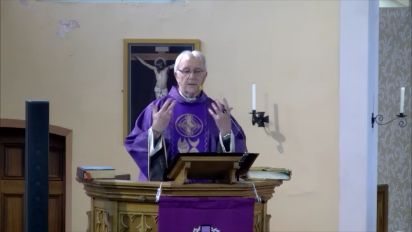
10.03.24 ~ FOURTH SUNDAY IN LENT
(To hear audio file ~ click here)
Today is ‘Laetare’ or ‘Rejoice’ Sunday, the midway point in our Lenten penitential journey. So, time for a little light relief, rather than some heavy theology. Even Jesus experienced a little light relief, in the middle of his long journey to the cross, from the usual antagonism of the Religious Authorities. In Friday’s gospel a Scribe engaged him in a civilised conversation about which was the greatest of the Commandments, and was extremely impressed with the answers Jesus gave, concluding, surprisingly, that he was right in what he was saying. Jesus in turn said to him, “You’re not far from the kingdom”. Normally, a scribe would be trying to trick him into saying something to incriminate himself, which could be used against him.
Another one was his encounter with the Pharisee Nicodemus, who came to him in the dead of night when it was dark, hoping, no doubt that no-one from the Sanhedrin would see him. But that encounter with Christ took him out of the dark into the light, so much so, that it would be he who tried to persuade the Sanhedrin not to condemn Jesus to death. He also helped Joseph of Arimathea to take Jesus down from the cross for burial. He became “The man who” Jesus says, “lives by the truth and comes out into the light, so that it may be plainly seen that what he does is done in God”. So, a couple of rare bright spots in the ever-increasing darkness creeping up on Jesus as the Passion draws near.
Today is also “Mothers’ Day” a little light relief in Lent’s sombreness. I asked Year 2s what made mums special? “She pays the bills. She does the washing up”. Best of all: “She makes sure you’re not faking it, when you say you’re ill and don’t want to go to school!” Not to downplay in any way at all, the vital contribution a father makes to the life of a family, I think it’s fair to say that in most families it is the mother who is the heartbeat of the home. Certainly, that was always true in my own family. My mother was the life and soul of our family, and the day she died, a great light was extinguished. As a little boy, she would ask me, “How much do you love me?” I’d reply, “That much”, and when I grow up, I’ll buy you a big house, a car and a fur coat – (we didn’t know about animal rights then)! It was like a bargaining chip. You do all this for me now, and I’ll pay you back when I grow up.
Surprise! Surprise! When I grew up I couldn’t get a grant to study at Valladolid, because, the Council said I could have done that ‘course’ in England. No good trying to explain to them that training for the Priesthood was not ‘doing a course’. So, I became a penniless student. The Diocese gave me £50 a year, so guess who had to support me through seminary? Even as a young priest, I rarely returned from my day off at home, without a £5.00 note surreptitiously pressed into my hand to pay for petrol.
I never did buy the fur coat, and the nearest I got to buying her a car, was taking her out for a drive, not long before she died, in my10yr old Ford Cortina with a broken starter motor, which I had to turn over by crawling under the car. Although it was a precious, unforgettable time together, it was marred slightly, by the fact she was the world’s worst back-seat driver, constantly telling me to slow down, and to mind that child. Don’t know how I manged to drive back to Preston by myself! My father was always just as loving and giving. When I joined the Army, I had a salary for the first time in my life. My dad was an OAP, so I sometimes sent him a gift of money, but he would keep it for me, and give it back when I came on leave, saying, “You need it more than me, Son”, which wasn’t actually true.
I soon came to realise that most of us will never be able to fully repay our parents for all they did and sacrificed for us over the years, especially for giving us the greatest gift of all, our Faith. And the amazing thing is that they know that: they knew it all along – they never expected repayment. All they asked of us is that we learn from them, to share our love with others as they shared their love with us.
It’s the same message our Holy Mother the Church gives us all the time: what more could Jesus have done or sacrificed, to prove how much our heavenly Father loves us? We’ll never be able to pay it back but we can learn from it, as we did from our parents, to walk in his ways, to love God and our neighbour as ourself, or, as St Richard of Chichester puts it, to ask for the grace, ”To see you more clearly, love you more dearly, and follow you more nearly, day by day”.
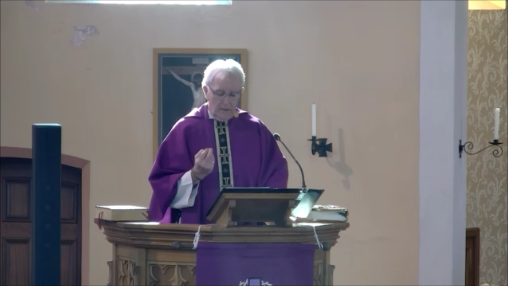
03.03.24 ~ THIRD SUNDAY IN LENT
(To hear audio file ~ click here)
A priest friend once said to me, “Remember, Alf, you always hurt the one you love – I cut myself shaving this morning!” Many years ago, I tried to persuade a couple who had a really good marriage, to go on a ‘Marriage Encounter’ course, which is designed to make good marriages great marriages. But the wife wouldn’t go, not because she was against the idea, but, she said, to have a greater love than they had already, would make the separation at death even more painful than it’s going to be. Her argument was the greater the love, the greater the pain. It’s the very excess of their love which makes lovers so easily wounded, something Our Lord, the world’s greatest lover, knew all about.
When he stormed into the Temple and started driving out the sellers and money changers, he was filled with zealous love for his Father’s house, but also, with excessive love for the people he had come to save. There was something not right about the way things were being done. It was a bit like a prayer wheel, where you put money in a slot, give it a spin and let it pray away for you, while you go about your business. People would come to the temple, buy an animal, and give it to the priest to sacrifice at the altar, where they weren’t allowed to go. So, their worship of God was outward and from a distance, based on ritual and keeping the ten commandments. What Jesus did that day was to proclaim that mechanical observance of the commandments, or ritual alone, was not enough.
That is not to say that the commandments have no value anymore, even today. It’s true that many of our contemporaries ignore them as an anachronism which limits our human right to freedom from all constraint. Take, for example, today’s identity debate. Our speaker at an in-service day this week, told us of how, in a class of university students, she produced an apple and informed them that it was in fact an orange. It was met with derision, but she kept on insisting until they eventually said, “Well if it’s an orange to you, that’s ok”. She was illustrating the point that especially amongst people addicted to the internet, the zeitgeist is for absolute freedom to believe whatever you like, even about yourself. She suggested it comes from the fact that people have no roots, no guidance, don’t feel made for any particular purpose, have no shared goal, so are left to construct their own identity from scratch, then compel others to affirm it. This has lead to identity politics, and, as Pope Benedict foresaw 20 years ago, the ‘dictatorship of relativism’ which does not recognise anything as definitive. Its ultimate goal consists solely of satisfying one’s personal desires. It proposes that the ONLY thing that matters, is what I think, and what I am offended by. Toleration for another’s ideas, lasts only so long as those ideas concur with the prevailing argument, the first casualty of which is free speech.
Unlike that sort of unrealistic absolute freedom which says, “There’s a wall and there’s a door: you’re free to choose which one to walk through” the commandments offer the more realistic freedom, to be a person not in isolation, but always in relation with others - by choosing a firm moral foundation not to kill, steal or tell lies, about ourselves or others, as the basis for true happiness. It’s a reality check, a recognition that no man is an island, entire of itself. For Christians, this is most closely lived out in the Body of Christ, in which every member has a part to play for the common good.
When Jesus cleansed the temple, what made it worse, for those who took him literally, was his claim that he would rebuild it in three days. Only after the resurrection would those, who had ears to hear, understand, what he was saying. It wasn’t about bricks and mortar, but about building an intimate relationship, with the God he had taught us to call ‘Our Father’. The minute he died, the veil of the Temple was torn in two, symbolising the end of the Old Covenant, ratified by the sacrificial blood of animals, and the beginning of the New, established, once and for all, by the blood of Christ. Jesus himself becomes the new Temple, where the Holy of Holies can be worshipped in spirit and truth. No longer would we worship from afar. True worship now becomes an affair of the heart, a response to his excessive love for us, summed up in today’s psalm, “You Lord, have the message of eternal life”.
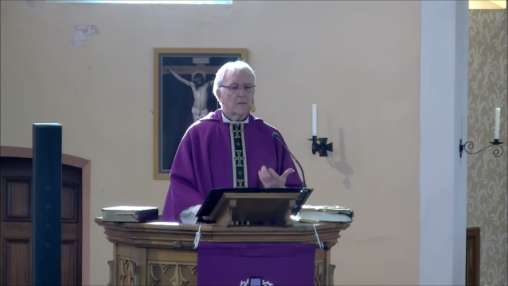
25.02.24 ~ SECOND SUNDAY IN LENT
(To hear audio file ~ click here)
If a complete stranger were to walk up to you and say, “I’d like you to do something for me” your automatic response might be, “I’m terribly sorry, I’m really busy at the moment”. But what if you were asked by someone in authority over you? You might think, “Oh, Oh, this could be difficult”. A few weeks ago, Franz Beckenbauer, one of Germany’s greatest footballers, died, just a few months after Sir Bobby Charlton, one of England’s greatest footballers. At the 1966 World Cup Final, Sir Bobby, England’s record goal scorer, was at the pinnacle of his career, looking forward to adding more goals in his free-flowing attacking role. But, to his acute disappointment, he was told by the Manager, that his job was to man-mark Franz Beckenbauer. Looking back, he said that to get to a World Cup Final was the culmination of all he had ever dreamed of, but at the end he felt he hadn’t really taken part in it. Later, the two became great friends, and Beckenbauer told him that he had been given the exact same instructions by his manager. His job in the Final was to man-mark Bobby Charlton. Both men, the stars of their teams, capable of sheer brilliance, were asked to do something far less exciting and mundane for the common good of the team, which they did, out of duty.
How very different when a friend, or someone you love, asks you to do something for them. You’re more likely to say “Yes, of course, if I can”, before you ask what it is, presuming it will be a small favour. What you don’t expect from a friend is a request to carry out a stunning act of cruelty. Abraham was a friend of God. At the age of ninety, well settled in and very comfortably off, in Ur of the Chaldees, he was asked by God to leave all that behind, and set off for an unknown destination, on the strength of an unlikely sounding promise, bearing in mind that he had no children and his wife was past childbearing age, that he would become the father of a great nation. But he did it, and never once wavered from his faith in God. So, imagine his feelings, when asked by his friend to offer his son as a burnt offering - surely a bridge too far. But that’s the point: it’s the ultimate test which asks: “Do you trust me, even when common sense and human instinct says don’t trust me”? Showing that he trusts God absolutely, even under such horrendous conditions, signifies that the OT Covenant will be founded on faith, rather than expediency. In the NT Jesus does a similar test of faith on Peter after the resurrection, which will prove to be equally life-threatening, although not immediate, when he asks him three times, to declare that he loves him, before commissioning him to feed his sheep.
Clearly, God did not wish the death of Isaac, nor did he wish the death of his own son Jesus. He was looking to Abraham for the kind of faith which would become the blueprint, the gold standard, the ideal that the chosen people would look towards, in their dealings with him. Unfortunately, over the next 1850 years, they lost sight of the ideal of absolute faith, and settled for the less demanding outward observance of the many laws which governed every aspect of their lives.
When Jesus came, it was to restore the ideal of absolute trust in God, which, unlike Isaac, cost him his life. Naturally, he didn’t want to die such a cruel and painful death, but his obedience to the Father’s will that he should be totally human, meant he would be subject to the same slings and arrows of outrageous fortune as the rest of men. So, when men decided to kill him, an innocent man, he suffered the same injustice so many thousands of innocent people suffer on a daily basis, like Alexei Navalny. His ultimate test was to trust in God that his sacrifice would not be in vain. And clearly it wasn’t. Many millions over the centuries have imitated his sacrificial love, by laying down their own lives for their friends, in absolute trust in God, even when common sense and instinct suggested they shouldn’t. When Navalny was asked why he chose to go back to Russia after being poisoned, he quoted Jesus’ “Blessed are those who are persecuted in the cause of right. Theirs is the kingdom of heaven”. With such a proof that, in spite of everything we suffer, all will be well, as hinted at in the Transfiguration, those of us who belong to Christ, should have no fear of taking up our cross to follow him, for, as St Paul says, “With God on our side, who can be against us?”
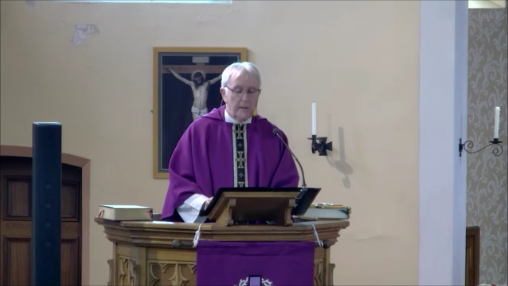
18.02.24 ~ FIRST SUNDAY IN LENT
(To hear audio file ~ click here)
PASTORAL LETTER FOR THE FIRST SUNDAY OF LENT 2024
APPOINTED TO BE READ AT ALL PUBLIC MASSES IN ALL CHURCHES AND CHAPELS
IN THE DIOCESE OF LANCASTER ON THE WEEKEND OF 17th – 18th February 2024
My dear people, Lent can be used by some as an opportunity to recover New Year’s resolutions that have gone a little astray. Being able to see evidence of progress and having ‘targets’ can be useful, but before we dash off to the bathroom scales note that our Blessed Lord offers us another target, far more valuable even if our progress is more difficult to measure. Stay with me.
Can you picture Jesus as He turns his back on the crowds, on Mary, on His family, neighbours and strangers, and walks away towards a vast empty wasteland? No shepherds’ paths go there, no isolated villages are found there.
For thirty years He has lived anonymously amongst those to whom He had been sent, that He might save them from sin. Those hidden years of waiting are now over, but if He is to be fit for the task ahead, there is this final great act of intense preparation, His time in the wilderness. As yet, He has performed no public miracles, given no teaching and told none of His parables. Nor has He gathered any disciples or followers.
Picture Him as He slips away alone, hardly noticed by the majority whose attention is on the river and the figure of the Baptist. Watch, because what He is doing is done for you and for countless others. Watch, because in fact He takes you with Him. And as you see Him entering that wilderness know that, in fact, He is entering another wilderness, the wilderness that is the human heart, your heart. Saint Mark tells us that He will find that wilderness already occupied.
He will find Satan there, the Spoiler, the Tempter, who claims your heart as his. Jesus will find there the ‘wild bests’ of your emotions, ambitions and beliefs all grown wild. He will find greed and grief and fear and so much else that refuses to be satisfied, so much that harms us from within. But these He will set Himself to tame.
He will find there the angels, given to us by a loving Father, the first prophets of hope and a better life, our dear friends and servants since the moment of our conception.
Prayer, fasting and sharing with the poor are the time-tested traditions of Lent that we will put into practice this Lent, with hopes of driving out the devil, taming the beasts and putting us at one with the angels. But these are not the aims or goals for a successful Lent, they are only the means of achieving a far greater goal; the goal of knowing more intimately – or perhaps for the first time – the heart of the loving Father who sent His only Son to save us and share His life with us.
You and I have many concerns competing for our time and attention. Family, work, friends, matters of social justice and charity. The sheer quantity and complexity can overwhelm and weary us, unless we first set ourselves to know the Lord and something of His love. You must know that His love is not just an ideal. It is a love that has become flesh and dwells amongst us. He has made His home in us that we might make ours in Him.
St. Paul tells us that we hold a treasure not made of gold, but of far greater worth. This Lent need not be our usual ‘starting again’ as if life is a game of ‘Snakes and Ladders’ in which we find ourselves annually starting again from an old beginning. Instead, we can know how Jesus has driven the snakes from the board, from the garden of Eden, and left only ladders. The best news is that He is the ladder, and all we must do is to climb onto His back to rise up with Him at Easter.
So, no long faces, no deep despairing breaths as we prepare ourselves for the usual ‘two steps forward, three back’ and the sense that we and this world are slowly slipping away from God. It is God who does the miracles; We have only to believe and persevere in our belief.
See Jesus setting about His work in your wilderness. And may your experience this Lent be more in keeping of the phrase used by Saint John Henry Newman of ‘Heart speaking unto heart.’
With my blessing for you and those you pray for,
 +Rt Rev Paul Swarbrick
+Rt Rev Paul Swarbrick
Bishop of Lancaster
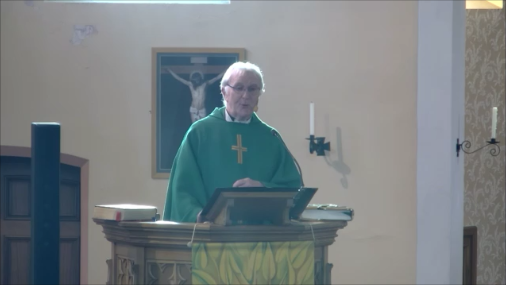
11.02.24 ~ 6th SUNDAY IN ORDINARY TIME
(To hear audio file ~ click here)
At Bible Share this week, we looked at the fix King Darius found himself in over the prophet Daniel, whom he thought the world of. Because of the irrevocable laws of the Medes and Persians, he had no choice but to have Daniel thrown into the lions’ den since he had refused to worship their pagan god. Irrevocable laws have no mercy. However, God does, and Daniel survived his ordeal. Now, contrast that enslavement to irrevocable law, with what St Paul says today. He thinks that a mature Christian, while giving glory to God, by keeping his laws, should also be free to exercise discretion, so long as it is not offensive to anyone. In one of his other letters he says, “Out of love for a weaker brother, abstain from meat if he can only take milk”. So, eg, if you personally choose to ignore ‘Nanny State’ decrees, which you think are ridiculous, you still need to be sensitive to those who don’t.
That idea of tempering the law with the eyes of love, allowing for human weakness, is very much in keeping with the way Jesus lived his life. Take today’s gospel about the leper. As far as I know, people aren’t born with leprosy, and I believe it takes quite a few years to develop, which means lepers weren’t always lepers. So, if you caught it and knew that the only remedy was to deny all social contact with the healthy, can you imagine, not just the physical but the mental toil of having to leave your house, your family, live outside town, and rely on people to leave food out for you. And if that wasn’t bad enough, a religious law banning you from the synagogue was added to strengthen the social one. Generally speaking, if you were a leper you were a dead man walking.
What compounded the error, so to speak, was the widespread belief among the Jews, that illness was a punishment for sin, committed either by you or an ancestor. Even the apostles believed that. When they saw the man born blind, they asked Jesus, “Who sinned, this man or his parents?” “Neither” said Jesus; not a view shared by the Pharisees, who declared the blind man had obviously been a sinner since birth. From that belief they considered that of all the punishments doled out by God for sin, leprosy was by far the worst. It was seen as the most vivid symbol of the effects of sin because, as we saw, it’s a disease which cuts a person off from the community, carries the risk of infection and, over time, gradually destroys a person’s body. Sin has a similar effect. Over time it gradually becomes infectious, destroys human decency, and has a corrupting effect on society, by isolating a person in their self-centredness, and thereby making them less interested in the Common Good.
The difference between sin and leprosy, is that the leper is fully aware, at all times, of the effect of the disease on his life and the lives of others, so is constantly seeking a way of re-entry into the community. The sinner, on the other hand, lacks a similar sense of urgency, because he is often not aware of the inner disease holding him back from re-entry to God’s Kingdom. That’s why, as I said last week, Jesus made a point of forgiving people their sins before he cures their illness. Our leper is so desperate for a cure, that he breaks all the hygiene laws to approach Jesus. For most people this would have caused a major problem, but for Jesus, love and mercy trumps the law and so, to the shock of all watching, like the shock people felt when Princess Diana, back in the 80s, held an Aids patient’s hand, he stretched out his hand and touched him. He will, of course do the same for anyone who seeks forgiveness with the same powerful desire. We know what the touch of Christ has done to heal and change self-confessed great sinners like John Pridmore. Few of us would consider ourselves in the same league as John, but we know, as St Paul says, that we’ve all sinned and fallen short of the grace of God, and that we each need the healing touch of Christ for whatever wrongs we’ve done.
Lent begins on Wednesday, an annual seasonal gift, to reflect on our own mortality, take stock of where we are in our spiritual life and to feel the loving, healing touch of Christ in the sacrament of reconciliation, which is available not just here, but in all our parishes, if you feel more comfortable going to a priest you don’t know. Either way, it’s very good for the soul, and all is forgiven.
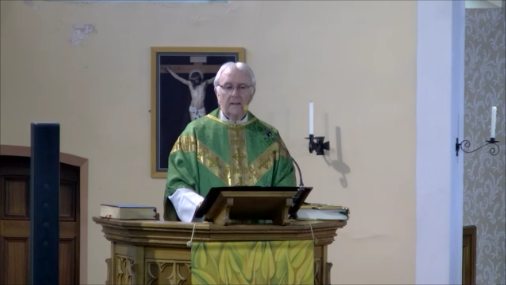
04.02.24 ~ 5th SUNDAY IN ORDINARY TIME
(To hear audio file ~ click here)
Some years ago, a group of us from the parish went to see Rod Stewart at BFC. We got talking to a superfan who’d already seen him 3 times. She told us he didn’t do encores. True enough, he played his set, kicked a few footballs into the crowd, and was gone. He was good and we wanted more. In last week’s gospel, the people of Capernaum marveled at the new and authoritative teaching of Jesus, which caused his reputation to spread rapidly all over the Galilean countryside. He must have been feeling quite pleased that things had gone well, as he made his way to Peter’s house for lunch. But Peter’s mother-in-law was ill, and unable to cook, so Jesus cured her. No surprise, then, once the Sabbath was over, that the whole town came crowding round the door, bringing him all who were sick or possessed. Next morning, they were back again, like us at Rod Stewart’s concert, wanting more, but, by then, he’d slipped off to be alone and pray, and possibly to re-evaluate his tactics.
Many of those who came to be cured, got what they wanted and left. They weren’t interested in what he had to say, or what he wanted from them. Although he clearly did want to cure people, his real purpose for coming, was to give life to the full, not just to dispense temporary healings. A healthy soul is far more important than a healthy body. That’s why he spoke often of sin and forgiveness. Miracles are merely testimonials to the authenticity of his message, like the healing of the paralytic. He first forgave his sins, then demonstrated his power to do so, by telling him to pick up his bed and walk. So, when the apostles say everyone’s looking for him, he reminds them of why he came. What really matters is the Word of God, and like the Sower, he must scatter its seed wherever he can. So, he didn’t go back to town, and, no doubt, left a lot of disappointed people standing at Peter’s door.
If Mark had written this gospel story in our time, it would read like a Sunday supplement: an account of ‘A day in the life of Jesus - Messiah, Healer and Preacher’. He seems to be all over the place, with boundless energy and activity - so many people, so much to do, so little time to do it: a bit like St Paul, making himself all things to all men, in order to save some at least. But we also see in his early days in ministry, that he often gets worn out from the constant demands of people, and, like today, needs time out from constant activity, to draw strength from God for his work. As with all of us, he couldn’t keep that pace without it. Who could? During the week, I met a mum I hadn’t seen for quite some time. She told me she’s got so much going on she hasn’t time to come to Mass. I promised her that if she makes time for God, even if it’s only one hour a week, he will make time for her.
One little detail, we could easily miss in the story, is that Peter’s mother-in-law began to cook the meal as soon as the fever left her. Once restored to her former health, she didn’t hang around, but concentrated her energies on what she probably did best, in the process, giving back to Jesus some of the care he had given her. Perhaps we can learn from her, that giving back to God, or paying in kind, is the perfect response Jesus is looking for, from anyone aware of all he has done for us. Even more pleasing to him, is if we consider ourselves partners, in his work of sowing the seeds of faith.
.
Prayer is the main engine, or driving force, of our partnership. St Augustine says, "Without God, we cannot. Without us, God will not". When we pray to God for the sick, for example, we are also making ourselves available to be used by God, to answer the prayer, as our Eucharistic Ministers do every Friday. If we pray that children may not die of starvation, we are already thinking of raising money to help, as our wonderful parishioners do on a regular basis. In other words, we are active not passive partners in what’s being prayed for. Our prayers won’t meet with success by eradicating world poverty or sickness, but they will be fruitful, if put into action in our own little sphere of influence. As a well-loved spiritual writer wrote, “We have been called to be fruitful, not successful”, and we will be if, as Jesus teaches us today, we prioritise the way we go about our Father’s business. First, love God by spending time in silent prayer. Then love your neighbour by putting it into action.
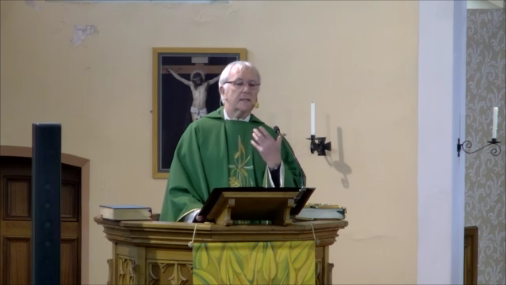
28.01.24 ~ 4th SUNDAY IN ORDINARY TIME
(To hear audio file ~ click here)
There’s a joke about a businessman driving round and round trying to find a parking space, when in sheer frustration, he prays “God, If you find me a space I’ll start coming to church”. Seconds later one miraculously appears. Delighted, he says to God, “Don’t bother. I’ve found one myself”. There’s a similar sort of attitude amongst the Israelites who are about to enter the Promised Land, after 40 years in the desert, where Moses had made known to them the Word of God. Knowing he’s about to die, they tell him how terrified they are of encountering God directly again, in a crashing thunder and lightning storm, as they did on Mount Sinai. “Don’t let us look on that fire again, or we will die”. So, Moses assures them that God has promised he will continue to communicate with them, but through human messengers. “I will raise up a prophet like yourself for them”. So far, so good!
However, once safely settled in the Promised Land, enjoying the fruits of the land, and making a life among other nations, many feel, like the man who found the parking space, that they don’t really need God anymore. This doesn’t go unnoticed by God, and, throughout the OT, we see the prophets make his will and displeasure known to them. But they pay little attention, except when things are not going well, until eventually, they are defeated in battle and carted off to exile in Babylon. There, they lived under the authority of an absolute monarch, King Nebuchadnezzar, who, flushed with power, destroyed God’s temple and used its sacred vessels for feasting and drinking, as did his son, Belshazzar, who ignored the writing on the wall. Both met a sticky end, but not before inflicting utter misery on their Israelite slaves. It could all have been so different, if they had heeded the prophets’ message, “Oh, that today you would listen to his voice. Harden not your hearts”. Living under God’s authority, rather than man’s, would have brought them protection and many blessings.
Most people don’t relish authority, especially if it’s exercised by bullies throwing their weight about, but it’s amazing how well people respond, if it is used properly. When I was chaplain at Sandhurst I asked a Senior Officer, a Major General, to be my guest speaker for the Catholic Students’ dinner. The topic he chose was, “The onset of senility in Senior Army Officers”. It was a very tongue-in-cheek presentation, but it taught the students a good lesson, which was that, with all the fuss that surrounds when you achieve high rank, you can start to believe your own publicity, thinking it’s you that’s really important, not the Office you hold. Once that happens, your exercise of authority can become coloured by self-interest, instead of being used for the service of those underneath you.
This is something Jesus was well aware of, as he began his preaching ministry. Usually, scribes merely commented on the Law of Moses, interpreting it with lots of ‘ifs’ ‘buts’ and ‘maybes’, in a ‘same old, same old’ sort of way. But now the promised new Moses has arrived. Moses had made known to the people the word of God, but Jesus is the Word of God. As such, he expresses himself with the authority of someone who knows what he’s talking about from personal experience. It was an authority the people of Capernaum instantly recognised. They found his new teaching liberating, because it taught that the Law is something to serve the people, not a set of rules to enslave them.
Because the scriptures are so familiar to us, there could be an echo of ‘same old, same old’ in our own churches too. But what a difference when they are proclaimed with authority and real feeling. As a student, I remember an old priest visitor being asked to read the gospel. It was about the man who pleads with Jesus to heal his epileptic son. 7am, and not being long out of bed, is probably not the best time for listening, but the way that priest read it has stayed with me ever since. “Lord, if you want to, you can cure my son”. “If I want to? (Pause) Of course, I want to, that’s why I came”. The thing about the Word of God is that, even if we’ve heard it a thousand times before, it always has something new to say. It is, after all, the living word, not a history book, and, as people don’t change, it will always be relevant to what’s going on in the world, and a sure-fire help for dealing with it.
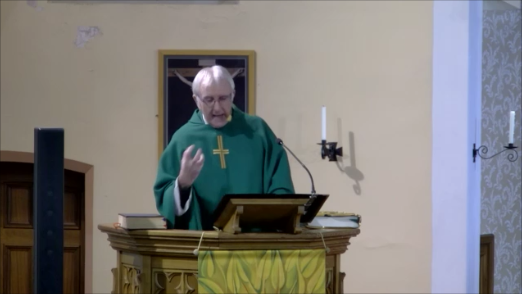
21.01.24 ~ 3rd SUNDAY IN ORDINARY TIME
(To hear audio file ~ click here)
One of my favourite Charities is Medecins sans Frontiers, Doctors without Borders. These are Medics from all over the world who give a few months of their time to work anywhere they’re needed in any emergency that crops up, be it in a War Zone, somewhere a natural catastrophe has occurred, or on the frontline dealing with pandemics. No questions asked and regardless of politics – they’re brilliant.
They came into my mind on reading today’s small extract from the Book of Jonah. You may know that before he gave his message to the Ninevites he had run away, firstly because, as just an ordinary little bloke, he was far too scared to go to the seat of power. Secondly, why should he, a member of the Chosen Race, bother to warn the Ninevites of the disaster about to befall them, seeing as they had once been their enemies, so probably deserved all they were going to get? But as you know from the story of the whale, God brought him back and insisted he gave the message. What the story shows is that, by bringing about the conversion of the Ninevites, Divine mercy, like
MSF, has no borders. God never made any, but, sadly, we did, and we have become very jealous of preserving them, resulting in wars, unfair distribution of wealth, and selfish misuse of the world’s resources.
Even in the church, among people who all worshipped the same God, something similar happened at the Reformation. GK Chesterton likened it to a huge crowd admiring the beauty of a complete and unique stained-glass window. Suddenly, a stone was thrown which shattered it into pieces. Everyone rushed forward to grab a little piece, telling everyone how beautiful their particular piece was. So it was, that the unity for which Christ prayed at the Last Supper, was shattered, everyone preserving their own little piece of the truth, forgetting the overall beauty of the complete picture when all the pieces fitted together. Thankfully, these days, most Christian Denominations are doing as much as they can to pray and work together, highlighted by this annual week of Christian Unity, so, hopefully, with lots of good will, barriers and borders will continue to fall in favour of Gospel solidarity.
To achieve unity, not just in church, but life in general, a lot depends on our attitude to the material ties that bind us to this world. As a person or as a Nation, the question is– do we want to keep everything for ourselves, or do we want to share? Paul’s message, echoing that of Jesus, “The time has come, and the kingdom of heaven is close at hand”, is that, as none of us is going to live on this earth for ever, instead of being possessive, we should be generous. “The world as we know it is passing away”, so don’t get too wrapped up in it. Time is short and, as some of us know all too well, when you get to a certain age, getting shorter all the time! So, whilst enjoying our good fortune, if we can also cultivate an awareness of the needs of our fellow man, regardless of race, colour or creed, and do what we can to help, we are truly an answer to Our Lord’s prayer “That they may all be one!”
One of the ways to do this is to have a radical rethink of how we practice our faith. Jean-Paul Sartre, a French philosopher, brought up in a traditional Christian setting, thought of his faith as part of a heritage of ‘truths’ handed down, without much individual input. The faith was common patrimony, accepted as a way of life, as in other “Catholic Countries” like Ireland, Spain, Poland. “The truths belonged to all, but no-one needed to lay hold of them for himself”. For the gospel to be good news and not just a cultural phenomenon, each of us has to lay hold of it for ourselves, as the two sets of brothers did in the gospel. They followed Christ because what he gave them was literally ‘Good News’. Watching him accept all comers, a Roman Centurion, a Syro Phoenician woman, Samaritans as well as lepers and the dregs of society, opened their eyes to see the tenderness of his loving Father who has no favourites, but offers the fullness of life to all who want it, not just the Chosen Few, living within the confines of their own man-made borders of territory, respectability and acceptance. To embrace Jesus’ call is the exact opposite of just inheriting truths passed on to us: it’s a call to Catholic action, in the true sense of the word Catholic ie universal – No borders to get in the way of goodness.
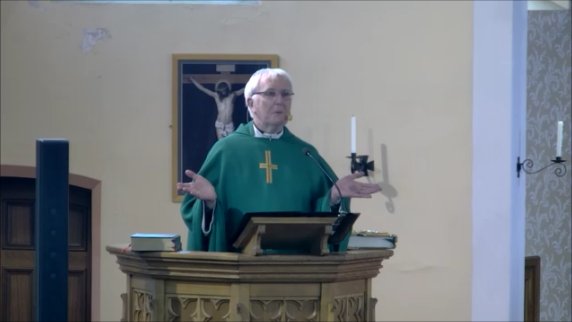
14.01.24 ~ 2nd SUNDAY IN ORDINARY TIME
(To hear audio file ~ click here)
A few years ago, at a wedding here at St Wulstan’s, the sister of the bride got up to read the very popular “Love is gentle, kind, generous” etc, from St Paul’s letter to the Corinthians, but, by mistake, started to read the one next to it, which begins with, “The body is not meant for fornication”, today’s second reading, which caused a few raised eyebrows, and possibly, a little uncomfortable shuffling in some of the pews. So, I stopped her and said, “That indeed is very true and very relevant for our times, but I think that by getting married your sister and her fiancé have got the message”.
When Paul wrote that letter, it was to a highly sexualised and licentious society, a bit like our own today, but probably a lot worse. Corinth was renowned for its pagan sanctuaries serviced by thousands of ‘sacred’ prostitutes. In the midst of all this depravity, what Paul was trying to get across to his Christian converts, was the dignity of the human person, ennobled with an immortal soul and destined for eternal life. Within those who receive baptism, the Holy Spirit lives as in a temple, with all the reverence that implies, so the body should be used for the glory of God, not as a plaything. Through Christ’s sacrifice, as he puts it, “You are not your own property. You have been bought and paid for”. In gratitude it’s only right that we carry on his work, remembering, as St Teresa of Avila said, “Christ now has no body but yours. Yours are the hands he uses to bless the world, yours the eyes to look compassion on the world, yours the feet he walks with to do good”.
So, how do we use our bodies to glorify God? Well, it’s a very personal thing, because we are all different. St Paul tells us the Church is the Body of Christ: Christ the Head, we the members. Just as the many different parts of a human body work together for the good of the whole person, so each one of us should work together for the growth and wellbeing of Christ’s Body. What we do and how we contribute, depends on the gifts and talents we have been blessed with, and how we believe God wants us to use them, which will become very clear if we pray Samuel’s prayer, “Speak, Lord, your servant is listening” and wait in silence for the answer. When I was thinking of the priesthood, I used to do that every day after school, in a church opposite the bus stop, while waiting for the school bus. And, look what happened!
We’re all called to do something good for God, not usually by a direct summons, as in the OT, like Abraham, Moses, or the young boy Samuel, but more often in a ‘dawning realisation’ kind of way. In today’s gospel we see the formal transition from the Old Covenant of God with the chosen people, to the New Covenant of God with the whole of mankind. John the Baptist, the last of the OT prophets, guides his two disciples to Christ, whom they recognise as the Messiah. So begins Jesus’ public ministry, in a style very different from the OT. Although he has many personal encounters with people, like the rich young man, the woman at the well, and the man born blind, he is more inclined to invite them to ‘Come and See’, spend time with him, then choose whether to stay. It’s the same call he has issued throughout the ages, and it’s for us who have answered it, to make it known to anyone we know who has not had the chance to hear it, as we try to do each time we run an Alpha Course, more especially when we offer an open welcome to anyone new who comes to our church.
I’ll finish with a quote Kim sent me from Pope Francis on church open-door policy and inclusivity for all who come: “We need saints without veils, without underwear. We need jeans and sneaker saints. We need saints who go to the movies, listen to music and hang out with their friends. We need saints who put God first and stand out in University. We need saints who find time to pray every day, and know how to fall in love with purity and chastity. We need modern day saints, 21st century saints, with spirituality embedded in our time. We need saints committed to the poor and necessary social change. We need saints who sanctify themselves in the world and are not afraid to live in the world. We need saints who drink Coke and eat hot dogs, who are internet users, who listen to Ipod. We need saints who love the Eucharist and who are not ashamed to have a beer or eat pizza on the weekend with friends. We need saints who love cinema, theatre, music, dance, sports. We need sociable, open, normal, friendly, joyful fellow saints. We need saints who are in the world and know how to taste the pure and good things of the world, but without being worldly. That has to be us!”
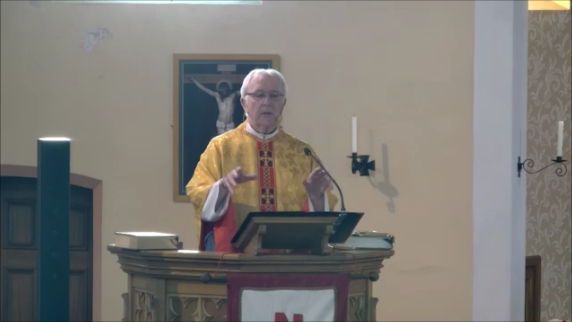
07.01.24 ~ THE EPIPHANY OF THE LORD
(To hear audio file ~ click here)
A few days ago I was having a conversation about how we can improve the way we run the Foodbank, and one of the things which came up was the fact that different volunteers do things differently which can cause confusion. Obviously we need to establish a common modus operandi, based on all volunteers understanding the bigger picture of our overall mission which is not just to give out food, but to help people improve their lives. Once everybody gets the full picture, things should go more smoothly. While saying this, for some reason the thought of Christopher Columbus came into my head. He had a similar, but far more dramatic problem, on his 1492 journey to discover America. Many of the crew, who believed the world was flat, and that you could easily sail off the edge into oblivion, wanted him to turn back before it was too late. Columbus, however, knowing that knowledge dispels fear, decided to give them the full picture. He showed them how he directed their course by the stars, using a tiny instrument and calculations discovered in the East long before his time. He knew that some stars, like the Pole star, never change position, so can be used as a constant source of reference. The stars, became their symbol of hope and inspiration. They shone in the darkness, giving not only guidance but the courage to go on, and the rest, as they say, is history.
Long before Columbus, the Magi set off into the unknown, leaving behind everything that was comfortable and familiar, to follow their particular star, with a similar belief in their calculations. No doubt they would have experienced setbacks too, like the little hiccup in Jerusalem, when they stopped off for guidance from the experts. But they were again filled with delight when it reappeared to lead them to complete their mission successfully. The gospel goes on to say that "they returned to their country by a different way". I would suggest that they also returned in a different way. As kings themselves, used to a life of privilege, they must have been astonished at finding the new born king, not in a palace, but lying on a bed of straw, in a stable, and wondered what it could all mean.
Back up the road in Jerusalem, consternation reigns. They’ve certainly no idea what it all means. Why would the God of Israel reveal news of a new-born Jewish king to pagans? This is not what the chief priests and scribes of the people, called together by Herod, would have deduced from Isaiah’s words “Arise shine out Jerusalem, for your light has come”. As far as they were concerned this referred exclusively to Israel, when it returned from exile and was welcomed by the sight of the rebuilt temple lit up by hundreds of candles. But Isaiah sees beyond this narrow vision, to a city not of this earth, the Heavenly Jerusalem, lit by the glory of the Lord, and open to anyone, something echoed in Pauls’s letter to the Ephesians. “This mystery which has now been revealed through the Holy Spirit to his holy apostles and prophets, means that pagans now share the same inheritance, that they are part of the same body, and that the same promise has been made to them in Jesus Christ”. The Magi were the first to fulfill today's prophecy from Isaiah, "The nations shall come to your light, and kings to your dawning brightness", and the first non Jews to experience the change of dynamics, from God’s particular relationship with Israel to an inclusive relationship with the whole of humanity
We often describe our own life as a journey, and here we all are, about to set off into the unknown territory of 2024. For some there may be a change of career, for others promotion or redundancy. For some a move with new people and new surroundings, for others marriage, a death in the family, or the birth of a child. Now, as we haven't got a clue what lies before us in this coming year, it makes sense to place our faith and hope in a guiding star, as did Columbus and the Magi. Our guiding star is, of course, Jesus the Way, the Truth and the Life. However, as we’ve seen, to follow a star may mean we have to change, adapt, or leave familiar and comfortable ways behind. We may even have to face misunderstanding and rejection. But we’ll never be lost or wander aimlessly. With Christ as guide we'll always have the courage to persevere on our journey of discovery, each stage of which, through God’s love and mercy, takes us a little further down the road to heaven.
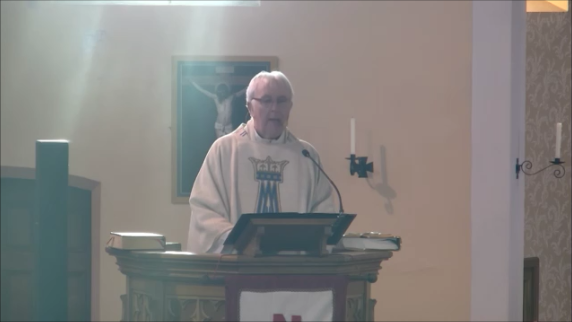
31.12.23 ~ SOLEMNITY OF THE HOLY FAMILY
(To hear audio file ~ click here)
A PASTORAL LETTER FROM THE BISHOP OF LANCASTER
for the SOLEMNITY OF THE HOLY FAMILY ~ 31.12.23
APPOINTED TO BE READ AT ALL PUBLIC MASSES IN ALL CHURCHES AND CHAPELS IN THE DIOCESE OF LANCASTER
ON THE WEEKEND OF 31st DECEMBER 2023
My dear people, Today’s Feast is a gift of hope for humanity and creation. We see a very young family keeping traditions of faith as an expression of their trust in a loving God. And that God is not far away; He is held in their arms. They show us God who entrusts Himself to us, daring to place Himself in our care. In the culture of today, I ask myself, was that wise? Did He do a risk-assessment?! Of course, it is an irrelevant question; being God, He knows exactly what is at stake.
Let us notice how Mary and Joseph let Simeon, a stranger, take their child in his arms. Having come into the world, the Infant-Lord is already going out beyond family confines. And what an influence He has! Simeon sings of God’s promises kept, and the Nunc dimmitis has become a beautiful hymn in the night prayer of the Church. What an aid for peaceful sleep; to pray Simeon’s words, believing that in spite of all that troubles us, the Lord has heard the cry of the poor and keeps His promise to save us even as we sleep.
A temptation of old age, I find, is to spend my time looking back. Part of that looking back will inevitably be on unfulfilled hopes and dreams, things that didn’t go the way I would have preferred. This is especially true when there is a constant stream of new crises and complications to deal with. Simeon and Anna come as the antidote for such temptations. They come as prophets of hope both for the people of Jesus’ day and for our own times.
How wonderful that we have these stories of Jesus’ infancy and childhood from Saint Luke and others from Saint Matthew. They open our hearts to Jesus and draw us into the mystery of His Life and Mission, firstly, by taking us back to the historic events themselves, but secondly by giving those same events a contemporary presence and relevance. They are for now.
Another temptation is to think that the Holy Family had things rather easy, since God would protect them and constantly guide them in a ‘Gold-star’ level of privileged life. That is not the case. They were subject to the randomness of this life just as we are. Their burden of responsibility was severe. Think of the responsibilities of keeping a small baby or adolescent healthy and safe, then listen to the news, and it becomes obvious how vulnerable even the most pampered child is. Vulnerability and weakness are appeals for trust and are ways into our lives chosen by God.
I end this Letter turning my thoughts to so many distressing places across the world, but particularly calling to mind the on-going catastrophes of Gaza and the Ukraine. How can we be prophets of hope in the face of such senseless destruction? How can we be Simeons and Annas for our brothers and sisters now? Believing that God is there can seem to make a mockery of faith, and yet that is what we must do because God does not stand back from violence and horror. He will not let evil have the last word. Our reason to hope is not of human origin but of God. We leave the miracles for God to perform, but He looks to us to live as people of hope. The coming of the Messiah once in Bethlehem, personally in our own times, and at the end of time give us sound justification for that hope. Let us follow the example of the young Holy Family by keeping our traditions of Faith in Him as generously as we can, in a spirit of Hope placed in Him, bearing fruit in Love of Him.
Jesus, Son of God, son of Mary, have mercy on us.
Holy Mary, mother of God, pray for us.
Saint Joseph, guardian of the Holy Family and guardian of the Church, pray for us.

Rt Rev Paul Swarbrick
Bishop of Lancaster
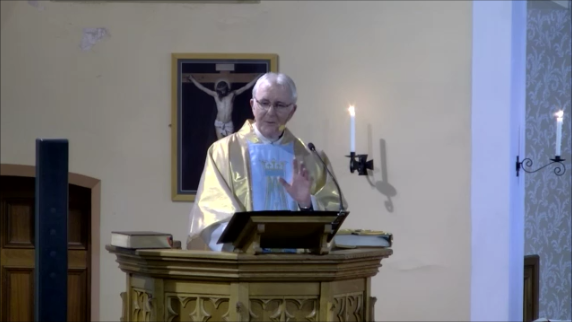
24.12.23 ~ CHRISTMAS MASS
(To hear audio file ~ click here)
Young people are very much in the news this week. We have an 8yr old girl, Bodhana Sivanandan, who has won first prize in the women’s European Chess championships, and is tipped as a future grand master. Then there’s a 16yr old darts prodigy, Luke Littler, who celebrates his wins with a kebab. (Big lad; must have had a lot of wins!) Closer to home, we have our own wonderfully talented young people. At Cardinal Allen on Friday, their music and singing was terrific, filled with joy – maybe because it was the last day of term and sausage butties were on sale after Mass. Several kids came up to say how much they’d enjoyed the Mass. One said, “You really carried it through today Father”.
Our own school Mass on Thursday was also a very joyful occasion. Of course, it’s much smaller than Cardy, so I have the chance to interact with the children. I love teasing answers out of them because, although they don’t always get it right, you know what they mean. For example, the Exodus, after the death of the first born in all houses not marked with the blood of the lamb, took place 1300 years before Christ was born. But one little guy told me: ‘The Exodus was when Jesus saved the first Jewish boy, by putting blood on his front door’. (And, in a way, I suppose he did).
At the Mass I spoke about how God sent the prophet Isaiah, to give a message to the Israelites who were in exile, as prisoners of the Babylonians, because they had turned their back on God. The message was, that if they turned back to God he would end their exile, and bring them home to Jerusalem. So, they did, because they saw light at the end of the tunnel. I then asked them what that expression means. Unusually, not a single hand went up, so I put it to the adults, one of whom answered ‘Hope’, and that opened the floodgates. Suddenly lots of children’s hands went up with words like, encouragement, relief, comfort, all of which helped me to lead them on to see how Christ is the light of the world, sent by God, to dispel the darkness which sometimes overwhelms us.
Children, of course, are like sponges, able to absorb reality in a “What you see is what you get” way, which is wonderful. What a pity we have to grow up! As adults, on the other hand, we have acquired the ability to reflect on what underlies the reality. Take for example Joseph and Mary’s arrival in Bethlehem. In the school nativity play there’s no room at the inn, but a kindly innkeeper lets them sleep in the barn. Problem solved – move on to the next scene with the shepherds. But in real life, can you imagine the stress and anxiety of trying to find accommodation, when your wife’s in labour and about to give birth? They are strangers who don’t belong. There’s no room for them. Could they have ever felt more lonely? Ring any bells with what’s going on today in many parts of the world?
At this time of the year, loneliness is felt very keenly, not only by those who live on their own, but by the bereaved, hospital patients, prisoners, refugees and victims of traffickers. Just three days ago I had an email from a temporary homeless man, who, with unconscious irony for this time of the year, wrote, “I’m desperate to get into a stable place before Christmas”.
This is the darkness of the world Jesus was born into, and to which he brings the light of hope, not as some pie in the sky when you die theory, but as the inspiration for all of us to do something about it, in the here and now, by practical help for any fellow human beings caught up in such tragedies. Thank God, as a parish, we really get that message, and always do what we can to help, be it for neighbours or unknown suffering brothers and sisters in a war-torn country. We know how the kindness of strangers can bring comfort, even in the most dire circumstances, as it did for Mary and Joseph, when the shepherds turned up at the smelly, dank stable. They would have had no idea that Gabriel had told the shepherds about the birth, so Joseph may have been a bit reluctant to let these rough looking guys in, but by the sacred law of hospitality he did. I like to think they may have helped him make things more comfortable for Mary and maybe shared their meagre rations with them.
In spite of all the bad stuff going on in the world around us, remember, the angels’ message was “Today I bring you news of great joy”. Christmas is all about Joy, not going around all day with a grin on your face, but the interior joy, which comes from knowing we are doing what Christ the light asked us to do. In Bible Alive there was a meditation the other day on how that sort of joy is be achieved in this life. Using the three letters of the actual word JOY, it says joy is the daily practice of love in the three most important areas of your life: J for Jesus, O for others and Y for yourself. Get those three right, and you’ll always have joy.
Getting back to the innocent, uncomplicated understanding children have, let yourself be filled with joy, like little five-year old Sharon in the Irish Poet, John Shea’s story about the Incarnation, who tells the adults, “… the baby was borned, and do you know who he was?” They watched as her quarter eyes inflated to silver dollars. “The Baby was God” she said. And she jumped in the air, whirled around, dived into the sofa, and buried her head under the cushion, which is the only proper response, to the Good News of the Incarnation.
May God bless you all.
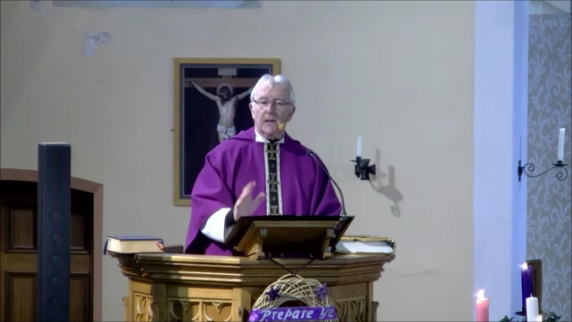
24.12.23 ~ FOURTH SUNDAY OF ADVENT
(To hear audio file ~ click here)
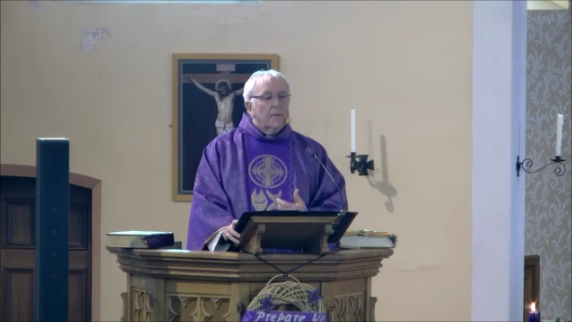
17.12.23 ~ THIRD SUNDAY OF ADVENT
(To hear audio file ~ click here)
On Friday I heard Sir Bradley Wiggins being interviewed about ‘Imposter Syndrome’. As he awaited his enoblement, he watched the other people being honoured that day. There were a number of war-wounded soldiers, people who had given outstanding community service, or had worked tirelessly for charity, so that he suddenly felt, “What am I doing here amongst these real heroes? I’m just a very good cyclist”. On the programme, it turned out that quite a lot of people have Imposter Syndrome, which means they don’t feel worthy of the adulation heaped upon them.
How do you deal with that syndrome? It’s a tricky one, because it’s natural to want to feel valued, so, to be honoured is a huge compliment. Part of the answer is to be found in being upfront and honest about who we really are. As we know, some people have turned down honours because of that. The person par excellence for honesty in this regard, is John the Baptist. In spite of the numbers coming to him for Baptism, many of whom think he must be the long awaited Messiah, he declares quite openly that he is not the Christ, simply “A voice that cries in the wilderness”. A voice on its own is just a noise, like a baby crying, unable to explain to you what’s wrong, because it has no words. To paraphrase St Augustine, “When I think about what I’m going to say, the word or message is already in my heart. I use the sound of my voice to bring the word to you, but then the voice dies away. However, the word doesn’t: it’s now in your heart but it’s also still in mine”. It’s the word which gives life. The voice is there purely to serve the word. John recognizes that he is merely the Voice: Jesus is the Word, made flesh. That’s why he proclaims, “I am not fit to undo his sandal straps: I must decrease, he must increase”, no imposter syndrome there.
To put it into context, up till now every OT prophecy has given hints about the one who is to come - the time of his coming, where he'll be born, the kind of life he'll live, the promises of Isaiah he will fulfill, how and where he'll die. No-one knows this better than the priests and levites who take very seriously, their responsibility to guard the Covenant God made with Moses, and to keep the people faithful to it. So, when they are sent by the Authorities in Jerusalem to Bethany, up North, where John was baptising, it’s to see if this strange creature was leading the people astray. At first it seems pretty harmless to them, people wanting their sins washed away, but then they’re told by John to prepare the way of the Lord. All they’ve ever read and believed about the Messiah is about to take place."There stands among you, unknown to you, the one who is coming after me". Those particular words were pretty hard for them to take, because if the Messiah was about to come, surely they’d be the first to know. What’s more his coming would be in Jerusalem, not in some country backwater.
2000 years after John’s prophecy was fulfilled, those words still ring true today. Yes, the Messiah has come, and yes he has fulfilled all the OT prophecies, but still, for many people, he stands among them, unknown. Most know the Christmas story, but not much beyond that, and yet the influence of his personality, life, death and resurrection is everywhere, schools, universities, art, literature, laws and institutions, church spires, massive cathedrals, even the little crosses people wear around their necks, the very way we mark dates in history as before or after Christ. No other person has ever had, or continues to have, so great an influence on the world, and yet, even if society recognises his cultural influence, it fails to know or understand him. This shouldn't surprise us too much, because even the very people who witnessed Jesus working miracles, fulfilling prophecies and teaching good news, missed those signs of God's presence in their midst. Many saw only a man of unusual talents. To recognise Christ living among us we should first meditate on his promise to be with us all days to the end of the world, through his Holy Spirit, and see how that actually plays out in our daily lives. We then need to see him working in authentic Christians who are not imposters, and learn from them. Both these things may help us to fulfil our own role as Christ bearers, called to make our lives a pointer to the Jesus living incognito in our world today, and hopefully draw us ever closer to him.
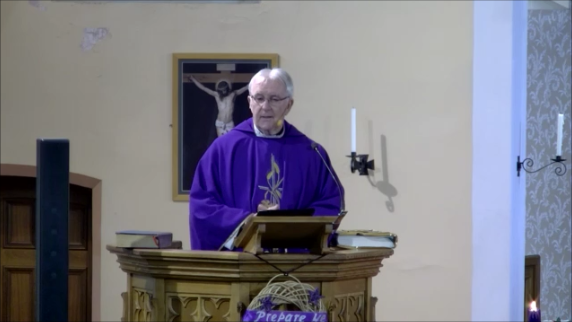
10.12.23 ~ SECOND SUNDAY OF ADVENT
(To hear audio file ~ click here)
As many of you will know, Jane, our Headteacher, will soon leave us to become Head at St Anthony’s in Preston. She’ll be a huge miss. However, time doesn’t stop still, so already the Governors are preparing to advertise for a new one. In the advert there will be a list of ‘Desirable’ and ‘Essential’ requirements, the latter of which candidates must have, in order to be considered for shortlisting.
At Friday’s feast of the Immaculate Conception, we read of original sin which caused the expulsion of Adam and Eve from Paradise. However, we also had the first promise of redemption. The serpent was told that a son of Eve would one day crush him with his heel. That son would be the Messiah, but how would we know he was the real deal? Well, in today’s 1st reading Isaiah sets out the essential characteristics the Messiah must have. He must be of David’s line, have a prophetic spirit, reveal God’s holiness, cause justice to develop between men and restore the peace of paradise, as set out in the vision of predators and prey eating together in perfect harmony. The question is, did Jesus have these essential characteristics? Can he be taken seriously as the bona fide Messiah? Well, apart from the restoration of paradise, he hasn’t done too badly. Although the wolf does not yet lie down with the lamb, Isaiah’s vision of heaven reveals how the present reality (all the misery, despair, wars and suffering we see) is pregnant with the hope of better things to come, although they may take a long time. Nobody knows when Christ will come again. So, what do we do in the meantime?
We live in a secular society infused with false promises of happiness, through consumerism and excess, which can make many people struggling with the cost of living, see all those cosy Christmas adverts on the tele as a cruel joke? As Christians, we can either give up on the hope of better things to come, because of the apathy and indifference to religion we see all around us, or we can act on the fact that the Messiah has come, be up front in showing there is hope, and confident in preaching the gospel, directly or indirectly. If we truly believe his Holy Spirit is with us here, now and always, we can agree with the Psalmist that “In his days justice shall flourish, and peace till the moon fails”.
As for giving up, Paul says everything written long ago in the scriptures, gives examples of people who did not give up, and were helped by God (Shadrach. Meshach, Abednego in the fiery furnace). He prays that God who helps us when we refuse to give up, will help us to help others not to give up. As regards preaching the gospel directly, .John Pridmore and I went to an Arts Council soiree for the Fleetwood lights. Among the invited guests was a guy who photographs wildlife and nature, in our area, and has over half a million people following his blog. John asked him outright did he ever give thanks to God for the wonder of the created things he photographs. He said No, but John pressed him and found he had been brought up Catholic. Who knows what may go through his head, next time he looks through his lens, at the beautiful things God’s hands have made for our delight?
For those of us who are not so direct and upfront as John, our indirect preaching of the gospel, is to accept that in this imperfect world, good and evil co-exist: we can’t eradicate evil, but we must do as much good as we can to alleviate suffering, help those struggling and imitate Christ in his compassion for the poor and marginalised. By doing all these things we show that we have taken on board John the Baptist’s message, to prepare the way of the Lord, whose kingdom is close at hand, by producing the appropriate fruit of good works. The Pharisees and Sadducees think they’re guaranteed heaven because “We have Abraham for our father”. Well, so do we and so do the Muslims, but that fact hasn’t brought about the deep and lasting peace, every man desires, as Palestine today tragically demonstrates. True religion is not lip service: it is the indwelling of the Holy Spirit in our hearts, as the prime mover in how we choose to follow Christ in the limited time we have on this earth. We know that here we have no abiding city, that our true homeland is in heaven, but we also know that our hope of achieving it lies very much in how we live now. So, “Prepare ye the way of the Lord”.
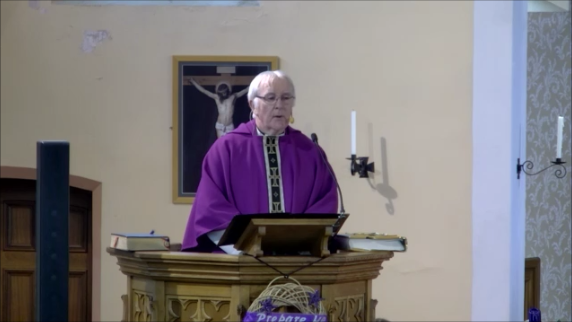
03.12.23 ~ FIRST SUNDAY OF ADVENT
(To hear audio file ~ click here)
A PASTORAL LETTER FROM THE BISHOP OF LANCASTER
for the FIRST SUNDAY OF ADVENT ~ 03.12.23
APPOINTED TO BE READ AT ALL PUBLIC MASSES IN ALL CHURCHES AND CHAPELS IN THE DIOCESE OF LANCASTER ON THE WEEKEND OF 3rd DECEMBER 2023
My dear people, Stay awake! What an appropriate way for me to address you as you settle back to listen to this Advent Pastoral Letter! Of course, these words come from the Lord Himself, and are addressed to each of us. How are we to understand this command He makes to His disciples? Let me ask you three more questions. What happens when we stay awake but let our Faith sleep? What consequences can we expect when we let our Charity sleep? What suffers when our Hope in Christ is dormant? See how we can be awake to all the joys and sorrows of this world, but live our lives as if Jesus never came, never spoke, and never taught us. We will live as if He never gave us His peace, joy, forgiveness, love or the gift of Himself or the gift of the Holy Spirit.
To let Faith, Hope and Charity sleep leaves us with nothing more than what this passing world has to offer. It leaves us with nothing more than ‘chance-charity’, random fortune and hope founded on nothing more than our own efforts. Something deep in every human heart will not accept this and refuses to be satisfied by what will not last.
When Faith sleeps society will be at liberty to re-design life, including human life. God-given truths will be lost sight of, and truth itself will be redefined in order to serve lesser purposes. The way of the Good Shepherd will not be known, so other ways will have to be created leading to other goals set by other people. Life itself will be measured by arbitrary values that are themselves constantly being changed.
Stay awake! Our Lord addresses these words to your Faith, your Hope and your Charity. Keep them nourished on the Gospel, the living Word of God. Keep them refreshed by meeting Christ regularly in the Mass where we are joined to the Body of Christ and saved from the dangers of isolation. When Faith, Hope and Charity are awake and alert we can recognise Jesus as our Messiah. We can understand the place of trials, suffering, disappointment and even failure, and still retain Hope because it is not built on our own effort or what is mundane; it is built on the Divine.
You already know that the purpose of Advent is to prepare us to celebrate the coming of our Saviour, Jesus Christ. You know of His first coming, in the womb of Mary, nine months before His birth in Bethlehem. You know of His Second Coming at the end of time, when He will come to judge the living and the dead. You also know how He comes to each of us in these days, in ways that are personal, profound, and miraculous. A wide-awake Faith tells us that His coming – in whatever way – is always and intervention of the Divine into the temporal, utterly of God, out of love for sinners. It tells us that the Lord has not given up on us but sees something in us we often do not see ourselves.
Stay awake! These words are for you because you must stay awake for the good of others. You are asked to keep Faith for the good of those who have lost theirs. You must be hopeful for others who can see no reason for hope. You must live charity, particularly where it is not yet known and not welcomed. Thus, those who are awake to the things of this created order may catch their first glimpse of the Creator, who made all things not out of nothing, but out of love.
There are those in society who must work when others sleep. Perhaps some of you listening to this Pastoral Letter are among them. Such work seems to put you out of step with others. It can be the same for us, we may appear out of step with many around us. But the work is important, the shift must be done, and Christ call us to it. As we begin this new Advent, let us remember with gratitude what Christ has done for love of us. His promise of eternal happiness still holds good, and even begins to spill over into this life. How? By keeping awake your Faith, your Hope, and your Charity.
With my blessing

Rt Rev Paul Swarbrick
Bishop of Lancaster
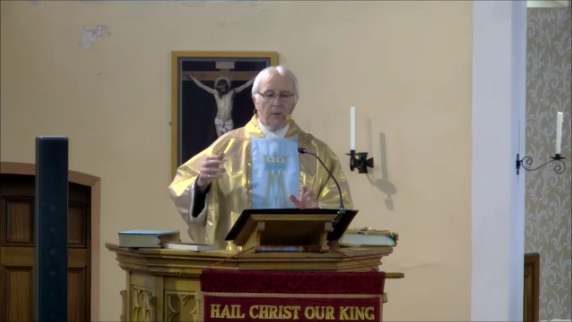
26.11.23 ~ CHRIST THE KING
(To hear audio file ~ click here)
At Bible share on Thursday, we started the Book of Daniel, in which he is summoned to interpret a dream the pagan king Nebuchadnezzar has, of a statue with a golden head, silver torso, bronze thighs, legs of iron and feet of clay. Daniel’s interpretation is bad news for the king. His empire of gold will be destroyed by other harder empires, one of which, the Roman, will rule with a rod of iron. Daniel also predicts that a stone, untouched by any hand, will strike the feet of clay causing the whole statue to collapse. In other words, no earthly empire can last forever or stand against the power of God.
Nevertheless, that didn’t stop Nebuchadnezzar erecting a huge golden statue of himself which people had to worship every time they heard a musical instrument playing, under pain of death. In the group, we posed the question, why would somebody, who is already the most powerful person around, want to demonstrate such complete domination of his people? The answer is simply because he can. The mega powerful can do virtually anything they want. Who’s going to stop them? Imagine a North Korean saying to Kim Jong Un, “I don’t agree with you spending all our money on building nuclear weapons when we’re all starving”. This is a guy who reputedly had his own uncle strapped to the end of a cannon barrel and blown to bits. Most dictators have acted in a similar way, ruling by fear and intimidation. But where are they all now, and where will current tyrants be in 50 years’ time?
Christ the everlasting king, whose feast we are celebrating today, is the stone mentioned by Daniel, which brings them all down. On one occasion in the gospels, when talking about the kingdom of heaven, and knowing many of those listening would not accept it, Jesus would echo Daniels’ words by saying, “The stone which the builders rejected, will become the corner stone” which he did, and continues to be. Unlike the statue, he does not have feet of clay, and that’s why he is still here, still reigning supreme and, unlike the tyrant rulers we see so often in history, Jesus shows that the real job of a king, is to protect and serve his people, as a shepherd cares for his sheep, and that can be hard work. Sometimes, looking for fresh grass they get lost in the mist and darkness and find themselves cut off from the rest of the flock or stuck on the wrong side of the fence or out on the road.
In the first reading from Ezekiel God says, “By standing up in the middle of my scattered sheep, I can keep the whole flock in view”. That’s a bit like what a teacher does in class. Standing in the middle she can see if a pupil is reading a comic inside a book or preparing paper pellets to flick with a ruler when no-one's looking. But she doesn't just stand in the middle to see if you are misbehaving. She’s also looking to see if you are in trouble. If you are doing science, maths, IT, or something really difficult, and she sees you with a painful look on your face, she knows you need help, and will make sure you get it. In a similar way, Jesus keeps his eye on us because, even though he’s shown us a good and safe way to live, we still sometimes manage to make a mess of things, just like the sheep. A good shepherd rescues his sheep from the trouble they get themselves into, brings back those who have strayed and got lost, bandages the wounded, and nurses the weak back to strength.
So, while it’s truly wonderful to know we have a shepherd king looking after us, for as long as we live, it’s also very important that we try to follow his example, by the care and love we show for others. In today’s gospel he is throwing out a challenge to us. He is asking us to persevere in living the kingdom values he gave us in the beatitudes, which we see in practical terms in today’s parable. “Will you look after and serve other people as I serve you? Will you feed the hungry, clothe the naked, visit the sick, make strangers welcome and try to bring back some of your friends who have strayed from the flock? Will you try to see me in other people, and treat them as you would like them to treat you?” Because, if you do, my Father will bless you and you will, one day, take for your heritage the kingdom I have prepared for you since the foundation of the world.
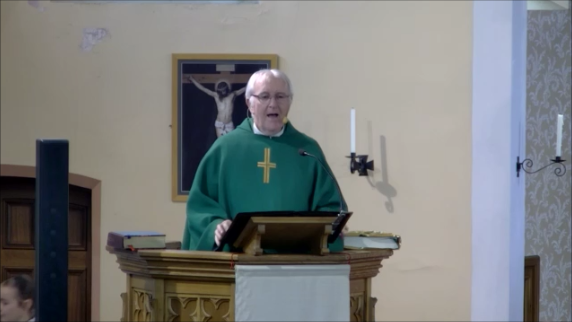
19.11.23 ~ 33rd SUNDAY IN ORDINARY TIME
(To hear audio file ~ click here)
I was listening to Gold radio in the car the other day and Dr Hook’s song “When you’re in love with a beautiful woman” came on. The point of the song is that to love a beautiful woman is bad news, because everybody else wants her too, so he ends up not being able to trust her, unlike the perfect wife in Proverbs, for whom charm is deceitful and beauty empty. She’s more interested in using her many talents, not only for her own family, but for the poor and needy. She sounds like Superwoman, which sounds a bit scary if she is being held up as an example of what every woman should be. However, Proverbs is part of the Wisdom literature in the Bible, which has many allegories, the main one being that Wisdom is God himself, seen particularly in the multifaceted work of the Holy Spirit, breathing life into people, inspiring us to seek perfection by using the many different talents we’ve been blessed with.
Ok, it seems that this particular lady was endowed with more talents than most, which at first sight seems a bit unfair, if, as we believe, God loves everyone equally. But bear in mind that from those who have more than their fair share of talents, much more will be expected. The burden of being multi-talented can sometimes outweigh the advantages. Each and every one of us has talent, some more than others, but, in God's eyes, the only thing that matters is that we use them. Talent is not just having certain skills. It's the ability to work at those skills to produce something which benefits the common good. That’s what made the perfect wife perfect. What's important is God has entrusted gifts to us according to our ability. Our part is to is to ensure he gets a return on his investment, which is the core message of today’s gospel parable.
Jesus tells this parable because the Jewish community has lost its enthusiasm, is resting on its laurels and doing the bare minimum required for a practicing Jew. There’s an element of that attitude around today also. I had a conversation recently with a couple I hadn’t seen at Mass for quite some time. They old me they go to a Vigil Mass in another parish and if I put one on they’ll come back here. It made me think, how on earth could a parish survive and flourish, if everyone thought, that being a Catholic, consists of just going to Mass once a week, at a time which suits your own personal lifestyle, with no involvement in parish life. Is that using the talents God gave you and intended you to use for the common good, the building up of the body of Christ and the spreading of the gospel?
The man who buried his talent is condemned because he didn’t use it. He had heard that his master was a hard man so decided that surely it was sensible to play it safe, hold on to what you have and be very careful when dealing with superiors with control. The other two did and were commended for making a profit. But the parables about the kingdom of heaven are not about safety, lack of risk taking and what the world thinks. They are about growth and the quality of life. Once we stop growing, being creative, or willing to try new ideas, we are old and beginning to die, and that can happen at twenty-five or eighty five. Spreading the gospel means making a profit for God by encouraging others to embrace it. To do so, you need flair, imagination, creativity, bags of which we have, and are blessed with in this parish. The last thing you are meant to do is sit in a metaphorical hole, hidden from view, hoping someone might be interested in something they have no idea you ve.
To live a lifetime as a Christian and end up with no more than we started with, is a distortion of the kingdom of heaven. To bury or misuse our talents is an insult to God, because they are given to us to use to glorify him by our service.
In the parable the Master did not give his property to them, but he lent it, according to their ability to make it work for him. When he got back, to those who did well he gave even more responsibilty. They weren't allowed to rest on their laurels.
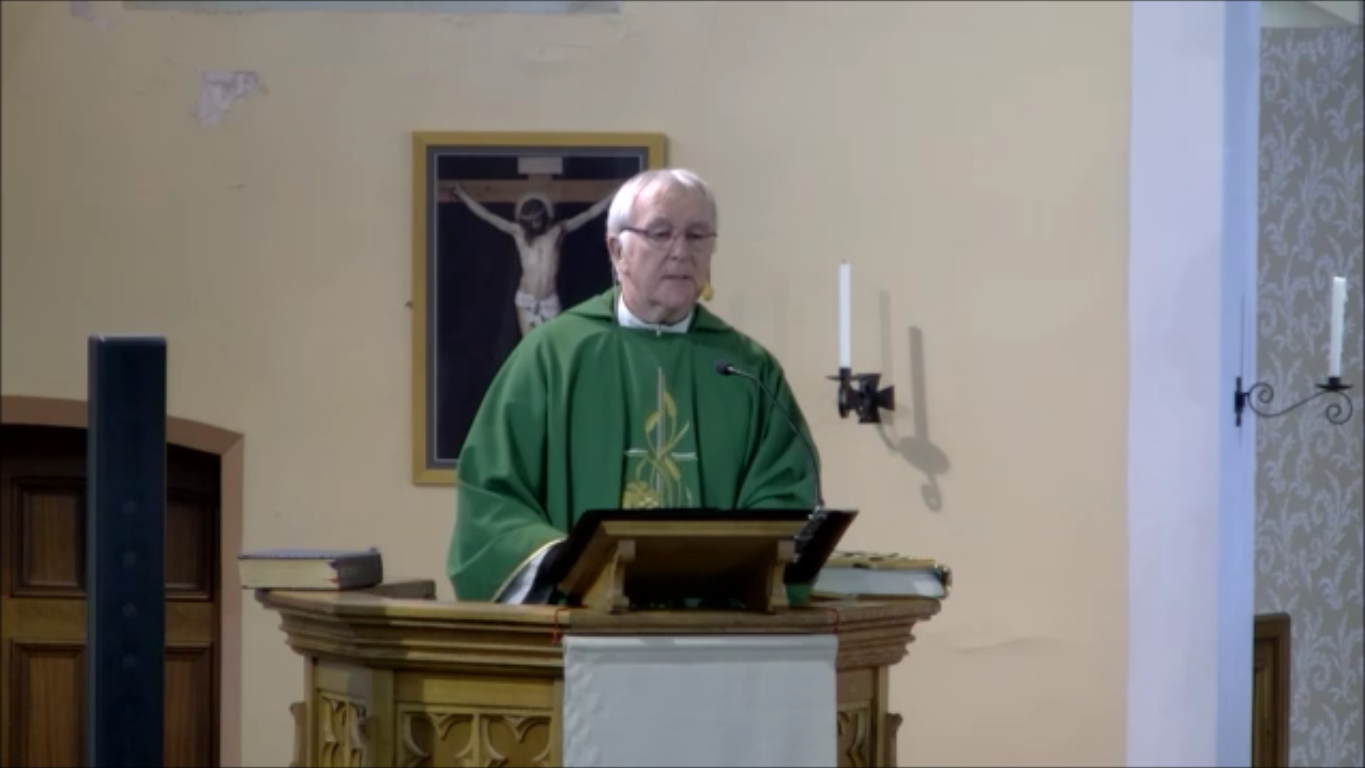
12.11.23 ~ 32nd SUNDAY IN ORDINARY TIME
(To hear audio file ~ click here)
November is traditionally a time when we not only pray for those we’ve loved and lost, but also reflect on own mortality. All the readings at this time of the year are about Christ’s Second Coming and the last judgement, when all will have to stand before Our Lord, and give an account of our lives.
In the early Church, many Christians believed the second coming was imminent and, like a certain race of people who reserve sun beds with their beach towels, built their tombs right in front of the Golden Gate, where they believed Jesus would enter Jerusalem, so that they could be first in the queue. Some were even worried that they might die before it happened and miss his triumphant return, as Christ the universal King, but Paul assured them that “Any of us who are left alive till the Lord’s coming will not have any advantage over those who have died”. He meant that, unlike Jesus’ first coming, which was quiet and largely unnoticed, his second coming will be unmissable, whether dead or alive, because it will signal the end of the world. It wasn’t long, though, before they began to realise, that as nobody knows when that will be, there’s no point hanging around waiting for it to happen. There’s work to be done. Jesus has given them a mission and they need to fulfil it. Whether it’s a long or a short wait for the Parousia, or our own personal death, we know for sure it’s going to come eventually. So, the wise thing to do, is to prepare for it as well as we can.
In the first reading we’re told “Be on the alert for wisdom, and anxiety will quickly leave you”. In normal life, being wise would mean things like providing for the future, building up reserves, saving for a rainy day, taking out Life Insurance, finding something to supplement our Pension. But the Wisdom Jesus refers to, goes way beyond what’s normal. He is talking about what we need to keep us fuelled up on our journey to meet him when he comes. In the parable of the bridesmaids, the girls have no idea when the bridegroom will come. Unless we are terminally ill, or about to be executed, nor do we. Like them we also get drowsy and lose concentration, or maybe just don’t want to think about it. Some may feel it isn’t going to happen for years, so decide to go through life with just the same amount of faith oil they got from primary school, rather than making sure their lamp is always fully topped up by the refill we receive here at Mass, by reading the scriptures or praying regularly. We all need to refuel regularly if we are to stay alight with the light of faith. Not to top up, the parable warns us, is a very risky strategy. So, don’t wait until all you have to offer God is the fag end of your life, and or you may find yourself pleading, “Lord, Lord, open the door for us”. No-one wants to hear those chilling words, “I tell you solemnly, I do not know you.”
Another, more unusual, interpretation of the parable is that the bridesmaids are sleeping the sleep of death, and that they will remain asleep until Christ, the bridegroom, comes to awaken them, and take them into the geat wedding feast of heaven. Be that as it may, whether they’re dead or just asleep, the message is still the same: it’s how they’ve prepared for it beforehand that really counts. Same goes for us. By all means, live a full life, but also cultivate, and put into practice, those virtues which prepare us to be ready and waiting for Christ when he comes. We mustn’t sleep our lives away, or walk about in a dream, unconscious or ignoring the reality of our death. If we’ve prepared well, we know a wonderfully exciting meeting, face to face with Christ, awaits us when, hopefully, we’ll hear those beautiful words, “Well done, good and faithful servant. Come, enjoy your master’s happiness”.
But, what about people who think they’ve made too many mistakes, that it’s too late now to change their ways, and whose lamps are almost empty? Well, it’s essential; that they realise that it’s never too late. In the words of St John-Paul II: “Remember the past with gratitude, live the present with enthusiasm, and look forward to the future with confidence.” In other words, banish all regrets about the past, all negativity about the present, and all anxiety about the future, because at this moment we are living in the presence of God. This day is his gift to us, and how we use it is our gift to him.”
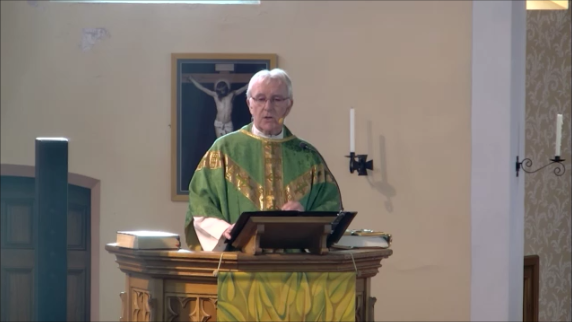
05.11.23 ~ 31st SUNDAY IN ORDINARY TIME
(To hear audio file ~ click here)
As you know an essential part of a priest’s work is preaching, and generally speaking, a homily will be addressed to the community, as a whole, on the things all of us should be doing to lead a good life. But, every so often you see something specific, which makes you sit up and read it again, like that phrase from the prophet Malachi today: “And now, priests, this warning is for you!” Oh, oh, I know where this is going, and it’s not going to be pleasant listening for people like me. And, what’s worse, is that the other two readings follow the same theme, especially the gospel, where Our Lord says anybody responsible for a community, mustn’t big himself up with titles that are reserved to God.
It reminds me of something else he said to the apostles, “You have seen how pagan kings Lord it over people and great men make their authority felt: this is not to happen with you”. In living memory, we have seen the self-aggrandisement secular leaders have heaped on themselves, wanting to be looked up to and highly esteemed. Adolf Hitler rejoiced in being called the Fuhrer or leader. Self-styled Field Marshall, Idi Amin awarded himself the VC, DSO and MC. In N Korea, Kim Jong-un, is fawned upon as the Beloved Leader, in a system like Animal Farm, where all men are equal, but some are more equal than others. Then there’s Donald Trump, shyly affirming he’s the best president there’s ever been. This is not the type of leadership Jesus endorses. ”The Son of Man came to serve not to be served”.
When I was Chaplain at Sandhurst, helping to mold the Army’s future leaders, part of the training was Riot Control in a built-up area, in preparation for deployment to NI. The acting rioters were squaddies, delighted with the chance to legally clobber the Ruperts and Henrys. Some cadets were naturals who got stuck in, while others lingered at the rear and just shouted encouragement to those at the front. On assessment they would be described as ‘leading from the back’, which, as we gear up towards Remembrance Sunday, is a sad reminder of the situation in WW1, with Senior Officers living in hotels far from the front line, while the Toms fought in the trenches: lions led by donkeys. It’s no accident that today, the motto of Sandhurst is “Serve to Lead” an echo of the Servant King.
So, what makes a good leader? How does he play his part? Every actor knows that if he is to be credible to the audience, he must really believe in the role he’s playing. One such great actor is Daniel Day Lewis. When he accepted the role of Gerry Conlon, in the film about the Guilford Four, called “In the name of the Father’, he spent 6 months living on the Ballymurphy estate, off the Falls Road in Belfast, not just learning the accent but steeping himself in the culture and life of a Republican Catholic Community, and his performance was brilliant. Similarly, every community leader should be steeped in the life of his people. He should be someone who is prepared to roll his sleeves up, get to work, and use his time, talents and energy in the pursuit of something worthwhile, which he truly believes in. The only difference is that he must not be an actor, but the genuine article, something Our Lord picks up on quite savagely in the gospel.
It’s quite clear that he detests the hypocrisy of the scribes and pharisees because of the damage it’s doing to the people. Being experts in the law, they demanded unswerving obedience to it but flouted it themselves - echoes of Downing Street and Covid here - and made no allowance for human frailty, which causes all of us to fall short of the law sometimes. They gave the impression that God gives hard rules and impossible demands without help or compassion. In Jesus’ eyes, nothing could be further from the truth. As the good shepherd he sees us as sheep who need gentle guidance and encouragement to move in the right direction and is prepared to lead from the front. People respond to that as did St Paul in the way he led the Thessalonians: “Like a mother feeding and looking after her own children, I feel devoted and protective towards you”. It’s an example of leadership all of us priests should take to heart. Maybe Malachy’s warning is simply not to take ourselves too seriously, be open minded and ready to accept in all humility that we don’t always practice what we preach.
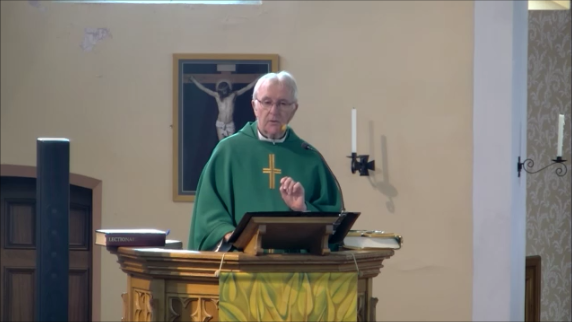
29.10.23 ~ 30th SUNDAY IN ORDINARY TIME
(To hear audio file ~ click here)
Recently, I finished reading a book by Primo Levi who, as a young man of 25, survived 18 months in a concentration camp, before being liberated by the Russians, followed by the ordeal of making his way home to Italy. On the way, he talks to a fellow survivor, about the peace he imagines is going to envelope the world, which will surely never allow such misery to happen again, but his friend replies, “There’ll always be war”: and he was right. While writing this homily I had in the back of my mind what’s currently going on in Palestine, Ukraine, Sudan and many other countries, which makes today’s scriptures really tough to deal with, since they set out a completely different way of living.
We live in a secular society which wants to push religion to the margins, keep it out of politics, and ignore the moral compass faith offers, not just to individuals, but to governments, society and culture, so, it would see today’s readings as naïve and irrelevant. But are they? Far from it. To take these scriptures seriously, offers a realistic and practical way out, of the morass of misery men inflict on each other, because they offer us the chance to see others as God sees them, rather than as a commodity to be exploited for personal gain. In a nutshell the readings are based on the golden rule common to most cultures – ‘Don’t do to others what you wouldn’t want them to do to you’.
In Exodus, God reminds Israel that they had been strangers in Egypt – slaves even – and because they know how awful that was, they should have pity on strangers, as God had had pity on them. “If you molest or oppress them, If the orphan or widow you are harsh to, cry to me, I will listen”. How many hundreds of women and children, from both sides in Palestine, have been made orphans and widows these last few weeks, by people who believe in God? Yet, Moses makes it clear that worship of God can never be detached from care for others, that treating the most needy and vulnerable with pity and justice, is a divine commandment. He warns that God will respond accordingly if it is not done. There will be a reckoning, something all protagonists of injustice ought to keep in mind.
Unfortunately, by the time Jesus came along, that noble ideal of care for others, which Moses had insisted on, as integral to worship of God, had been reduced to just getting on with people, by keeping the commandments not to steal, kill or bear false witness. Jesus restores the link by making proactive love of God and neighbour, one single commandment, which does not allow the Pharisaic distinction between classes of people, the so-called righteous as opposed to tax collectors and sinners. In God’s eyes, all people are loved equally: accordingly, we too must see everyone with God’s eyes of love. But how do we get that across to men of violence who refuse to listen to Jesus? In last Friday’s gospel Jesus tells his followers to settle scores with their opponent before going to court. He means dialogue is the answer. Who would ever have thought we’d see an end to the Troubles in NI or Apartheid in SA? OK, neither solution was perfect, but they’re not killing each other on a daily basis now. The Middle East will always be a tough nut to crack, but nothing is impossible to God.
So what can we do about it? Well, from little acorns mighty oak trees grow. Most great movements, trying to bring monumental change for the good, start slowly. As individuals we can’t stop wars happening, but we can refuse to accept them as inevitable, and show by example that there are other ways than conflict to resolve differences. As we see in Paul’s letter to the Thessalonians, he had great success in his missionary work because his converts learnt from his good example and, in turn, other people learned from them. In a letter he wrote to the Ephesians he showed them how to stop the buildup of hatred before it really catches fire. He said “Do not use harmful words in talking. Use only helpful words that build people up and do good to those who hear you. Get rid of all bitterness, passion and anger. No more shouting or insults. No more hateful feelings of any sort. Instead, be kind and tender hearted to one another, and forgive one another as God has forgiven you in Christ”. Is there a better way than that to keep those two commandments of love Christ asks of us today?
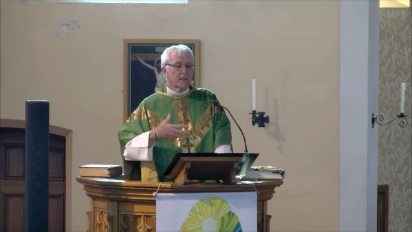
22.10.23 ~ 29th SUNDAY IN ORDINARY TIME
(To hear audio file ~ click here)
God moves in mysteries ways, his wonders to perform. In today’s first reading the context is that the Israelites have been in Babylonian captivity for 70 years. All through that time they have been assured by the prophets, especially Isaiah, in the book of consolation, that they will be rescued and restored to Jerusalem. Today we see the prophecy about to be fulfilled, but in the most unexpected way. Their redeemer is not one of their own, but a pagan king called Cyrus, whom God has anointed to conquer Babylon and set his people free. It’s as though God is tearing up the rule book of how politics normally work, where leaders are usually motivated by vested interests in their own people.
In the gospel Jesus also tears up the rule book. As a bit of background, the Herodians were very much in favour of Roman rule because of all the advantages it brought, while the Pharisees were dead against it, especially pagan worship of the Emperor, even though they used coins containing his divine image. In dealing with the trap they’ve set for him, it looks, at first, like Jesus is giving them a lesson, on how to survive by using political expediency, but what he’s actually doing is defending the innate dignity of every person, created in God’s image and likeness, which does not depend on the whimsical nature of the society or Regime in which they find themselves, especially those ideologies which either have no room for God, or create a hold over society which, in the worst cases eg Nazism and atheistic communism, enslaves the human soul, which properly belongs only to God.
We have seen this happen many times throughout history, by pretentious rulers who claim absolute power and destroy anyone who dares to oppose it. It’s still happening today in dictatorships like China, Myanmar, Russia, Nicaragua. In such circumstances, not to render to Caesar can cost you your life, as can trying to render to God what is God’s. Here in England, while nowhere near faced with such stark choices, there are, nevertheless, issues of conflicting allegiances which we may have to address, as well as certain moral issues which conflict with our Christian faith. So, it’s essential to get the balance right, between living according to the image imprinted on us in baptism by the Holy Spirit, and living in the physical world of Caesar, who so often represents money and materialism. As Catholics, we must always be good, law-abiding citizens, but also make sure that God comes first in our lives. We are to be in the world but not of the world. How does that work in practice?
Sometimes, such a question can best be answered by looking at how it doesn’t work. This week I’ve been watching a programme on BBC iplayer called ‘The Reckoning’. It’s about Jimmy Savile. In one episode he has a very close relationship with Margaret Thatcher who, you may remember, in her role as Caesar, coined that infamous phrase, “There’s no such thing as Society”. That was her attempt to encourage individuals, by private enterprise, to create as much wealth as possible, which, in theory, would inevitably trickle down to those in need. It didn’t. Although, as part of Caesar’s entourage, he rendered homage to her, Savile also projected himself as a very high-profile Catholic rendering to God what is God’s, by raising millions of pounds for charity, including rebuilding Stoke Mandeville hospital, for which he was given a Knighthood. But, as we know now, behind the façade of doing God’s will was a cover for some horrendous evil. He was in the world and of the world. People suspected foul play but in a liberal, ‘anything goes’, Society, most people were reluctant to challenge.
The lack of a moral compass gives people carte-blanche to go with the flow, but, at the same time, causes our God-given dignity to be compromised if we lose sight of our objective. Hopefully, none of us will ever lose our sense of direction, to such an extent, that we fail to render to God what is God’s. Our Lord is realistic enough to know that we can’t cocoon ourselves away from the world in which we must work to earn our bread, but he gently reminds us that we have other obligations that are far more demanding. However, these are, literally, infinitely more rewarding, because they serve our God, the only absolute power, whose supreme authority overrides anything this world can produce.
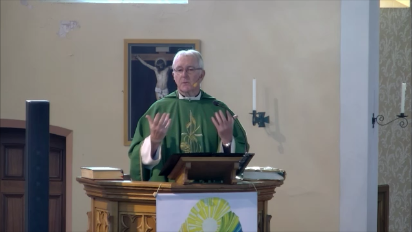
15.10.23 ~ 28th SUNDAY IN ORDINARY TIME
(To hear audio file ~ click here)
As some of you know, when Fr Draper and I go on holiday, something always goes wrong. This year when we checked in at the Jet 2 desk, they couldn’t find us anywhere on the list. Not surprising, really - we were flying with Easyjet! Then he booked us into a hotel for the wrong night, and later I got nicked for speeding. But apart from that, it was a great holiday, so wonderful to walk once again in the footsteps of St Paul, Phillipi being my personal favourite, sitting beside the river where Paul met Lydia, who became the first European, ever, to be baptized, along with her family. There’s a most beautiful basilica next to the site.
Although holidays are nearly always something to look forward to, there is often a lot of hassle involved, especially if you’re flying – long queues, security checks, not enough legroom, rowdy passengers, supposedly fantastic offers of stuff nobody wants to buy, and sometimes lengthy delays. It can be a very boring experience, yet, for all that, we happily climb aboard, and sit in the same upright position for hours, simply because of the delights which await us at the other end. Besides holiday hassles, there are lots of other necessary evils we are prepared to endure, to obtain happiness, be it ever so brief. A university degree means much study: excelling at sport or music means much training and practice, but it’s all worthwhile in the end. The pursuit of happiness is part of the rhythm of life. But, one day that rhythm will end – so what then?
Today’s scripture readings try to address our common experience of death, whether it’s sudden or natural, by injecting a note of profound joy, where we normally see only grief and sadness. In Isaiah death is portrayed in the image of a huge feast, the end of misery, and the happiness of eternity. "On this mountain, the Lord of hosts...will remove the mourning veil covering all peoples, and the shroud enwrapping all nations". It’s an acknowledgement, first and foremost, that the world can be an evil and frightening place, that good and evil coexist, that some people think they have the right to kill or maim other human beings for a cause, something we are witnessing today, in the tragedy unfolding in Palestine, which is going to end very badly for the people of both sides, many of whom are hellbent on destroying each other. But that’s not the way God planned it!
In the gospel Our Lord builds on Isaiah’s ‘Messianic Banquet’ with the wedding feast parable, in which the king is God, the bridegroom is Jesus. The servants sent to the Jews are the prophets, whose job is to prepare them for the coming of the Messiah, but all are ignored. So, the king sends out more messengers, eg John the Baptist, this time to anyone who will listen, with the message the feast is ready, the Messiah is here, and everybody, but everybody, is invited, even the most undeserving. This story must have infuriated the chief priests, who obviously realize it’s directed at them. They reject his message, convinced that they’ll still get to heaven, simply because of who they are. What they fail to realize is that Jesus is not talking about future pie in the sky when we die, but the here and now. His mission is not to focus only on heaven, as if this life doesn’t count for anything, but to establish the kingdom of God on earth which, whether they like it or not, will include all nations. He does not want us to ignore real life, but to engage in the nitty gritty, the hassle, the courageous commitment to carry out his will, in the daily rhythm of life, wherever we live and move and have our being. Only by doing that can we hope to bring peace, justice and dignity into this violent world
Naturally, as Catholics, we think of the Mass as a foretaste of the heavenly banquet, to which everyone is invited. Some accept and some don’t, and everybody has their reasons. Often, people who are prepared to spend hours of boredom, in a plane, for a relatively short pleasure, do not consider one hour in church worth the effort, to obtain the greatest joy of all, which lasts forever. In the parable, it’s plain to see that merely accepting the invitation does not guarantee participation in the banquet. The guy who only paid lip service to the invitation, for what he could get out of it, had no wish to be part of the kingdom of God, and so had to go. Lots of people live their lives like that, taking what’s on offer but giving nothing in return. But, many of the people invited, as a sign of respect and gratitude, did put on the garment of God’s love which made them welcome at the table. When we come to God's house with sorrow for our failures, gratitude for his mercy, and the desire to change our ways, we show that we are there firstly to please him, not for what we can get out of it. The wedding garment we put on says “Thank you Lord for the invitation. I’m delighted to be here”.
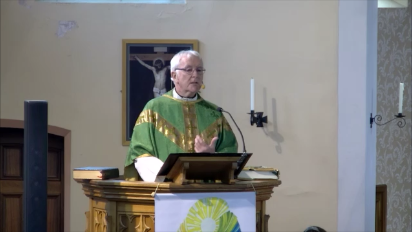
01.10.23 ~ 26th SUNDAY IN ORDINARY TIME
(To hear audio file ~ click here)
I remember when I was posted to Hanover, playing my first game for a garrison team, when the ball came to me in a perfect arc and I met it on the volley. Nine times out of ten it would have gone soaring over the bar, but this one went in. My new teammates were really impressed. However, due to the awful weather, we didn’t play again for 6 weeks, so I was able to live on that goal for all that time. I never scored another, by the way. In football, they say you’re only as good as your last game.
In today’s scriptures there’s a similar message about living on past glories, something Jesus tackles head on with the chief priests and elders. At first, he probably expected to find in them, the religious guardians of the people, great allies for the good news he was bringing. So, when they rejected him, he must have felt sad that they were unable to see what God was doing. He told them the story of the two sons. The older talked a good game, “Certainly, Sir”, but did nothing. The younger was mean and ungracious, “I will not serve”, but in the end he did the will of his Father. He reminded them that when John the Baptist called everyone to conversion, they refused to listen, but public sinners did listen, accept his baptism and change their ways. God touched those who initially said, “I will not go, I will not serve” and they had thought better of it and gone. Surely, John’s success with tax collectors and prostitutes, such unlikely material, should have alerted them to recognise that it was a work of God. The elders were the older son, living on the past glories of being descended from Abraham, paying lip service and failing to exercise mercy and compassion, in true obedience of the heart..
What comes through very clearly from that story is that salvation is a living thing concerned with the present and our behaviour today. Just as we can’t live forever on past glories, nor can we presume we are damned for all time for past offences. As Ezekiel points out, if a man changes his ways, God is prepared to forget his earlier lapses in favour of the good he is doing now. But what motivates a sinner to change his ways? In his public life, Jesus met many people who had, to all appearances, fled from God by their irreligious lifestyles or personal circumstances. When challenged by the authorities about his association with them, he replied that healthy people don’t need a doctor, but sick people do. He was here to restore sinners to spiritual health, some of whom may well have made their minds up that religion was not for them. He seeks them out, like the Hound from Heaven in Francis Thompson’s famous poem. He sees the hidden potential of a rebellious heart and knows that a path for grace to get to it, isn’t necessarily blocked for ever. of It is clear that Jesus never wrote anybody off. Over the centuries millions of sinners, by the grace of God and example of good people around them, have come to know this and have been given the confidence to turn their lives around.
Another major lesson of the story is that personal responsibility is paramount. We are responsible for our own actions. The reason I mention that is because of the current trend to place collective guilt on countries or institutions for the sins of their fathers. In Ezekiel it is made clear that God does not dwell upon our past, nor upon the faults of our ancestors. That’s why I want to shout out “Stop apologising for the sins of the past – we didn’t commit them!” That does not mean we should ignore the past, rather that we should learn from it and, in our more enlightened age, do everything we can to stop it happening again. Assigning collective guilt also dishonours the thousands of good people who refused to be part of such madness and often paid for it with their lives, like the Ulma family beatified two weeks ago, all of whom were murdered by the Nazis for sheltering Jews.
So, good people, if we know of anyone, friends or family members who think that because they’ve done something awful in their life, they can’t be forgiven, tell them to think again. Like you or me, they may well have said at one time “I will not go. I will not serve” but have since thought better of it, and are now trying to do God’s will. Reassure them, as we ourselves are assured, that the past is forgotten by God and that nothing but the love, mercy and forgiveness of God is ours.
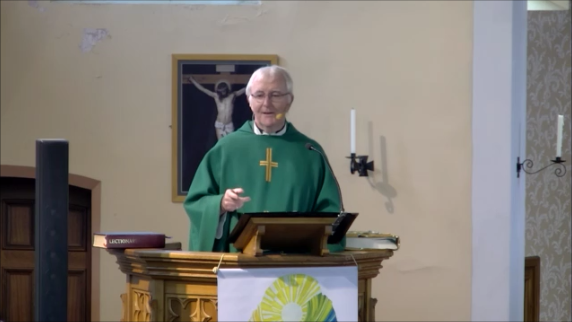
24.09.23 ~ 25th SUNDAY IN ORDINARY TIME
(To hear audio file ~ click here)
I read a fascinating article in the Pastoral Review this week about two things which describe our lives as human beings - Subject and Consumer. The story starts 10,000 years ago when men began to farm. Soon they laid claim to certain areas and imposed boundaries. To defend and protect them, leaders emerged, to whom they gave allegiance and so became dependent Subjects. In the 19th Century, due mainly to the industrial revolution, and the use of the world’s resources, men became independent Consumers. Both these traits still exist, but now, there’s a new story taking place, with the realisation, especially as regards climate change, that we are all in this together. So, we’re slowly moving from dependence and independence, to interdependence, and we need everyone involved, no matter how long it takes to join in and take an active part.
In some ways, there’s an echo of this thinking in today’s parable. Firstly, I think the landowner is trying to teach that we all need each other. It’s not just about individual reward, which is how men see it, because, as Isaiah says, “God’s ways are infinitely above the thoughts of men”. This story is about God’s desire for all people to be saved and go to heaven, even if it’s only by a deathbed conversion, like Lord Marchmain’s in ‘Brideshead Revisited’ and we should rejoice when such a thing happens. When you think about it, in God’s plan, we Christians are latecomers, compared with the people of Israel who were called first, yet, from the day we accepted him, we’ve had the same loving care as they did. Likewise, anyone seeking God with a sincere heart, no matter how many years it takes to accept his offer to work in his vineyard, will receive the same rewards as we have.
Another reason for Jesus telling this parable, is to justify and defend himself, against the hostility of those in authority, who reproach him for spending time with tax collectors, sinners and people of questionable morality, as he had done with St Matthew, whose feast day we celebrated on Thursday. Incidentally, at a class Mass that day, I used the example of St Matthew to teach the children that, when somebody bad is forgiven by God, they are expected to forgive others in return, amend their life, and start doing good to make up for it. The children presented me with hearts, on which they’d written examples of how they had forgiven other children, for offences against them, eg, ‘I forgive my brother for being mean to me by taking my Xbox Controller’. All the other hearts were in similar vein, except for one, which said, “I blame my sister for the things I did”. Not sure if he got the message.
Back to the parable. Its main message is to be found in the key phrase ”Why be envious because I am generous?” It’s not about fairness. It took at least a denarius a day to feed a family, so those hired first accepted it as a fair wage. But, whether a man worked a whole day or just one hour, it still took a denarius to feed his family. The landowner knows this, that’s why he gives the latecomers the same amount. It’s what they need, not what they’ve earned. God, the generous landowner, knows everyone needs mercy because we’re all sinners. Those of us who have experienced his love and forgiveness all our lives, through the beautiful sacrament of confession, know how good that feels. Why would we begrudge anyone the same divine forgiveness, no matter how late in their lives?
Remembering that “God’s ways are not man’s ways”, and looking at man’s perpetual desire to do things his own way, eg starting wars, building walls or over consuming the earth’s resources, I was reading an article about the recently defeated young President of Chile, who said, as he left office: “We squandered an opportunity, because we did not listen to those who thought differently to us. We appeal to the winners not to make the same mistake”. He paid a high price for some wisdom already freely available in the history books. To do things as God wants us to, Isaiah says “Seek the Lord while he is still to be found”. Don’t miss the opportunity, like the young Chilean President, to listen to him, who thinks differently to us, but whose ways are infinitely above the thoughts of men.
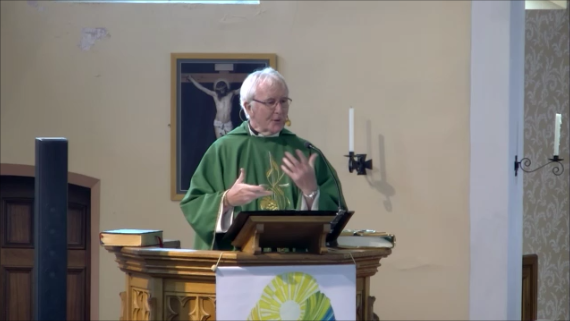
17.09.23 ~ 24th SUNDAY IN ORDINARY TIME
(To hear audio file ~ click here)
I’ve been watching some re-runs of Rumpole of the Bailey recently, one of which concerned an Art Forger who actually wanted to be found guilty, and sent to jail, for a forgery which sold for £48,000. Because it was so good, it meant that, although he would go to jail, people would hail him as better than the real artist, a renowned genius, who had had an affair with his wife. How sweet would be his revenge! Unfortunately for him, Rumpole was able to prove that the painting was in fact the original.
The desire for revenge can be very strong, and there are many ways of extracting it, some obvious like tit for tat, others more subtle, as with our forger who thought it better to serve his revenge cold.
In today’s scriptures, however, revenge taken by us, is not something God approves of at all. “He who extracts vengeance will experience the vengeance of the Lord who keeps strict account of sin”. In other words, God is aware that revenge takers may not be entirely innocent themselves, which comes through quite strongly in the parable of the unforgiving servant. What was going through his head I wonder? Was he the kind of bloke who was always dreaming up hair-brained schemes to get rich quick and accumulating great debts in the process? What a stroke of luck to have all his debts wiped out by the king. “And why not? He’s got lots of money, my debt doesn’t matter to him.” It’s the same argument some people use to steal from large stores or big business. “They’re rich, they’ll never miss it.” Maybe he imagined writing off such massive debt hardly cost the King a thought. Either way, he was so focused on himself, that cancelling the debt of his fellow servant was never going to happen. In the parable, the merciful king is God, and, like our debtor, perhaps some people think the forgiveness of our debts cost God very little, when in fact it cost him the life of his Son.
Be that as it may, if it is God we are asking forgiveness from, it’s guaranteed. So, we’re faced with the uncomfortable thought that while God forgives us everything, we are not always quick to do the same to each other. Why is that? Could it be that withholding forgiveness is a way of asserting strength. If I am the innocent, wounded party, I am in a powerful position. I can apportion blame and demand punishment. But, what if I am the guilty party? I must beg people to listen to the mitigating circumstances for why I did what I did. I try to explain the pressure I was under, the stress I have been suffering from recently, that caused me to act or speak so thoughtlessly. I say I am sorry and hope for understanding and forgiveness from those I have wronged.
Thank God we never have to grovel like that when we seek God’s forgiveness. In the gospel when it says, “Peter went up to Jesus to ask ‘Lord how often must I forgive my brother if he wrongs me?’” it made me wonder if he had just had a row with someone, and, because he knows Jesus’ insistence on mercy and forgiveness, just wants to see if there are any exceptions for certain people. Or it might be that, because Jesus has just given him the power to forgive sins, he simply wants to check out the limits – surely not as many as seven times? In the parable he gets a very clear answer.
In the reality of today’s world, full of all sorts of conflict and strife, is Jesus asking the impossible of us with his 70x7 times? Well, he never asks anything of us which he wasn’t prepared to do himself. From the cross, he takes forgiveness to the absolute maximum, when he prays for the very people who are torturing him to death, “Father, forgive them, they know not what they do.”
In conclusion, then, when we are hurt, disappointed, angry, or badly treated by someone, we have two choices. Either to wait for the opportunity to strike back, or to offer all our hurt to God, while praying for those who caused it. If we choose the second way, we will allow his healing grace to work in us, no matter how long it takes, till we too can forgive our brother from the heart. If, however, we simply can’t do that, the fact remains that an unforgiving Christian may one day meet an unforgiving God. Only those who practice mercy can expect to receive mercy.
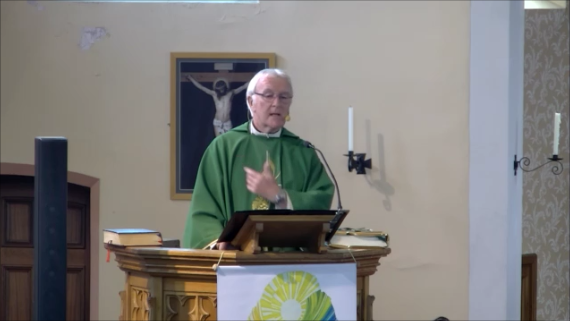
10.09.23 ~ 23rd SUNDAY IN ORDINARY TIME
(To hear audio file ~ click here)
One of the joys of meditating on scripture is the serendipity experienced when it immediately relates to what’s going on around us. For example, today, we have the prophet Ezekiel being commanded by God to be a sentry to the House of Israel. As it happens, all this week, those of us on pilgrimage to Krakow, were able to listen to a bugler playing a call to arms, from a top window of St Mary’s Basilica, in the main square. It was first played by a sentry in 1241, to warn of an imminent attack on the city by the Mongols, and has been played every day, on the hour, since the 14th century, except during the Nazi occupation. Then, on Thursday, when the gospel had Jesus telling the apostles to put out into the deep, we celebrated Mass, 285 metres deep, below the surface, in the nearby Salt mines.
While, as I say, it’s a pleasing thing to acknowledge such serendipitous coincidences, it’s more important to be aware of the relevance of what the scriptures teach, no matter what age we live in. The scriptures are not ancient writings, stored in a dusty old tome, to be studied as a part of history, but alive and active like a two-edged sword, always relevant to human life. Take today’s examples.
St Paul tells the Romans that if they want to stay out of trouble with their neighbour, love him or her, because love is the one thing that cannot hurt your neighbour, and, if you love your fellow man, you have carried out all your obligations. Fabulous idea, but not one most of us find easy, particularly if our neighbour is a pain in the neck.
So, where do we go for practical advice to maintain harmony in our relationships, especially when the cause of the disruption, or our unhappiness, is a member of our own community? In Ezekiel, the idea of correcting someone is very much his responsibility, and is presented in a no-nonsense style, with dire consequences for not doing so. “If you do not speak to a wicked man to warn him to renounce his ways, then he shall die for his sin, but I will hold you responsible for his death”. It sounds very vindictive and personal against the wicked man, but it’s not actually about him, rather the damage he is doing to the community. Ezekiel is being tasked with preserving the common good.
While not quite so stark and in your face, as Ezekiel, the gospel message is the same, but Our Lord has a different way of dealing with it. His sound, practical advice is designed to give the person in the wrong every chance to recognise his error and change. Jesus uses a graduated process, starting with patience, having a quiet word in private, being open to listen to a person’s point of view. If there is no joy there, and because this isn’t about someone’s personal failings, but wrong-doing which effects the whole community, one or two others should be brought in for a more serious discussion, to show it’s not just one person’s opinion. After that, if there’s still no change, it’s better to ask him to leave.
However, although that is undoubtedly a practical way of dealing with disruptors, when such an awkward situation arises, asking someone to leave must only be a temporary solution. Why? Because Jesus never gives up on a lost sheep, and nor should we. The Christian community is not to behave like a civic tribunal which punishes and condemns a guilty person. We have to look beyond justice to mercy, in order to reconcile, something which was brought home to us very powerfully in a talk by one of the nuns at the shrine of Divine Mercy. The aim is always to ’win back’ a person, not only to stop them causing division and hurt, but also to stop them being cut off from the community.
On our trip we also went around the Jewish quarter, Schindler’s factory and Auschwitz, where so much pain and misery was inflicted by wicked men. Imagine what might have happened if enough Christians in Germany, who, like sentries, were aware of the growth of evil taking place, had tried to correct their errant brothers and succeeded, before Nazism took its stranglehold of the nation. A few did try to warn the wicked men, who didn’t listen, so would be held responsible by God for the evil they did, whereas, like Ezekiel, those few good sentries in God’s eyes will have saved their life.
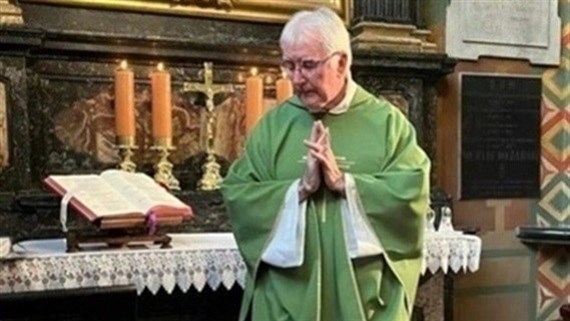
03.09.23 ~ 22nd SUNDAY IN ORDINARY TIME
~ St Mary’s Basilica, Krakow
I’ve been watching the re-run of the 70s classic “I Claudius” these last two weeks, having missed it the first time round. The murder, mayhem, corruption and underhand plotting to achieve power, is something to behold. In one episode, Sejanus, right hand man of Emperor Tiberias, who has left Rome to live on Capri, is persuaded to come before the Senate, by being told he is to be appointed ‘Overall Protector of Rome’, emperor in all but name. He stands waiting, with a smirk on his face, no doubt wondering what the Senators’ reaction will be, when they hear the announcement. However, unfortunately for him, Tiberias has been told that Sejanus was responsible for the murder of his son and rightful heir, so the actual letter read out is his death sentence. My, how the mighty have fallen!
You could also add, ‘What a difference a day makes!’ Something similar, but nowhere near on the same scale as the skullduggery of I Claudius, happens to Peter in today’s gospel. Last week, we saw him being lauded by Jesus for recognising him as ‘The Christ, the Son of the living God’ and being designated the Rock on which Christ would build his Church. This week he is told ‘Get behind me Satan’ and seen as a stumbling block in the way of Christ’s mission. What a shock for poor old Peter. He must have wondered if he was coming or going.
Unlike Tiberias, Jesus will not destroy Peter for his misunderstanding, but he is determined to show him, and through Peter us too, that there will be a cost to following him. By saying ‘Get behind me Satan, he is really saying, “Walk behind me, join the queue of all those who will suffer for their faith in me. You are only a disciple and every disciple must follow his master”. When the going gets tough, the temptation will always be to walk away, and that was what Peter wanted Jesus to do.
As I have said on previous occasions, to people who can’t understand why a loving Father would make his son go through such suffering, he didn’t make him, nor did he want him to. The obedience he wanted from Jesus was to be perfectly human like the rest of us, which means being subject to the slings and arrows of outrageous fortune, and not to be exempt from the horrible things human beings sometimes do to each other. Otherwise, he would have not been truly one of us. In his human nature Jesus prayed in the garden of Gethsemane, to be spared such suffering, as you and I would do, but was eventually able to say, “Thy will be done”. In other words “I accept this cross in the name of every innocent person who will ever suffer man’s cruel inhumanity to man, and I will show people how to overcome hatred with love”.
When I think of carrying the cross, I naturally think of the stations of the cross, in particular the 7th, ‘Jesus falls the second time’. I’ve often stood there wondering what he was thinking, as he lay collapsed in the dust under the weight of the cross, the soldiers giving him a kick to get up, the hysterical mob baying for his blood, and knowing he still had a long way to go. Why on earth didn’t he just stay down, like a boxer who knows when he’s had enough punishment, so spares himself the ignominy of the final knock-out? I’d like to say to Jesus, “You’ve done enough – we get it, please stop now. “But man’s ways are not God’s ways”.
We’re blessed to live in a country where, unlike in Penal Times, we are not likely to be tortured or murdered for our faith, as so many of our fellow Christians are in other countries today. But, for us the cross is still relevant. St Paul tells us that we should offer our bodies as a holy sacrifice truly pleasing to God and sacrifice usually involves a cross of some sort. We live in a secular country in which gospel values are often not allowed to prevail in public debate, and it is easy to walk away, from what we believe to be the way God wants us to live, for the sake of a trouble-free life. But that would be to save our life at the risk of losing it, whereas to lose our life for Christ’s sake, in the sense of being loud and proud about our faith and willing to suffer insult and disapproval for it is to save it.
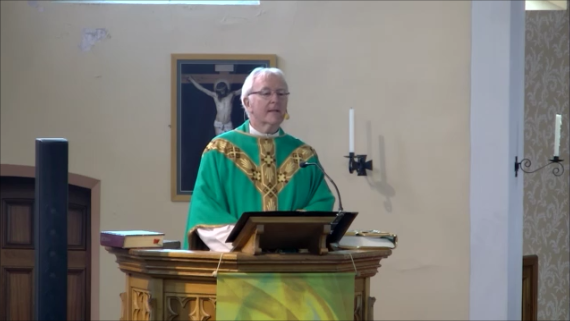
27.08.23 ~ 21st SUNDAY IN ORDINARY TIME
(To hear audio file ~ click here)
On Friday I got a WhatsApp in Spanish from a friend, but it reads just as well in English. A man talks to the camera saying: “Last night my wife and I were sitting on the sofa, talking about many things, amongst which was life and death. I told her, never let me live in a vegetative state, depending on machines and fluids from a bottle. If you see me in that state, disconnect all the machines which keep me alive, and throw away all the fluids on which I depend. I prefer to die. My wife stood up and looked at me with a face full of admiration, which I never seen before. She then disconnected my mobile phone, the internet, cable TV, DVD, computer and iPod. After that, she threw away my whiskey, vodka, tequila, rum, aguardiente, wine, sangria and all my beer. I nearly died!”
I tell that story because later that day, someone in conversation mentioned how dependent they had become on social media, and how hard it was proving to wean themselves off it. The conversation came about because we had been looking at one of the Alpha videos entitled ‘How to make the most out of the rest of your life’. The main thrust of the talk was that no matter what, or how many, mistakes you have made in life, the past can be forgiven, you can make a new start and move on.
The video featured a young man who, aged 18, turned his back on Christianity, made an absolute fortune and for ten years was among the elite of NY Society, but was not happy. By chance he came across a passage from St James which says ‘True religion is feeding the poor, looking after widows, caring for the sick’, and he realised he had never helped the poor. He now spends his life, using all his business connections, to provide clean drinking water around the world to impoverished nations, and has never been happier. His company has managed to reduce the number of people needing clean water, from one billion to 600 million. Still a long way to go, but they’re on with it.
In the pursuit of personal happiness, all of us have made mistakes, and some of us may have wasted opportunities to make a difference, by letting the years go by, without living the kind of true religion St James talks of. But the point is, it doesn’t matter. What’s done is done. We can’t undo it, but with the grace of God, we can certainly draw a line under the past and start again. Look at Peter in today’s gospel. He was not without serious blemishes in his following of Christ, swearing loyalty to him at the Last Supper, yet denying he ever knew him, just a few hours later. Like any of us, he would have been gutted at his betrayal, and full of regret, but he accepted Christ’s forgiveness and drew a line under his failings. Like the good steward Eliakim, in the first reading, he went on to become the key holder, who, for the rest of his life, would do exactly what his Master wanted. He’s now ‘Saint’ Peter.
But back to the machines and the fluids, or whatever it is that occupies most of our time. Clearly, we can’t, nor do we want to, hold back progress. Many of these technical inventions have improved our quality of life. To continue making progress, It’s important that everyone does their very best to achieve what they’re capable of, with the ambition to succeed in their chosen sphere. Without ambition, nothing would happen. However, for Christians, in the limited time we have in this world, all such striving should be seen as ‘secondary’ ambition, with which we use our God-given gifts for the common good. Our primary ambition is to get to heaven, which means that whatever we are engaged in, we must always keep our mind on the main prize and let it underpin everything we do.
In Peter, Christ chose a flesh and blood Pope to lead a flesh and blood Church, not airy fairy or divorced from reality, but fully engaged and visible in the concerns of our common humanity. Like the rest of men we have made, and will continue to make, mistakes, but with that extra dimension of faith in his love, mercy and forgiveness, we are able to serve God through our work, keep our spiritual enthusiasm going and avoid conforming to the standards of this world which, in large part, has turned its back on God and appears to be in a vegetative state of dependence on material things.
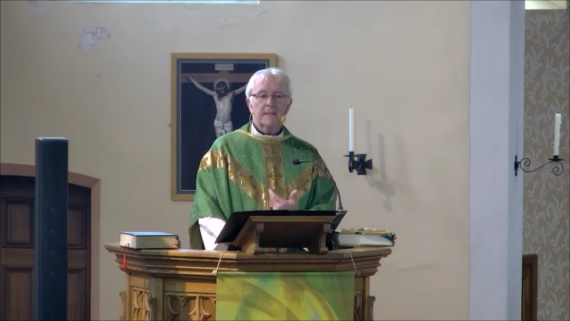
20.08.23 ~ 20th SUNDAY IN ORDINARY TIME
(To hear audio file ~ click here)
Some years ago, at a party, I was talking with three American teenagers, one of whom was the niece of my friend. They were telling me that the latest craze at school, was to see a girl who was on her own, and call her over to join them. When she came they would then turn away and just talk to each other. They thought it hilarious. I thought it was awful. To be rejected, whether by a cruel trick, or directly, can be heart-breaking, and some people never recover. That was not the case in today’s gospel. The Canaanite woman was made of sterner stuff. It’s not often you see someone have the last word over Jesus, but she did !
We are used to Jesus using shock tactics to get his message across, telling people to cut a hand off, or pluck an eye out, if it causes them to sin, but his refusal to answer this woman, then referring to her as a dog, does not sound like the Jesus we know and love at all. What was going on? The first thing to realise is that his mission was to seal the exclusive pact God had made with the people of Israel. They were to be the foundation on which his mission to the world would be built. And just as he had previously ordered the apostles to go first to the lost sheep of Israel, he himself had to do the same. The Jewish People had to be the first to have the chance to accept him as the Messiah. Remember that they were in pagan territory. What if, on hearing of her daughter’s cure, hundreds of other pagans came to him for healing, calling him ‘Son of David’ ie accepting him as the Messiah? If he had decided to bend the rules, as the apostles were urging him to do, even if it was just to get rid of her, because of her shouting, he would not be fulfilling his primary rôle to go first to the lost sheep of Israel..
After the resurrection, when they’d had their chance and blown it, everything would change. He would send the apostles out to the whole world. But, in the meantime, back in Israel, amongst his own people, he was often disappointed and amazed at their lack of faith. That’s why, in the parable of the vineyard, he warns that the Kingdom will be taken from them, and given to others, who would produce fruit. He laments that the faith he had expected from them was much less than he received from foreigners, like this Canaanite woman, the Roman centurion or Samaritans, people, who, although they considered themselves unentitled to his help, or even unworthy of it, still believed he would give it. And, because of their faith he did.
Why did the people, in spite of his miracles, his teaching, and their knowledge of all the OT prophecies, not get the message? Perhaps their rejection of Christ was to do with exclusivity. For 2000 years before he came, they had been set apart, conscious that they were the ‘Chosen People’. So, it’s understandable they might not accept that in God’s eyes all men are equal, as St Paul tried to get across. He pleads with them to accept his ministry to the pagan nations as the will of God. With all the wonderful things happening, he hopes to make them jealous and want to join him. They’re still the chosen people. God never takes back his gifts or revokes his choice, but now, because the Messiah has come, it’s time to take their special relationship with God to the whole world in line with Isaiah’s prophecy 'My house will be called a house of prayer for all the nations'. God’s love for mankind can no longer be seen as exclusive.
Exclusiveness has often, still does, and always will, lead to conflict, Human beings have always been very clannish excluding people not of the same race, country, religion or values. We put borders around our territories, regulate whom we will let in, whom we consider acceptable.People ignore Our Lord’s second commandment ‘to love our neighbour as ourself’. «And who is my neighbour?» a young man asked Jesus. His reply was the story of the Good Samaritan Anyone in need is my neighbour. God makes no distinction, and, as we learn from Jesus today, nor should we.
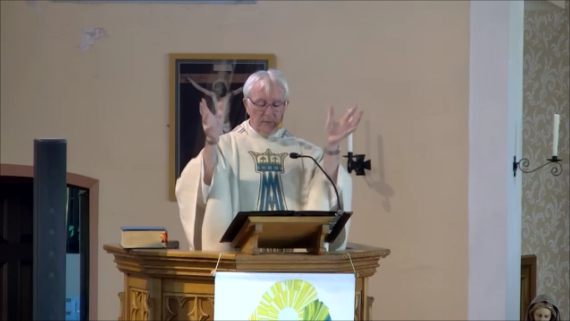
15.08.23 ~ FEAST OF THE ASSUMPTION OF THE BLESSED VIRGIN MARY
(To hear audio file ~ click here)
In 1950, Pope Pius XII declared the dogma that Mary, the Immaculate Mother of God, when the course of her earthly life was finished, was assumed body and soul into the glory of Heaven”. People wondered why the Pope felt the need to make such a declaration 1900 years later, when, from earliest times, Christians had always believed in the Assumption. In fact, in the catacombs there is a 2nd century wall painting of Our Lady rising to heaven and being crowned by her son.
Many of the Fathers of the Church who preached on the Assumption, weren’t out to try to prove it, but to elaborate on it, in order to bring out the essential meaning, which is, not so much that she was preserved from bodily decay, but that she triumphed over death, when she acquired a glorified risen body, in the same way her Son did after the resurrection. As St John Damascene wrote: “It was fitting that she who had gazed on her Son on the cross, receiving in her breast the sword of sorrow foretold at his birth, should behold him seated with the Father in glory. It was fitting that the Mother of God should enjoy the privileges of the Son, and should be honoured by all creation as the Mother and Handmaid of the Lord”.
The reason Pope Pius decided to proclaim the Dogma in the middle of the 20th century, was, as always, a result of looking at the signs of the times. It was his response to the rise of nationalism and the desire for domination, which had already led to the unprecedented suffering of two world wars. To a world, filled with the recent memories of unprecedented brutalism, the Pope was proposing an antidote to violence: the triumph of tenderness, gentleness and the love of a mother, which is at the heart of Christianity, as seen and fulfilled in Mary.
In the Magnificat, her wonderful canticle of the triumph of humility, she makes it very clear, that though “All nations will call me blessed”, her song is really about the wonder of God, who pulls down the mighty from their thrones, scatters the proud-hearted and raises the lowly. Being pregnant with God’s Son, and bursting with joy after Elizabeth’s greeting, she knows she just has to proclaim, that what mankind has waited 2000 years for, since the call of Abraham, is about to happen, even though she herself can’t quite understand why God has chosen her in her lowliness. Mary, so unobtrusive in the gospels, except perhaps for her intervention at the Marriage feast of Cana, clearly remains a lowly handmaid and an example of the need to follow her Son and do things the way he wants us to.
The essential message of today’s feast is that Christ has won the victory and the final triumph is not in question. Mary’s assumption, body and soul to heaven, fulfils Jesus’ promise of going to prepare a place for us and returning to take us with him. This is exactly what he did for Mary. So, in her, we see that the promise of salvation for all people has begun, and that ‘those who belong to him will be brought to life in Christ’. The Magnificat tells us what God’s mercy has done, is doing now, and will continue to do, so that what has already been accomplished in Mary, will also be fulfilled “From age to age in those who fear him". It's a message we should never forget.
The other essential thing to remember about this feast, is Mary’s continued role in salvation history. At perhaps her lowest point in life, at a moment of intense personal sorrow beneath the cross, she once again said Yes to God, when Jesus asked her to take us all under her wing. This she has done ever since. Now, and especially at the hour of our death, she continues to pray with and for us. So, it is only right and proper that we honour her today as Queen of Heaven in the glory of all the saints.
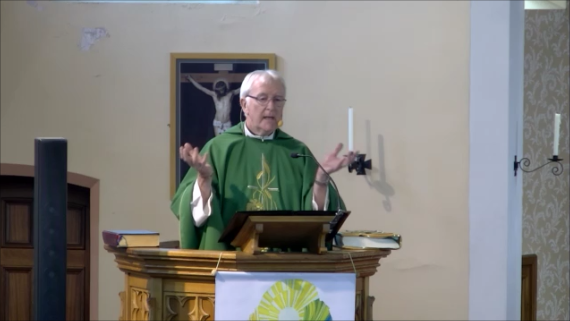
13.08.23 ~ 19th SUNDAY IN ORDINARY TIME
(To hear audio file ~ click here)
Many years ago, I went to the funeral in London of a 14th year old girl who had died of cancer. Her father had become a good friend of mine. He was a policeman, but due to poor pay in those days, he also worked as a taxi driver, and washed dishes in an hotel, to make ends meet. He was a huge guy, about the size of John Pridmore, and played water polo for England. Over a few whiskies, the night before the funeral, reflecting on his immense strength, which allowed him to do those three exhausting jobs, he told me that he would willingly have chopped an arm off, if he thought he could have saved her”. Like any good father, he would have done anything to save his child.
I was reminded of my friend when I read what St Paul had to say about the people of Israel, his own flesh and blood. He had so much love for them, that he suffered mental anguish and sorrow so great, that he would willingly be cut off from Christ if that would help them. Can you believe that? Paul, who’s every waking moment was wrapped up in his love and service of Christ, would be willing to give it all up, if he thought it would save them. Having discovered the pearl of great price himself, he longs for his own people to find it too. After all, they have been led step by step, through the Law and the Prophets, to this very moment when God’s promises are fulfilled in Christ. But they’re not listening. I imagine many parents whose children have rejected the Faith, may know how Paul feels.
It was the same in Elijah’s time. The faith seemed dead in Israel. Queen Jezebel had undone all his good work by introducing worship of pagan idols, which had turned the people away from God. They were settled in the promised land, they’d made a life, things were good, they didn’t really need God now. So, why not indulge in a bit of idol worship like everybody else? History seems to show that prosperity and good times can often sound the death knell of religion. Think of Ireland, once a land St John Paul described as ‘semper fidelis’ (always faithful), which not only kept the faith during penal times, but sent out thousands of missionaries to various parts of the world, but now struggling to keep the faith alive. In Poland, it was said that during Solidarnoc’s battle against communism, 95% of Polish people were practising Catholics, but not now. Most are becoming just as secular as the rest.
At first, Elijah gives up on his people and runs away, but finds himself at the very spot where God spoke to Moses and has a mystical experience of God’s calmness underneath all the turmoil. He is strengthened, restored physically and spiritually by that experience, and returns more confident in God’s service than ever, which allows him to turn things round, rather spectacularly, in a duel with the prophets of Baal on Mount Carmel. Unlike Elijah, Paul doesn’t give up on his people, but like Elijah he too returns to the source, reminding them that they were adopted as sons, descended from the Patriarchs, the same flesh and blood Christ came from. It was to them the promises were made. So he knows that if they accept Christ, they will be reintegrated into God’s universal plan of salvation.
Somebody once sent me a phrase saying, “When all else fails, read the instructions”, which, I guess, means the same thing as return to the source. In the gospel Peter is saved by the hand of Jesus reaching out to hold him. Jesus is the very source of Christianity, so when the going gets rough, it’s to him we should always return first and foremost. For most of our history, the Church has been like the boat in the story, tossed about by rough seas, but we’re still here and always will be whatever storms there may be. In the still small voice of calm, Elijah learnt that whatever turmoil and aggression he may come up against, there will always be a fundamental core of unshakeable peace behind it which is God himself. Jesus gave us the same message by calming the sea. How very different things are when he is with them. The fact that it took place in the fourth watch of the night, when it’s dark, shows that even in our darkest moments, when it seems our faith is being tested to the limit, Jesus is never very far away. Life is a struggle. There may well be more storms ahead, but our belief in his abiding presence will calm our fears, give us courage and help us to come safely to our destination.
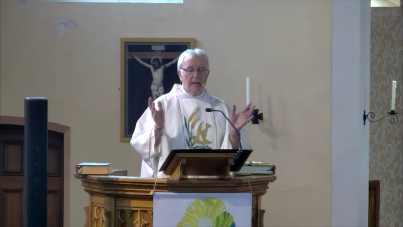
08.06.23 ~ THE TRANSFIGURATION OF THE LORD
(To hear audio file ~ click here)
While I was looking for a book in the Green Hut to take on holiday, I came across a DVD of ‘The Agony and the Ecstasy’ the story of Michaelangelo’s painting of the Sistine Chapel, which he was forced to do by Pope Julius II, even though he insisted he was a sculptor, not a painter. The commission was to paint the twelve apostles, but after the first two, he abandoned the task and ran away to Carrera and worked as a labourer cutting blocks of marble. Then, one day he saw a particular cloud shaped like a finger,reaching out to another cloud, and suddenly he knew what he was going to do. He returned to Rome and painted one of the world’s greatest masterpieces, which millions of people still queue up to see, depicting not just the apostles, but a whole raft of salvation history.
In everyday speech, clouds often have a symbolic meaning, usually to do with hiding something, as they hide the sun when it’s raining.Living under a cloud means there’s something dark hanging over us, but, we also say, every cloud has a silver lining. His head’s up in the clouds means he’s a dreamer. Clouds feature a lot in the scruptures too. In Exodus, the cloud hovering over the Tent of Meeting was a visible sign of God’s presence, accompanying the the Israelites the move, and protecting them wherever they were. When King Solomon inaugurated the first Temple, the ‘Holy of Holies’ was completely covered by a cloud, meaning God was with them, but in a veiled way. However, at the Transfiguration,although the hidden voice of God the Father comes from a bright cloud, he is unveiled in the physical presence of Jesus among us, “This is my Son, the Beloved. Listen to him”. What do we make of it all?
Well, if we go back to Moses, you might remember that when he came down from Sinai with the 10 Commandments, his face was so radiant from being with God, that the people were afraid to go near him, so he had to cover it with a veil. Commenting on that fact, St Paul says their fear of God led them to draw a veil over their own faces, which has been there ever since, and preventsthem from really understanding, the love behind the Covenant God had made with Moses. But when Jesus came, the veil was removed, literally in the case of Peter, James and John. Paul goes on to say “With unveiled faces, we must all reflect the glory of the Lord, while we are transformed into his likeness by the action of the Holy Spirit”, which means we can be transfigured too. God can work a profound transformation in anyone, who openly presentsthemselves before him. Most of us know people to whom that has actually happened. On Thursday, Mother Elvira, the founder of the Cenaculo community died. Through her homes, one of which was in our Diocese, thousands of drug addicts have had their lives transformed, through presenting themselves openly before Christ.
Taking that first step of openly presenting yourself before Christremoves the veil, but it doesn’t mean you get to see God face to face. There’s still, what an anonymous 14th century English Mystic calls, ‘The Cloud of Unknowing’, whose underlying message is,that the way to glimpse the nature of God, is not to think thatwe’ve got him all worked out, or to keep him in a box of our own making from preconceived and unalterable ideas, but to humblyaccept the cloud of unknowing in a positive way. It’s the difference between deliberately placing a veil over our faces to avoid seeing and understanding and, being open to letting God slowly reveal himself to us over our lifetime. Even the apostles, after their fleeting glimpse of Jesus in glory, didn’t think they had him all worked out. There was so much more they had to learn. That’s whythe most important thing to take from today’s scriptures is “Listen to him”. Seeing him can wait until our death, or the end of time, if we’re still around then. Only perseverance in God's service leads to the glory of the beatific vision, so beautifully described in the Book of Daniel today, when we will see “the Son of Man coming on the clouds of heaven, surrounded by men of all peoples, nations and languages”. To attain that vision what matters is the simplicity of a human life, transfigured by the Spirit, and a face shining with the love of God.
As a footnote, the last time the apostles saw Jesus on this earth it was as he was being taken up in a cloud to heaven. There’s clearly more to clouds than meets the eye! As Joni Mitchell sang “I’ve looked at things from both sides now, but still somehow, it’s clouds illusions I recall, I really don’t see clouds at all”.
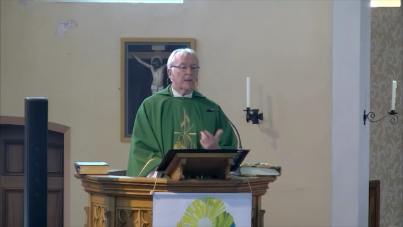
30.07.23 ~ 17th SUNDAY IN ORDINARY TIME
(To hear audio file ~ click here)
For my spiritual reading, at the moment, I am using the prayers, poems and meditations of St John Henry Newman. He died in 1890, so, as you’d imagine, his vocabulary and lofty Victorian prose, is a little strange on today’s ear. But his spiritual insights on the human condition are bang up-to-date, very down to earth and full of the wisdom which, no doubt, led to his canonisation just 4 years ago.
On Friday his topic was ‘Hidden Sainthood’ which starts: “Andrew is scarcely known except by name, while Peter has forever held the place of honour all over the Church. Yet it was Andrew who brought Peter to Christ”. He goes on to say that most saints, if they are known to men it is not as saints, but by some good or effective civil work they are doing. He means that thousands of ordinary people’s sanctity is hidden in the everyday life they lead, doing Christ’s work, without fuss or seeking praise. He adds that even the holiness of Christ himself, the author of all good, was hidden from mankind at large. St John says “He was in the world that had its being through him, and the world did not know him. He came to his own domain and his own people did not accept him”.
So, what do we make of all this? Today’s gospel starts with a parable about hidden treasure. Matthew says that Jesus would never speak to the crowd except in parables, which was to fulfil Isaiah’s prophecy “You will listen and listen again but not understand”. In other words, the meaning of the parable would be hidden from them. They would need to use their brains to search for it. To paraphrase Newman again: when people are presented to the king at Buckingham Palace, they have to pass beyond the façade, the only part of the palace that most people will ever see, into the inner sanctuary, where the encounter will take place. Likewise, he says, if we would see the King of kings in his glory, we must penetrate beyond the façade of what the world takes at face value. Jesus speaks in parables because he wants us to work it out for ourselves – he doesn’t want a pile of yes men who pay lip service to his teaching, but people who will dig deep to find life’s real treasure.
As with the parable of the pearl of great price, the focus is not so much on what the finder does with the treasure, but the sheer joy of finding it, a joy which causes them to sacrifice everything to buy it, in a sort of reckless desire to have it at all costs. It was the kind of joy Julie expressed in her note on the bulletin, a couple of weeks ago, when she thanked us for helping her to find the treasure of the faith. “Being received into the Church was one of the best days of my life”, she said.
The kingdom of heaven, like the pearl of great price and the hidden treasure, is worth searching for and giving everything up for. But, it’s not pie in the sky when you die. It’s here already, present in our midst, even if it appears hidden from our eyes. At first, that may sound like a celestial game of hide and seek, as though God is trying to fool us or even prevent us from finding it. But it isn’t. We know where it is. It’s wherever Christ is. And where is Christ? He’s in the face of a stranger, starving people in Africa, refugees from Ukraine, homeless in Blackpool, the hungry and thirsty, naked, sick and in prison. When St Lawrence, the day before his martyrdom, was ordered to hand over the Church’s treasures to the Roman Emperor, he brought along the poor, the lame, the sick and the blind.
As citizens of the kingdom of heaven already, we are so blessed to be able to celebrate our life of faith, enjoy our Sundays together as God’s family, and feel good about where God is leading us. But what about the thousands of people seeking God with a sincere heart, hoping to find the treasure which we already have, but with no idea where to look? The Kingdom of heaven is a rich vein of gold waiting to be mined by them, and we know they don’t have to look too hard to find it. So, with the love of Christ, which we carry in our hearts, our prayers and our concern for their spiritual welfare, let’s be generous with our time, and try to provide the guidance they need, to find Christ in the everyday business of life. Remember, we are only beggars showing other beggars where to find food.
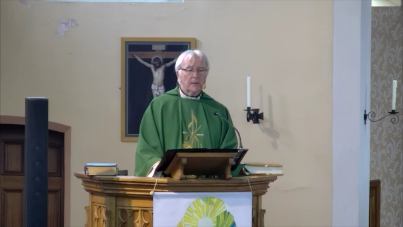
23.07.23 ~ 16th SUNDAY IN ORDINARY TIME
(To hear audio file ~ click here)
On Thursday at Bible share, we started the Book of Ezekiel which is full of mystical poetry and had some of us scratching our heads as to its meaning. In a nutshell, Ezekiel was told by God to take a warning to his people, who had been behaving in a despicable way, that, unless they turned back to him they would be annihilated. It was a pretty crude but effective way of grabbing their attention. In today’s reading from the Book of Wisdom we see a very different understanding about the way God deals with his people: “You are mild in judgement and govern us with great lenience”. Both Ezekiel and Wisdom, in their different ways, point to God’s desire not to lose anybody, and both profess that forgiveness and mercy await even the most recalcitrant of sinners who turn back to him.
It's a theme which Jesus takes up in the gospel. When the workers discover that thorns are growing alongside his precious wheat, they report it to the farmer and advise him that action must be taken immediately to root them out. But, as we see, he disagrees with them, because he wants to give the wheat every possible chance. In spite of the thorns, he knows there’ll still be a good crop of wheat. When Jesus explains the parable to the apostles, he likens it to the last judgement, when evil doers will be separated from the good, and each will be assigned their fate. However, this parable is not just about the final judgement. It’s also about how we live our lives on a daily basis.
The workers’ desire to root out and throw away the darnel, highlights the difference between the way God deals with people deemed as unacceptable, and the way we do. It’s a rather disturbing trait of human nature, to play the judge and decide whose worthy or not. The Tabloid Press thrives on painting public figures as hypocrites, or splashing their sexual misadventures across the front page, as we have seen recently with Huw Edwards. Social media is very quick to condemn without knowing all the facts. Our Woke culture allows people of one view to cancel others whose views don’t match up with theirs, as Coutts Bank did this week to Nigel Farage. It’s almost as though they’re trying to,
somehow, create an idealised community of the perfect, by getting rid of the dross.
God, on the other hand, refuses to write anyone off, always keeping in mind their potential to change. Very few people are totally bad, and, what’s more, perhaps being allowed to grow up alongside the wheat may provide the chance for some good to rub off. The key thing to remember, is that God has all the time in the world, and he’s prepared to wait as long as it takes, for someone to turn back to him. It’s never too late to repent and seek forgiveness, no matter what we’ve done. As the Book of Wisdom says, “There is no other god, other than you, who cares for everything. You are all powerful and your sovereign power is unquestioned”. It’s precisely because God is all
powerful, that nothing can disturb his equilibrium; nothing has the power to change him from being an all-loving God for every person he has created, even those who have chosen evil. He is the living embodiment of the phrase ‘Hate the sin, love the sinner’.
You could call the world we live in a field, full of ambiguities and complexities, in which good and evil co-exist and, therefore, needing the art of discernment. Even the Church, as we know so well, is made up of saints and sinners, those who live exemplary lives, and those who certainly do not. For those of us who do not belong to the idealised community of the perfect, we may have to accept, from time to time, some fraternal correction along the way, like the people Ezekiel had to warn, but not in quite the same scary way. We are a mixed bag, that’s for sure, but our Father loves each and every one of his children, and will never stop trying to seek them out, watching the road for the prodigal son’s return. At the heart of the parable is the message to leave the outcome to God, and refrain from judging others harshly, because we can never know what is in their hearts, or what they may be going through. To know all is to forgive all, and there but for the grace of God go I.
16.07.23 ~ 15th SUNDAY IN ORDINARY TIME
On Friday afternoon Leonie and Rick Bromley renewed their wedding vows in front of about two hundred of their friends. Rick has terminal cancer, so their friends were not able to attend the actual wedding, which took place three months ago in the hospital chapel. It was quite a raucous affair to start with, as I suspect the majority were not used to the prayerful atmosphere of a church, but once the ceremony started, there was an air of reverence and appreciation of what was taking place. There were loads of young people, but the mix also included several children, quite a few older people and a good sprinkling of our own parishioners. I imagine the scene in today’s gospel was something similar, although I didn’t have to get in a boat to preach to them.
No doubt, as happens with every sermon, people will have listened to what I had to say, with varying degrees of interest, or no interest at all. Jesus had the same problem, but his message was: preach the gospel anyway. Some of it will stick. He knows the majority of the crowd has come, because of the bread and fish, some because they’re curious, others because of what people have said about him.
He knows too, that in terms of success in his lifetime, he would be a failure. How many of that vast crowd were there to speak for him at his trial? However, he also knows that some of his hearers will get what he’s saying and go on to be phenomenally fruitful. So, he stays optimistic and so should we.
When I wrote that sentence, for some reason, probably because I’m programmed in as a lifelong United supporter, I thought of Bobby Charlton. When he first came to Old Trafford, Assistant Manager Jimmy Murphy noted that he had a really powerful shot, so instructed him to shoot every time he had a sight of the goal. “They won’t all go in” he said “but some will” and boy, was he right!Unfortunately, I think someone may have said the same thing to Erling Haaland last season! In terms of evangelisation, it’s important to take every opportunity that comes along to scatter the seeds of the gospel, even with such a diverse congregation as the one on Friday. That’s what Jesus did with that big crowd at the water’s edge, many of whom will have looked at him without seeing who he really was and listened to his word without hearing or understanding it.
In the parable of the Sower, the seed is Word of God, and what we notice, is that there’s nothing wrong with the seed, but that its potential for growth, depends very much on the ground in which it is sown. He uses four types of ground to represent the way people react to the word of God. Stony ground is someone with a closed mind, impenetrable because of lack of interest, prejudice, pride,fear of change, or commitment. Thin soil is someone with a shallow mind, who picks things up quickly with bags of enthusiasm, but drops them just as fast if they get a better offer. Thorny ground is the person too distracted by worldly concerns to think, pray or meditate on the Word. Fertile soil is the person with an open mind, uncluttered with prejudice or preoccupied with anxiety, ready to listen, to learn, and to act on the Word when the time comes. In that person the seed will flourish.
Reflecting on the make-up of Friday’s congregation, I recognise that we’re not here to judge people. There are all sorts of reasons why we are the type of ground we are. Some may never have had the opportunity to listen to the Word of God, so how can they receive its life-giving seed? But Jesusshows, by the way he included all those people in what he had to say, that we shouldn’t write anybody off as a hopeless case. All have the right to hear the gospel, regardless of whether we think it’s worth it or not. The success of our mission is not measured by bums on seats. Our job is simply to plant the seed and leave the growth to God. It doesn’t matter how long it takes to germinate. Even the apostles didn’t understand or get the meaning of today’s parable straight away, and they’d been with Jesus quite some time. Once they did, filled with optimism, it became their life’s work to sow the Word of God and, over the centuries, much fruit has been produced, and will continue to be, if we, like them, simply tell people that Jesus came to give us life, and life to the full.
09.07.23 ~ 14th SUNDAY IN ORDINARY TIME
On Thursday night I watched Andy Murray’s match against Stefanos Tsitsipas. Murray had been a set down, but by the end of the day’s play had clawed his way back to take the next two sets, during which I began to feel uncomfortable andsorry for Tsitsipas as the partisan crowd roared their support for Murray, who, after every winning shot, gave a fist pump, as though he was despatching a gladiator in a Roman amphitheatre. Tsitsipas looked demoralised and reminded me of a wounded stag cornered by thousands of baying hounds closing in for the kill. It must have been a very lonely place.Similar things happen in other professional sports. Taking part is no longer good enough. You have to be aggressive, be a winner, and blow your own trumpet, to show you’re a winner. In days gone by, a centre forward’s goal would be celebratedwith a handshake, a pat on the back or a nod, as he modestly jogged back to the centre circle. He scored – big deal, that’s what he’s supposed to do. Today’s footballers probably have an image consultant to plan their goal celebration which can often end up with them looking like a prat. Remember Peter Crouch‘s robot dance at Liverpool.
Today’ scripture readings teach us a completely different way of looking at ourselves and our achievements. St Paul says that instead of relying on our own human strength and values, which, we know from experience do not last, we should rely on Christ and belong to him. This is something the learned and clever of the world don’t get, especially when it comes to conflict. Aggressors, like Putin, have not learned, or given credence to, the fact that war generally brings nothing butheartbreak. Jesus himself was expected to be a warrior who would use might and power to defeat the Romans, but, as we saw in the first reading, instead of entering Jerusalem on a war horse, he entered on a donkey, a beast of burden. “Learn from me”, he says, “for I am gentle and humble in heart”.
On Thursday, Year 5 had today’s gospel at their class mass, so we talked about how, in Jesus’ time, that when it was time to plough, the farmer would yoke an experienced ox with a less experienced ox, to keep it on the straight and narrow, and lighten the burden. I got Simon yoked to a pupil and they marched up and down the aisle keeping straight. What the farmer did is the same sort of thing Jesus wants to do for us.“My yoke is easy and my burden light” he says. As Joe said,in his view from the pew, easy and light are not the first thingswe think of when talking of burdens. More likely, we think ofan encumbrance which will weigh us down, cause us pain or hold us back. So, when you look at the strenuous life Jesus lived, and the superhuman efforts of some of his followers to carry their particular crosses, you might wonder why hewould describe his burden as light.
We too might feel that the weight of our own commitment to Christ has sometimes been a burden, causing us to miss out on things non-believers seem to enjoy unrestrainedly. The lightness comes when we start to ask life’s big questions, and find that our faith offers us the key to understanding. Without faith, a man is free to do what he likes, when he likes, with whomsoever he likes, provided he keeps the law of the land. To quote from ’The Devil’s Advocate’ by Catholic author Morris West, “That kind of unshackled freedom offers no explanation for the meaning of life except what himself can give, using the only two certain points of reference he has:I’m alive but one day I’ll be dead. That’s the same sort of freedom you have when you are lost in a desert without a compass, free to choose to go in whatever direction you like, but with no way of knowing which is the right way.
Relying on Christ and belonging to him is to shoulder his yoke as the younger, less experienced partner in his work of evangelisation. As a priest. I know I could not possibly do all the things God wants me to do without Jesus at my side. That’s why I come into church every morning to ask him to bless me in all that he wants me to do for him and my brothers and sisters. The gift of faith is Our Lord’s way of saying, “Lean on me and I’ll lighten any burden you find too hard to bear”, to which he adds, in one of the most beautiful lines in scripture “And you will find rest for your souls”.
02.07.23 ~ 13th SUNDAY IN ORDINARY TIME
(To hear audio file ~ click here)
A couple of weeks ago, as I was doing my ironing, I was listening to a conversation, between the Archbishop of Canterbury and John Cleese, during which John Cleese said he couldn’t understand why Jesus had to die on the cross. Many people feel the same. Why would a loving Father, will his son to die such a horrible death? The answer is that he didn’t. The ’Father’s will’ was not that Jesus should die a horrible death, but that he would be totally human, which, unfortunately, includes being subject to the same sort of unjust treatment, man’s inhumanity to man, sometimes hands out. If God had preserved him from that, he would not have been one of us, but a privileged outsider, exempt from the slings and arrows of outrageous fortune, which are part and parcel of life . So, although the Father always knew what would happen to Jesus , he didn’t arrange it, or interfere with the decision people of free will took to have him killed, and, as men of their time, in such a barbaric way.
Jesus knew he had been born into a world in which, because of man’s sin, there is no way of being human, that does not involve suffering, to a greater or lesser degree. So, while accepting the reality, the whole of his mission is to teach, by word and example, how to overcome. No good pretending that things are great if they’re not. We have to deal with them, as he did. “Anyone who does not take up his cross and follow in my footsteps is not worthy of me”.
St Paul picks up on this in his letter to the Romans. “When we were baptised in Christ Jesus, we went into the tomb with him and joined him in death, so just as he was raised from the dead we too will live a new life”. Included in that statement is the period between our baptism and resurrection, ie our daily lives which, as we saw, may include carrying a cross. But we won’t carry it alone. Jesus promised to be with us all days till the end of the world. That’s why, later on in his letter, Paul will say “ Nothing can come between us and the love of Christ, even if we are troubled or worried, being persecuted, lacking food or clothes, being threatened or attacked. These are the trials through which we triumph, by the power of him who loved us”. That promise to be with us at all times is fulfilled in many ways: when we meet together like this in his name, when we listen carefully to his words in the gospel, when we feel the inspiration and guidance of his Holy Spirit, and, especially, when we receive him into our hearts at Holy communion, which some of our children will do for the first time today.
In the readings at the last 1st HC Mass, Moses taught that “Man doesn’t live by bread alone, but on every word that comes from the mouth of God”. He didn’t just mean the bread we eat, but the daily diet of things we consume in such quantities, that they leave little room for the Word of God to penetrate. Today it might be work, food, football, fashion, possessions, entertainment, fitness, all of which are good in themselves, but which are also the bread which doesn’t last. So, as well as these, Jesus asks us to include in our diet, the bread that lives for ever, his Body and Blood. “He who eats my flesh and drinks my blood has eternal life: He lives in me, and I live in him”. This is what Catholics believe happens when we receive Holy Communion. The appearance and texture of the bread and wine is the same, but the substance has changed. Jesus, the Son of God, has come to visit us for some precious minutes of intimacy, during which our mutual love develops and grows ever stronger.
That’s why it’s important not to stay away for a long time. Otherwise, you lose contact, like someone who says they love their mother, but never goes to see her. If you do lose contact, what will you say to Jesus when you meet him face to face, or, more importantly, what will he say to you? A man who gave us a retreat recently, imagined Jesus saying to those people who say they are too busy to come to Mass, “Don’t tell me you don’t have time to visit me in the Blessed Sacrament. Be honest. Just tell me you don’t love me enough”. Hopefully, those of our children receiving Jesus today in Holy Communion for the first time, with the encouragement and example of their parents, will never reach that stage, but will always love Jesus enough to receive him regularly as the Bread of Life.
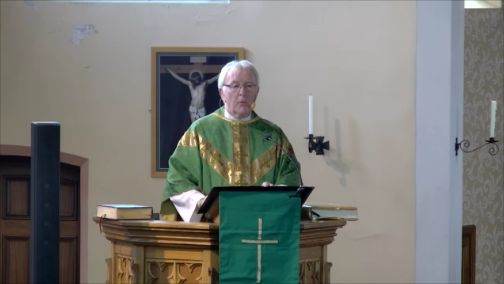 18.06.23 ~ 11th SUNDAY IN ORDINARY TIME
(To hear audio file ~ click here)
At Bible share this week we were discussing St Paul’s speech to King Agrippa, in which he is at pains to point out how strong his Jewish credentials were, by telling him of the terrible things he did to the Christians before his conversion. One of our group wondered if Paul lived with regret for what he had done when he was an enemy of Christ? I think the answer is in today’s letter, where he says how full of joy he is, because of his reconciliation through the death of Christ. “Once reconciled, surely we may count on being saved by the life of his son” which means even the worst of sinners can be saved.
18.06.23 ~ 11th SUNDAY IN ORDINARY TIME
(To hear audio file ~ click here)
At Bible share this week we were discussing St Paul’s speech to King Agrippa, in which he is at pains to point out how strong his Jewish credentials were, by telling him of the terrible things he did to the Christians before his conversion. One of our group wondered if Paul lived with regret for what he had done when he was an enemy of Christ? I think the answer is in today’s letter, where he says how full of joy he is, because of his reconciliation through the death of Christ. “Once reconciled, surely we may count on being saved by the life of his son” which means even the worst of sinners can be saved.
In all three readings today, we see the inherent vulnerability of mankind and its inability to save itself unless God chooses to act out of love. In Exodus, “Remember how I carried you out of slavery on eagle’s wings and brought you to myself” In Romans. ”We were still helpless when at his appointed time Christ died for sinful men”. In Matthew, “When Jesus saw the crowds he felt sorry for them because they were harassed and dejected”. But that vulnerability is not confined just to people who read the Bible. It’s universal. There’s always need for rescue and salvation, even in our own day when people feel so helpless about global warming and over consumption. Faced with such problems, some would argue “It is what it is, so what’s the point?” as if there’s nothing we can do about it. But that’s not the case. These three readings show us that God has acted and will continue to act, which means that we should have the joy St Paul had, when God turned things round for him. But it also means that, like him, we have to be positive and proclaim the gospel message of hope for the world.
When Jesus feels sorry for those people it’s because they are rudderless and without direction. They have been deserted by their leaders, who are more interested in ‘discutant la sexe des anges’, arguing about peripheral things, instead of looking after the essentials, ie loving and caring for those under their charge. It’s the same kind of thing we’re hearing about in secret tapes from N Korea. People are starving to death while their leaders build ever more powerful nuclear weapons.
Because the harvest is rich and the labourers few, Jesus is determined to do something about it, but he is well aware that, in his limited human nature, there’s no way he can do it on his own. So, he enlists 12 working men to help him, a group which includes a former tax collector, a member of the resistance, one who would end up a traitor, and a few nondescript others. These men were to take the place left vacant by the official rulers of Israel, who had gone missing from their pastoral role. Having given them some of his authority and power, he orders them to start slowly. “Go first to the lost sheep of Israel”. They at least will have some knowledge of our history, and the promise of the Messiah, so you’ll have something to build on. We’ll sort the Samaritans and pagans out later. Clearly he recognises that what he is asking them, at this stage, is all they are capable of under their own steam. Later, for their main job of taking the gospel to the whole world, they will receive his Holy Spirit at Pentecost, which means he will be with them unfettered, and everywhere at the same time.
The mission of caring for the harassed and dejected given to the apostles, is the same one given to us, and we’ve been given the same gifts and power to accomplish it. We can’t miraculously cure the sick, literally raise the dead, cleanse lepers or cast out demons, but we can certainly help those who identify with those conditions in other ways. For example, the ‘Sick’ are the poor and starving of the 3rd world with limited access to food and health care. The ‘Dead’ are those suffering from despair, trapped in debt, slave labour in low paid jobs or life-threatening addictions. ‘Leprosy’ is not the threat to life it once was, but there are plenty of lonely, friendless people, who often feel like social outcasts. The ‘Demons’ to be cast out are violence, hatred and division. In all these things we can show compassion, understanding and respect for everyone’s dignity, as well as practical help. To be faithful to the gospel, and, as Ambassadors of Christ, we can’t ignore these calls to service any more than the Apostles could ignore theirs. Jesus says, “You received without charge. Give without charge”
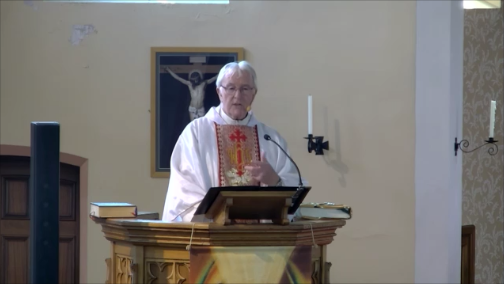
11.06.23 ~ CORPUS CHRISTI
(To hear audio file ~ click here)
When I was one of the four hospital chaplains in Carlisle, the new Administrator had a meeting with us to see if she could be of help with what we needed for our ministry. Afterwards, we had a general conversation in which she asked what we did differently, in particular about communion. One said his communion service was a reminder of the Last Supper. Another said they collected up the bread that was left and put it back in the box to be used at the next service. The third said, what was left over they fed to the birds. After that, I think she was surprised when I said that, as Catholics, we believe that, after the words of consecration, the bread and wine is no longer bread and wine, but the Body, Blood, Soul and Divinity of Christ, the real, living presence of Jesus, the Bread of Life. I can’t remember what, if anything, she made of that, but it came to mind when reading today’s gospel, in which Jesus first makes the statement that those who eat his flesh will live forever.
You can understand why the Jews started arguing amongst each other “How can this man give us his flesh to eat?” The majority decide it’s intolerable language and walk away, leaving just the Apostles who stay because they believe Jesus has the words of eternal life. This incident took place after he had fed 5000 people with five loaves and two fish, in the same miraculous way God fed the Israelites with Manna in the desert, and Jesus is not slow to make a direct link. In the period they spent in the wilderness, the Israelites were being tested by God in order to know their inmost heart, to see if they would trust him completely to provide, and not worry about food, so that they could concentrate on every word that came from his mouth, based on the truth that “Man doesn’t live on bread alone”. The proof that man doesn’t live on bread alone, Jesus points out, is that all those people who ate the manna are dead, as we all will be one day. It’s our lot as finite creatures - but death doesn’t have to have the last word, if we have lived our lives on more than bread alone.
The bread he is referring to is the daily diet of things we consume in such quantities, that they leave little room for the Word of God to penetrate – work, food, football, fashion, entertainment, fitness, possessions etc., all of which are good in themselves, but which are also the bread which cannot last. So, as well as these, he is asking us to include in our diet, the bread that lives for ever, his Body and Blood. “He who eats my flesh and drinks my blood has eternal life: He lives in me, and I live in him”, which is what we Catholics believe happens when we receive Holy Communion. The appearance and texture of the bread and wine is the same, but the substance has changed. Jesus, the Son of God, has come to visit me for some precious few minutes of intimacy. It’s a time for conversation and thanksgiving, with the God who gave everything for us, during which our mutual love develops and grows ever stronger. That’s why it’s important not to stay away for a long time. Otherwise, you lose contact, like someone who says they love their mother, but never goes to see her. What do you say to Jesus when you meet him face to face, or, more importantly, what does he say to you?
The man who gave us our priests’ day of recollection last week was not a priest, but he had great insight into the life of a priest in his upward move towards God: the initial call, formation, ordination and appointment. Then, after a few years, flat lining, losing oneself in activity and routine, maybe becoming desensitised to the Real Presence of Jesus in the sacraments which, he said, can happen to anyone. For example, he imagined Jesus saying to all those people who say they are too busy to come to Mass, “Don’t tell me you don’t have time to visit me in the Blessed Sacrament. Be honest. Just tell me you don’t love me enough”. Hopefully, those of our children receiving Jesus today in Holy Communion for the first time, with the encouragement and example of their parents, will never reach that stage, but will always love Jesus enough to receive him regularly as the Bread of Life.
I’ll finish with those lovely words from the poet John Betjeman: “No love can, with this single Truth compare, that God was man in Palestine, and lives today in Bread and Wine”. He really does!
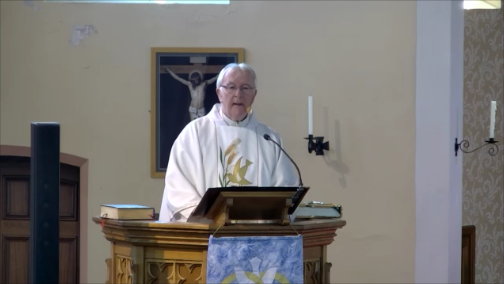
04.06.23 ~ THE MOST HOLY TRINITY
(To hear audio file ~ click here)
At the Plenary session for ‘Welcome to Witness’ on Thursday, we were speaking once again of trying to reverse the old-style model for church membership, from behave, believe, belong, to belong, believe, behave. Many of us of a certain age can remember the emphasis on going to confession at least once a week, never missing Mass, wearing your best Sunday clothes, sitting still and not looking around, under pain of death from your teacher, who would certainly be there as well. At school on Mondays, non-Mass-goers would try to avoid being caught out, by guessing what colour vestments the priest was wearing. That was the ‘behave’ bit, from which you professed your belief in what you had been taught in the catechism, all of which was the sign that you belonged. Some would argue, well what was wrong with that? The churches were packed out. However, I think it’s fair to say that some of the emphasis on ‘behave’, as the first step to belonging, was based on fear of God and the possibility of going to Hell if we did miss Mass. It was a very different culture in which obedience to the Law, the Church, parental and school authority reigned supreme, and was rarely challenged.
Today’s world is radically different. Objective morality is no longer accepted as the norm: obedience culture has given way to an experience culture. People are no longer willing to do what they are told because of somebody’s authority, and many claim it is their human right to do what they like. However, they may be willing to look at things differently, if what they are seeing speaks to them at a deeper level, in their heart or inner conscience. But for that to happen it’s necessary to take time to listen. The word ‘obedire’ from which obedience comes, is latin for ‘to listen deeply, to pay attention’. When Jesus came, he was obedient right up to suffering and dying on the cross, because he listened deeply to what the Father wanted and was able to say. ‘Not my will, but thine be done’.
Changing the concept of slavish obedience to the will of another, to listening deeply to what God wants of us then responding generously, was his way of removing the fear of God and making everyone, tax collectors, prostitutes, ordinary people feel that they belong to his beloved Father. There’s nothing about behaving. It’s about feeling that you belong, which in many cases, like the woman at the well, did lead people to believe, which, St John tells us, is the reason Jesus came. ”God gave us his only Son so that everyone who believes in him may not be lost but may have eternal life”.
Our faith then, is a love relationship with Christ, not an obedience cult. What a difference, not having to struggle all your life to placate a God, who you think is just waiting to catch you out and will either reward you or punish you. In contrast to that way of thinking, Jesus’ target was always the heart of man. “If you love me, you will keep my commandments”. Many of his parables were about love and forgiveness, the good Samaritan, the prodigal son etc, and so was the way he treated sinners. “Go in peace and sin no more. Her many sins have been forgiven because she loved much”. etc. “I call you friends” he once said, “not servants, because a servant does not know his master’s business”. As we know friends fall out, friends forgive, friends enjoy each other’s company, friends accept each other. Jesus is the friend who loves you as you are and who is always there for you in good times and bad, through the indwelling of his Holy Spirit.
Today’s feast of the Blessed Trinity celebrates that relationship. Christ revealed to us that there are three persons in one God and that their nature is to love each other so intently, that their love cannot be contained within itself. It has to flow out from them to create, sustain and heal all other life. Because Jesus, the second person of the Blessed Trinity became human, without ceasing to be God, it means that each of us has a spark of the same divine life he had, within us. We call it the soul, the spirit of life which can never die and will live forever. That’s why it makes sense to try to see Christ in every other person, and is the reason why Jesus reduced the whole of the OT Law and the Prophets to two simple commandments, “Love God, and love your neighbour as yourself”.
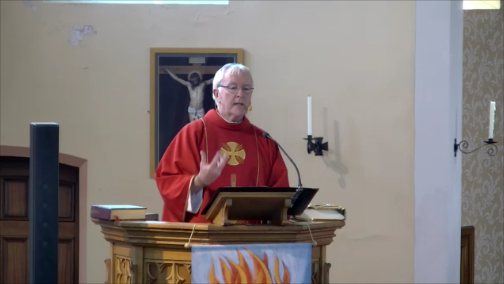
28.05.23 ~ PENTECOST SUNDAY
(To hear audio file ~ click here)
As I was reading the account of Pentecost, a line from a country song by Charlie Pride, came into my head. “Nobody knows what goes on behind closed doors”. I was thinking about the Upper Room, and it started to intrigue me, especially as it’s not that long since Jim Bellamy and I spent some time in it, or at least on the site of it, last November, talking over what had gone on there, behind closed doors.
So many things had happened in that room, for a start the Last Supper. The Apostles didn’t realise it was the Last Supper, although Christ had warned them several times that his end was near. But that didn’t stop him pressing on regardless, ordaining them priests, instituting the Eucharist and giving them a lesson on how to serve, by the washing of feet. It was from that room that Christ went to the garden of Gethsemane, and later to his death. From what happened on that night, a new word came into our language: traitors will forever be called a “Judas”. It was also there that he appeared to them after the resurrection, bestowed his peace on them, gave them the power to forgive sins and, on another occasion, showed his wounds to Doubting Thomas. Finally, it was there, after the Ascension, they were told to wait, until they received the full power of the Holy Spirit.
I suppose it’s fair to say, then, that, over many dark and uncertain days, it had become a safe haven for the Apostles, a place where they felt relatively secure. It was to the Upper Room that they always returned, frightened and secretive, for fear of the Jews, until today when the descent of the Holy Spirit changed their situation completely. Suddenly they had a feeling of tremendous power and warmth, and were able to throw open the doors of the Upper Room, go out into the streets, march into the public square and begin to preach. They remembered that Jesus had said at the Ascension, “Know that I am with you always, yes till the end of time”, and here he was, just as he promised. What a gift, what a transformation the Holy Spirit made to their lives! Their preaching was so effective that 3000 converts to Christianity were made that very first day, while the gospel was proclaimed in many different tongues at the same time. Pentecost is the birthday of the Church.
In John’s gospel, it says that Jesus gave the Holy Spirit to the Apostles in the evening of the first day of the week, ie Easter Sunday, whereas Luke says it took place 50 days later. It doesn’t actually matter. I suspect the Easter gift was to reassure them of his presence over the next forty days, as they came to terms with what had just happened, whereas at Pentecost, full power was turned on, which gave them the courage, wisdom and words, to actually go out to the whole world to make disciples of all nations, which they did with spectacular success.
At a meeting I went to in Liverpool earlier this week, the speaker said that in many parishes, when a change of culture is proposed, the parish immediately emits antibodies to resist it. In some ways, that’s like wanting to stay in the Upper Room, where we feel relatively safe, where we can be private, where we don’t have to give too much of ourselves away. The obvious danger of that is complacency or getting stuck in a rut, which doesn’t allow for change, growth, adventure or risk. A parish like that needs a fresh dose of the Holy Spirit, in order to concentrate on what the Church is really for: evangelisation. The outpouring of the Holy Spirit is always about moving the Good News out from behind closed doors and into the world. Talking about our faith in public is doing precisely that.
In the Creed we say I believe in the Holy Spirit, the Lord, the Giver of lIfe, who is able and willing to enter human personality and change it. No-one is exempt from his help if they ask for it, and if they don’t ask for it, we can ask for them. A good place to start is with our lapsed friends and family, but before you do, ask the Holy Spirit to open their hearts to receive his life-giving word. Then don’t worry about what to say: he will provide the words, just as he did for Peter at Pentecost.
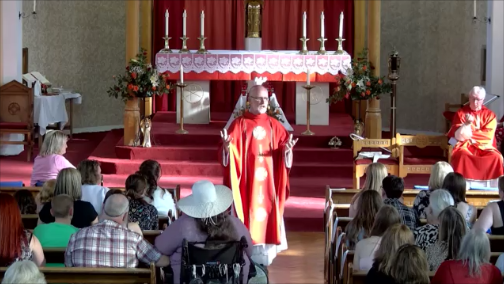
27.05.23 ~ CONFIRMATION MASS ~ VIGIL OF PENTECOST
BISHOP PAUL'S HOMILY
(To hear audio file ~ click here)
21.05.23 ~ SEVENTH SUNDAY OF EASTER
I know it won’t surprise you to know that I have never had a baby, but I do know a bit about what goes on – lots of deep breathing and laughing gas – and that’s just for the father! Seriously though, from what I really know, it’s obvious that childbirth can be really painful, and I have nothing but absolute respect for all mums.
In Friday’s gospel, Jesus, at the Last Supper, was preparing the apostles for the tough times that lay ahead. He said “You will be sorrowful, but your sorrow will turn to joy. A woman in childbirth is in distress because her time is at hand. But after the child is born, she no longer remembers her suffering because of the joy she has, that a new life is born into the world”.
I’ve been reading some meditations by St John-Henry Newman these last few weeks, and yesterday’s was on the purpose of pain. To paraphrase him, he says that when we are young, we simply rejoice in our youth, which prefigures our future spiritual body. We never think that we are made of gross terrestrial matter, unlike in our advancing years, which convince us that we certainly are, usually in the form of aches and pains. The natural effect of pain is turn our thoughts very much to ourselves and our sufferings. For a Christian, this can often lead to the contemplation of Christ’s sufferings, which, although excruciatingly painful, ended in the joy of the Resurrection. He is the great object of our faith. Where he has gone before, we are most certainly to follow. So, while we gaze upon him, we learn to forget ourselves and deal with our pain as part of life. No pain, no gain. No Easter Sunday without Good Friday.
2000 years ago St Peter wrote to the first Christians, “If you can have some share in the sufferings of Christ, be glad, because you will enjoy a much greater gladness when his glory is revealed” Earlier on in that letter, he had written, “Do not be surprised that you are being tested by fire. It’s not unusual”. But why should we be tested by the trials of life? Well, trials can often purify us. It’s like when iron ore is melted in the furnace. It flows into a huge crucible where it is refined. All the impurities are separated out to leave pure steel. A few years ago, I went to say goodbye to a friend who was dying of cancer. He told me how blessed he felt to have had those few months to concentrate on the things that really matter, to sort out difficulties, to make peace with people he fallen out with, to get himself right with God before he died. He felt purified and at peace, refined and ready to meet God without fear.
Today’s readings are about being realistic. As Christians we can’t expect to sail though the world as if it owes us a living. There will be trials. However, we must never forget what Christ promised in John 16, “You will have trouble in the world, but Courage! I have overcome the world. I have told you all this, so that in me you may have peace.” When Christ later prayed, “Holy Father, keep them true to your name” he was praying not just for the Apostles but for us too, to whom he was entrusting his mission. He knew it wouldn’t be easy and that without his power we couldn’t do it. To receive his power, each of us must know Christ in a personal way. We get to know him when we interiorize his Word, persevere in prayer and join with the rest of God’s family to celebrate our unity in him as we do today. In this we are guaranteed the help of the Holy Spirit, from whom comes the gifts of knowledge and wisdom, which inspire us to do good works for the love of God and our neighbour.
In these few days between Ascension and Pentecost, when we recall how the apostles returned to the Upper room to prepare for receiving the Holy Spirit, let us pray for the grace to live out our faith, irrespective of our aches and pains, and have the courage to proclaim it as a remedy for the world’s ills in the testing times we’re going through now.
18.05.23 ~ THE ASCENSION OF THE LORD
As you know, there was a railway strike last weekend which affected thousands of people wanting to get to Liverpool for the Eurovision Song Contest. On June 3rd there’ll be another one affecting thousands of United and City fans getting to Wembley for the Cup Final. It’s no wonder that many people prefer to travel in their own cars even though our roads are packed. However, when public transport is working, not only is it better for the environment, but it also enables us to relax, not worry about the traffic and leave the route plan to others.
Similarly, in our spiritual lives, letting God take control can give us the same peace of mind, although it takes a great deal of trust, and maybe some anxiety, as to where he is leading us. For example, I wonder what the Apostles were thinking as they made their way back to the upper room after the Ascension. Jesus had told them he must return to the Father while, at the same time, saying “Know that I am with you always, yes, till the end of time”. They were confused. They’re not sure if he’s coming or going! But, to add to their confusion he says “Unless I go, I cannot be with you”. What he means is that he is not going to be present to them physically anymore. In ten days’ time they will receive the gift of his Holy Spirit who will animate and guide them till the end of time, in the work he has given them to do, so they are reassured that they won’t have to do it all on their own.
At the Ascension the Apostles are commissioned to put that work into operation: “All authority in heaven and earth has been given to me. Go therefore, make disciples of all Nations”. Can you imagine the tingle of excitement they must have felt in hearing those words, mingled, I suspect, with some apprehension as to what that task would mean for them – simple, working-class fishermen, sent out to conquer the world with God’s love.
Of course, when they started, they could have had no idea of how far Christ’s kingdom would spread, nor that salvation would be offered not just to the Chosen People, but to everyone regardless of language, race or colour. How could they have possibly imagined that one day, in places like Lourdes, or in St Peter’s Square, or during World Youth Day, thousands of people of every nation, race and tongue, would mingle on a regular basis, professing the same Catholic Faith together, in the unity for which they had heard Christ pray at the Last Supper?
Of course, there’s still a long way to go for his prayer to be completely fulfilled, but that promise to be with us, made to the Apostles and fulfilled when they received the Holy Spirit at Pentecost, is still alive today in the Church and throughout the world.
For us, then, 2000 years later, having been spared the confusion the Apostles had to go through, the feast of the Ascension is an opportunity to thank Jesus twice over, once for coming and once for going. For coming - to show us how to live and what we have to do, to help him make God’s kingdom come, on earth as it is in heaven. For going - so that he could stay with us in a new and permanent way through his Holy Spirit, given to us as Comforter,
Help and Guide, reassuring us that we are not alone as we continue the work of the apostles, to make his name known through the spread of the gospel.
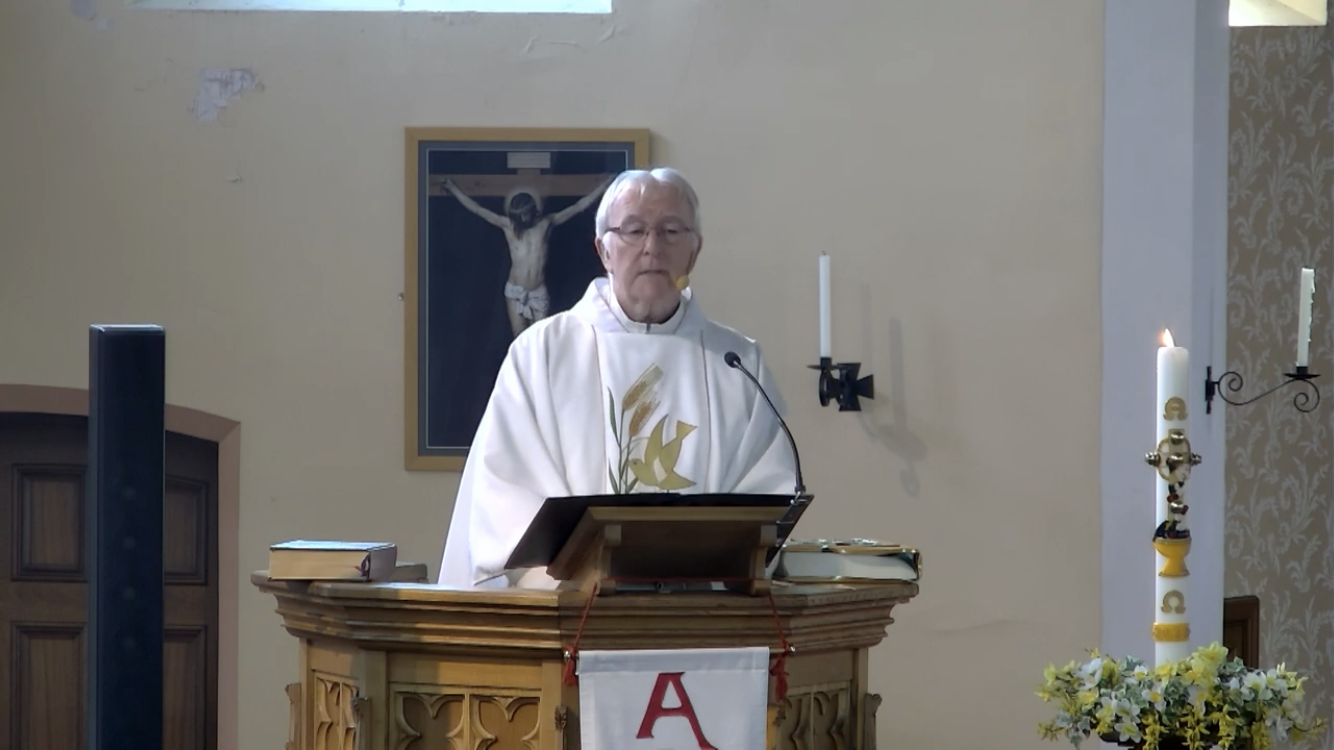
14.05.23 ~ SIXTH SUNDAY OF EASTER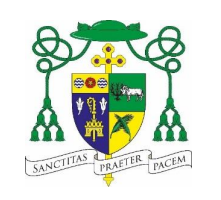
A Pastoral letter to the people of Fleetwood
9"May 2O23
My dear people,
I send you and your families Easter blessings from Lancaster and address these few words to you concerning your parishes in Fleetwood, grateful for all you do to keep the Catholic Faith alive.
I am deeply grateful to Canon Alf Hayes who is certainly ‘going the extra mile’ by soldiering on beyond the normal retirement age for clergy - which is 75 years. He has offered to stay for an extra two years, so long as he is blessed with reasonable health. I am more than happy to ‘bite his hand off !
I recently celebrated a beautiful Mass with Confirmations at St Mary’s, Fleetwood. It was a very joyful occasion. However, I am aware that the burdens of Pastoral and Administrative responsibility are beginning to weigh heavily on Father Michael. Having spoken with Fr. Michael and local clergy, I am pleased to find that there is a willingness to f for your local parishes - which remain distinct - to work more closely together. The proposal I have been presented with is that Fr. Michael will continue as parish priest of St Mary's and benefit from the collaboration with Canon Alf for certain administrative and organisational aspects of parish life.
Looking ahead, I am eager that St Wulstan's and St Mary's churches remain secure and open as places of Catholic worship. I am not thinking of closure, far from it! I give you, parishioners in both parishes, every encouragement to work together with your clergy to see how you can best serve the Catholic Faith in Fleetwood. You are experiencing something that is happening across the whole Diocese and the whole country. The Gospel of the Risen Lord does not allow us to be despondent; it is given to us to lift us out of all that would weigh us down. It is a priceless treasure!
At this point, I am content to leave the details of the arrangement to you at the local level. It is no secret that current trends mean we have to plan for what can be termed ‘parish mergers’. This represents a way for us to adapt ourselves in order to ensure that the Catholic Faith continues into the future. Pope Francis has reminded us of the importance of walking together - synodality - and of finding ways together to carry our faith in Jesus Christ into the years ahead of us. As we prepare to celebrate the great Feast of Pentecost, and the gift of the Holy Spirit, we can have a confidence that does not come from ourselves, but from God.
With my blessing

+Paul Swarbrick.
Bishop of Lancaster
Supplement to Bishop Paul’s Pastoral letter to the people of Fleetwood
read out on Sunday 14th May 2023 in both churches.
As you can see from the Bishop’s letter, the idea is to prepare the way for what will soon be a united Catholic parish in Fleetwood, albeit with two churches, but with only one priest.I’m sure this will have not come as a surprise, as this is happening already in other parts of the Diocese. The good thing though, is that we ourselves are being allowed to decide how we are going to make this work, without micromanagement from the Diocese.
Now that Fr Michael is finding it very difficult to cope physically, my role at St Mary’s will be to have oversight of all the things he is no longer able to do, in terms of maintenance and organisation. It goes without saying that I hope to draw heavily on the talented parishioners of St Mary’s to do so.
With this in mind, I am having a meeting with Fr Michael and his parish Council on 24th May at St Mary’s, to see how they feel about it and to discuss the way ahead. If all goes well, we’ll set up a joint meeting of the two parishes to look at, what we called in the Army, the Atts and Dets, (the advantages and disadvantages) of each parish, and how we might share our human resources, time and talents to further the mission of the Church in Fleetwood.
I think we are blessed in the fact that Fleetwood is a small town in which everyone knows each other and that the two churches are less than one mile apart (0.9 exactly), so communication should not be a problem. We already have good relations and there’s no rivalry. Many of our parishioners have been on pilgrimage with St Mary’s and vice versa. Also, some from St Mary’s came to our social last week, and, as you can see I’ve advertised their Lourdes do which some of you may be able to attend. I think it is really important that we now start looking at things we can do together, and extend invitations to whatever’s going on in each parish.
Time is of the essence. Fr Michael is not a well man. He told me this week that saying two Masses on Sunday absolutely wears him out, even more so if they are followed by a baptism at noon. Most of his parishioners know he’s not well and several have mentioned to me that he should retire. But, fair play to him, he’s happy to carry on with the sacramental life of the parish, at which he’s very good, but, of course, we don’t know how long he will be able to do so.
As far as we ourselves are concerned, it is even more urgent now that we press on with our mission to evangelise, starting I suggest with all of us actively trying to engage the under 35’s in the life of the parish, helping them to learn the tricks of the trade from those who have been doing it for years. Gill Callaghan has already made a start by adapting the parish questionnaire for our young people.
As I mentioned in the bulletin, some good ideas came up in the questionnaire, such as creating a pool of volunteers who, although they can’t commit to full time volunteering, could volunteer on an ’as needs’ basis, eg take someone to a doctor’s appointment, or for a bit of shopping etc. For that we would need a co-ordinating body, and I’ve asked the SVP, soon to be known as the PVS (Parish Volunteer Service), to see if they would like to take on that role. They’re meeting next week to consider it.
Let’s keep the fire going. Both parishes have a lot to offer to the people of Fleetwood, but together we can offer much more.
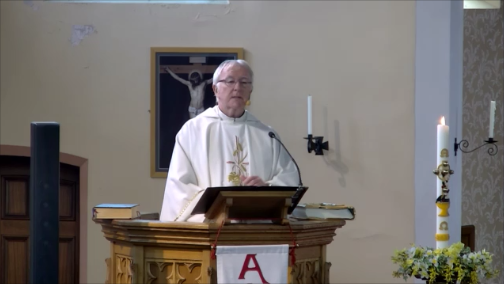
07.05.23 ~ FIFTH SUNDAY OF EASTER
(To hear audio file ~ click here)
Long before ‘The Troubles’ got going in Northern Ireland, one of the biggest contributing factors was discrimination, especially when it came to employment. Sometimes it was direct, sometimes more subtle. You wouldn’t be asked what religion you were, but what school did you go to, which was practically the same thing. Hopefully the Equalities Act of 2010 has now put an end to all that.
Jobs for the boys, looking after your own, is nothing new. As we see in the Acts today, amongst the early Christians, the pagan widows were being overlooked in favour of the Hebrew widows in the distribution of food. How did the apostles deal with the problem? Well, as men after my own heart, they delegated it to somebody better qualified! The Deacons, by the way, were nearly all pagan converts. Hopefully, they didn’t reverse the order of distribution!
Last week the Archbishop of Canterbury suggested that everyone watching on TV should join those in the Abbey, in making a pledge of allegiance to the new King. Not everybody thought that was a good idea. Some felt it was anachronistic, out of touch with modern thought. Others that the mystique once surrounding the Royal Family, is no more – that they are just like us, although a lot richer, part of a discriminatory Class system. Then, there’s history and religion to consider.
After the Reformation, English Monarchs at their coronation, had to denounce Catholic doctrine such as transubstantiation and the Virgin Mary, but this was removed after concern from Edward VII and George V, about the effect those words would have on their Catholic subjects. However, they still had to declare they would be “A faithful Protestant who will secure the Protestant succession to the Throne”, as Queen Elizabeth did 70 years ago, and King Charles did yesterday. So, there’s still a very definite, albeit non-malicious, discrimination in the coronation ceremony, in that it reasserts the position of the Church of England at the heart of the Establishment, and above all others.
However, one of the redeeming factors was that, for the first time at a post-Reformation coronation, not only Representatives from other Christian Churches, but also representatives from other Faiths, took an active part, not in the actual Rite of Coronation, which was strictly C of E, but in the wider ceremony. Very encouraging also was that the guest list included a large cross section of ordinary people who serve their community as volunteers, rather than just the Aristocracy and landed Gentry of yesteryear. Lord Tom McNally, Chair of Fleetwood Trust, told me he is one of a very small number from the House of Lords to have been invited. It looks like the new King has taken seriously the idea of levelling up, which is in tune with his echo of Christ’s words, of being called to serve not be served.
This idea of trying to be at one with his people, valuing each of them for what they contribute to the common good, also echoes, in today’s second reading, St Peter’s idea of the nature of the Church, and its function in the world. We are living stones making a spiritual house, but only in as much as we are attached to Christ the Foundation stone, and to each other. The battle for men’s souls has the same enemies Christians have always had to face, the Devil, the World and the Flesh, a battle difficult to fight on your own. A brick on its own is not much good until it takes its part in the building. Some people, even though baptised, disagree with that statement and prefer to go it alone, but that doesn’t help to further God’s kingdom. In the face of so much evil in the world, a Christian is part of a family in which every member has to work to create a strong and powerful force for good. It goes without saying that that we will best do this by pooling our resources, using our many and varied gifts together, while staying attached to Christ. As we know, Christianity is sadly divided into many different denominations, but it’s still part of the one Church Jesus founded, in which there is no room for discrimination. Hopefully, then, King Charles, who wishes to be called ’Defender of Faith’ will, over the years of his reign, help to further the cause of the unity Christ prayed for at the Last Supper.
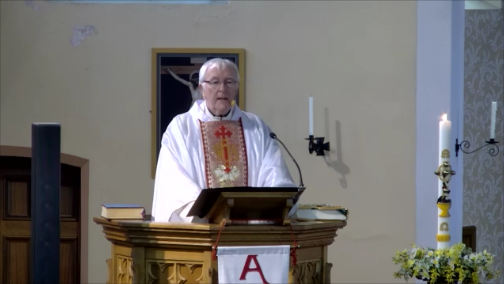
30.04.23 ~ FOURTH SUNDAY OF EASTER
(To hear audio file ~ click here)
A PASTORAL LETTER FROM THE BISHOP OF LANCASTER
Fourth Sunday of Eastertide 2023, Good Shepherd Sunday
APPOINTED TO BE READ AT ALL PUBLIC MASSES IN ALL CHURCHES AND CHAPELS IN THE DIOCESE OF LANCASTER
ON THE WEEKEND OF 29th April 2023
My dear people,
Each year, on the fourth Sunday of Eastertide, we celebrate Good Shepherd Sunday. As I write this Pastoral Letter, I am keeping in mind in a particular way all the priests of the Diocese, thanking God for each of them, in their magnificent diversity! I think of those in active ministry, those retired, some of whom live far from the Diocese, those who celebrate significant jubilees this year and those working away from the Diocese.
The image of Christ the Good Shepherd is given to us as the model of all Pastoral Ministry, and is especially the model for the priest, called to guard and tend the Lord’s flock. Our sophisticated lives can mean we are less conscious of the realities Christ brings us in this image, but we can try. Let us pay careful attention to His words, words we have heard often, and yet words that still have so much to teach us at this moment in our lives. As we listen, I ask you to pray for your priests, pray for our seminarians, and pray for vocations to the Priesthood and the Religious Life. We find ourselves fewer now than in recent years, but what is asked of us is exactly the same as what was asked of us and others in years gone by, to model our lives on the life of Christ, and follow Him.
Jesus’ whole Mission is expressed in striking simplicity at the very end of today’s Gospel, ‘I have come that they may have life, and have it to the full.’ This is the work of Jesus, so it must become our work too. No change of fortune or circumstances in our individual lives or the life of the global community changes this; it remains what we are called to do because it is the desire of the Father.
When Jesus first called St. Peter, He said that he would become a fisher of men. Fishing was what St. Peter knew. But later came the call for him to leave his nets and boat and become a shepherd. ‘Feed my lambs, look after my sheep,’ he is instructed. He is like someone being called from a job or a career they know well to a vocation. He was called to something entirely new.
And even today, Our Lord can break in on our ordered, clearly planned-out lives, and bring what seems to be to us ‘something gone wrong’, ‘something unwelcome’, ‘something disturbing’, ‘something that won’t go away or leave me alone’. Of course, we can try to resist, thinking of so many reasons why it should be someone else and not me, but it is better for us not to argue for too long with God. There will be only one winner in that contest. . . .
In many less well-developed parts of the world, especially in times of drought, terrible tensions grow up between farmers and pastoralists. The farmers work hard to grow their crops, but the pastoralists, the shepherds, are determined to find grazing for their animals. In many settings, the pastoralists have a very bad reputation, and often it is well deserved. There is competition between the shepherds for scarce resources. Violence is often a way of life as old scores need to be settled, and unending feuds are passed from one generation to the next.
By giving Himself the title of, Good Shepherd, it is as though Our Lord is showing us another way to live together, and to see good in a class of people we have lost all respect for. The hills were full of bad shepherds, but here is one who is different.
We remember the Christmas story of the shepherds hearing the angels and being guided to the crib in Bethlehem. Surely Mary told stories about the shepherds to her young Son as He grew, opening His eyes to see good in them. Her kind stories bore fruit all those years later as Jesus took up this theme of the Good Shepherd. May these stories continue to bear fruit even in our own times, as Mary opens our eyes to see the good in others that God never lost sight of. And may we join in the work of Christ, through prayer, Mass and works of kindness, gathering the scattered flock into the safety of the Lord’s fold.
With my blessing upon you and your families,

+Paul Swarbrick.
Bishop of Lancaster
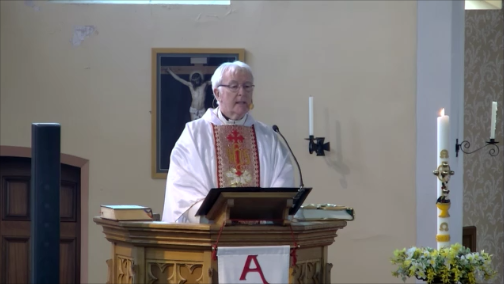
23.04.23 ~ THIRD SUNDAY OF EASTER
(To hear audio file ~ click here)
On Wednesday, there was an ambulance blocking the presbytery drive, so I couldn’t get out for a meeting I had. When I pointed out the sign saying ‘Please don’t block the drive’, the paramedic was pretty laid back,. “To be honest with you” she said, “we usually ignore those notices”. It was no big deal, but it got me thinking about an attitude which doesn’t see beyond one’s own immediate needs, to the consequences that might have for the needs of others. To see a sign and choose to ignore it, means you are missing something really important. The two disciples on the road to Emmaus, were so wrapped up in their own personal disappointment that Jesus hadn’t turned out to be “The one they hoped would set Israel free” that they missed, or more likely forgot, all the signs he had given that Good Friday would happen. “You foolish men! So slow to believe the full message of he prophets. Was it not ordained that the Christ should suffer and so enter into his glory?”
In some ways, you can’t blame them for feeling the way they did. If you’ve ever witnessed a shocking act of violence, a fight, or horrific road accident, it’s hard to stop talking about it, as people did when that little boy got hit by a car opposite Aldi. Only later comes the analysis, and the reasoning for why it happened. After Good Friday, the Emmaus duo were still in shock and, with what we now know about PTSD, that can take a long time to get over. When we have an issue, a bad memory or trauma affecting us, it can consume our every waking hour and be emotionally draining. More often than not, it takes someone with greater knowledge or insight, to help us through. The way Jesus did it for these two, was to take their thoughts away from how they were now feeling, and how the tragedy was affecting them, to the reason why it happened, which, as we saw earlier, had been foretold.
Similarly, painful, though it may be, anyone who has suffered life-changing trauma, has to go to its source, to examine the wound and what caused it, before they can begin to address how to cure it. This is especially true for adult survivors of child abuse, who may have carried around for years, unearned guilt, for something they were completely innocent of. To finally accept that that you are not responsible for something you had no control over, is a liberating experience, which leaves you free to begin a new life, loved, treasured and valued for the person you were always meant to be.
As we know, it can take a long time for the cross to disappear, if it has become an obstacle to faith. I have known many people, some life-long Catholics, who have lost their faith when the shadow of the cross fell across their path or the path of someone they love. Perhaps, there may be people here today who have walked their own road to Emmaus, full of uncertainty about Jesus, because of what has happened in their lives. At such times, it may be helpful to imagine Jesus slipping in alongside us, to lift the gloom and renew the spring in our step, something he attempts to do whenever we listen to his word. Or he may be in the person with whose empathy, help and insight we are enabled to understand things more clearly and be given the strength to persevere and carry on.
Today is the London Marathon, and among the elite runners, the club runners, the able-bodied runners and fun runners, there will be disabled runners, many of whom were victims of booby trap bombs or horrific accidents. When you look at them, you see how they have not let their lives and dreams be forever ruined by what happened to them. Instead, we see people who have triumphed over adversity, and are determined to complete their race, get their medal and pick up the money they have raised for their chosen charity. We can learn a lot from them, especially to persevere in spite of setbacks on the way. What Christians have in addition to their fortitude, is Christ’s promise to be with us all the days of our life till the end of time. When things are really bad he carries us, as in that lovely poem about the footprints. It’s a long walk to heaven, but because of his promise, we know spiritually he walks alongside giving grace and encouragement in our daily struggles. But at Mass, we also know he’s physically here with us, because we recognise him in the breaking of bread.
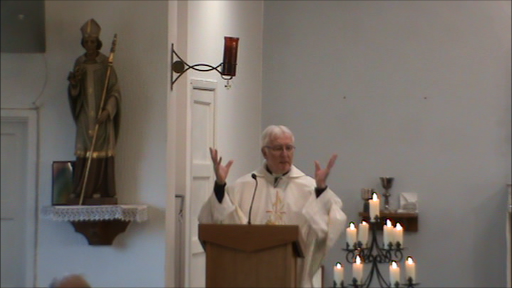
19.04.23 ~ LAST MASS AT ST EDMUND'S CHURCH
(To hear audio file ~ click here)
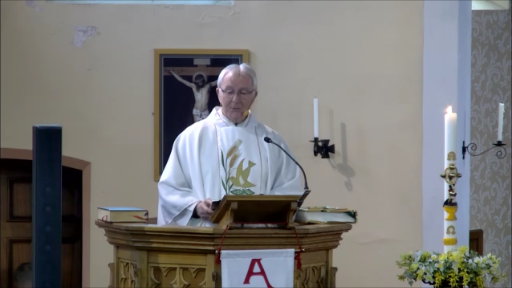
16.04.23 ~ SECOND SUNDAY OF EASTER
(To hear audio file ~ click here)
People who are very successful are often asked what was the best advice they’d ever been given which got them to where they are now. Their answer is usually something like never to give in when things don’t go well, advice that our hero Thomas could well have done with today. Why did Thomas, one of the most courageous of the apostles, give in so easily when things did not go at all well on Good Friday? After all, he was the one who, just a few days before, had encouraged the other apostles, frightened by its proximity to Jerusalem, to go back to Bethany for the funeral of Lazarus. "Let us go too and die with him!" Over eight days, even though he saw his friends profoundly changed from broken and dejected men, to men who were now full of joy, nothing except seeing for himself, could convince him that Jesus was alive again. Of course, at this stage, unlike the others, he had not received the Holy Spirit, so, like any other person, he was trying to work it out according to human reasoning. That is very understandable. You might remember that when Peter first began to preach to the men of Jerusalem at Pentecost, they didn’t just roll over and accept what he had to say. We’re told he had to speak for a long time, using many arguments, before they were convinced.
What puzzles me about this story is why didn’t Thomas leave the group and pick up his old life? I suspect he stayed because, in his heart of hearts, he desperately wanted the resurrection to be true, that the person he loved most in the world was really back with them. Like all human beings he had the capacity to receive and express love, which the deeper it gets, the more pain it causes when it comes to an end. We may live happily as a couple or a family for years, but when things start to go wrong: someone gets seriously ill, or we ourselves begin to decline, some people see only a terrible finality. "Is that it? Have we spent all this time loving each other only to have our hearts broken?" Is death the end of everything we’ve built together? No doubt that’s how Thomas felt about the death of Jesus. It’s a common experience, especially amongst those who do not believe anybody could rise from the dead, and wonder what on earth, literally, has the resurrection of Jesus to do with real life?
We, however, thanks to Easter Sunday, believe that love transcends the grave and carries on. So, his resurrection has everything to do with real life, because it gives meaning to all that expressing and receiving of love we mentioned before, which make up most of our lives. Christ said, "I go now to prepare a place for you, and I shall return to take you with me, so that where I am, you may be too". In saying that, he guarantees that the new life to which we go, is a richly satisfying existence, where we will instantly recognise those we love, and be known by them, reunited in love, this time for ever.
To believe this, though, you have to have faith which, at first, was difficult for Thomas, who, as a rational, intelligent creature demanded concrete proof, whereas Jesus said, "Happy are those who have not seen and yet believe". We too are rational, intelligent creatures, so Jesus is not asking us for a blind faith, in which everything is to believed without proper thought and reflection, but a simple faith, which, as the Catechism says, “enables us to believe, without doubting, whatever God has revealed”, in other words, to take Jesus at his word. If we believe that Jesus was just a famous name from history, who died and was never heard from again, we will only have our own wits to get by on.
But, if we believe that Jesus is alive, not just in heaven but here among us, through his Holy Spirit, it will show in our attitude to work, worship, discipline, and the loving, generous way we put our faith into practice, just as it did for the early Christians we heard about in the first reading. It will be his strength that carries us, even in the darkest days, knowing that where he has gone before, we are most certainly to follow. Thomas eventually professed his faith in Jesus in the most profound words possible, “My Lord and my God” after which he too received the Holy Spirit, and began his great adventure in the service of the gospel. Tradition has it that he became the apostle to India – fearless as ever. Not bad for someone who will forever be known as ‘Doubting Thomas’.
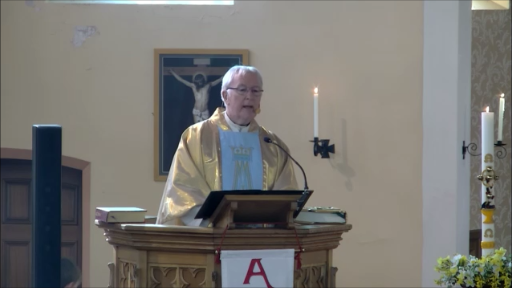
09.04.23 ~ EASTER SUNDAY - MASS OF THE RESURRECTION
(To hear audio file ~ click here)
I don’t remember watching much TV in the 70s and, anyway, there were only about four channels to choose from. However, recently there have been a lot of 70s re-runs, in part
icular of Colombo, the shabby but brilliant homicide detective. His brilliance lies in his attention to the smallest details. For example, he was having coffee with a couple of suspects who claimed they had never met, only he noticed that, without asking the woman if she took sugar, the man automatically passed her the sweeteners, which she took. How did he know that she preferred sweeteners, if they’d never met?
Attention to detail is a brilliant asset for a detective, but also for someone with an inquisitive or intuitive mind. The apostle John was one such person. When he and Peter got to the tomb, Peter entered first, saw it was empty and appeared to be mystified. John took one look at the linen cloths and the face veil and got it straight away: “He saw, and he believed”. In an instant, all that Jesus had prophesied; that the son of man would be handed over, lifted up, put to death and rise again became crystal clear to him. The body hadn’t been stolen. Why would robbers bother to neatly fold the veil? Moreover, how would they have got past the soldiers guarding the tomb? So, while Peter ponders on Mary Magdalen’s suggestion that someone has taken the body away, John’s intuition tells him the body could not have been taken away. The evidence of the abandoned and folded grave clothes are concrete proof of the resurrection, which, as we know, was confirmed later that day in the upper room. “Until that moment, they had failed to understand scripture that he must rise from the dead”.
Intuition and attention to detail is rather like St Paul’s description of the small amount of yeast which leavens the dough. If you’ve got it, you can be the catalyst for growth and improvement, by seeing beyond the obvious, which can obscure the vision God has for humanity. What Paul said to the Corinthians, can equally be applied to every generation, including our own. When we look at all that’s wrong with the world, we know from experience, that it’s never going to be made better by huge conferences. Look how many Climate Change summits and signed agreements we’ve had to cut global warming, which have yet to make any real change. It is the little people like us who are the yeast of the world, using our collective power to ferment goodness in the area we live and move and have our being. It only takes a spark to get a fire going. Think of Stephen’s contribution to tackling drug addiction. Clearly, it’s not going to end addiction on a global scale, but, here in Fleetwood, by being a small amount of yeast in the community, he has brought a good number of addicts back from the brink. Easter is not just about resurrection to life after death, but renewal of life here and now.
A book I’m reading called ‘Silence’ shows how silence enables you to contemplate the world in a completely different way than one filled with sound. Silence gives insight. For example, the author looks at a lone tree, in a car park, pushing upwards against the facade of a shabby old house, in the middle of new York’s concrete jungle, and wonders how has that tree managed to survive, keep its leaves, buds, blooms, bark and moss? For him, it’s a symbol of “Life under difficulties, growth against the odds, sap-rise in the midst of concrete, and the steady reaching for the sun”. Many people’s lives are like that, struggling to keep their heads above water, or reaching for the sun from the darkness of despair, yet managing to survive with their integrity intact. Where there’s life, there’s hope, we say.
This for me, is the true meaning of Easter, which falls at a time when nature is bursting with new life. Everywhere you look you see the death of winter and the birth of Spring. The presbytery garden, thanks to Keith, Jim Bellamy, Brian and little William Robinson, is ready for planting, and the Glory Bees are out every day now foraging to make our lovely honey. Nature mirrors the fulness of life Christ came to bring, so, like plants, let’s not miss any opportunity to let our talents bloom where they are most needed or be the intuitive yeast which helps people to rise from the mundane to their true potential. In the second century St Irenaeus wrote “The glory of God is man fully alive”. That is still true today.
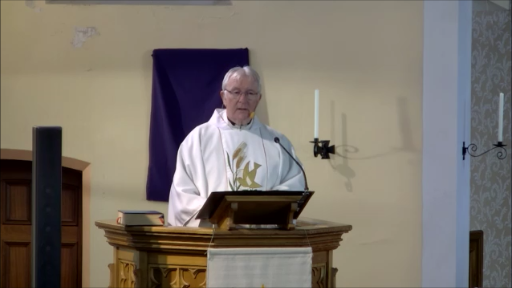
06.04.23 ~ MAUNDY THURSDAY - MASS OF THE LAST SUPPER
(To hear audio file ~ click here)
Yesterday I had to go to the walk-in centre on Whitegate Drive for an Xray, because Fleetwood Xray Dept is not functioning at the moment. That meant that everyone else was going there too. So, on arrival I was greeted with a big sign on the door which said that waiting time was averaging 3 hours.
When I did get in at 1.15, after waiting only two hours, I was able to have a little chat with the Radiographer, who was a parishioner of St Kents. In those ten minutes I discovered he had been working non-stop from 9am and had 117 cases that day, with only a student to help him. For all that, he was kindness itself, and treated each patient with courtesy and respect. Clearly, it isn’t just a job for him.
He reminded me of a nurse I knew in Carlisle, when I was the hospital chaplain, who would often pop round, in her own time, to check on elderly patients, after they had been discharged, who lived on their own. She didn’t get paid for doing that. These two examples, one of service with a smile, the other of going the extra mile, encapsulate for me what Jesus was trying to get over in today’s gospel.
The washing of the apostles’ feet is only a small incident in Our Lord’s life, which could easily have been swallowed up by the really big stories of the feeding of the five thousand, raising Lazarus, driving out the money changers. Yet it is quite clear that, of all the things Jesus did, this was one of them that he considered the most important for his followers to imitate.
The apostles were used to seeing Jesus do weird things. They’d seen him curse a fig tree, make a paste out of mud and spittle and spread it on a blind man’s eyes and, against all the rules, have a conversation with a Samaritan woman, and even allow another woman to smother his feet in kisses and tears. But I don’t think they were quite prepared for seeing him undertake such a dirty, smelly and unpleasant job, usually reserved for the lowliest of servants.
Peter, by continuously referring to him as ‘Lord’, shows he is genuinely shocked by what Jesus is doing. “You, the Lord and Master, are lowering yourself to the level of a slave”. This was precisely what Christ was doing, and he goes on to explain why. “I have given you an example so that you may copy what I have done to you”. Love must be put into practice. It’s no good speaking fine words and professing undying love, if there’s nothing to show for it. Just as when, earlier, he had instituted the Eucharist and ordered them to “Do this in memory of me” for the worshipping community, so they were also to imitate him in the service they gave, not just to the worshipping community, but to anyone in need.
Jesus gave us two great commandments: love God, love your neighbour as yourself. To love God is to be determined to do what God wants however we feel, and what God wishes of us regarding our neighbour, is that we render loving service and forgiveness. The unique importance of Christian love is that you do things for others even when you don’t want to. What the apostles learnt from the washing of the feet, and in turn passed on to us, is that, when motivated by love, the least or most menial of services takes on a new and higher dimension.
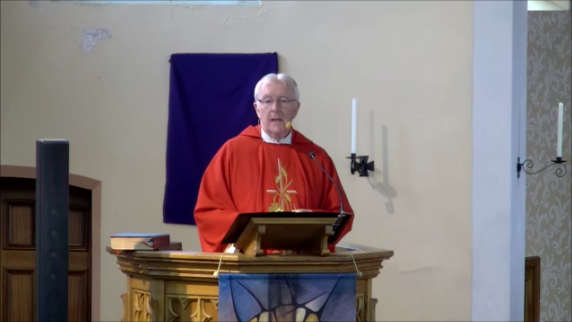
02.04.23 ~ PALM SUNDAY
(To hear audio file click here)
I remember once reading an article entitled “Is Easter just a holiday for you?” As you’d expect it was making the case for the original meaning of Easter to be taken seriously. Two things I hadn’t expected, however, were to read it in the Sunday Times, a highly secularised newspaper, and to discover that it was written by a serving MP, whom you would think would be more concerned with some vote-winning solution to the Nation’s woes, than writing about Jesus .
The main thrust was to encourage people to move away from thinking that the world owes them a living and more about what they themselves could be doing. In the context of Easter, he was referring to the importance of sacrificial love, the laying down of your life for others as portrayed by Jesus throughout his public ministry, but especially in the last week of his life, the beginning of which we start today, Palm Sunday.
At first, everything looked promising. There was absolute joy and euphoria in the crowd as he entered the Royal City to the shouts of “Hosanna to the son of David. Blessings on him who comes in the name of the Lord”. Surely Jesus was the vote-winning solution to the Nation’s woes. Like many populist leaders today, he could have milked the applause of the people, promised them the earth and lived in luxury, but he came to serve, not to be served. It soon become obvious this was not the kind of leader they were looking for, and, in a matter of days, everything would change.
He discovered a lot about the people around him in those last few days. He came face to face with selfishness, power and evil, and experienced the heartbreak of rejection as people switched their loyalties so quickly. Some of those same people who sang Hosanna would be baying for his blood.
In the agony in the garden he was left completely alone, since Peter, James and John were there in body, but not in spirit. He experienced many conflicting feelings and emotions, as he prayed for the cup of suffering to be taken away. He hadn’t gone looking for death. It came to him as the price he paid for the way he lived, and his saving love for all humanity which he taught to his followers.
Reading Our Lord’s Passion is never simply the recounting of a past event. It’s always a meditation on how it touched the lives of those engaged in it and how it still touches the lives of those who hear it today. The drama of Holy week has many characters, fickle people, manipulative leaders, cowardly Pontius Pilate, Simon of Cyrene, the reluctant helper, Veronica the compassionate, the women who mourned for Our Lord, the good thief, the pagan Centurion, and, of course, you and me! All mankind is in there somewhere as spectator, friend, enemy, or indifferent depending on how they see Christ.
Because it’s something real, and not just a re-creation of an historical event, everyone has to work out where they stand, where their loyalties lie. Like those who think Easter is just a holiday, some will wash their hands of Christ like Pilate? Others, like the Centurion will eventually come to acknowledge that “In truth this was a son of God”. Others again, like the apostles, will be followers he can trust with his mission to bring the good news to the men and women of our time?
Just where, exactly, do we stand in that multi-faceted crowd of people, who looked on Christ with so many differing degrees of interest?
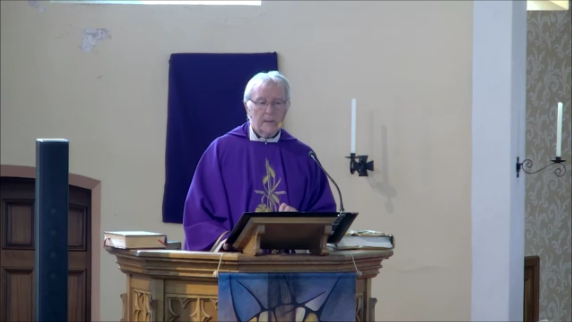
26.03.23 ~ FIFTH SUNDAY IN LENT
(To hear audio file click here)
I was reminiscing with an ex-Army Chaplain the other day about an exercise I once took part in. We were crashed out at 0400 hours, given an RV, told to dig our trench up to chest level, and stand to for a possible dawn attack. Unfortunately, I was partnered with a very large 6’3” tall guy, so we were still digging long after the others had finished and were brewing up. I can’t remember how long we were in the hole, but I do remember him saying how, one day, he and I would both have to leave our cosy little rooms in the Mess, with their teles and other home comforts, and return to a similar hole for our final resting place, there to await the resurrection. Well, it was 4am, and there wasn’t a lot to talk about. Not the best companion I’ve ever had to share a trench with! What he said, though, is true. Death is always with us. Here at St Wulstan’s we’ve just had four funerals in 10 days.
Some people see only the gloomy side of death, the pain, the sadness, the loss, the finality, and are often inconsolable. Others, like ourselves, are consoled by the hope of eternal life. For most of their history, this is not a hope that the people of the Old Testament had, although there were tiny glimpses from time to time. Their idea of resurrection was a return to their gilded life as the Chosen People, in their own homeland, as we see in Ezekiel, where they are crushed by the despair of exile. In our own time we know of Ukranians who want to go home, or Iranians who can never go home. The Israelites are no different from displaced people throughout history. Although they’re not dead, Ezekiel uses the poetic image of God opening their graves, as though they’ve been buried alive, kept in the dark, given false hope. To them God says, “I shall put my spirit in you, and you will live”.
By the time Jesus comes on the scene, there is a growing belief in the actual resurrection of the dead, as testified to by Martha, who says, “I know my brother will rise again on the last day”. But before we look at what Jesus says next, we should look at the background to the story. Clearly, Martha and Mary knew where Jesus was and roughly how long it would take him to come, because they sent messengers there. Can you imagine how they must have felt, pacing up and down the kitchen, wondering what on earth was he doing. Why was he taking so long? You’ll know what that was like, if you’ve ever waited desperately for a phone call which may contain life-changing news.
What we have to remember, is that this was to be Our Lord’s last recorded miracle, which would turn out to be a dress rehearsal for his own death and resurrection. If Jesus had rushed to them, or healed Lazarus remotely, like he did with the man whose son was dying in a neighbouring village, or as he did with the Centurion’s servant without having to enter his house, they would not have learned anything new about him. They already knew he could cure the sick. No, his delay is deliberately and carefully choreographed, to lead them to a deeper understanding of who he really is. As he said to the apostles, “This will not end in death, but in God’s glory, and through it, the Son of God will be glorified”, which is what actually happened. Many of those watching came to believe in him.
Raising someone from the dead, as opposed to curing an illness, proves that the same power of God, the giver of life, is revealed in his Son. That’s why, before the miracle, Jesus proclaims that he is the Resurrection and the Life, and asks Martha perhaps the most important question in history, “Do you believe this?” It’s a question everyone has to answer at some time in their life. On the answer we give depends our salvation and our reason for living. If you do believe it, deeply and sincerely, you already have eternal life in you, which death cannot destroy. “Whoever lives and believes in me will never die”. Of course, like Lazarus, we will physically die one day and be buried, as my trench buddy predicted, but for us, the resurrection has already begun. As St Paul says, “If the spirit is living in you, then he who raised Jesus from the dead will give life to your bodies too”. By saying “I am” the resurrection and the life not “I will be” the resurrection and the life”, Jesus clearly demonstrates that faith is not meant for ‘pie in the sky when you die’ but for living life in all its fullness here and now.
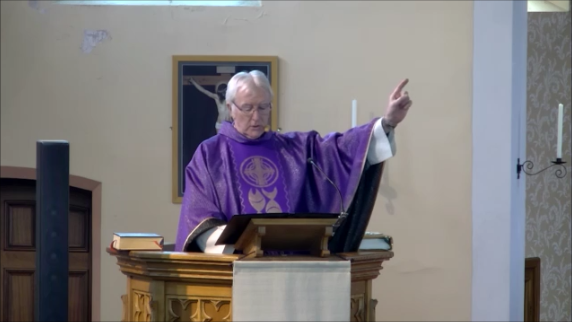
19.03.23 ~ FOURTH SUNDAY IN LENT
(To hear audio file click here)
During the week a friend sent me a photo of a feminist protest march somewhere in a Spanish speaking country. Two girls were marching side by side, with two huge posters. The one on the left said, ‘Todos los hombres son unos cerdos’ which means ‘All men are pigs’. The one on the right said ‘Somos iguales a los hombres’ which means ‘We’re exactly the same as men’. Sometimes, it pays off to co-ordinate juxtapositions beforehand. But the photo is also a good example of the old phrase, ‘There are none so blind as those who cannot see’, which refers to people who don’t look beyond the obvious, of which there are some examples in the scriptures today.
I imagine that Samuel was quite excited when he was given the task to anoint the new king God had chosen to replace Saul, and as we see, he is quite taken by the appearance of each of Jesse’s seven sons, all of them in his eyes, perfect for the job. But God has other plans. He is ordered to anoint the adolescent David. Was it perhaps, because David was the lowest in rank in the family, and, therefore, used to taking orders, rather than throwing his weight around, somebody to whom humility would come naturally? Who knows? But there is quite a precedent throughout the Bible for choosing the weak to confound the strong, not the way the world usually works. Samuel is reminded that while men look at appearances, God looks at the heart, in other words, beyond the obvious. I don’t think it is any accident that Jesus follows the same pattern in his choice of the apostles, as well as in his preference for the poor and marginalised. “I bless you Father, for hiding these things from the learned and the clever and revealing them to mere children”. Not the normal place to start.
And so, to the story of the man born blind. We saw last week how Jesus evangelised the woman at the well with a slow build up from a conversation about water to her accepting him as the Messiah. Today’s gospel is similar. It starts with an everyday encounter with a poor man on the margins of society. Presumably, he gives permission for Jesus to smear mud paste over his eyes. I wonder what he was thinking as he headed off to the Pool of Siloam. Would he end up a laughingstock, a victim of a cruel charlatan? Or had people told him about Jesus, so that he was willing to give it a go? That tiny grain of faith is rewarded and his sight is restored. What we see afterwards is his faith and confidence begin to grow as he is forced to declare his hand, firstly to his neighbours and those who knew him, then to the dreaded Pharisees, who are not amused that Jesus has worked a miracle on the Sabbath.
Like the Samaritan woman, he openly shares the good news, although in more hostile circumstances. To those who know him he simply tells what a man called Jesus did to make him see again. He knows nothing about him or where he is now. To the Pharisees, who are very aggressive towards him, and his parents, he proclaims Jesus to be a prophet, someone sent by God, which causes them apoplexy as they hurl abuse at him. But this is no shrinking violet. He gives as good as he gets, ending with the unanswerable riposte: “Ever since the world began, it’s unheard of for anyone to open the eyes of a man born blind: if this man were not from God, he couldn’t do a thing”. But they do have an answer: it’s to drive him away. Jesus hears about it, finds him and, as with the woman at the well, invites him to believe in him as the One the world is waiting for, which he does. His evangelisation is complete.
Like the Pharisees, it is possible for those who claim to see, to be blind to what God is doing through Jesus in our own time. As you know Pope Francis’ reforms of the Church in the spirit of Vatican II, are being vehemently opposed by some High Ranking prelates who want to keep the Church as a fortress against the world, instead of engaging with it. To quote John Lennon: ‘Living is easy with eyes closed. It’s understanding everything you see’. Our entire life as a Christian, like the man born blind and the Samaritan woman, is a gentle ascent through the light and shade of this world to absolute faith in Jesus, precisely so, like them, with eyes wide open, we can engage with the people of our time, and lead them to a personal encounter with the risen Christ, the light of the world.
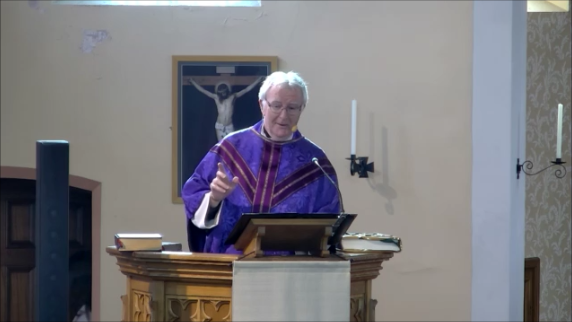
12.03.23 ~ THIRD SUNDAY IN LENT
(To hear audio file click here)
Have you ever gone into a supermarket looking for one particular thing, and been unable to find it because of the thousands of other products on the shelves around it? It’s a sort of ‘can’t see the wood for the trees’ feeling. it can be quite frustrating, even more so if the store decides to change things round from where they usually are: to say nothing of Aldi, which is brilliant, by the way, where you’re more likely to find the jam next to a set of spanners or a pair of ski boots.
Struggling to get things in focus because of distractions, is very common in many other walks of life too, including our relationship with God which is often hampered by preoccupation with externals, which cause us to lose sight of what we’ve really come into this world for. In the gospel, the Samaritan woman is focused only on the external daily task of fetching water. Apart, perhaps, from a simple greeting, she would not have initiated a lengthy conversation with an unwelcome Jew. To put it in context, you may remember Asia Bibi, a Pakistani Christian, who was condemned to death for drawing water from a Muslim well, thereby supposedly contaminating it. She spent 9 years on Death Row before, through international pressure, she was freed. Inbuilt prejudice can do that sort of thing.
So, not for the first time in his dealings with unlikely people, it is Jesus who makes the initial contact. What follows next is a classic example of how to evangelise. A simple meeting with a stranger and an everyday request for a drink of water, leads to a discussion about worship. Soon initial hesitation and reservation is broken down and a personal exchange about who they both are takes the conversation to the deeper level of faith, which results in her accepting Jesus as the Messiah. She, then, ends up becoming the evangeliser of her village. Having been led into the mystery of Jesus, there’s no way she wants to keep the Good News to herself. She has to share it with others, as do all Christians, who themselves became Christians, precisely because somebody told them the Good News.
But, how do we do it? The starting point is to realise that we don’t actually give people faith. I remember a young priest telling me that as he started his post as a hospital Chaplain, his wise old parish priest said to him, “Always remember as you approach the hospital bed, that Jesus has been there before you”. It’s exactly the same with people we meet in other circumstances. Faith is already there for the taking. It’s a free gift from God, offered to anybody and everybody, not just the chosen few. So, when people approach me about becoming Catholic, I always tell them that they have already accepted the gift, and that my job is to help them to open up the treasures that lie within it.
Evangelisation is a progressive process. Very rarely does someone go from 0-60 in ten seconds. It can take years. Following Jesus’ example, when an opportunity to evangelise does come, we should start slowly. In conversation with strangers, apart from discussing the weather, we’re often asked what we do or what our interests and hobbies are. Why not include the fact that I’m a Catholic and go to St Wulstan’s. Just saying that, witnesses to the fact that, contrary to what the mass media would have us believe, the Church is alive and well. You never know where that might take the conversation.
John Pridmore stayed over Friday night and told me a story I hadn’t heard before. When he was at the height of his powers as a gangster, he was given the task of doing some serious damage to a man who owed money. He went to the flats ‘tooled’ up with knuckle dusters, a machete and a gun. On the way up in the lift a 14 year old boy got in, looked him straight in the eyes and said ‘Jesus loves you’. John, who was full of hatred at the time said, “I’m glad somebody does’. But when he got to the 18th floor, he did not complete his mission, telling his boss the target wasn’t in. As you know, since his conversion, John has spoken to literally millions of people around the world, about God’s love and mercy. As he himself said, that young boy will probably never know how many thousands of lives he has saved vicariously, through those words he said to a complete stranger, in a lift, thirty years ago.
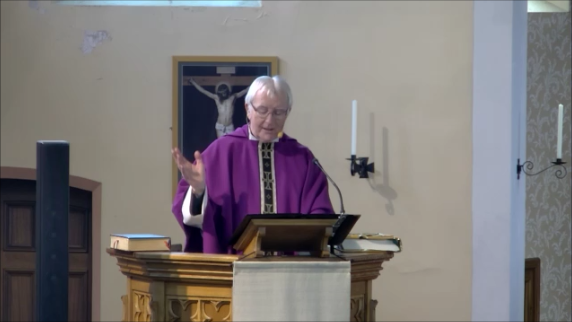
05.03.23 ~ SECOND SUNDAY IN LENT
(To hear audio file click here)
As I sat down to put these few thoughts together, I was accompanied by the continuous ‘thump, thump, thump’ of a pile driver, on the building site outside my window. It went on and on and on, so when it stopped, it was sheer bliss. However, a few minutes later it started up again, and I fear that’s the way it’s going to be for the next few weeks. The builders are going deep down into the ground to ensure the foundations are solid. But, one day, the noise, banging and crashing will end. New homes and new life will emerge from the site, and peace will return to the back field.
In the light of today’s gospel, it struck me as a metaphor for the human condition, with its hustle and bustle of constant activity we’re all part of, in the journey to our new life and new home of heaven. Unlike St Peter, who wanted to drop out of society, build some tents, and spend the rest of his life in idyllic, blissful peace, far from the madding crowd, we know that in the real world that’s never going to happen. Nor is it what God has in mind for us. We are to follow the example of his Son, who had to dig deep down into the ground of human experience, to lay the foundations on which his Church would be built, and this involved strife, struggles and suffering.
Clearly, the apostles didn’t understand this, when Jesus told them of his impending passion and death. They knew, of course, that things were getting a bit hairy, as regards Officialdom’s hostility towards him: - but, that they should put him to death! What for? Not teaching what the Authorities approved of? Surely not! Peter tried to remonstrate with him. “Master, you mustn’t say things like that” which earned him a severe rebuke. “Get behind me Satan. The way you think is not God’s way, but man’s”. That’s why, foreseeing the devastation they would experience when his prediction came true, he decided they needed to see who he really was, and where all this was going.
On the mountain, God unveils for them the glory of his beloved Son, with a command to listen to him. Listening will mean observing and understanding why Jesus had to fulfil the OT prophecies about the Suffering Servant. A broken and bruised world needed a broken and bruised Saviour, not someone detached from life’s harsh realities. It also meant understanding, from what they saw on Mount Tabor, that his true home was in heaven, and by allowing them a glimpse of his divinity, he was inviting them, and us, to share it with him. At the Last Supper he will say, “In my Father’s House there are many rooms. I go now to prepare a place for you so that where I am, you may be too”.
The bottom line, then, for would-be followers of Christ, is, as the well-known phrase has it, that there’s no Easter Sunday without Good Friday. In other words, suffering is part of life. But it’s not the purpose of life. Suffering is like being refined in the fire, taking away the dross of human sin and making us fit for heaven. St Paul says, “With me bear the hardships, for the sake of the Good News”. He also says, “Rely on the power of God, who has saved us and called us to be holy”, something that Paul, in his missionary life, had to do many times.
To rely on God who called us, not because of anything we have done, but for his own purpose, takes an amazing amount of trust. To have any hope of success, God’s first attempt to renew the covenant with mankind, after it had been disrupted by the debacle of the Fall, Cain’s fratricide, the tower of Babel and the Flood, needed someone who would trust him completely. Abraham, whom we refer as ‘Our father in faith’ was that person. Throughout history, God often seeks out such heroes of faith, to stop the rot and turn things round, like St Francis, St John Vianney, Mother Teresa and Pope Francis, the undisputed world leader in concern for the conservation of our common home. Every one of them suffered opposition or setbacks, but all of them bore those hardships for the sake of the gospel because Jesus had said, “You did not choose me. No, I chose you and commissioned you to go out and bear fruit that will last”. With God’s grace, let none of us be afraid to follow their example.
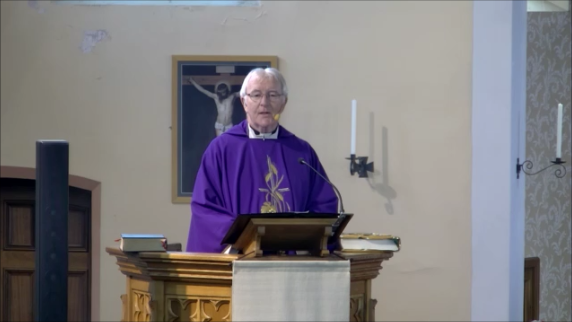
26.02.23 ~ FIRST SUNDAY IN LENT
(To hear audio file click here)
A PASTORAL LETTER FROM THE BISHOP OF LANCASTER
for the FIRST SUNDAY OF LENT ~ 26.02.23
APPOINTED TO BE READ AT ALL PUBLIC MASSES IN ALL CHURCHES AND CHAPELS IN THE DIOCESE OF LANCASTER ON THE WEEKEND OF 25-26 February 2023
My dear people, At the beginning of Lent I address you with words of encouragement, knowing that you live complex and demanding lives. I address you as people of Faith, knowing that you can find it difficult to live your Faith in Christ as you should. We all long to be closer to God, but often we sense that we are failing in so many ways. The longing to be close to the Lord will not leave you, because it is God given.
Just a few weeks ago we were wishing one another a happy new year. All too quickly the world’s realities assert themselves and our hopes for a happy 2023 have to be adjusted. The most recent global tragedy to gain our attention has been the earthquake affecting millions in Turkey and Syria. Many of you will already have made a personal contribution to help the relief work. The plight of those now homeless and bereaved and injured can help us reflect on our lives this Lent.
Note the contrast given in today’s readings for the First Sunday of Lent. The Book of Genesis tells us how the Lord God fashioned us in His own likeness and breathed His life into us. It tells us how He placed us in a beautiful garden that would be the setting in which we would know His company and deepen our relationship with Him. Then, in the Gospel of St. Matthew, we see something shockingly different. The Son of God enters the harsh life-threatening wilderness to do battle face to face with the father of all evils. The one thing common to these contrasting scenes is the longing of the Father’s heart to share His life with us. This truth deserves our full attention. When we lost our place in Paradise we had no ability of our own to regain that treasure. We were lost, like those buried under the rubble of their broken homes. We could only wait and hope to be rescued. Christ is sent to save, redeem and rescue us. He enters the wilderness, the ruins in which we lie, to find us and bring us back.
We know that for thousands in Turkey and Syria the rescuers will arrive too late. We know that for those who are found, the lives they had, cannot be restored. But Faith tells us that the longing in the heart of the Father does not offer us something we can describe as ‘second-best’. The tragedies we experience in the world are beyond our own ability to put right, but this is not the case for God. What we see as impossibly lost is not so for God.
This Lent, let us reflect often, daily, on the longings of the Father for us. Let us not consider first our own efforts but those of the Father. Jesus did this every time He went aside to pray. This is what motivated Him in all that He said and did. We must try to do the same. It will then motivate us to undertake with new heart, prayer, penance and works of generous charity. Do not lose heart. We set ourselves to do what we can with our lives and leave God to perform the miracles. The Sacrament of Confession is exactly where He performs many miracles.
Perhaps Mary knew that her Son had entered the wilderness. She had entered that wilderness too, when she said yes to the Archangel’s message. She joined her own efforts to the ‘relief operation’ and will inspire each of you to do the same. The happiness of 2023 and any new year will not be found in the random affairs of the world, but in the persistent longing and action of the Father to find His lost children, to rescue us, and to return us to the garden He has created for us. With my blessing, particularly for those who face hardships,
With my blessing for you and your families at this time,

Rt Rev Paul Swarbrick
Bishop of Lancaster
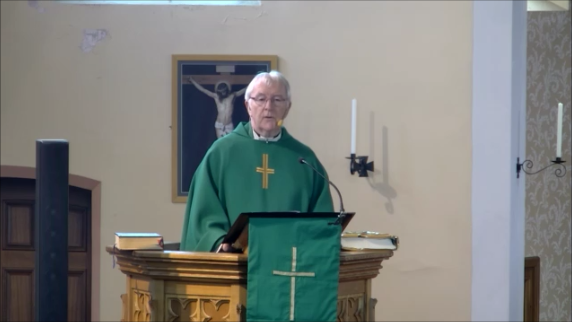
19.02.23 ~ SEVENTH SUNDAY IN ORDINARY TIME
(To hear audio file click here)
Two weeks ago I mentioned I’d star
ted watching ‘Happy Valley’ in which everyone seemed to have, literally or figuratively, a clenched fist. Anger and incivility was the default mode of communication. Ryan, the grandson, had a habit of saying ‘Revenge is a dish best served cold’ and in the last episode his grandma, Police Sgt Cawood, served it up very cold on the wounded psychopath, Ryan’s father. He tells her he no longer wants to kill her, because he has seen in her photo albums, what a good life she has given his son. “I forgive you for wanting to keep him away from me” he says, which, far from removing her hatred of him, unleashes a torrent of merciless abuse against him in vengeful triumph, as an eye for an eye, the opposite of Our Lord’s instruction to ‘offer the wicked man no resistance’.
Many people watching would not be surprised at her reaction. It’s natural to want to get your own back, to see those who hurt you get their ‘come-uppance’, and that’s why it always causes wonder, amazement, sometimes disbelief, when a parent of a murdered child says, “I forgive the people who did this”, as Jimmy Mizzen’s mum did on the very day her son was stabbed to death. She said, “ I feel sorry for the boy who killed him. Jimmy had a very happy childhood and knew he was loved. What kind of childhood did the other boy have, that he felt he had to carry a knife to protect himself?” That sort of response goes far beyond the limits of getting your own back. It sees a person just as much loved by God as ourselves, God who causes the sun and rain to fall on good as well as bad.
Going back to an eye for an eye, a tooth for a tooth, It probably won’t surprise anybody to know, that many ancient civilisations operated this principle, long before Moses enshrined it into Jewish law. Later, the Romans called it the ‘Lex talionis’ or ‘law of retaliation’. So it was a fact of life, and still exists in certain cultures today. I once watched a documentary on Sharia law, in which a tribesman was having his fate decided by a group of elders for stealing. After some debate, the verdict was that his right hand would have to be severed. At this, the camera focused on the man sitting on the floor just outside the circle of elders, who began to cry and plead for mercy, on the grounds that he was a carpenter, and to lose his hand would be to lose his livelihood. Thankfully, his plea was accepted. He was taken outside, suspended from a pole, and beaten with bamboo canes on the soles of his feet.
Harsh as it may appear to us, the law of retaliation, in its day, was a huge leap forward in comparison with the free-for-all scale of violence used in reprisals. Far from encouraging people to retaliate, it was designed to restrict retaliation: if you feel you must take revenge, then limit it to the equivalent of what you suffered – an eye for and eye, not a life for an eye. In other words, the punishment should always fit the crime. Unfortunately, however, in real life, the lex talionis has often been, and still is, used with no such proportionality and restraint, to inflict untold suffering on individuals and nations. Think of the tit-for-tat killings during the Troubles, the current revenge killings in Israel, the crushing of dissenters in Hong Kong, and other places, where the punishment far outweighs the crime. Such unrestrained punishment nearly always sets off a chain reaction of even more violence.
So what’s the alternative? “Be holy” says Moses “because the Lord your God is holy”. “Be perfect” says Jesus “as your heavenly Father is perfect”. Tall orders! We’re never going to achieve perfection in this life, but holiness is definitely reachable, if we continue to respond to the promptings of the Holy Spirit to do the unexpected. To turn the other cheek seems unnatural, but it keeps us in tune with the way God loves, and may have surprising results. Look at Truth and Reconciliation process in S Africa. What Jesus asks of us will seem ridiculous to many or naïve to some, but it works. By not reacting to hostility by being hostile in return, may cause someone to think differently and diffuse the situation. As an injured party, with every right to exact retribution, being able to say, “ I forgive you” or “I’m not going to fall out about this” can, and often does, bring about a change of heart. Offering the hand of friendship is being holy, and clearly more effective than pursuing vengeance.
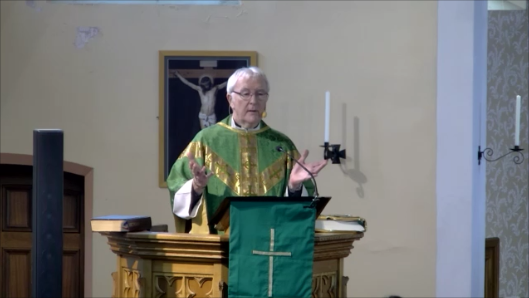
12.02.23 ~ SIXTH SUNDAY IN ORDINARY TIME
(To hear audio file ~ click here)
In the United Reformed Church’s latest magazine there’s a story of a little girl who had to go out of church as she wasn’t feeling too well. When she returned she told her mum that she had been sick. “Oh dear” her mum said, “did you make a mess?” “No, it’s fine” she said: there’s a box at the door marked ‘For the sick’. A lovely story of someone taking things literally, instead of thinking (and vomiting) outside the box.
In today’s gospel, part of the Sermon on the Mount, which is full of wonderful and memorable teaching, Jesus takes an unusually stern approach to the literal interpretation of the Law. Bear in mind that he starts by declaring openly, “Do not imagine that I have come to abolish the Law or the Prophets” (the twin foundations on which the Old Testament was built) “I have not come to abolish them, but to bring them to completion”. So, he’s not encouraging his followers to ignore the rules, but to think outside the box. Most Pharisees thought it was enough to obey the letter of the Mosaic Law, and made sure the people did the same, often distilling it down to minute details of what you could and couldn’t do in everyday life, such as how far you were allowed to walk on the Sabbath.
But Jesus is the new Moses and has the Father’s authority to interpret the spirit of the Law, which he does, starting with, “If your virtue goes no deeper than that of the Scribes and Pharisees, you will never get into the kingdom of heaven”. He distinguishes between slavish obedience to the letter of the law, which he sees as shallow and demeaning, and understanding the spirit behind the Law which has depth. He gives examples of various commandments which most people, if they take them literally, would find quite easy to keep. Very few people want to kill, steal, commit adultery or break their promises, and for those who do, having proscriptive laws is a good idea, to protect the common good. When Jesus says “That was then: but I say this to you” it becomes very clear that, in the new dispensation, obeying the Law is a matter of the heart, something which comes from deep inside, not imposed from without. It’s doing the right thing even when there’s nobody around to see it.
We are all of us subject to the Law, and let’s face it, it can be irritating. I once got caught for parking on a pavement in a narrow street near Old Trafford. My defence, which I thought was pretty good, was to say, that if cars in certain streets in Fleetwood didn’t park on the pavement, it would be impossible to get an emergency vehicle down them. However, the Magistrate said, ‘Did you park on the pavement? Yes, I said. ‘Guilty’ he said and fined me £100. It would have been nicer, and much more Christian, if he’d said “I forgive you, go in peace and sin no more”.
In his letter to the Corinthians, St Paul draws a line between those who see and understand the world through ‘the philosophy of the masters of our age’, and those who see the world with eyes touched by the Spirit of God. So, for example, Governments today often decide that a social problem, which may have many deep-rooted causes, can be solved by simply throwing a new law at it, or making it illegal, but that rarely solves the problem. People still use their mobile phone when driving.
Paul, on the other hand, says “We have a wisdom to offer those who have reached maturity; a wisdom that none of the masters of this age have ever known, revealed to us through the Spirit, who reaches the depths of everything”. What he means is, discipleship is not a matter of obeying fixed rules, but using the wisdom which comes from faith and the inspiration of the Holy Spirit. If our hearts are in the right place, then the law poses no real problem for us. Obedience to it becomes a virtue rather than a burden. If we genuinely love God and our neighbour, we don’t actually need a law to tell us not to kill, not to steal our neighbour’s goods, or damage his reputation, nor how to behave or not to use our mobile phones when driving. Yes, the Law has its place, for those who have not reached maturity, but for those who have, the hidden wisdom of our God has been revealed to us, which St Augustine famously summed up as, “Love, then do what you will”.
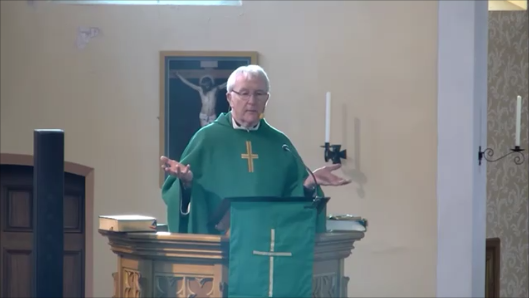
05.02.23 ~ FIFTH SUNDAY IN ORDINARY TIME
(To hear audio file ~ click here)
The phrase that leapt out at me from today’s scriptures was “Do away with the clenched fist”. In my paper last Sunday, there was an article lauding the TV drama ‘Happy Valley’ to the skies, as the best Police drama yet, based on the story of a real-life female Police sergeant. Then during the week loads of radio programmes have been talking about it, so I decided to watch it – thanks to BBC iPlayer. It is really good, and, from what I’ve seen of it so far, certainly deserves the accolades. However, the thing I noticed most, was that, actually or figuratively, everyone in it has a clenched fist. Nobody talks civilly to anyone. As well as the violence of the criminals, there’s anger at every turn, even amongst the Police themselves, especially when her corrupt superiors, won’t allow Sgt Cawood to press charges against a corrupt councillor, for drink driving and possession of drugs.
The reason most reviewers loved it, is because they say it’s so true to life. If that’s the case, if that’s what life in Britain is really like, we have to ask why isn’t there a single priest, vicar, or overtly Christian character in the drama? With so much anger, violence, dishonesty and drug abuse, where are the people who are salt to the earth and light to the world in this story? Why are they not there as the antidote to the clenched fist in our society, with a profile as high as that of the evil doers? Are they seen as too meek and mild to be taken seriously as a force for good? In real life, as portrayed on the screen, have we Christians retreated back into the catacombs out of sight, or simply just come to terms with the standards of the world, using that overworn phrase today, “It is what it is”, as if nothing can be done to make things better? After all, we are the people of the open hands of welcome, not the clenched fist of pain.
It’s interesting that the people Jesus first calls salt and light, is a group of quite ordinary men and women like ourselves, to whom he pays a huge compliment, by reminding them of their true worth, when their circumstances and station in life, seem to suggest that they’re not worth very much. Notice that we’re not the light of the Church, but the light of the world. If Christianity stops at the church door when we leave, it’s no good to anyone. Having had our batteries recharged here, our light should shine brightly outside for those who are angry, lost, disillusioned or afraid, by doing what Isaiah says: “Share your bread with the hungry, shelter the homeless poor, clothe the man you see to be naked, then your light will shine like the dawn”. Like salt, we should also help to sooth the wounds of those injured by the clenched fist of injustice and look for ways of livening up areas of our community life which appear mundane and moribund. Pope Francis wants us to spread the JOY of the gospel as a gift to the world. If we are uncaring, always grumpy, bad tempered and miserable looking, our salt has lost its savour, and who, in their right mind, would want to taste what we have to offer?
There’s one more thing to remember from this gospel, perhaps the most important. We’re not doing this to win Brownie points for ourselves. Very rarely do we put a light on just so that we can look at it – we use it to see other things. We don’t usually add salt to food to taste the salt, but to flavour the food. Similarly, our role is not to be the focus of attention, but to point out, and enable others to see and taste, something worthwhile having so that “seeing our good works, men may give the praise to our Father in heaven”. This is all about sharing our faith in a public way, in order to attract people to the Father, through a personal relationship with his Son. It doesn’t mean preaching at them! In St Paul’s letter, he’s remembering how he failed miserably, when he tried to use the arguments of philosophy in Athens, a city besotted with the latest ideas, so in his letter to the Corinthians, he drops human philosophising and relies only on a demonstration of the power of the Holy Spirit. We to have to do the same. No point wasting time making smart arguments – just get on with being salt and light in people’s lives.
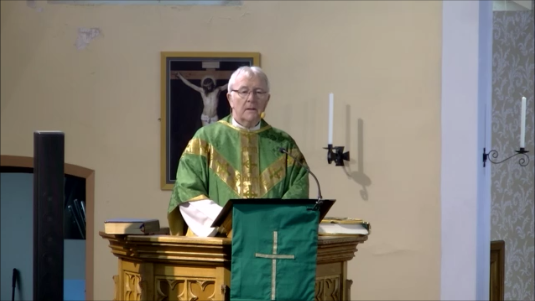
29.01.23 ~ FOURTH SUNDAY IN ORDINARY TIME
(To hear audio file ~ click here)
I was reading a spiritual book recently called ‘Dare to Believe’ by David Payne, which had a lovely true story about British Rail. In order to test their high-speed Inter City windscreens for bird strikes, they borrowed some hi-tech equipment from British Airways, which is used to shoot a chicken, at ferocious speed, into the windscreens of its jets, to test their strength. The BR Engineers in Crewe set up the test, shot the chicken and, to their horror, saw it smash through the windscreen, go right through the driver’s seat and embed itself in the wall behind. They repeated the experiment and the same thing happened. This had never happened before, so BA sent over a technician to see what the problem was. Having watched them do the same thing again, he said, “You idiots! You’re supposed to defrost the chicken first”. Clearly, they had not read the instructions properly.
Today’s gospel gives us the ‘Blueprint’ for the Christian life, but we ‘re so used to hearing it, that we may fail to read the instructions properly, in order to put it into practice. When Jesus begins his public ministry with the Sermon on the Mount, you would think, with it being such a monumental occasion, with at least 5000 attending, that everyone would have hung on to his every word. But did they? I suppose it depends on why they were there. Some would be curious to see the new celebrity everyone was talking about. The Pharisees might have been anxious to hear what false teaching he was proclaiming. Mothers would have been distracted by their children playing, or worried, as the day went on, where they were going to buy food to feed them. Without the benefit of a PA system, and being in the open air, not everyone would have been able to hear anyway. (I think he said, ‘blessed are the cheesemakers’). And yet, for all these people, the law-abiding, the sinner, the curious, the indifferent, Jesus had a personal message which was, and still is, “If you want to be happy, live the Beatitudes, because beatitudes are blessings and blessings make us happy”.
This was certainly a new approach for many in the crowd who might have wondered, why not just keep the 10 commandments? They tell us what’s right and wrong. But commandments simply demand obedience to a list of prohibitions, whereas beatitudes ask us to cultivate a whole new attitude to life. For example, a person may live his entire life without the inclination or opportunity to kill someone, so strictly speaking, he has kept the commandment, ‘Thou shalt not kill’. But, has that made him a better person? Jesus’ teaching goes much deeper. ‘Blessed are the peacemakers’ he says. And suddenly, it’s not just a question of keeping commandments and rules anymore, but one of cultivating a positive, active approach to all those areas of life which are a challenge to our Christian faith. Being a peacemaker is very different from being a peace lover, who may give in to unjust demands for the sake of peace and quiet. A peacemaker does not avoid controversial issues, but engages with them for the sake of ensuring justice. There can be no real peace without justice.
What we have to remember is that what Jesus brought was really good news. It was radical, yes, but life-giving. As St Paul points out, the people Jesus called were not from influential or noble families, and were even considered common and contemptible by the so-called worldly wise. When Jesus says ‘Blessed are the gentle, he means that these little people, by being understanding, slow to anger and allowing others to flourish, are helping to build the world God always had in mind. They nothing at all yet chosen by God to show up those who think they are everything. Similarly, all the beatitudes teach us how to defrost any hard-hearted resistance to God’s grace, and how to live as members of his kingdom, even when our values and attitudes don’t fit in with society in general.
Over the next few weeks, we will hear extracts from the rest of the Sermon on the Mount, which are full of advice such as, “If your virtue goes no deeper than that of the scribes and Pharisees, you will never get into the kingdom of heaven”. So, if you don’t want to end up like the poor old BR chicken, it might be a good idea, to listen carefully to those instructive words of life, and take them to heart.
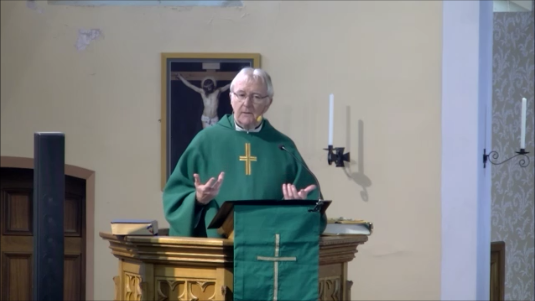 22.01.23 ~ THIRD SUNDAY IN ORDINARY TIME
22.01.23 ~ THIRD SUNDAY IN ORDINARY TIME
(To hear audio file ~ click here)
In the film ‘The Damned United’ Brian Clough takes over as manager of Leeds United which, at the time, was the best team in the country. On his first day with the team he tells them “You can take all your cups and medals and throw them in the bin, because you got them by cheating and playing dirty”. It didn’t go down well as a master class on how to win friends and influence people! At Bible share on Thursday, we were looking at how St Paul, at the Areopagus in Athens, a space filled with pagan idols, started his mission in a very different way, by complimenting his hearers. “I see that you are all religious men. You even have a statue to the unknown god – let me tell you who he is”.
We all know that the Church exists in order to spread the good news about the kingdom of God, but, as the late, lamented Frank Carson used to say, “It’s the way you tell ‘em”. Going in all guns blazing, and rubbishing people’s cherished ideas, is not the best way to start. Jesus was the first evangeliser. So how did he start? In the gospel, it looks like the apostles just dropped everything and followed him, like a rock star, on a tour of Galilee. But if you look more closely, Jesus had already settled in Capernaum, and had begun his preaching to anyone and everyone who would listen. Very cleverly, he started in Galilee, the crossroads between Jewish and pagan territories, so that the word could go out in all directions. No wonder people flocked to him from all over. The four guys may well have been simply part of the crowd who had listened to him, or they might have attended the synagogue on the day Jesus annoyed the Pharisees so much, by curing someone on the Sabbath, that they began looking for ways to destroy him. I wonder what they made of that. Wouldn’t it have been enough to scare you off from being one of his disciples – the man was clearly trouble. However, when he appeared at the lakeside and called them, something about him compelled them to follow.
All well and good, but what did Jesus see in them? St Expury, a French mystic, wrote “A pile of rocks ceases to be a pile of rocks when someone looks at it with a Cathedral in mind”. Michelangelo would look at a piece of granite and say he was going to set free the sculpture within it. That’s probably how God looks at us. He sees our unimpressive exterior but knows our inner potential. We’re all called to build the kingdom of God on earth. As Jesus says, it is close at hand already. We just need to make it known. “Thy kingdom come “ is not a wish for the future but a prayer for the present.
When St Paul writes “Christ did not send me to baptise, but to preach the good news”, he’s emphasising that his primary concern is to evangelise: sacraments come later, and that is still the Church’s priority. Unfortunately, we have got into a rut of dispensing sacraments to people who have not been evangelised, and the results are here for all to see. In a recent Zoom meeting, one of the speakers said that what we are doing is ‘casting the net inside the boat, to catch the fish that are already there’, whereas we should be casting our net out of the boat onto the water. But how?
One strategy is to invite people in stages, as you do when you invite someone into your home. If you meet a stranger, you don’t take them straight home into your kitchen, where everyone else, except them, knows everyone. You get to know them socially, in an environment you are both comfortable in, then maybe invite them home. The point being that Mass is not always the best first step because that’s our kitchen, where everyone knows what’s going on except them. Think of all the strangers who come to baptisms and funerals, with no idea of what’s going on. The best place for telling them the good news is in the green hut over coffee where we can share our faith with no strings attached, invite them to a quiz night or one of our social events, build up friendships and a sense of belonging, letting them see that Catholics are normal people. Evangelisation is preparing the ground for others (if they want to), to meet Christ in their own good time. We simply sow the seeds, water them with encouragement, then leave the rest to the Holy Spirit, for only God can give the growth. Priority is to introduce people to Christ. If they accept him into their hearts that’s great. Sacraments come later.
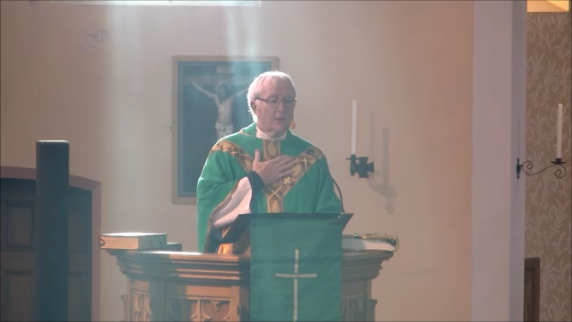
15.01.23 ~ SECOND SUNDAY IN ORDINARY TIME
I don’t know if I am the only person in Great Britain that has never watched an episode of Dr Who, but I do remember a cartoon in Punch many years ago, which showed two Daleks in a cellar staring at some stairs. Daleks, as everyone knows, move on wheels but have no legs, so, one says to the other, “Well, this mucks up our plans to conquer the Universe”.
For some reason that cartoon came to mind, when I read those lines from Isaiah today about restoring the tribes of Jacob and bringing back the survivors of Israel. He is clearly talking about the Messiah, and for most Israelites, to be able to accomplish such a feat, the Messiah would have to be an awesome, all-powerful leader who could impose his will by sheer strength of arm. For many Orthodox Jews, this belief persists even today, as it has throughout history, and not always just for the Jews. When Suleiman the Magnificent ruled the Muslim Ottoman Empire in the 16th century, although he was immensely powerful himself, he was wary of the possibility of such a powerful enemy turning up, so, knowing that the Messiah would enter Jerusalem by the Golden Gate, he had it blocked up. He also built a cemetery in front of it, so that by walking through the tombs of the dead, the Messiah would become ritually unclean, and therefore unable to make any progress, which would muck up any plan he had to conquer the universe.
However, as we know in hindsight, Isaiah’s prophecy is not a political message about the restoration of Jerusalem or conquest. It’s all about conversion of heart. God wants to start small with the remnant of survivors who come back to Jerusalem after their 60 years in exile, then build up to include everyone. And so, we have those lines, “It is not enough for you to restore the tribes of Jacob: I will make you the light of the nations”. Hundreds of years later, when Jesus is presented in the Temple, Simeon describes him as “The salvation which you have prepared for all the nations to see, a light to enlighten the pagans and the glory of your people Israel”. The two go hand in hand. The Incarnation is not just a local event for Israel, but is truly universal. As John the Baptist would say, “Look, there is the Lamb of God who will take away the sin of the world” - ie the whole world.
When Jesus starts his public ministry, he too chooses to start small, in a tiny province of the mighty Roman empire, in the quiet backwater of Galilee, amongst simple country folk, far from the thriving metropolis of Jerusalem. That’s why, in St Mark’s gospel, Jesus often forbids people he has cured miraculously, not to tell everyone about it. He doesn’t want to raise expectations among the people, that he is the embodiment of the image they all have, of a Messiah who will rule by might and strength. It’s only much later in his ministry, when he has successfully debunked that warlike image, that he begins to speak openly of his claim to be the Messiah they have all been waiting for.
By the time Jesus completes his public ministry at the crucifixion, he has very little to show in terms of success, if measured in numbers of followers. In that respect, you could say he died a failure. But, as with any vast enterprise, success rarely comes overnight, and, if it does, it often ends up as a five day wonder. More often, it is a long slow burn, with lots of hard work, patience and belief. I came across a lovely quote in a prayer book the other day which said, “The exceptional destinies of some individuals, may be compared to those rivers whose power is only revealed far downstream from their source”. In terms of Our Lord’s ministry, the source of his Church was a tiny group of humble fishermen by the sea of Galilee, but now, 2000 years downstream, it is truly universal, which is what the word Catholic means. However, we all know his work is not finished and, in fact, will go on for as long as there are people who need to hear the beautiful words of his life-giving gospel, which it is our privilege to share. So, as we slowly embark on our quest to adapt parish life to our ever-changing times, and wonder sometimes if our Covid survivors will ever come back from self-imposed exile, let’s keep doing the little things well, and not forget that from little acorns mighty oak trees grow.
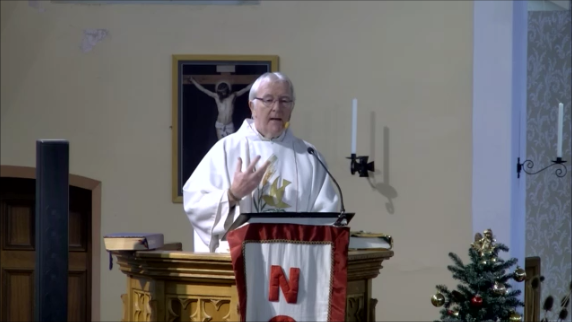
08.01.23 ~ THE BAPTISM OF THE LORD
(To hear audio file ~ click here)
Last week I was reading the latest magazine of the Beda College, where Stephen is studying for the priesthood. It has a big feature on the Sisters, who are leaving after 30 odd years on the Staff. Sister Catherine also worked in the Vatican, and one day she was going up in the lift with Cardinal Villot, the Secretary of State, who was dressed in a simple black cassock, when a visiting priest hurried in. “Buon giorno Padre” the Cardinal said. “Monsignore” came the sniffy reply. “Mi scusi. Buon giorno Monsignore”. When they reached the floor, the Cardinal stepped back to allow Catherine out, but the priest pushed past her. As the Cardinal stepped out, the Swiss Guards snapped to attention, and said “Buon giorno Eminenza”. The priest, startled, turned back to Catherine and asked “Who is that?” “That’s Cardinal Villot” she replied. The priest buried his head in his hands. “Oh no! That’s who I’ve come to see” he said. Can you imagine how that interview went!
John the Baptist’s meeting with Jesus at the River Jordan, couldn’t have been more different. John knows that he is in a completely different league from Jesus. He tells his followers that he is not worthy even to untie his sandal straps. John is aware that he is in the presence of greatness. So, when Jesus comes forward for baptism, with all humility he tries to dissuade him – “It is I who need baptism from you”. Jesus, of course, would have been well aware of Isaiah’s prophecy about him as “The chosen one in whom my soul delights”, but he still insists on receiving John’s baptism of repentance, in spite of having nothing to repent of, thus showing that, at the very beginning of his public ministry, the hallmark of his mission, like his cousin John’s, will be humility. As he emerges from the water, a Theophany of the Trinity takes place which commissions him to go in search of sinners, amongst whom he will freely choose to dwell, to live a life far removed from the homely atmosphere of Nazareth, a small town, where everybody knew everybody (bit like Fleetwood).
John’s baptism was a simple ritual, a sign of wanting your sins washed away and making a new start, a bit like a new year’s resolution which can only be kept by dogged determination and human effort. It doesn’t guarantee a complete conversion of life. “I baptise with water” he said, acknowledging that he was simply preparing the way for the one who would “baptise with the Spirit and with fire”. Christian baptism is not just for forgiving sins: it’s much richer than that. It actually makes us a child of God, over whom the same words Jesus heard could be said – “You are my child, the beloved, my favour rests on you”. It’s a baptism where we don’t rely on human effort alone to live a virtuous life, but have the very spirit of God himself within us, making us capable of things beyond our natural abilities. At the Jordan, John gets this, and declares that he must decrease while Jesus must increase.
What’s very significant about today’s feast, is that it takes place just before Jesus starts his public ministry. That’s why the Church’s teaching on mission and ministry is rooted in baptism, not ordination. Every baptised Christian is called to proclaim God’s word, and offer service to the world and the common good. One of the fundamental elements of being a follower of Jesus is, as John did, to make him known, to tell other people about him, mostly implicitly, by our actions and the way we live, but sometimes explicitly, in answer to private enquiries, or when the prophetic voice of one crying in the wilderness against injustice needs to be heard in the public arena. To quote Isaiah again: “I, the Lord, have called you to serve the cause of right”.
Closer to home, we all know people who once did believe or practice but whose flame of faith is now only a smouldering wick, or are so crushed with the burden of life that they have no time for God. Isaiah says the Messiah will not quench the wavering flame or break the crushed reed. Nor must we. Instead, we try to lighten peoples’ burdens and help to reignite their faith. Our baptismal mission is not so much to put more bums on seats, but to be the yeast in the dough for society in general, based on gospel principles, which we know, when put into practice, bring a better life for everyone.
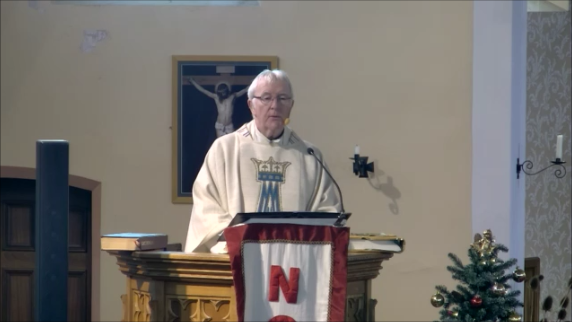
01.01.23 ~ MARY, MOTHER OF GOD
A PASTORAL LETTER FROM THE BISHOP OF LANCASTER
for the Solemnity of MARY, THE MOTHER OF GOD ~ 01.01.23
APPOINTED TO BE READ AT ALL PUBLIC MASSES IN ALL CHURCHES AND CHAPELS IN THE DIOCESE OF LANCASTER ON THE WEEKEND OF JANUARY 1st 2023
My dear people,
Holy Mother Church gives us the tradition of beginning each new calendar year with the celebration of Mary, Holy Mother of God. Holiness is a word that is often misunderstood. As we begin a new year let us see if we can help to put that right, both for ourselves and for those with whom we live.
Anyone fortunate enough to have had a devoted mother learns from their earliest years what a blessing they have been given. Lessons continue throughout our lives up to and even beyond the time when we lose them in death. The memory of them can bring us much consolation as we reflect on all they have done for us, all the sacrifices they made for us. These reflections can even bear fruit for us as we try to take up some of the qualities we admired in them. In present times we have so many experts in so many aspects of living. We can recognize that loving, dedicated parents are themselves experts given to us.
Much of the grief we felt and saw as a nation following the death of our late Queen, Elizabeth, was provoked by her being – in effect – the mother of our nation and Commonwealth as well as our Monarch. Dare I suggest that much of the respect in which she was held stemmed largely from what we saw of her as a mother in a family that is, like so many others, far from perfect.
Mary is given to us as a woman of Faith. This does not mean that her life was easy. Although she was spared from sin, she was not spared from struggle, hardship and even the burden of heart-breaking grief. As The Woman of Faith she is given to us to raise us as children of Faith, and to be specific, for us, this means Faith in Jesus, Son of God and son of Mary. One of the greatest treasures parents show, teach and share with their children is how to try and live a life of Faith. What stands out for us is that Faith is turned to when life becomes hard. It is there as a lifeline, something that holds us safe when we experience hardships.
Practicing our Faith must include certain aspects if it is to be authentic. Living a life of active charity, daily prayer, and weekly Sunday Mass(worship) remain essential characteristics of a living disciple. I do understand that it is possible to live a good, worthwhile life even without professing any faith at all. But if we are to be disciples of Jesus He asks us to show our faithfulness in these particular ways. And I call again on all Catholics who are physically able to find the motivation to remain faithful to Sunday Mass, in which we are able to reflect on all that Our Lord has done for us. Here we also receive the nourishment that will strengthen Faith for the work of the week ahead. It is an antidote to the infectiousness of the world’s woes.
Under the loving eye of Mary, let us begin this new year with a desire to value our Faith in our Messiah. Let us decide to carry the lights of our Christmas Faith far into it, even as the elaborate light displays we have seen along our streets are switched off and packed away so quickly. Value your Faith as a gift for your life that you can share with others. Value the relevance of holiness which can be understood as simply as knowing that there is something of God here.
None of us knows or can predict what the new year will bring. But each of us knows what we can bring to it, with a mother’s help, with Mary’s help.
With my blessing for you and your families at this time,

+Paul
Bishop of Lancaster
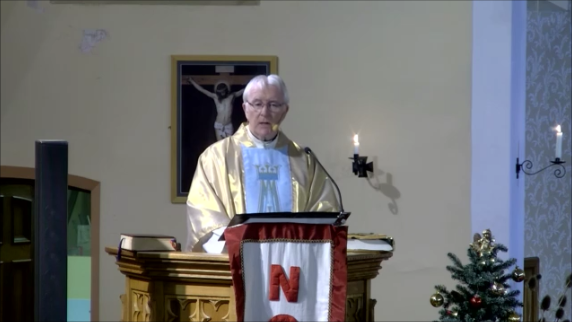
25.12.22 ~ CHRISTMAS MASS
On Tuesday, here in church, our KS2 children gave a wonderful, traditional interpretation of the Christmas story. At the end I was asked to say a few words. After thanking the children, I added how pleased I was that so many parents and families, had taken time out from all the other paraphernalia that crowd in on us at this time, to be part of the real reason we celebrate Christmas. As you’d expect, the performance went very well. The parents clapped after every carol and went home happy. It was all very cosy and comfortable. However, I pointed out that the birth of Jesus is only the beginning of the story; Jesus also grew up to live a life that was far from cosy and comfortable!
To give a flavour of what I mean, here is a story of a different kind of Nativity play, told by Fr Chris Fox, a Mill Hill Missionary, who died earlier this year, about a friend of his, Fr Gerard Fitzsimons, who worked in a black township in South Africa just a few years ago.
It was the last week of Advent. Fr Gerry was worn out after a hectic day and didn’t really want to go to the school nativity play, but was glad he did. This is what happened…
'After the wise men had come and gone, I noticed the arrival of three more strange characters: one was dressed in rags, hobbling along with the aid of a stick. The second was naked except for a tattered pair of shorts and was bound in chains. The third was the most weird. He had a whitened face, wore an unkempt grey wig and and an Afro shirt. As they approached, the chorus of men and women cried out, "close the door Joseph, they are thieves and vagabonds coming to steal all we have".
But Joseph said, "everyone has a right to this child, the poor, the rich, the unhappy, the untrustworthy. We cannot keep this child for ourselves. Let them come in." The men entered and stood staring at the child. Joseph picked up the presents the wise men had left.
To the first man he said, "you are poor; take this gold and buy what you need. I have a trade. We won't go hungry".
To the second he said "you're in chains and I don't know how to release you. Take this myrrh, it will heal the wounds on your wrists and ankles".
To the third he said "your mind is in anguish, I cannot heal you; maybe the aroma of this frankincense will soothe your troubled soul".
Then the first man spoke to Joseph, "do not give me this gift; anyone who finds me with this gold will think I've stolen it. Sadly in a few years, this child of yours will end up as a criminal too".
The second man said, "do not give me this ointment, keep it for the child. One day he'll be wearing chains like these".
The third man said, "I'm lost, I have no faith at all. In the country of my mind there is no God. Let the child keep the incense. He'll lose his faith in his father too.
While Mary and Joseph covered their faces, the three men addressed the child, "little one, you're not from the land of gold or frankincense, you belong to the country of want and disease, you belong to our world. Let us share our things with you".
So the first man took off his ragged shirt, "take these rags" he said, "one day you'll need them when they tear the garments off your back and you will walk naked".
The second man said, "when I remove these chains, I'll put them at your side because one day you will wear them and then you really will know the pain of humanity".
The third man said, "I give you my depression, my loss of faith in God and everything. I can carry it all no longer. Carry my grief and loss with your own".
The three men then walked back out into the night but the darkness was different. Something had happened in the stable. Their blind pain was diminishing. There had been a kind of epiphany. The unwelcome visitors now knew that God was somehow present in an innocent child who was already destined to be one of them in all that poverty, pain, depravity and sin. But they also began to believe that this was the hope for themselves and for the world.'
That lovely story brings out the reality of why Jesus came into our world in the first place. Remember that by taking on a human nature, exactly the same as ours, he had to grow as we do, through childhood and adolescence to adulthood, and be subject to the same kind of trials and tribulations we have to deal with. So, while the birth of Jesus is a wonderfully joyful thing to celebrate, we can’t stay rooted to the spot, gazing at the child and remaining as if in a time warp. We need to get to know him as a fully grown, mature adult, in his prime, and learn from him how to deal with all those things.
In the three years of his public ministry, Jesus gathered many followers, and charged them to change the world, by the service they give to their fellow man. And that is what the Church has been doing ever since, including here in our own lovely Parish of St Wulstan and Edmund, through the Food Bank, our Warm Hub, our care of the sick, housebound, those struggling with the cost of living, and through many more good works which our parishioners do on a daily basis.
For that great work to carry on, we need Christians with an adult faith, who take the gospels seriously, based on their relationship with the adult Christ, which, like any relationship, must continue to develop throughout our lives, and not be left at the baptismal font. Like the birth of Christ, baptism is just the beginning of the story. It’s what comes after, what we do with the great gift of Faith we receive in baptism, that gives meaning and purpose to our lives.
We’re all at different stages of our faith/life journey. Some may be moving along smoothly. Others may have stalled. May we all be given the grace this Christmas, according to our individual needs, to either reconnect with Jesus, in the most obvious way, through regular Mass and the Sacraments, renew our tired Faith by getting to know him better through the gospels, or respond to whatever good works he calls us to do, in his name, for the benefit of the common good.
God bless you all.

18.12.22 ~ FOURTH SUNDAY OF ADVENT
(To hear audio file ~ click here)
As you will be aware, there have been many protests on the streets of Iran against the Government, as a result of the death in custody, of a young woman accused by the Religious Police of not wearing her Hijab properly. Last week two 23 year old men were hanged in public for protesting, and there are 14 others awaiting sentence for the same offence. On Friday, an Iranian footballer, who took part in the World Cup in Qatar, has reportedly been sentenced to death for treason, after showing his support on the world stage, for human rights in Iran, especially for women. It’s hard for us, in a free country, to imagine that such barbaric, summary justice still exists in the modern world.
The reason I mention it, is to try to convey something of the similar primitive justice that existed in the time of Mary and Joseph. To be found guilty of adultery meant summary execution, no ifs or buts, although, it would appear, more so for women than men. So, imagine how Mary must have felt on her way back to Nazareth, after 3 months in Ein Karem, where she looked after her elderly cousin Elizabeth, when she realised that Joseph would notice she was pregnant and know that he was not the Father. At this point, all she has to go on, is her trust in Gabriel’s message.
As for Joseph, on discovering Mary was pregnant, and knowing full well the uncompromising and brutal penalty for adultery, what was he to do? It’s clear in wanting to spare her publicity, that he still loved her, and couldn’t bear to think of her being stoned to death. Maybe he couldn’t believe she had been unfaithful to him, and thought she had been seduced, or worse, violated or raped. As Matthew tells us, being a man of honour, his only option was to divorce her quietly, and this he’d made up his mind to do. Then, perhaps in the early hours of the morning, no doubt after a restless night, his fears are allayed, as had Mary’s been three months before, by the message of an angel. Because he had had no part in what had happened to Mary, Joseph could have felt like a rejected lover, a bit part player, or a child who is ignored by a parent when a new boyfriend or girlfriend moves in, but he didn’t. In some ways, the revelation that the child Mary was carrying was conceived through the Holy Spirit, must have filled him with great joy by knowing that his beloved Mary had not been unfaithful to him, and that, together, they were to parent God’s greatest gift to the world.
Of course, Joseph, like Mary, had a free will and could have chosen not to do what God had asked of him. If he had chosen not to marry Mary, it would have caused a huge problem for proving the authenticity of Jesus as Messiah, because everyone knew that the Saviour would be born of the House of David. Joseph was of David’s line and, although he wasn’t the natural father of Jesus, in marrying Mary he becomes, effectively, as far as the Mosaic Law is concerned, the adoptive father of Jesus, which guarantees that he is a descendent of David’s line. All well and good then. Everything’s in place. The incarnation can go ahead. It all seems so simple and matter of fact. But it wasn’t.
I think it’s really important to note, that, although these two humble people, with no earthly ambition except to marry, settle down, have a family and live the simple life of Nazareth, became God’s chosen instruments in bringing about the salvation of the world, they had to give their consent. They were not pawns in a game. That’s not the way God works. He invites but never forces. St Augustine says ‘Without God we cannot: without us God will not’. Think of your own life and the particular course it has taken, because you accepted his invitation. For those still searching for what God wants them to do, the secret is to open your heart, tell God you are willing to do what he wants you to do, then put all your trust in him, even if things get tough, as they did for Mary and Joseph under King Herod’s murderous scheme to kill their child, and as it is for those poor people in Iran today. In spite of all the horrible things going on in our world, there are still lots of simple, ordinary, people doing good works and showing extraordinary compassion, thereby gently fulfilling God’s will, just as Mary and Joseph did. In the lead up to Christmas, let’s try to make sure we are one of them.
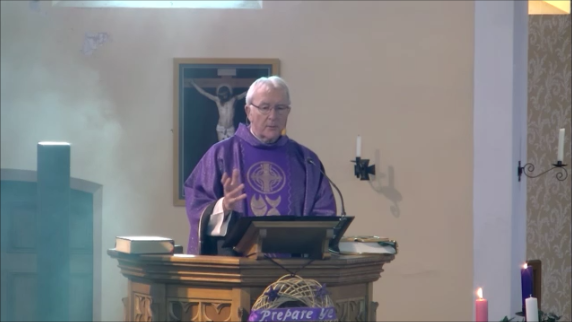
11.12.22 ~ THIRD SUNDAY OF ADVENT
A friend of mine once told me a story about his first parish priest, the Canon. He and the other two young priests thought the Canon was the most idle person they knew. He would breakfast late, do the Times crossword and ease himself into the day in time for lunch. They made a resolution that when he died they would bury him face downwards to give his backside a rest. When he did die, their opinion of him was mightily changed by the number of people who came up to them to say what a great priest he had been and what he’d done for them. It would appear that while they were out being cool, and down with the kids, he would be gently making his way round the less glamorous parts of the parish, visiting the lonely and housebound.
That story came to mind after reading Friday’s gospel in which Jesus, in sheer exasperation, says to the Pharises “You’re like kids in the playground complaining that they played the pipes for you and you wouldn’t dance: they sang a dirge and you wouldn’t mourn. Because when John came fasting and not drinking you said he was deranged. When the Son of man came eating and drinking, you said he was a glutton, a friend of tax collectors and sinners. But Wisdom is proved right by her actions”. In other words, it doesn’t matter what you look like, or what people think of you, providing that your actions prove that you are doing what God wants you to do.
In today’s gospel, it’s not the Pharisees who are complaining, but John the Baptist himself. Well, he’s not really complaining, but he’s clearly perplexed. He, like most of the prophets before him, expected the Messiah to be a judge, and a brutally efficient one at that, who would give sinners what was coming to them. Just last week we heard him proclaiming that the Messiah would sort them out, gathering in the wheat and throwing the chaff on the fire. But, from what he’s hearing, Jesus is not doing any of that. On the contrary he is offering himself as one who comes to heal and forgive. So, sitting in Herod’s dungeon, probably expecting to lose his life, he may have wondered “Was it all worth it? Have I made a terrible mistake? Hence, his message to Jesus, “Are you really the one who is to come or do we have to wait for someone else?” The answer he gets is "Work it out John! The deaf hear, the dumb speak, the blind have their sight restored.” He’s reminding John of Isaiah’s prophecy in the first reading, which he has, by this time, already fulfilled many times.
Clearly, this new way of doing things is not going to be easy in a world where might is right and the weak go to the wall. At first, John the Baptist wondered why Christ didn't impose his authority by force. Likewise, many people today would argue that force is the only answer to injustice: use war to solve disputes; deal more harshly with offenders; bring back the death penalty for senseless violence. However, as we saw, John the Baptist was invited to look beyond his own ideas and expectations to see that, through Jesus, God was doing a new thing, especially for poor and marginalized people, those without power, and he will give us the courage to do the same. “Strengthen all weary hands, steady all trembling knees and say to all faint hearts, ‘Courage, do not be afraid’”.
In our own country the only answer to anti-social behaviour seems to be to make a new law. Just this week, a new one was proposed to make harassment of women an offence. Well, to any right thinking person, it’s already an offence. We don’t need a law to tell us. Real and lasting change can’t be imposed: it can only come from within. If there is ever to be an end to violence and evil in the world, it won’t be by the use of force, law or politics, but by the courage of people prepared to turn the other cheek, listen, and accept that my way is not always the only way. If we put Jesus way of doing things into practice, those of us who are conscious of God’s mysterious presence among us in everyday life, will take comfort even in the bad times. By having the courage to live out our faith, in spite of what people may say or think about us, we might just give real hope to those faint hearts and trembling knees of our own time, who see only darkness, despair or a world without meaning or purpose.
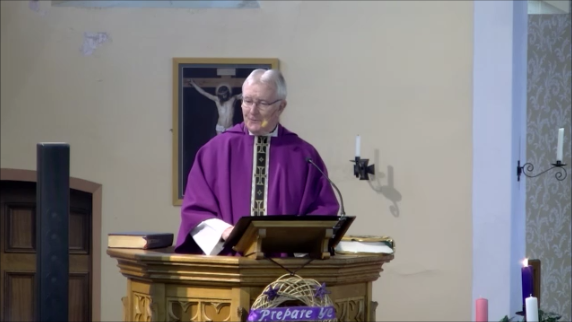
04.12.22 ~ SECOND SUNDAY OF ADVENT
(To hear audio file ~ click here)
While we were in Bethlehem we visited the ‘Walled Off’ hotel which is dedicated to showcasing the plight of those Palestinians hemmed into, what they describe as an open-air prison camp, by a huge wall, much taller than the so called ‘peace wall’ in Belfast and miles taller than the old Berlin wall. Along with a number of Banksy murals, the hotel contains numerous artworks, a model of the illegal settlements, satirical commentaries and tragic stories. The picture which caught my eye was of a huge sheep in the middle of a field, surrounded by a pack of wolves all laid down in submission to it; it was quite stunning in its portrayal of the complete reversal of the natural order of things.
In the first scripture reading Isaiah looks forward to the golden age when the law of the jungle will cease. He describes how it will be safe for children to play with cobras and for the ox to eat straw next to a lion doing the same. “There’ll be no hurt, no harm on all my holy mountain, for the country is filled with the knowledge of the Lord”. It’s a beautiful passage and contains all the characteristics of the long-awaited Messiah: he will be of David’s line, full of the gifts of the Spirit, and, as the psalm says, “In his days justice shall flourish and peace till the moon fails”. So, where did it all go wrong? The Messiah has come but the golden age is still a dream.
To answer that question, we have to look at the context in which Isaiah wrote 750 years before Christ. The chosen people were in exile, having been conquered by the Assyrians, and were at their lowest ebb, thinking that God had abandoned them. Isaiah uses poetic imagery to assure them that he hasn’t, and that his original plan, demonstrated by the perfect harmony of nature at the creation, is still in place in spite of their sinfulness. The Messiah will get it back on track, in partnership and cooperation with them, no matter how long that might take. As St Paul says, “Everything that was written in the scriptures, was meant to teach us something about hope, from the examples of how people who did not give up were helped by God”. God does not forget his promises.
It all sounds very esoteric, but in the gospel John the Baptist is far more down to earth and realistic, about how to get the job done. While agreeing with Isaiah, on the hope the Messiah will bring to the world, he sees very little chance of success, unless he can persuade people who hear the message to actually do something about it. So, he urges all who come to him to prepare well for Christ’s coming, by a baptism of repentance and a change of life. Then, in one of the toughest passages in the Bible he lays into complacency, especially from the Pharisees and Sadducees seeking baptism. Why were they there? Was it perhaps to check on him, or that they simply didn’t want to miss the biggest religious sensation of their time, the first appearance of a prophet for nearly 400 years. I wonder if they felt a touch of condescension towards him. “We don’t really need to do this. We have Abraham for our father”. What a shock they must have got from John’s blistering attack! He made it clear that unless their repentance was genuine, like a tree, they would be cut down and thrown on the fire.
John’s message is “As a man sows, so shall he reap” which means we ourselves are the architects of our own future, and will be judged not just on our faith, but on how we loved, and what we actually did to produce the fruit of good works. When we look at the state of the world, war in Ukraine, slavery in China, lots of places where one set of people makes life an absolute misery for another, there seems to be darkness everywhere, and it’s not always easy to see the light. But the light is there. Every month I get mission magazines, and they’re always full of articles about the good works being done for the poorest of the poor in Christ’s name, by ordinary Christians who have answered his call to produce fruit by the spread the gospel. Nearer to home, in spite of the dark cloud of commercialism hanging over the true meaning of Christmas, we have the light of a warm hub, the foodbank, and Christmas dinner planned for anyone in need. So never despair. As with the people Isaiah wrote that beautiful poem for, the present reality we live in is pregnant with future hope.
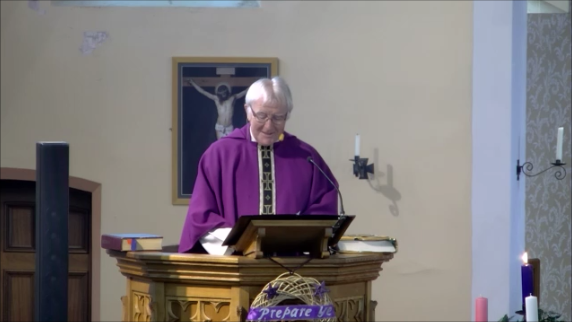
27.11.22 ~ FIRST SUNDAY OF ADVENT
A PASTORAL LETTER FROM THE BISHOP OF LANCASTER For the First Sunday of Advent 2022
APPOINTED TO BE READ AT ALL PUBLIC MASSES IN ALL CHURCHES AND CHAPELS IN THE DIOCESE OF LANCASTER ON THE WEEKEND OF November 26/27 2022
My dear people, Today we begin the holy season of Advent, the time of preparing ourselves to welcome the Lord. We recall the message of the ancient Prophets, awakening the People of Israel to welcome the Saviour, and we remember our Blessed Lord’s own words calling His disciples to be ready, to stay awake, that the Lord’s Second Coming might find us alert, ready to welcome Him with joy. When that will be is hidden from us, known only to God. Between His first and His final coming, we are exhorted to be ready, even daily for His coming to us in the Mass, in prayer and in so many other ways, some subtle and some that may shock us.
It is a season when our Lord ‘rattles our cages’, intent on lifting us from our complacency or lukewarmness. We so easily become distracted or lose our enthusiasm. In the busy-ness of this life we allow ourselves to become absorbed with only the things of this passing life. He would have us return to contemplating and keeping in mind the things that are eternal, to the true Life that Jesus brought to us. He reminds us that whilst the way to heaven is opened for us, we must apply ourselves to the journey through prayer, penance and above all through acts of Charity. Drifting through life is not following the Good Shepherd, just as He did not drift: He was intent on reaching the destination.
As people of Faith, we are called by Jesus to rediscover the beauty of living as His people. May His unbroken promise to remain faithful re-awaken us, restore our Faith and put new heart into each of us, whoever we are and whatever our circumstances and whatever seems to imprison us. He ‘rattles our cage’ because He comes to liberate us from it.
We turn to Mary, who carried the hidden Saviour for nine months in the safety of her womb, the first to know her Lord’s closeness. May she be generous in sharing her own Faith with you in these dark times. She brings us a gentle and sure light. May our prayers this Advent be especially with all those who carry new life within them, keeping in mind that so many unborn babies are at risk. May we be careful and caring with one another in these times that test us in so many ways. May He find us ready when He comes, awake and active in Charity.
With my blessing for you and your families.

Rt Rev Paul Swarbrick
Bishop of Lancaster
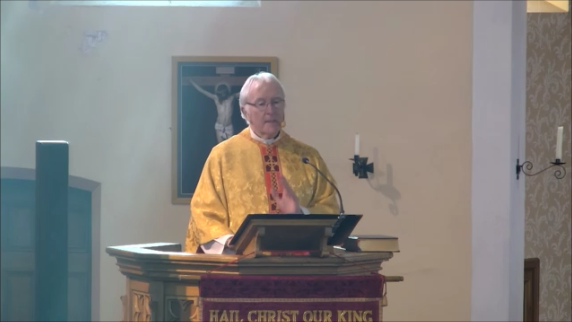
20.11.22 ~ FEAST OF CHRIST THE KING
(To hear audio file ~ click here)
Last Saturday, the Festival of Remembrance was King Charles’ first really big public outing as King. Until then he had always had to walk a pace behind his mother. Now, suddenly, he is the focus of attention: everyone must stand until he is seated in the Royal box, best seat in the house, and nobody was allowed to leave before he did. That’s how it will be now for the rest of his life. Every possible deferential homage will be accorded him wherever he goes, with one or two notable exceptions from egg-throwing anti-monarchists, because, from time immemorial, that’s how people expect a monarch to be treated. Thankfully, however, we’ve come a long way from the days when kings had absolute power of life and death over their subjects and ruled by terror with impunity, and so, for the last seventy years, we have been truly blessed with a monarch who spent her whole life in our service.
Today is the feast of Christ the Universal King. It was instituted in 1925 by Pope Pius XI because, at the time, the whole world was in political turmoil. In all the big cities of Europe the old order was changing and its Crowned Heads were falling. On the one hand, the Russian revolution was in full swing and international socialism was on the rise. On the other, Western capitalism, in its ruthless pursuit of wealth, was leaving a trail of poverty in its wake. Society was beginning to have tunnel vision in the pursuit of Godless ideologies, and something was needed to remind the world of the primacy of the common good. And what better reminder could there be than the example of what true kingship, leadership, and government should be. Christ’s model of kingship was to rule by service and example, not by force or domination, as he made clear to Pontius Pilate at his trial.
Nearly 100 years on, Pope Pius’ message is still needed, especially in those countries where someone often by a violent coup, has put himself forward as a quasi-Messiah, saviour of the nation,and rules by fear. Anyone can do the job of ruler if it means lording it over the weak and oppressed and living the life of luxury. Look at Putin, Lukashenko, Kim Jong-un or any other modern dictator. But it takes a very special person to earn the right to be called ruler. Through his love and concern for his people, Jesus gave of himself totally, not wishing to conquer but to serve. He devoted himself to seeking out the sick, the poor, the lost and the lonely. Even in dying, he forgave those who killed him, and gave the gift of eternal life to a thief. The other thief thought it would have been more majestic for Christ to save himself and them. But this king chose to hang beside us and suffer with us in our misfortune, which, apart from his outstanding love for us, also speaks volumes about his courage.
In Christ our King there is something for all of us, especially in imitating his courage. Real courage is a single parent trying to bring her children up alone, a man resisting pressure from his boss at work to falsify returns. Courage is a young person made fun of for not taking drugs or indulging in under-age sex, a prisoner trying to go straight when no-one will offer him a job. Courage is a person risking his own health to care for sick and diseased in poor countries, speaking up for the rites of the unborn or defenceless members of society. Courage is a proud person acknowledging his weakness and saying sorry to those he’s hurt. Courage is taking Christ at his word, not worrying what to say, or being embarrassed to say it, when the moment comes to proclaim our faith. This courage is given to us when we are anointed priest, prophet and king at our baptism, and which the Holy Spirit will help us to use whenever there is the need to.
In his public life, Jesus constantly avoided all show of power in his own name, choosing always to act in obedience to the Father, summed up by his final choice to suffer, with the words “Not my will but thy will be done”. Christ is King, not of empires, wealth or state, but of hearts and minds. There, through the Holy Spirit, he lives and reigns, inspiring us to greatness through service of others. There we learn that “it is in dying to selfishness, that we are born to eternal life”
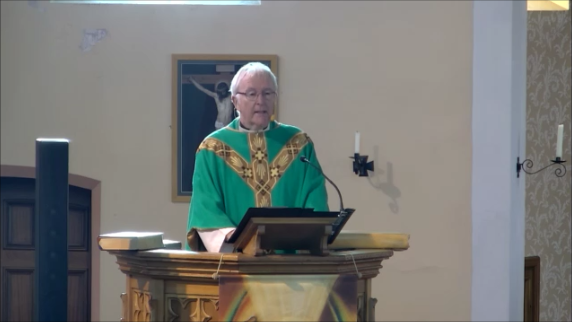
30.10.22 ~ 31st SUNDAY IN ORDINARY TIME
(To hear audio file ~ click here)
It’s amazing how a few words can have a profound effect on your life. Take Zacchaeus for example, up the sycamore tree. How embarrassing to have everyone’s attention drawn to you, probably feeling a bit stupid, looking like a cat waiting to be rescued. Then you hear those few words which are going to change your life forever: “Today, salvation has come to this house”.
Zaccheus wanted to see Jesus but couldn’t because he was too small and the crowd wouldn’t let him through. That was understandable, because he was a traitor to his own people and had become rich at their expense. So, when Jesus spoke those life-changing words, they were genuinely shocked. They saw only a sinner. Jesus saw someone who had decided to risk demeaning himself, by climbing a tree, to see him, like an excited schoolboy cheering United players on one of their many victorious parades. That was enough for Jesus to take the initiative and invite himself to stay at his house. “
When you look at Zacchaeus, Peter who denied Christ, Doubting Thomas, Nathaniel who cynically asked ‘Can anything good come from Nazareth?’ we see that Jesus often chooses less than perfect people, so we are in good company. However, not many of us experience a Zacchaean conversion. Recently, a man who has listened to some of the amazing conversion stories you get in the Alpha series, asked me “Do I have to do something really evil, like John Pridmore, before I experience and actually feel the mercy of God?” My answer was No. Conversion can be a steady progress over many years, as it was with St Paul, who prayed over and over for God to take away the thorn in his flesh. Many of us, me included, will have prayed for God to take away a weakness, only to find that he says “I will if you will”. In other words, grace builds on nature ie is given to those who make an effort to change. Then, little by little, he will bring the good work we have started to a successful conclusion.
One of the first spiritual talks I heard on entering seminary contained a few words which have had a profound effect on my life ever since. They are “Sub Specie Aeternitatis”, which mean that if you look at everything in the light of eternity, problems of life are never insurmountable. You’ll always be able to see things in perspective, and not worry too much, especially about our inability to overcome sin, because, as the Book of Wisdom tells us, God does not wish sinners to perish but to be converted. “Yes, you love all that exists, for had you hated anything, you would not have made it’. I don’t know if you ever watch ‘The Repair Shop’. What joy it gives people to see something, once precious but now in a dreadful state of ruin, restored to its former glory. That’s what God is trying to do with sinful humanity, and if we let him, he’ll make us good as new. But he’s not necessarily going to do it overnight. As Wisdom says “Little by little, therefore, you correct those who offend’.
In our spiritual lives, this is seeing the big picture and it also applies to the wider world. Two good examples have emerged this week. Ed Balls, ex Shadow Chancellor, discussing the economy, told a story about having two litres of bottled water on his desk every day. It was only when he left Office, that his secretary told him that, for the whole of his eight years, she had refilled the bottles from the tap, thus saving the country a fortune and the environment from thousands of plastic bottles. Sub specie aeternitatis, she clearly understood the big picture, and if Rishi Sunak were to look at the world in the same way, he might realise that he really should go to the next COP meeting in Egypt. As members of the human race, and stewards of creation, we are interdependent with every other nation in the urgency to tackle Climate Change. So, what’s the point of prioritising fixing the economy in just one country, if it means that for many others they will soon have no economy to fix?
If today’s scriptures tell us anything, it is that it’s never too late to change personally and collectively in order to obtain salvation for ourselves and for the planet. Also that there is no sin or crime which God will not forgive if, like Zacchaeus, we come down from our tree and put ourselves in his hands.
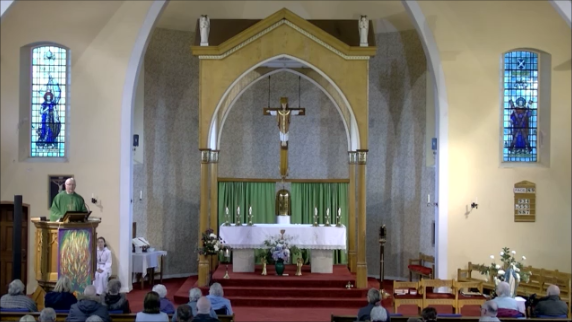
23.10.22 ~ 30th SUNDAY IN ORDINARY TIME
(To hear audio file ~ click here)
When I was Chaplain at Sandhurst, one of the instructors was an American Exchange Officer. The Cadets loved him because he made training fun. One of his expressions was, “When I die, I’m gonna come back as myself, ‘cos I’m the best Son of a b.... there’s ever been”. All in fun, of course, but as you can see, he was not backward in coming forward.
Another character prone to blow his own trumpet somewhat is the Pharisee in Jesus’ parable today. What’s interesting is that in this parable, unlike some of the others, the Pharisee is not a hypocrite, saying one thing but doing another. What he says, he obviously does, but the clue to why Jesus picks him up, is in the words, ‘The Pharisee stood there and said this prayer to himself’. It’s only a short prayer but it’s to himself about himself, what a fine fellow he is, someone God should take note of as being a bit special, because he’s not like the rest of mankind, whom he judges to be grasping, unjust and adulterous. He goes home pretty chuffed with himself, a self-made man who adores his creator. In the second reading, you could say that St Paul also seems to be bragging quite a lot, about what he has achieved, but the difference between him and the Pharisee, is that Paul makes it quite clear who is responsible for his ability to stand firm – “The Lord stood by me and gave me the power”.
Unlike the Pharisee, the tax collector makes no claim to be worthy of God’s respect: quite the opposite, “Lord, be merciful to me, a sinner”. I think it’s one of Our Lord’s best stories because, by saying the sinner went home at peace with God, he shows there’s hope for everyone. Most of us, like the tax collector, will admit that we’ve still a long way to go “to be perfect as our Heavenly Father is perfect”. But, as the first reading says, “God is a Judge who is no respecter of personages to the detriment of a poor man”, even one who thinks he’s not worthy to be listened to. We all get a hearing in his court, no matter who we are, what we’ve done or what other people think about us.
The difference between the two men is that one comes in, his hands loaded with virtues, so, doesn’t feel he has to ask God for anything. The other prays with empty hands, hoping for God’s grace. It’s no accident, I think, that during Mass, the priest prays the same way at the altar, something I think we should all do when we pray the Our Father. What does a child do when it wants his mum or dad to pick him up? He raises his empty hands to be lifted, to be held close, to feel the warmth and love of two strong arms. Isn’t that what we’re doing, and hoping for, when we pray the Our Father?
Like the tax collector, alone and despised by his own people, there are many lonely people in our world, people who maybe don’t feel worthy to come to church. Today is Mission Sunday, and perhaps part of our mission, is to reach out to people who aren’t self-sufficient, or as confident in their own abilities as the Pharisee, many of whom have a low opinion of themselves, to show them that they are welcome and have as much right to be here as any of us. Ecclesiasticus talks about the poor man, the widow and orphan, common biblical examples symbolic of the poor in heart, who are not necessarily poor in money, but deprived of wholeness, completeness. As the Psalm shows, their prayers are very special to God “This poor man called, the Lord heard him” Who else have they?
And what about us? Unlike the Pharisee, in our prayer, we don’t need to boast to God about how well we keep the commandments and give to charity. We don’t need to remind him that we come to Mass each week, send our children to Catholic schools, and generally keep the rules. He knows that already. But, in the spirit of the tax collector, we do need to acknowledge that we still have a long way to go. We are unfinished work. Only people in heaven are God’s completed work. In that humble prayer, “God be merciful to me a sinner” lies the key to our salvation. It also determines the way we look on others, and how we judge them, remembering always, that ‘There but for the grace of God, go I’. Humble people don’t think less of themselves: they just think of themselves less.
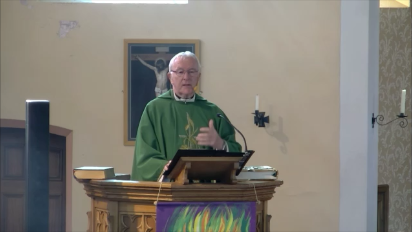
02.10.22 ~ 27th SUNDAY IN ORDINARY TIME
(To hear audio file ~ click here)
Well, no prizes for guessing what has dominated the news this week! It’s the turmoil engulfing the Tory Party over their current economic policy, some commentators predicting that Liz Truss could be gone within the month. Who knows? Politics is such a precarious business. I remember, some years ago, an MP from Hartlepool, who had been absolutely hammered in the General Election, scratching his head, unable to believe what had just happened. The problem, he said, was not that they had nothing to offer, but that people weren’t coming in to look. He likened it to having an attractive shop, which people knew about, but wouldn’t visit, because it was at the end of a dark street. It was no good re-arranging things in the shop, he said, if people were scared to walk up the dark street. What was needed was to shed some light on the street.
In some ways his analogy could be applied to the Church. You and I know that we have lots to offer. We have a very attractive shop which people know about, but very few visit, although we did have over 500 hits for our live-screened Mass last Sunday. As regards the church in general, I think it’s fair to say that a dark street of indifference, broad and long, has obscured the light, that Christianity used to spread across our land, from our beautiful churches, situated at the heart of the community. So, what do we do? Well, as the saying goes “It’s better to light a candle than curse the darkness”. It is no good putting all our energies into rearranging the liturgy or upping the entertainment value. We have to be out there, showing the difference faith, and belonging to a loving parish family, can make, in a world where so many people are left to their own devices (literally).
Now, you may well feel that trying to re-influence the individualism of secular Society with Gospel values, has become too big a mountain to climb, or that we don’t have what it takes. The Apostles felt the same. Listening to Our Lord’s plans for his Church, they realised that, by themselves, they didn’t have what it takes, so had to ask him, “Lord, increase our faith”. He doesn’t reply directly to their request. Instead, he describes what the power of faith can do. It’s like a lever you can use to move a huge boulder which you could never lift manually. We often see pictures of people trapped in collapsed buildings being rescued by men levering heavy slabs away. Faith is the levering tool for lifting people and giving them hope, but it must be put into action.
At this week’s class Mass the children gave me many examples of what they thought faith was, and I was delighted to see that they were all about doing good ie putting faith into action. Faith is free gift, but it’s not a one-off which you receive in Baptism then forget about. St Paul says we have to fan it into a flame. Don’t be timid or ashamed of witnessing to the Lord, like the church which put up a big poster quoting Jesus ‘The meek shall inherit the earth’ but added ‘If it’s alright with the rest of you!’
We are being asked to attempt to do something great for God, and great for Society. By thinking and acting counter-culturally, trusting God to be with us all the way, we can offer a Christian view on what we think should be done about Society’s ills. For example, we can speak out against the culture of blame, in which everyone is a victim, and persuade people to take responsibility for their own actions. We can resist being consumers of things we don’t need, when half the world is starving.
There are millions of ways in which our mustard grain of faith can grow into a huge tree of goodness. Nothing we do is going to change the world overnight, but the good things we do on a daily basis, may gradually give life, hope and a fresh impetus to people who feel they are simply drifting along, blown by the wind, directionless, with no real purpose in life. If they see in us the way our faith underpins all we do, especially the calmness with which we deal with both triumph and disaster, they may be inspired to come and take a look inside, at what the Church is, and what it has to offer. They may find that not only does faith move mountains: it also transforms lives.
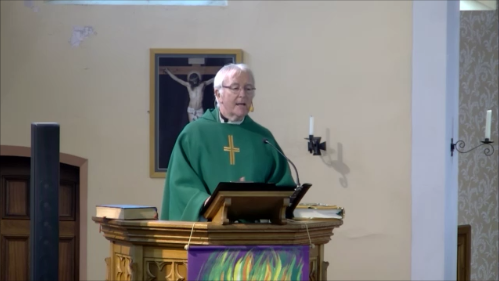
25.09.22 ~ 26th SUNDAY IN ORDINARY TIME
(To hear audio file ~ click here)
When preaching on this gospel, to get a dramatic effect, a priest standing in the pulpit said to his people “Stand up all of you who are going to Hell” and, to his amazement, a man stood up. The priest said, “What are you doing Pat?” “Well, I didn’t like to see you standing up by yourself, Father”. Some of you may well remember parish missions, when outside preachers from the Redemptorist or Passionists, would always include fiery sermons on the four last things, Death, Judgement, Hell or Heaven, with the accent firmly on Hell, and how easy it was to book your passage there. The success of the mission would be measured by how long the queues were for confession after the sermon.
Hell features quite strongly in today’s gospel too, but what we learn from it, is that the only certain way to get there, apart from turning our back on God, is not to take care of each other, something which comes out just as strong, in the first reading from prophet Amos, the little guy who stood up to the rich and powerful of his day, and delivered God’s message with no sugar-coating. In today’s extract he accuses them of lying on ivory beds, sprawling on their divans, living in the lap of luxury, while the poor go uncared for. The line I like best is “They bawl to the sound of the harp”. It remined me of the American socialite Florence Foster Jenkins, who hired Carnegie Hall in New York for an opera concert in which she was the star. The only problem was that she couldn’t sing and bawled, not just to the sound of a harp, but to the sound of a full orchestra. How did she get away with it? She was filthy rich - so none of her friends would risk losing her friendship by not attending. From their sycophantic applause, she honestly thought she was great.
In the parable, the rich man Dives doesn’t do Lazarus any physical harm or kick him off his property. His sin was that he didn’t do him any good either, ie he committed the sin of omission. Opportunities for helping and caring, simply went past unnoticed until it was too late. Then he was so shocked when he realised what he’d failed to do, that he wanted to warn his brothers that lack of awareness, and indifference to people in need, comes with an agonising penalty. But Abraham pointed out that they already know that – it’s in the Law and the Prophets: they only have to open their eyes to see.
This parable comes just after Jesus has taught that you can’t be the slave of both God and money, and is jeered at by the Pharisees, who, as last week’s gospel said, love money. No surprises then that in the parable, Dives is actually them, the Pharisees, whom Jesus accuses of claiming to be the ultimate authority on the Law and the Prophets, to whom the people must look for guidance, justice and support, but who, in reality, don’t care for them. In fact they lay heavy burdens on them, which they themselves do not lift a finger to help - not the way religious leaders are meant to behave.
As we see, being filthy rich or lording it over people, doesn’t get very good press in today’s scriptures. That’s not to say that rich people can’t be saved: of course they can, same as everybody else, providing they cultivate the virtue of generosity. Time and again, Our Lord reminds us of our obligation to the poor, and we can’t say that we don’t know of their existence. They may not be sitting at our back gate, but turn the tele on and you’ll see that, in many parts of the world, they really are sitting in the dust, wishing they had the scraps we throw into the bin: they really are covered in sores, open to every kind of infection: they really are short of clean drinking water. Their only hope of a dignified human existence is what our love and concern will do for them.
Closer to home, we know winter is going to exact a toll on the poorest in our own society. That’s why I’m delighted some of you have volunteered, to help people keep warm in the Green Hut, when the cold weather comes. It doesn’t sound much, but looking out for Lazarus, during these difficult times of rising energy prices, could make all the difference, to anyone in need of a little love, warmth and comfort, something we’re in a privileged position to be able to give. So, thank you.
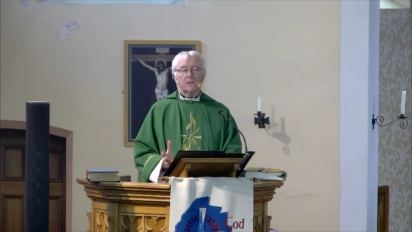
18.09.22 ~ 25th SUNDAY IN ORDINARY TIME
(To hear audio file ~ click here)
When I read that line from the prophet Amos today “By lowering the bushel and raising the shekel” that well-known expression ‘There’s nothing new under the sun’ came to mind. Why? Because I’m sure that’s what’s happening in our own time with chocolate bars, which are a lot smaller than they used to be and more expensive! In the verse before that one, we see rich merchants asking “When will the sabbath be over so that we can sell our corn and market our wheat? Then we can buy up the poor”. They can’t wait to make more money, and even want a price for the sweepings off the floor. Amos is the prophet of social justice. He makes it clear that anyone who exploits the poor cannot serve God, something Jesus echoes later: “You cannot be the slave both of God and money”.
It’s amazing what people will do for money. Think of the amount of energy expended in the pursuit of crime, the meticulous planning and ingenuity for an armed robbery, even though people may get injured or killed, the wholesale slaughter that goes on in drug wars, even at the risk of death to an innocent bystander, like the little girl in Liverpool, shot dead in her own house. Crime has always been with us, and I guess it always will be, so long as men prefer to take rather than give. The love of money, St Paul tells us, is the root of all evil. There’s an example of it in today’s gospel, in which a dishonest steward feathers his own nest at the expense of his employer.
At first, Our Lord seems to be praising the unjust steward for his dishonest behaviour. But what he’s actually doing, is comparing the shrewd, thorough, calculated way the steward pursues his crime, in order to secure his future, with the often casual, unplanned and thoughtless way people prepare for their future eternal life. He’s pointing out that a guarantee of being welcomed into God’s house, requires the same sort of planning and determination to live a good life, as it does to pursue evil.
By the way, for many years I often wondered why the steward thought it was a good idea to reduce the debts in order to win friends and be welcomed into their homes. Surely the debtors would know he’d fiddled the books, so wouldn’t dream of employing him themselves. But then I realised that, if they were poor people, who could never afford to pay the whole debt, he would be a sort of Robin Hood figure, a local hero maybe, – the people’s champion, someone worthy of their friendship: but a criminal none the less! Be that as it may, he saw a way out, albeit dishonestly, motivated by self-preservation, which often makes people do things they never dreamed themselves capable of, like Capos in the concentration camps, who were able to buy more time for themselves on this earth, by beating up their own people. How astute the children of this world are than are the children of light.
By praising such astuteness, Jesus is saying that when salvation is offered, grab it with both hands, using all the gifts, talents and skill you have to acquire it. Salvation can’t be bought with money, that tainted thing, as he puts it, but only with genuine riches. Money is just something people acquire and lose. It doesn’t make anyone greater in the eyes of God. It must be exchanged for something much more valuable, the goodness which comes from acts of love and charity. Money is sometimes called a tyrant before whom everyone kneels, but Jesus shows us how to make a good servant out of a bad master – by using it generously in the service of those in need, as a means, not an end in itself.
Pursuit of wealth is often seen as the measure of achievement and success, which in some ways it is, if you think life is all about being a success, but, as Mother Teresa used to say, ‘We are not called to be successful; we’re called to be faithful’. Our true worth as human beings is not judged by how much we amass in life, but how well we share it. To keep this in mind, it helps to remember that we are only passing through this world. We are stewards, not owners, of what we possess, and like the steward in today’s gospel we will one day have to give an account of our stewardship.
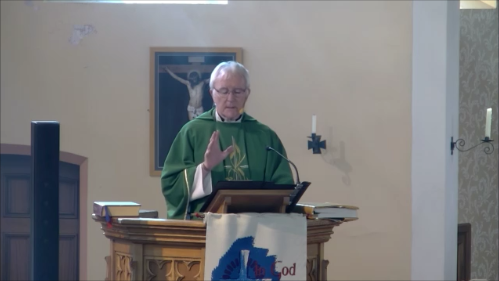
11.09.22 ~ 24th SUNDAY IN ORDINARY TIME
(To hear audio file ~ click here)
My niece sent me a joke the other day: “Father, I know you are angry that I have renounced the Faith, but could you tell me the correct time, please”. The priest, stunned, looks at him and replies, “Apostate”, and is amazed when the guy says “Thank you Father”. He thought he’d said half past eight.
Apostasy, or rejecting the love of someone who has given their all for you, is very much in the air in today’s scripture readings. The classic example is from the earliest days of the Exodus, when God is trying to mould the Israelites into a people, and is in the process of making a covenant with them, through Moses, on Mt Sinai. Unbelievably, you might think, only five minutes after being liberated from a lifetime of slavery, here they are dancing around, worshipping a golden calf, made by their own hands. As the psalmist puts it later, “They exchanged the glory of God for a bull that eats grass”.
Naturally, God is not pleased and says to Moses “Your people whom you brought out of Egypt have apostasised” and threatens to destroy them. But Moses turns the tables on God by saying ”Why should your wrath blaze out against this people of yours whom you brought out of the land of Egypt”. It’s a very clever stand-off on Moses’ part, because he knows only God, not him, could have done the Exodus, and that he did it because these are his people. He reckons if they are his people, there’s no way he will destroy them, despite their unfaithfulness and sin. And he’s right. God relents.
It's a pattern that repeats itself throughout salvation history. The Chosen people often throw in their lot with the pagan culture of the country they live in, and forget the God who made them, yet God doesn’t destroy them. Some people have taken that pattern to mean that it doesn’t really matter, then, if you sin, because God will forgive you anyway. But that’s not what scripture teaches us. It’s clear from the many parables about the last judgement, that God takes sin very seriously: so should we, but not in the way the Pharisees do. They think all sinners are automatically destined for hell.
But, by welcoming tax collectors and sinners, all seeking his company to hear what he had to say, Jesus shows that God’s justice, as it was at Sinai, is tempered with mercy, because these too are his people. He doesn’t first insist that they show they are sorry and promise to amend their ways, in order to make God love them again. He shows them, especially in the story of the Prodigal son, that God has never stopped loving them, and that, no matter what they’ve done, so long as there’s breath in their body, the opportunity to accept God’s mercy and forgiveness will always be there. If they take it, there will be great rejoicing, as there always is when what was lost is found.
It's a message for every generation, including ours. When the Israelites danced around the golden calf, it was because Moses had been gone a long time and God seemed to be remote. They still believed in him but made an idol, something nearer which they could see. Idol worship still takes place today, even among people who say they believe in God, the most popular being the cult of personality. People make idols of singers, athletes, even politicians, and feel happy if their idol has everything they themselves cannot have, buying the things they advertise, proud to do so, not realising they are being exploited A priest I know used to marvel at how Catholics would turn out in great numbers for the funeral of Fred who captained the darts team, but not for Jesus who gave his life for them. Many have exchanged worship of the one true God on Sundays for sport, car boot sales or shopping. But for all that, God still loves them and is ready with mercy and forgiveness.
When we were baptised, as Flossie will be after Mass today, the priest wrapped us in a white garment, as a sign of God wrapping his arms around us in pure love for the new creation we had become. No matter how far we wander away from him, or how stained by sin our baptismal robe becomes, his love for us will never stop. Christ, Good Shepherd is out there looking for us, and, if we let him, will bring us safely home to where our Father watches the road continuously for our return.
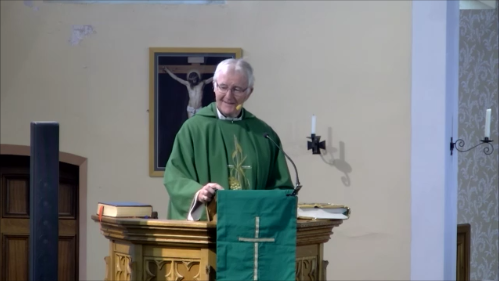
04.09.22 ~ 23rd SUNDAY IN ORDINARY TIME
(To hear audio file ~ click here)
With credit to Martin Bennett
I have a confession to make this morning, I'm actually cheating on my homily today, is that all right? You may not know but it actually takes me quite a long time to write my Sunday homily. It probably doesn't sound like it as it only takes about five minutes to deliver, but I usually start on a Friday but I was a bit preoccupied this friday, and on Saturday, to be absolutely honest with you, I was just too tired to give it my full attention as it took me most of the afternoon to open all those cards!
But, to my rescue came an email from Martin Bennett who's a very good local scripture scholar. He sends some thoughts around every so often and these came right on time really for today's readings. So after I read them, I thought I can't really do any better than this, so I'll share them with you today.
The Bible should always be taken seriously, but it shouldn’t always be taken literally. A very good example is when Jesus says, that any one who is a disciple of his must hate each member of their family (Luke 14:25-33). Taking this literally would lead to family (and society) breakdown, and would mean we think Jesus is telling us to break the ‘Honour your father and mother’ Commandment. We wouldn’t be taking Jesus seriously if we try to ‘fudge’ the word ‘hate’, but must recognise that he is using exaggeration to emphasise a point. I don’t think anyone would object if the captain of a lifeboat crew said to an enthusiastic but starry-eyed would-be volunteer, ‘You do realise that when the call comes, you have to come straight away, even if you’re in the middle of family birthday or Christmas dinner, or if you had said to your wife or children you will definitely take them out this evening. Saving lives has to come first, otherwise, you can’t join’. Total commitment is what Jesus is insisting on from any disciple.
It's important not to separate, ‘Anyone who does not carry their cross cannot be a disciple’ from ‘...and come after me’. Because Jesus
followed God’s will, he knew it would lead to the cross. Discipleship would cost some followers their lives, but it would be because they too follow God’s will – the death itself wasn’t the key point; ‘Picking up your cross’ is an attitude of obedience rather than a destination. At this stage, the disciples would have little or no idea that Jesus would end up on the cross because they could not possibly understand how this would be how God would establish his Kingdom. ‘Picking up your cross’ is a commitment to following the path God leads us along, even if it doesn’t always make sense – just as Jesus would follow in Gethsemane. The commitment disciples must make is one of trust.
To some people, this might seem like ‘blind faith’ (or even naïve, or stupid to people have the ‘I want guarantees or proof before I sign
anything’ approach to life.) The Book of Wisdom, (9:13-18) shows trust in God to be the opposite – it is a very realistic and wise approach to life. This passage, ascribed to Solomon (who was far from being stupid or naïve), is realistic about our limited reasoning and abilities: our reasoning is ‘unsure’, our intentions ‘unstable’. He recognises how our very physical bodies with all their passions, drives and imperfections often ‘weigh down’ our dreams and plans – they ‘press down’ on the soul, on our higher nature. This sounds like he has a low opinion of human nature and intelligence, or that he’s saying that our bodies are sinful and our soul is pure (he didn’t think the two were separate), but he is simply recognising our limits. This was particularly important at the time in Alexandria where the book was written.
There were many scientific advances and sophisticated philosophies and teachings claiming to explain the universe and the way to fulfilment and happiness and, understandably, many of the Jewish population in that city were feeling their belief in God and the Torah was rather simple and ‘old hat’. The author of wisdom was showing that in fact, it was this belief that was the way to true wisdom and true happiness.
The answer to his question, ‘Who can know the mind of God? Who can divine the will of the Lord?’ would seem to be ‘nobody. We’re too limited’. He isn’t against humans searching for meaning and trying to work out mysteries are useless – I’m sure he would be delighted with the scientific advances and with space exploration today, but he would say exactly the same: we, on our own, can never know everything. The answer to his question is ‘anyone who is open to the holy Spirit and who has been granted God’s Wisdom.’
To be open to God’s Wisdom, to be filled with the Spirit, then is to go deeper than human knowledge and wisdom (very impressive though that is); it is to be taken into God’s Wisdom. Naturally, since he knows everything and we can only glimpse parts, we can’t expect everything to make sense, which brings us back to the cross. It isn’t a great surprise that many people will reject this path. This doesn’t necessarily mean they are ‘bad’, but it does mean they aren’t open to the greater possibilities for humanity that Jesus invites his disciples to seek, and to be partners with him in bringing to the world. It is this rejection that led Jesus to the cross: his refusal to compromise on doing God’s will was his refusal to ‘water down’ God’s plans.
As there will inevitably conflict between God’s vision and our human
reluctance to trust, to look further, disciples have to be prepared for the consequences in the same way that anyone starting out on a project (Jesus uses the example of building a big tower or going to war) must first of all make sure they have enough resources to see the project through. In the case of discipleship, this resource is trust in God, and so ‘the cost’ of the project is giving up possessions – for his immediate followers, this was literal; in our case it is more about not putting our trust in, money, possessions reputation as the things that motivate us and which give life meaning. A good practical exercise for ‘assessing the cost’ is to begin each day with a simple Morning Offering, offering to God all the work, the sufferings, the joys (and worries, and fears) and prayers, but taking time to think ahead to what we will be doing and who we will be meeting, including the awkward people we will meet, It is these encounters we offer to God to
invite in his Wisdom, his love, to be present in and guide the way we walk through the day. That is picking up the cross and following Jesus.
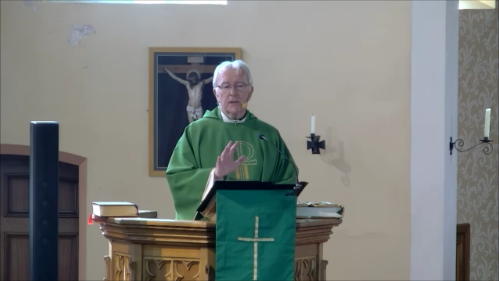
28.08.22 ~ 22nd SUNDAY IN ORDINARY TIME
(To hear audio file ~ click here)
On Thursday morning as I was waiting to load up the minibus with deliveries of food, I had the opportunity of talking with some of the Year 11s coming up the street from Cardy with their exam results. The first group of five lads were not happy at all, saying they had all failed English. One, however, was quite chuffed that he’d got high marks in practical studies. So he should be! The world needs just as many plumbers, electricians, joiners, builders and people who can fix things, as it needs university graduates. Others had a calm, serene look as they approached. One guy I asked “Is that a happy face” replied “it really is”, and showed me his results. I could feel his pride, in the knowledge that his hard work had paid off, and he had done well. It was pride in the best sense of the word.
Pride is the theme running through today’s scriptures. Pride is good if used as a way of glorifying God by doing the very best you can with the talents you are blessed with. Pride is not good if it causes us to dominate others less fortunate, less powerful or disadvantaged. I once served with an RSM who was power mad. He used to lock people up for the most trivial things. Soldiers lived in fear of him. This was definitely the wrong kind of pride. He was replaced by a man whose voice I never heard raised, except on the parade square. Make no mistake, when a miscreant was marched in before him, he was very much the RSM, but he would often tip me off later, if a soldier he had jailed had problems needed me to visit. His sense of justice and self-effacement drew the best out of his men.
Self-effacing or humble people, never assume they know all the answers, however privileged, well-travelled or educated they are. It is said the novelist Thomas Hardy, at the height of his fame, used to include, with his latest offering to his publisher, a SAE for the rejection slip. As Ecclesiasticus says “The greater you are, the more you should behave humbly. No cure for the proud man’s malady”.
In the gospel, as happens so often, there’s more to what Jesus says than meets the eye. He’s not talking about the actual meal he’s attending, but the Messianic Banquet in the kingdom of heaven. T this meal, the Pharisees knew their place in the pecking order and made for it. What Jesus was warning them against, was their pride in the certainty of being the chosen ones, and assuming that, as righteous men, used to being at the top table in terms of religious importance, their status would carry on in the kingdom of God. He warns them that they may well have to give up their place to someone more worthy, and that might be the poor, the crippled, the lame, the blind, people they may never have considered being at the feast in the first place.
Being honest about ourselves, is to accept the facts that, however much we know, our knowledge is small compared with what is still to be discovered, that whatever we have achieved, there is more to be achieved than we can imagine, that however important we have become, death levels us all out in the end. Such honesty and humility help us to be alive to the needs of those less fortunate than ourselves, as well as enjoying the legitimate pleasures of life that come our way. Not for one minute is he saying avoid inviting your friends to dinner. Our friends are our joy and support. To eat with, laugh with and enjoy their company, is good for the soul. But, at the same time, never forget to have a heart for those who have no friends, or the poor, of which there will be many more when winter comes, faced with the question of eat or heat. That’s what taking the lower place really means, and that’s what Jesus actually did. “His state was divine, but he emptied himself to assume the condition of a slave, and being as all men are, he was humbler yet, even to accepting death on the cross”.
Humility is simply acknowledging that everyone we meet, regardless of status, class, colour or culture, has their worth. And, as we saw earlier, humility should increase with greatness. So, if we find ourselves taking undue pride in the fact that we have done our thinking and got everything worked out, we might consider whether, in the great scheme of things, we are only just beginning.
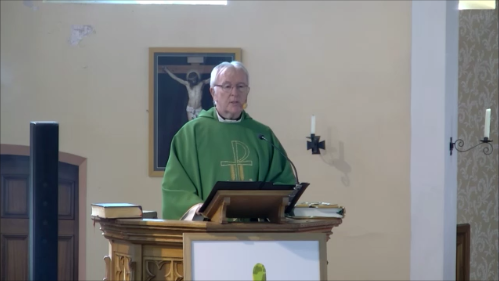
21.08.22 ~ 21st SUNDAY IN ORDINARY TIME
(To hear audio file ~ click here)
Although the war in Ukraine is no longer the lead item on the news, it’s still going on. One of its consequences is the destruction the country’s infrastructure. When Ukrainian refugees eventually return, I suspect they will experience the same sense of desolation that Jews who survived the holocaust did, on returning to find their homes and villages obliterated. Jews had been there before. In the reading from Isaiah, they have at last returned from exile, but are still traumatised by their experience. To console them, Isaiah says that Jews scattered from all over will return to Jerusalem, which will once again become the centre of their world. That is not an unusual message from God. He is always going to rescue his chosen people. What is unusual, at this stage in their history as THE chosen people, is that he also says “I am coming to gather the nations of every language, and I’ll send them to proclaim my glory to distant islands that have never heard of me or seen my glory”.
With hindsight, which the Jewish people didn’t have, we know that Christ came to redeem the whole of humanity, not just the Jews. Hence, it’s no accident that at Pentecost, the first people to hear the Good News were ‘Devout men living in Jerusalem from every nation under heaven’. That’s why I find the question Jesus is asked on the way to Jerusalem, “Sir, will there only be a few saved?” quite curious. Surely, salvation is for everyone. Well, it is: but Jesus makes it clear that it is not automatic. The fact that you are born a Jew or baptised a Christian doesn’t guarantee a place in heaven. What does guarantee it is to try your best to enter heaven by the narrow door, or the road less travelled.
A narrow door is difficult to enter, as some of our Holy Land pilgrims will find out, when they try to enter the church of the Nativity in Bethlehem. A narrow door requires more effort, more flexibility, and the ability to adapt to changing conditions and circumstances, which is very much needed in the Church today. In our parish I think we get that, so are being pro-active in trying to shape our own future, by listening to, and trusting in, the Holy Spirit, to lead us to where God wants us to be. Not to do so would be trying to enter by a wide door, ie doing nothing and just waiting to see what happens.
This has a certain urgency about it because on Thursday, having reached a certain age, Canon Law says I have to sit down and write my letter of resignation to Bishop Paul. When I do so, I’m going to ask him if I can have at least another couple of years here, in order to help to prepare for the time when you may no longer have a residential priest. For some people that prospect sounds quite daunting, but listen to the last line of today’s reading from Isaiah: “I will make some of them priests” – note only “some” of them. Has it always been God’s plan, then, that he only needs priests for what only a priest can do, Mass the Sacraments etc, whereas everything else could, and maybe should, be done by those better qualified, as part of their baptismal commitment, as it was in the early days of the Church, before the Laity handed over everything to the “professional” and left him to make all the decisions? As we know, in some cases this led to the invention of a ‘Clerical Caste’, which is not the vision Jesus had for his Body, the Church, in which every member has a vital part to play.
With that in mind, I’d love to have another parish meeting like the one we had a few months ago to discuss the fate of St Edmunds. I’ve offered two dates, with a sheet at the back of church to tick the one you prefer. As you know, we have very few young families here on a regular basis, and it’s extremely rare to have any at a Parish meeting. Could I ask you, then, to really encourage them to come to this meeting to share with us their thoughts on the way ahead, which mightily concerns them and their children. It concerns us too, because without them the parish does not have a future. At the meeting I will also update you on what’s going on financially, with the legacy we recently received, and plans for future development of our properties, all of which you have a vested interest in. I hope as many people as possible will make the effort to come. Our future depends on it.
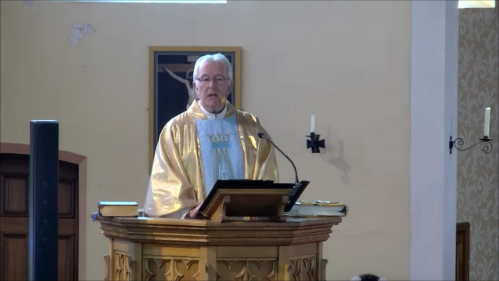
14.08.22 ~ FEAST OF THE ASSUMPTION OF THE BLESSED VIRGIN MARY
(To hear audio file ~ click here)
In the days of silent films, it was not uncommon to see a beautiful woman being tied to railway lines by a jealous lover, a dastardly villain twiddling his moustache, with an evil smirk on his face as he hears the train whistle blow, only to be confounded by the hero arriving in the nick of time to rescue her. For some strange reason, that was the image that came to mind when I read of the huge red dragon lurking in front of the woman about to give birth, ready to devour her child as soon as it was born, only to see the woman escape into the desert and the child spirited away to the throne of God. At first it does sound like a clichéd melodrama of the triumph of Good over Evil, but this is no melodrama. In fact, it is the fulfilment of God’s promise to Adam and Eve, as they are expelled from the Garden of Eden. The promise is called the ‘Proto-Evangelium’, because it’s the first recorded promise of salvation in the Bible, a promise fulfilled by Jesus and passed on to his followers: “On this rock I will build my church, and the gates of Hell can never prevail against it”.
In the first reading from the Apocalypse, it seems at first, that “A woman adorned with the sun, standing on the moon”, is about Mary giving birth to Jesus while the Devil waits to destroy him, but, in actual fact, this passage, written in veiled speech by St John, during a time of vicious persecution by the Emperor Domitian, whom the historian Pliny called ‘ the beast from Hell who sat in his den licking blood’, is about the birth of the Church and his attempt to crush it in its infancy.
As you know, persecution of the Church did not end with the fall of the Roman Empire. It still goes on today. In England we no longer have to shed our blood for the faith as the Martyrs did, but we do have to engage with those who wish to eradicate us from the public arena. As Cardinal Wuerl wrote recently: “Entire generations have become disassociated from the support systems that facilitated the transmission of the Faith. It is as if a tsunami of secular influence has swept across the cultural landscape, taking with it such social markers as marriage, family, the concept of the common good and objective right and wrong”. With the power of the Holy Spirit, we need to start fighting back to restore gospel values to society, and who would be a perfect model for doing so? Mary, of course.
From what we know of Mary’s life, she was completely united to her Son in his mission. He is the one Redeemer, but she brought him into the world. His suffering and death alone won our salvation, but her sufferings were intrinsically linked to his. She was warned at the Presentation in the Temple that a sword of sorrow would pierce her heart too, and she accepted it, even though she could have had no idea of what that would mean for her. It was very much in keeping with her response at the Annunciation – “Let it be done to me according to his word”. For all these reasons we call Mary the Archtype of the Church. Her life reflects the mission of the Church which we still carry on today.
What she achieved is what we the Church must strive to achieve by staying faithful to what God has asked of us, as she did, knowing that where she has gone before, we are to follow. As St Paul says, “Just as all men die in Adam, so all men will be brought to life in Christ”. In other words, Christ’s resurrection announces heavenly glorification for all of us who stay faithful to him, as Mary did. She stands as the human fulfilment of all those promises. She has simply gone ahead of us as Queen of heaven– ‘First up, best dressed’ you might say Through her assumption, she is our guarantee of God’s faithfulness to those who love him.
Through the whole of her life on earth, Mary mirrored what the Church’s relationship with God should be, that of faithful servant, companion, friend, lover. Not only that, but for as long as this world keeps turning, she continues to be a mother to us, nourishing our faith and helping us to conform ourselves to the will of God and the love of her Son, just as she herself did.
“Holy Mary, Mother of God, pray for us sinners now, and at the hour of our death. Amen”
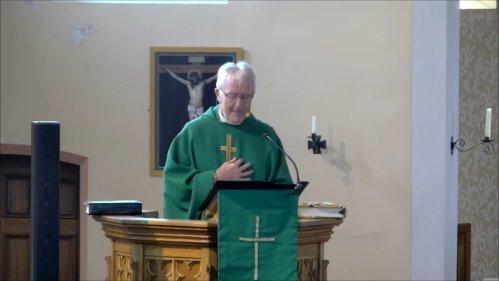
31.07.22 ~ 18th SUNDAY IN ORDINARY TIME
(To hear audio file ~ click here)
The big question from the scriptures today is: does the vanity of riches, fame, prestige, and all the other things people spend a lifetime pursuing, mean that life has no purpose? Take what’s going on at the moment – athletes striving for gold at the Commonwealth games, England’s women hoping to beat the Germans at the Euro Final later today, Liz Truss and Richie Sunak battering each other in order to get the top job, Vladimir Putin determined to annex another sovereign country for his own greater glory. All those people, including ourselves, will be dead in a relatively few years’. So, is all they’re doing a complete waste of time? That’s the impression you get from the book of Ecclesiastes. "Vanity of vanities", says the Preacher, "all is vanity".
However, as you would expect, there’s a lot more to this passage than meets the eye. Qoheleth, the preacher, is not a miserable old pessimist, who tells everybody it’s going to rain if they’re planning a picnic. He is a wise and experienced ruler, reflecting on different philosophies, such as hedonism, stoicism, the pursuit of riches or immortality through fame, each of which claims to explain what life is all about. He has spent a lifetime investigating these claims, and concluded that, while, for a time, there is great joy to be had from these things, in the end they are insubstantial and come to nothing, because they all rely on human abilities and strength. "For what does a man gain for all the toil and strain that he has undergone under the sun? He must leave everything he owns to someone who has not toiled for it at all". In contrast with all these things that don’t last, he points out that God’s wisdom, knowledge and joy are not only freely given, but that they last forever, something the responsorial psalm reminds us of. “Lord, you have been our refuge from one generation to the next”. So, really, his Book doesn’t poo poo our achievements as useless. It simply asks all of us to examine honestly what our life is based on: God’s wisdom or our own?
In the gospel, Jesus gives us an everyday example of how our priorities can go wrong. At first sight, there’s nothing wrong with the rich man building a bigger barn to cater for his bumper crop, until you hear what his motivation is – Greed! “My soul, you’ve plenty of good things laid by for many years to come; take things easy, eat, drink, have a good time”. This is a man holding a very common view of what the ‘Good life’ is. He’s clearly forgotten his dependence on God, and the need to share his good fortune with those who have nothing. We see examples of such greed all the time. Remember the people who bought up all the toilet rolls during lockdown!
It’s interesting that in the gospel, greed rears its ugly head over an inheritance. That is still pretty common today, even among siblings brought up in a loving family, sometimes before the parent has actually died. I’ve seen some shocking cases over the years. I suppose the words none of them want to hear are “I John James Smith, being of sound mind, have actually spent all my money”
The ‘bigger barns’ parable hits us both individually and collectively. Individually, it’s obvious that we all have responsibilities which make it impossible to give up material things, so how do we reconcile holding on to them while “making ourselves rich in the sight of God?” One answer would be to buy what we need rather than what we want, and to share with others what we don’t need. Collectively too, we know many rich countries hoard the world's resources for their exclusive use. Our answer could be to make a cry for justice heard through our MPs, or to support campaigns and demonstrations for fair distribution to countries which have nothing.
What I take from today’s scriptures is that life is a gift from God to be enjoyed and lived to the full. There's nothing wrong in making enough money to have a life of reasonable comfort. But there's everything wrong in making money if motivated by greed, which St Paul tells us is the same thing as worshipping a false god. We should enjoy our good fortune but, as all things must come to an end, be ever aware that, one day, we'll have to render an account to God of how we used the lovely things his hands have made, and how generous we have been in sharing them with others.
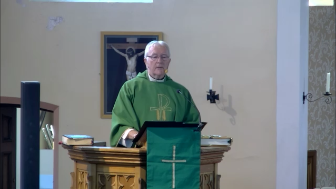
24.07.22 ~ 17th SUNDAY IN ORDINARY TIME
(To hear audio file ~ click here)
As you can imagine, Stephen is getting quite excited about going off to start his studies for the priesthood, hopefully in Rome, if he gets his visa. We were talking about it on Friday, and I said I hoped he would learn Italian and take full advantage of travelling around that lovely country, rather than nipping home every five minutes. Apparently, there’s no danger of that. Air fares are expensive. When I studied for the priesthood in Spain, in the late 60s. we were only allowed home once in 6 years so naturally, our holidays were taken in Spain. As most of us were penniless students, we used to rely on tips from each other for cheap restaurants and hostels we had found, and I always remember one guy coming back from Torremolinos saying, “I wouldn’t bother going there: it’s like Sodom-on-Sea”! At that time, Benidorm was still being built, so Torremolinos was the Mecca for package holidays, with high-rise unfinished hotels, authentic British fish and chips, and the lure of sun, sea, sand and sex – a bit like Blackpool, really, but without the sun.
In Genesis, the original Sodom, with its twin Gomorrah, was far worse than any modern equivalent, in terms of decadence and moral corruption. God is not pleased, and is determined to destroy it, much to Abraham’s horror, even though He himself had had personal experience of their vile behaviour, when they had tried to sexually abuse his wife and their guests. He simply can’t believe that God, who had created in love, could destroy in anger, what he had created, so begins bargaining for the lives of, at least, the innocent. He starts high with the possibility of 50, but in his heart, he knows there’s nowhere near as many as that, so he’s relieved to get the numbers down to just ten.
What gives Abraham the confidence to keep plugging away, like a child trying to wear down his father’s resolve, because he knows his father loves him, is the fact that after each proposition, God says ok, so there’s always a chance he may change his mind. But Abraham doesn’t change God’s mind, and only one good man, Lot, escapes. However, through the bargaining process, Abraham learns something very important about the way God thinks and acts. It’s clear by the concessions he makes that he really does not want to destroy this people, but they are leaving him with little choice, unless they repent and change. If they do, his mercy and forgiveness is guaranteed.
Abraham’s conversation with God is a good example of what true prayer is, something Our Lord elaborates on in the gospel. In the story of the friend in need, we see that when we pray, we must be specific and we must persevere, as Abraham did, not to impose our will on God, but to ask him to make us understand his will, so that we can play our part in his plan for the salvation of the world. The Our Father is the classic model of how to pray because, as well as praying for God’s will to be done, it also contains adoration, contrition, thanksgiving and supplication, which cover every type of conversation we’re ever likely to have with God in prayer.
If you read the gospels, prayer was never an optional extra for Jesus. For him it was as necessary as daily bread. Indeed, in today’s gospel, he speaks of prayer in terms of food – bread, fish, eggs – to illustrate how normal our relationship with God should be. Without regular food physical life cannot survive: without regular prayer nor can spiritual life. Perseverance with both is absolutely necessary.
So, yes, persistence in prayer is essential for all of us, but it can be disheartening when it doesn’t seem to achieve the desired result we hope for. For example, I have a number of intentions I pray for every single day, and have done for many years, one of which is that the lapsed Catholic members of my family will eventually return to the faith, and that not one of them will be lost. I haven’t seen much movement yet, but I’ll keep plugging away, asking the Holy Spirit to re-open their hearts to welcome Christ back into their lives. Maybe you pray the same. Jesus says “Ask and it will be given you”. He doesn’t say when that might be, but that it will be given you, so keep those prayers going.
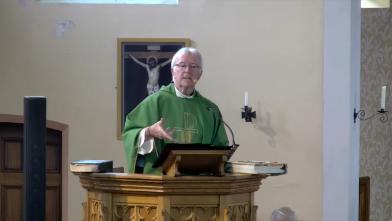
17.07.22 ~ 16th SUNDAY IN ORDINARY TIME
(To hear audio file ~ click here)
On Friday the Met Office issued an extreme heatwave warning for this weekend, in a danger-to-life scenario where temperatures are set to soar to 40 degrees. Many Councils have ordered emergency responses, such as welfare checks on vulnerable people, sunscreen and water for people sleeping rough, It is unprecedented in our country, but in some countries this kind of heat is constant, and people have learnt how to adapt to it. Only mad dogs and English men go out in the midday sun, whereas the locals stay in the shade, or take a siesta. That’s why it is very surprising to find Abraham, in the first reading, sitting by the entrance of the tent during the hottest part of the day. Perhaps he couldn’t sleep. The last thing he would have expected at that time of the day would be visitors. Nevertheless, he immediately runs from the tent to greet them and make them welcome.
In spite of the heat, this is not really surprising because in the Bible, from the earliest times, hospitality was considered one of the primary virtues, perhaps because the people were largely nomads, and were dependent on each other for rest and food after their travels. Abraham turns out to be the perfect host, begging the strangers not to pass by till he has provided them with rest, food and drink. I use the word “He” lightly because it’s actually Sarah who kneads the flour and bakes the bread, and it’s his servant who prepares the calf. Abraham takes what he considers to be, without question, the more important role of welcoming, hosting and making his guests feel at home. He recognises, in that unexpected visit of the three strangers, that God has come to him, so he bows to the ground and welcomes him. The long-promised blessing of a son is bestowed upon him in return.
The obligation to give hospitality was no different in Jesus’ time. He himself said, “Come to me all you who are weary, and I will give you rest”. He was always welcoming anyone in need, and, in the parable of the Good Samaritan, taught us to be the same. But he also emphasised the importance of listening to what your guest has to say. Eg, when people with obvious infirmities, such as leprosy, came to him, he would often ask, “What is it you want me to do for you? as if it wasn’t blindingly clear. He respected them as persons and wanted to hear what they had to say. Maybe their real worry was not their illness, but how their family was managing since they were unable to provide for them.
In the gospel I think it’s fab that Martha, who like Mary, believes Jesus has the power to bring their brother back to life, work miracles and hold thousands in the palm of his hand while preaching, wants to involve him in an ordinary everyday spat about the washing up. Talk about being ‘down to earth’. That’s our Martha, and some may argue, quite rightly, that without Martha he wouldn’t have got his dinner. However, what Jesus means by favouring Mary in this instance, is that true hospitality is to be found, not so much in the external trappings of the welcome, but in the value you place on your guest for him or herself. At a civic function, the food may be spectacular, the wine exquisite, the service perfect, but the people have only really come, to hear what the guest of honour has to say.
In today’s gospel there is no conflict between the busy life and the contemplative life, as if people who pray a lot are the elite, while the doers are second class. Jesus is simply reminding us, through Martha and Mary, that the one thing necessary for all of us, absolutely indispensable really, is to listen to the word of God first so that we have a clear idea of how to put it into practice. The two go together. Everything we do for God must be prayer based. I can’t imagine starting my day without a morning offering or falling asleep at night without a prayer of thanksgiving for the practical things he has enabled me to do. Like everything in life, we have to get the balance right. There’s a time for activity and there’s a time for stillness. At this very moment, and every time we come to Mass, we choose to sit at the Master’s feet with Mary, listening to what he has to say. But we know we can’t stay here all day, because there’s work to do out there with Martha. But it’s only by listening first to the Master that we’ll do the work God wants us to do, rather than what we imagine we have to do.
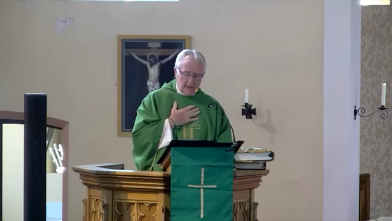
10.07.22 ~ 15th SUNDAY IN ORDINARY TIME
(To hear audio file ~ click here)
I wonder if you remember a case, just a few years ago, in which Police from the Met reportedly refused to enter a canal to rescue a drowning teenager, telling bystanders that they were not allowed to go in, for health and safety reasons, as they weren’t qualified for life-saving. The boy drowned. It caused quite a stink, especially as they also stopped members of the public from jumping in to try to save him. You may also have heard of people no longer stopping to help victims of an RTA, in case they injure them further, and get sued for their trouble. You can probably see where I am going with these examples.
In the parable of the Good Samaritan, the priest and the Levite, far from stopping to help, actually cross the road to avoid the victim; not because they were uncaring, but because of religious law. They may have assumed he was already dead, so, according to the Law, to touch his corpse would have been to make themselves ritually unclean, and therefore unable to carry out their priestly duties. That’s what the Law said, and, for them, keeping the Law was the only way to ‘love’ God.
Jesus was well aware that, by the time he came on the scene, the letter of the law completely dominated its spirit. He himself often felt its backlash when he was castigated by the Authorities for healing on the Sabbath: in their eyes, in spite of the miracle of curing someone, he was breaking the Law. They had obviously forgotten that beautiful passage from Deuteronomy, where Moses tried to instil in the people, a sense that the Law was the outward sign of our inner relationship with God: the love and wisdom of God put into practical terms. God’s laws were never meant to be a test of obedience to a dry, dusty set of restrictions and proscriptions “beyond your strength or beyond your reach, but very near to you, in your mouth and in your hearts”. And, because God has made himself close to you, and everyone else, that means you must make yourself close to your neighbour too.
From earliest days, every Jew knew these two great commandments. The lawyer in the gospel is able to quote them chapter and verse, winning approval from Jesus. Why, then, does he ask “And who is my neighbour?” Isn’t it obvious? What can Jesus say that is different from what he already knows? Well, we know Jesus didn’t invent the two great commandments, but he certainly reinforced them, by extension. Why? Because he is the Redeemer of all mankind, not just the Chosen Few, for whom ‘Your neighbour’ meant just fellow Jews: eg they hated their Samaritan neighbours. Non-Jewish neighbours were forbidden from entering the Temple any closer than the outer court. Jews were not allowed to enter a gentile’s house. Their attitude was very similar to the tribalism we saw during the Troubles in NI, the prevailing enmity between Sunni and Shia Muslims, Hindu exclusiveness in India, the polarisation of Republicans and Democrats in the USA. Such antipathy precludes any sort of dialogue on what unites, rather than what divides, and leaves perpetual implacable opposition, not based on argument or debate, but on dislike, mistrust, or even hatred, of a neighbour you’re supposed to love as yourself, if you truly profess that you love God.
For a Christian, the Parable of the Good Samaritan blows all that apart. There can be no genuine love of God if there is no love of neighbour. As St Paul says in his letter, “Christ is the beginning and end of creation. He holds all things in unity. All things are to be reconciled through him and for him, everything in heaven and everything on earth”. In other words, in God’s eyes we are all equal and we are all one. In some mystical sort of way every human being is part of the Church, which Paul goes on to say “is the Body of Christ”. Now, although a body is made up of a thousand parts, they all work together to achieve the same aim. Therefore, everything we do must involve Christ in some way – teaching, nursing, serving at table, raising a family, community work, anything at all. And it will, if we pray for the grace to see the face of Christ In every person we meet, especially those in need, remembering his words, “Whenever you did it to the least of my brothers you did it to me”.
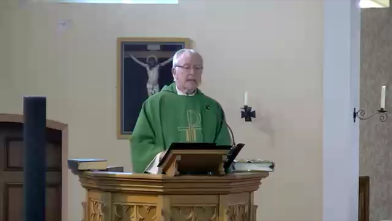
03.07.22 ~ 14th SUNDAY IN ORDINARY TIME
(To hear audio file ~ click here)
As you know, last week I was at Dan Daley’s ordination in Westminster Cathedral. Because of the rail strike, I decided to drive, but so did everybody else, so it took me 8 hours: nightmare! Next day I caught the tube into London, the centre of the world as far as Londoners are concerned. Everybody around me seemed comfortably at home, chatting away to each other. I wonder what they would have thought if I’d stood up and said, “Hello everybody. I’m from up North you know. It’s a really great place”. Would they have thought I was delusional? Up North is unknown territory for many people. In his own country, Jesus was from up North. Perhaps that’s why some sophisticates of Jerusalem looked on him as a country bumpkin, with airs beyond his station.
For the Jews of Jesus’ time Jerusalem is the centre of the world, as it is for Hasidic Jews today. They relished what Isaiah wrote about it in the first reading, where Jerusalem is cosseted and idealised as the epitome of a loving mother, who succours, protects and nourishes all who come to her. No wonder he writes “At the sight of her your heart will rejoice and your bones flourish like the grass”. Their religion is formalised into easily manageable worship centred on the Temple, in which rested the Ark of the Covenant containing the 10 Commandments of the Law, sacred to every Jew. But worship of God was never meant to stay there. During the week I came across a lovely verse from a modern American Rabbi, Louis Newman, which said, “I sought to hear the word of God and climbed the topmost steeple. But God declared, “Go down again – I dwell among the people”.
That’s why, for Jesus, Jerusalem becomes the base from which the light of God will spread to the whole world. Something much more dramatic and powerful is on the way, the ‘new Jerusalem’, unconfined by space or time, a universal kingdom, open to all. Jerusalem is merely the starting point. When Jesus sent out the 72, the important bit to remember is that they were to prepare all the towns that he himself was to visit. On Thursday I had Reception class over for their Liturgy, people like Jasmine, Isla and little Esme who will be baptised today, and we talked about what preparing the way for Jesus meant. The disciples’ job was to tell the villagers all they knew about Jesus, his miracles, healings, wonderful teaching and love for the poor. They were the warm-up act, like acrobats who give you a taste of the thrills and spills you will see when the circus comes to town.
At first this mission was confined to the twelve apostles, the first Bishops, but now Jesus deliberately sends out 72 laypeople, to lay down the foundation for the missionary extension of the Church, to all the nations of the world. We know nothing about them really, but we can probably assume that they were ordinary people who have been following Jesus. They won’t have been on a training course. They’ve simply listened to him and responded enthusiastically. They do not set out to peddle a new theory or philosophy, but to give a living example of what it is to be a disciple.
It’s the same mission we have today. In terms of our faith, not surprisingly, our parish church is the centre of the world, but, in much the same way as Jerusalem was the starting point for evangelising the whole world, the Church is only an assembly point where we are fed and nourished, with his word and with his body, for our own wellbeing, but also for the work we’re called to do out in the mission field. And what is that work? Like the 72, our job is not to change the world, but to prepare the ground, so that Jesus can change the world, through people coming to know him. We do that by living, and being seen to live, as disciples, who talk regularly about Jesus to people who don’t know him as well as we do, telling what he has done for us and what he can do for them. We may feel reticent to talk about our faith, but don’t forget, Christ has been knocking on the door of people’s hearts long before we got there. All they need is someone like us to help them open it up. We are simply the instruments he uses to make his name known. And don’t worry about results. As Jesus said to the 72. Numbers are not important - “Rejoice rather that your names are written in heaven”.
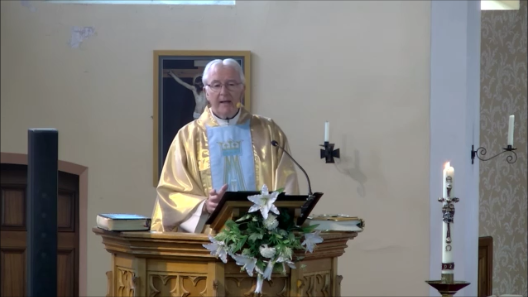
19.06.22 ~ CORPUS CHRISTI
(To hear audio file ~ click here)
As all of you who use computers will know, as soon as you go on the internet, you are bombarded with information about anything and everything going on in the world. On Friday a picture appeared of a warehouse in Ukraine piled up with grain which was destined for, and desperately needed by, areas of Africa devastated by famine. It’s bad enough in normal times when the well-fed part of the world, the one technically best equipped to provide food for all, cuts its foreign aid budget, but to see that mountain of grain, which could feed those poor people, start to rot, is truly heart-breaking.
Jesus once said, “The poor you will always have with you” and it’s true. We know that in our own time, two thirds of mankind is under nourished, and yet there’s plenty of food to go round. That’s why it is such a scandal when rich nations store up grain mountains, create wine lakes and pour milk down drains to keep the price up. We have the means and technology to assuage the physical hunger of the world, but we need the will to do it. Perhaps one of the ways of encouraging and finding the will to do it, is to be found in today’s gospel.
Another thing Jesus said, was to the Devil in the wilderness: “Man doesn’t live on bread alone, but on every word which comes from the mouth of God”. That may well be, but man still has to eat and, let’s face it, that crowd of 5000 had spent the whole day listening to the Word of God. Food for body as well as soul was needed. But how, in this lonely place? When Jesus tells the apostles to feed everyone, he clearly wasn’t thinking of just giving them emergency rations, as we sometimes have to do at the food bank, measuring out what we’ve got in order to make it go round. He fed them in abundance, twelve full baskets left over. It was a physical sign of God’s generosity and prodigality, but, as we saw, his priority in the morning, had been to feed the deeper hunger, which we all have, the hunger for love, the need to be valued as a person with dignity, not a faceless statistic like a refugee farmed out to Rwanda. He saw them as brothers and sisters, not strangers and spongers.
Today’s feast of Corpus Christi follows his line of thinking. He didn’t agree with the apostles that they should send the people away and just look after themselves; and he certainly would not agree with nations keeping vital resources just for themselves. All that sort of self-interest gets blown away on this feast day. If you believe, as we do, that Jesus is really and truly present in Holy Communion, how could you throw open wide the door of your heart to let Christ in, but close it to his poverty-stricken brothers and sisters? This was what happened at Corinth where at the Lord’s supper some richer Christians were stuffing themselves while the poor went hungry, the very opposite of what Jesus did on the hillside in Galilee. In today’s second reading, St Paul reminds them Jesus’ command “Do this in memory of me” is not just a ritual to remember the last supper, but instructions to make him present in the life of his people, by putting into practice his words and actions. To do what he did.
Corpus Christi is at the very core of our Catholic life. It’s the story of our partnership with God: he provides gifts of bread and wine: we supply the work to cultivate them. Wheat is crushed into flour and baked into bread; grapes are pressed into wine, and we offer them as tokens of ourselves. The priest adds a tiny drop of water to the wine, symbolising us in our weakness, being mingled with Christ in his strength, and just as that water can never be taken out again, nor can we be separated from Christ whose life we receive in baptism. Little Freddie will receive that life today in his baptism, and 6 of our children will receive their 1st HC, the food necessary to nourish and keep that life alive.
For Catholics, Mass is not just a memorial ceremony, but the source and summit of Catholic life. Why? Because God himself is the food we receive. We eat and consume the actual Body and Blood of Christ. Like the pelican ripping open her breast to feed her starving young with her own blood, he gives us himself in order that we may have life and have it to the full.
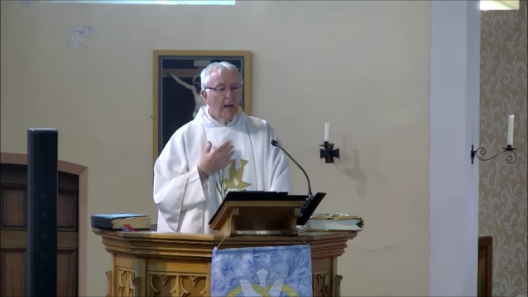
12.06.22 ~ MOST HOLY TRINITY
(To hear audio file ~ click here)
At the Leavers’ Mass on Friday, the readings chosen were St Paul’s image of the Body of Christ, made up of many parts, all with something to contribute, by way of gifts or skills, to the common good. The gospel was the parable of the talents and the need to use them in the Master’s service. In my homily I pointed out that when the Holy Spirit descended on the apostles at Pentecost, it wasn’t as a huge flame above them all, but as individual tongues of fire on the head of each one. Why? Because, of course, we are all different, so will be inspired to use our gifts in different ways. Each of us is unique. But as well as being unique we know that we have to relate to other people. We don't exist in isolation. We need others. A baby cries when its mother leaves the room, a lover is devastated by a break-up. Parents worry when a child leaves home for the first time. I recently visited an elderly lady whose husband had just died. We had to meet in a strange room because she couldn’t bear to go to the lounge they always used to sit in. Since then she has moved to another nursing home, away from painful memories. As I said earlier, we are all relational beings.
The Holy Trinity teaches us that God is the relational being, three unique Persons in one God, totally interrelated and dependant on each other. But what's important for us is that one of those Persons, Christ, became human. So we, and every other human being, are part of that relationship, as adopted sons and daughters of the Father and sisters and brothers of the Son. That’s why we must love one other. God is love and, since we are created in God's image and likeness, to be human means to love. The greatest power on earth is love. Without it we are not truly human.
The same love that binds the three persons of the Trinity in unity, gives us our true value, and transforms us. Many great minds over the centuries have tried to work out how there can be three persons in one God, as you might try to work out a mathematical problem, but there’s no need. Just look at what actually happens. We all know how a father and son, mother and daughter, husband and wife have to operate if they are going to achieve the closest unity they can. They need a third element in their relationship, which they can rely on to make it happen, and that is love. If love is the constant motivating force between them, binding them together, it becomes almost the third person in their relationship, without which they would just be two people sharing the same house.
In the Trinity the Father and Son are so totally wrapped up in love for each other that their love becomes the third person in their relationship, Love Personified, better known as the Holy Spirit. Love changes everything, we say. So when Jesus says, "If anyone loves me, My Father will love him, and we will come to him, and make our home in him", he is offering to transform us, to take hold of our lives, our worries, our sinfulness, our guilt or low esteem, and reveal to us the true beauty of our personality, which we may have long forgotten about.
How does God do that? As Creator or Father, he shares in the joy of parents who co-create life with him, the inventor, the artist who imagines, the researcher who discovers, the child who marvels. As Saviour or Son, he rejoices with the family whose child has been redeemed from drug addiction or bad behaviour, the sinner who comes back. As Holy Spirit or Inspirer, he shares in our decision-making, the anxiety we may feel when having to choose what is the right and best course of action.
God in three persons is constantly in touch with the many different moods and facets of our unique personality. He also understands the weakness of our human condition better than we do ourselves. It’s interesting that today’s feast is not part of the Easter season, but part of ‘Ordinary Time’, which shows us that it is part of our daily life, not a mystery best left to theologians. God, far from being distant from us, is always with us, loving, leading and guiding us, giving us the strength to carry on, until the day we will be totally enveloped by his all-embracing love in the kingdom of heaven.
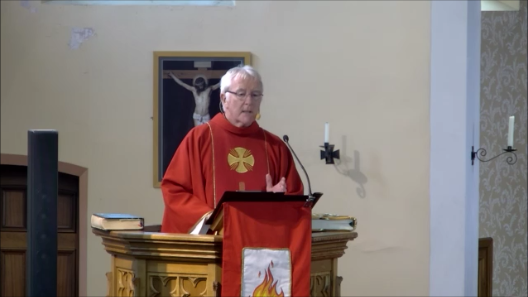
05.06.22 ~ PENTECOST
(To hear audio file ~ click here)
Over the last few weeks, I’ve been talking about the wind of change blowing through the Church. In John 3,8 Jesus says “The wind blows where it will: you hear its sound but you can’t tell where it comes from or where it’s going. So it is with everyone who is born of the Spirit”.
For the Old Testament people God spoke in the wind or ‘Ruah’ meaning spirit. For them the wind was the breath of God, powerful and life-giving. It was God's energy at work in the world. At the beginning of creation, the earth was a formless void. Then the breath of God moved over it and darkness gave way to light, chaos to harmony, and wasteland to cultivated beauty. Later the Lord took dust, shaped it into the form of a human being, and breathed into its nostrils the breath of life, so that man took on God's image and likeness. The breath of God is felt in all the pages of the Bible, carrying men along, shaping their lives and the events of history. Nobody felt its force more strongly than the prophets, who were often asked to preach unpopular messages, at great risk to their own lives. They were inspired men, given strength through the indwelling of the spirit.
In the New Testament the life-giving breath of God continues to affect men in the same way, most notably the apostles on Pentecost Sunday. Like a divine storm he sweeps through them, giving courage, the like of which they could never have imagined, and the wisdom to preach. Peter especially, has his uncertainty and cowardice swept away for ever, as he leads the others down to the market-place. Like the Old Testament prophets, the apostles become fearless, inspired preachers of God’s word. And the Spirit doesn’t stop there. The second effect on that memorable day is on their hearers, whose barriers of prejudice are broken apart. "Devout men living in Jerusalem from every nation under heaven" were able to understand the message of God's love and power, which these poor, unlettered fishermen preached with such enthusiasm. We're told that 3000 of that multinational crowd were converted to Christianity on that day, the birthday of the Church.
In the beginning, when the Spirit moved over the formless void, there came about a colossal variety of creation. At Pentecost, when the Spirit moved over the crowd, people of all types were affected. But he didn’t stop there. The wind of the Holy Spirit continues to move over the world today and forever. Just as the Holy Spirit rested on the apostles individually in parted tongues of fire, and enabled people of different languages to understand the one and same message they all received, so receiving the Holy Spirit doesn’t mean we all have to act in the same way. We’re all different and have been blessed with different gifts and talents. Each of us has our private room, our soul, where the Holy Spirit comes regularly to visit us, but, at some stage, we have to take him out with us, into a world where most people are interested only in unspiritual things.
St Paul says “People who are interested only in unspiritual things can never be pleasing to God”. Unspiritual things can often be disguised, by pretending they’re for a greater good, such as Putin’s special operation to liberate ‘Mother Russia’ from Nazism, Trump’s advice to end mass shootings by giving out more guns and training teachers to use them. On a lesser scale, but just as important, is unthinking consumerism of things we don’t need. In other words instead of humanity speaking with one voice on the things that please God, we are contributing to the building of the Tower of Babel, a monument to self-sufficiency, which, like most monuments, crumble into dust, like the statue of Saddam Hussein dragged from its plinth, thus becoming a monument to empty vanity.
The job of the Holy Spirit is to inspire us to see things for what they really are, to enjoy God’s gifts, and use them well, firstly to realise our own potential, and secondly to serve the needs of our fellow man for the sake of the common good. Let’s pray for that inspiration today for ourselves and our fellow Christians in the vast family of Nations which make up our universal Catholic Church.
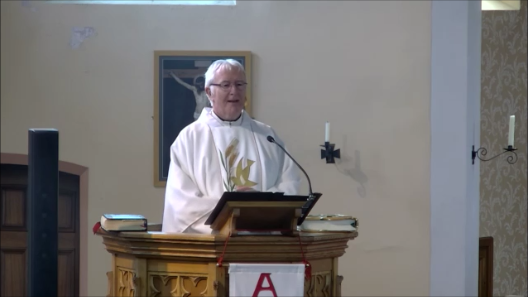
29.05.22 ~ SEVENTH SUNDAY OF EASTER
(To hear audio file ~ click here)
I remember once crossing the channel in the middle of winter and the sea was very rough, so rough in fact, that we thought we’d have to anchor off Dover for the night. The Captain, however, decided he could make it through the narrow entrance to the harbour in spite of the waves, which he did. What followed next was the most amazing bit of sea-craft I’ve ever seen. With so many ships in port, because of the rough weather, there was hardly any room to move, but our intrepid skipper decided he’d turn the ship around for docking in the only place available. I remember rushing to the stern to see how close he’d have to get to the sea wall, in order to avoid the other ships, and I swear it was not more than ten feet or so, as she came round. Thanks to him we were all delivered safely on to dry land, and able to continue our journeys in peace. There is something really reassuring about a safe harbour. There’s no way the Captain would have attempted that manoeuvre on the wild and open sea.
In today’s gospel, which takes place at the Last Supper, Jesus is the harbour for the apostles. They feel safe in his presence. But Jesus knows he must set sail for stormy waters and that, as yet, they will not be up to going with him. At the back of his mind is the fact that he is about to leave them alone, albeit temporarily until the Holy Spirit comes, in a hostile world, and that what will happen to him will also happen to them. Firstly, as he was, they will be opposed by the Establishment, who will be incredibly jealous of their success and against the new teaching. Not surprising really. In every era, and in many organisations, it’s fairly common for the Old Guard to resent new initiatives. But this is far more serious: their opposition will bring death and much suffering, not only to the apostles, but to thousands of the early Christians. So, Jesus prays that they will all be one amongst themselves, and one with him and the Father, because without that all-encompassing unity, and the strength which comes from it, they would never be able to convince the world that the incarnation is God’s plan for the salvation of all mankind
During these last six weeks of Easter, we have had extracts from the Apocalypse, which many people find a bit scary, because of what they see as direful predictions of the end of the world, and total annihilation by the Beast, code name 666. But, the first thing to realise is that St John chose to write in code, because persecution of the Church made it dangerous to be more explicit. However, for all its fearful visions, the whole ethos of the Book is very positive and hopeful. “The Spirit and the Bride say ‘Come. Let all who are thirsty come; all who want it may have the water of life and have it free’. It shows how the Lord will protect and save all those who trust in him, despite the struggles and challenges they face. It is that Hope which enables Stephen to face his persecutors with utter calmness, and undergo martyrdom, while praying for their forgiveness. It is the hope that has carried Christians through every persecution, toil and danger ever since and will continue to do so.
So, when Jesus prays, “Holy Father, I pray not only for these, but for those also who, through their words, will believe in me” he is equipping them, and us, for survival in the stormy seas of life. He’s not saying it will be easy. But just as ships aren’t built to stay in harbours, nor are we meant to stay in a place of no risk. The mission Christ has given us is to make disciples. We are not to build a defensive wall around the Church, but to launch out into the unknown, ready to love and accept people, especially those in need, with no guarantee that we will be loved or accepted in return. We are to show the world that God’s life is in us, by the way we act in unity with him and our fellow men. Being willing to carry out that mission can be a bit daunting, but we should take courage from knowing that no matter what turmoil, storms or difficulties we may have during the week, rest, calmness and recuperation await us here every Sunday when we come into harbour to the welcoming embrace of Christ who is ‘God, our help in ages past and Shelter from the troubled sea’.
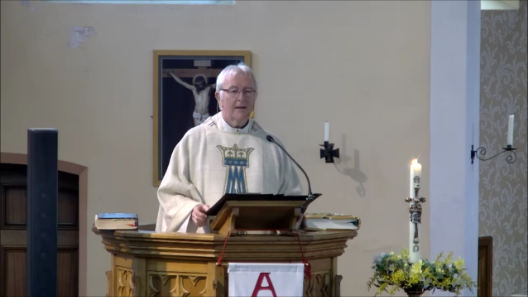
22.05.22 ~ SIXTH SUNDAY OF EASTER
(To hear audio file ~ click here)
Most of this week the Acts of the Apostles has been taken up with the first major crisis in the early Church. The Conservative Jewish converts to Christianity did not like what they were hearing about the more liberal approach of Paul and Barnabas to the admittance of pagans to the Church. They insisted that pagans must first be circumcised and follow all the Jewish customs, but Paul was having none of that, and a big row ensued. It was eventually sorted out at the Council of Jerusalem, in which the apostles and elders, through the Holy Spirit, decided not to saddle new converts with burdens beyond the absolute essentials.
There have been another 20 Councils since then, the last being Vatican II in the early 1960s. Councils are called to adapt the changing signs of the times to the Gospel, which, of course, never changes. Vatican II gave free reign to the Holy Spirit to blow a fresh wind into the Church of the Space Age and the white heat of technology. After centuries of closely guarded clerical control, He was unleashed on the Laity, encouraging them to use their God-given gifts for the building up of the Body of Christ, in which every member has a vital part to play for the Common Good. Unfortunately, over the years, conservative elements in Church clawed back that control and, in some ways, stifled the work of the Holy Spirit. But now we have Pope Francis, doing his best to set him free again, decentralising government from Rome and promoting Synodality, which means ‘walking together’ as equals, the way the Church was always meant to be. And he needs our help.
Last Sunday, I gave an outline of the Conference 11 of us went to and promised to share some of the things we learned about discipleship, one of which was a disciple can be recognised by seven indicators: habitual worship, growth, service, giving, sharing their faith, living virtuously and building community. Like most parishes, the two we are worse at are growth and sharing our faith. So, we’re not really fulfilling Jesus’ command to go out and make disciples, which is the whole point of being a Christian. It may never have occurred to us to make new disciples, but if no-one had made us disciples, we wouldn’t be Christian either. Of course, before we can pass on the faith, we need to reflect on our own discipleship ie what Jesus means to me and what he is doing in my life, as Stephen did so graphically in his talk on his time as a Heroin addict. My story may not be quite so dramatic, but it will contain something of ‘Here’s where I was: here’s where I am now’. We all have a story to tell, even if it is only how God used us in some way. (Fr Frankie’s story of the blind beggar and the commuters trapped in the smoke and gloom of the subway on 9/11. He led them from darkness into light). God doesn’t call the qualified: he qualifies the called.
Making disciples is not so much about teaching the faith but giving people an experience of it. Our faith is all about following a person, Jesus, in fact, falling in love with him, like Mary Magdalene. (Discussion in The Tablet about ‘Noli me Tangere’). The old model of discipleship was behave (stop sinning), believe in God, then you can belong. The new model is the opposite. First belong: then believe and behave. Our Keynote speaker shared how he fell in love with his wife. He didn’t read a book about her, go on a course or have a small group discussion before he decided to ask her out. Nor do we have to know everything about Jesus before we become his disciple. We follow him and all the other stuff, church, sacraments etc comes later. So, why not simply invite someone to come to Mass with you, and let the Holy Spirit do the rest.
This is the approach we are going to use with our young people, not putting them on sacramental courses, just because they’ve reached a certain age, but helping and encouraging them to create a social group, from which, please God, a sense of belonging, may lead to a desire to become the type of disciple described in the seven indicators. I think it’s fair to say that there’s definitely something stirring in our parish. Lots of other ideas are coming thick and fast, some already being put into practice. But, before we get too excited and before we do anything else, we need to explore discipleship a bit further, in order to discern where we go from here. With that in mind, after Pentecost, we are going to start a Saturday morning group to which all of you are invited. Details on next week’s bulletin. In the meantime, try asking “What does Jesus mean to me and what is he doing in my life? The Holy Spirit is up to something and he needs all of us to bring it about.
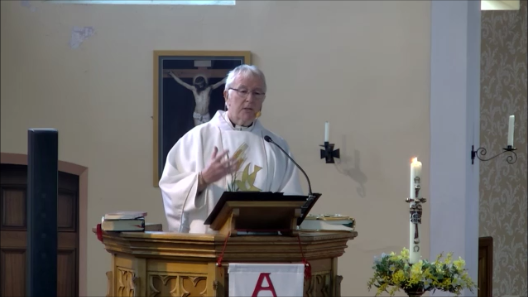
15.05.22 ~ FIFTH SUNDAY OF EASTER
(To hear audio file ~ click here)
Message from Fr Alf ….My homily starts with a piece I read from a priest in Liverpool on the need for change in the Church, to which I refer in my homily.
Yesterday 11 of us attended the Divine Renovation conference at Salford Cathedral along with 80 others from parishes throughout the country.
The reason Divine Renovation is gaining traction in the Church today is because quite a few of us have the same firm grip on reality that Fr Bill Redmond outlined in the little passage I read. We know we have to change the culture of our parishes, if the Church is to survive and thrive.
The keynote speaker described most parishes today as a cruise liner, with lots of activities and a comfortable atmosphere, with the passengers enjoying the set menu and all that goes on inside. What he says we should be is an aircraft carrier returning every week from a mission, refuelling here at Mass and then going out again on mission.
He quoted the famous words of Our Lord when he sent the apostles out on Mission “Go, therefore, make disciples of all the nations; baptise them in the name of the Father and of the Son and of the Holy Spirit, and make them observe all the commands I gave you”. The two most important words in that passage are “make disciples”. If you take them out that’s where most parishes are now. We are baptising and confirming without making disciples. Every week I put baptism anniversaries on the bulletin so that we pray for them, because we promised we’d do that when we accepted those children into our Faith Community. But where are all those children and the parents who made their promises to bring their child up in the Faith? We failed to make them disciples.
So, what is a disciple, and how would you recognise one? Our speaker gave us seven indicators of what makes a disciple: Habitual worship, growth, service, giving, sharing their faith, living virtuously and building community. Of the seven, most parishes admitted that here are three they don’t do very well, if at all: they don’t grow, share their faith or build community.
This led to an example he gave of a conference in the Lake District last week, in which he asked to be introduced to the newest parishioner and to know how long he’d been in the parish. “15 years” was the answer. The parish was about to celebrate it’s 150th anniversary, so he asked the only teenager present who he thought would be celebrating its 200th with him? A sobering thought. We celebrate our 100th in 3 year’s time. At the current rate, how many of our young people will celebrate it’s 150th if we don’t start making disciples now?
I could say much, much more as it was a brilliant conference, full of hope and the joy of the Holy Spirit, but the main thrust was that our parish family has to become a “Church for Life”, so that when we baptise, confirm, give first Holy Communion and teach the faith in our Catholic schools, we are doing so to actively make Catholics for life, not just for special occasions, making disciples, as Jesus commanded us to.
The three keys used in Divine Renovation are the primacy of evangelisation, the best of leadership and the power of the Holy Spirit. They are called keys because they are the tools to unlock the parish so that people on the outside can see what’s on the inside, to unlock the many gifts and talents stored away in each one of us to use for the Common Good, and to unlock the door of our hearts to allow the Holy Spirit in, to empower us to make disciples as he did the apostles at Pentecost.
We came away with lots of ideas for the way ahead and are going to meet next week to put them together so that we can share them with you, and to pray that, hopefully, many of you will want to come on board of, not of a boat that’s sinking but a well-made sturdy craft with Christ at the helm and the Holy Spirit providing the puff to get us to where he wants us to be.
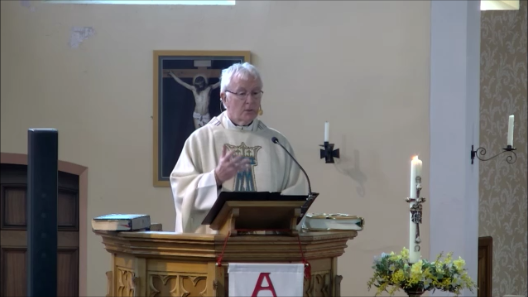
08.05.22 ~ FOURTH SUNDAY OF EASTER
(To hear audio file ~ click here)
A PASTORAL LETTER FROM THE BISHOP OF LANCASTER for the Fourth Sunday of Easter 2022
~ Good Shepherd Sunday
APPOINTED TO BE READ AT ALL PUBLIC MASSES IN ALL CHURCHES AND CHAPELS IN THE DIOCESE OF LANCASTER ON THE WEEKEND OF May 8th 2022
My dear people,
It is customary for me to address you on this Fourth Sunday of Eastertide with a Pastoral Letter on the subject of Vocations to the Priesthood and Consecrated Life. Whilst all are called to the same eternal life in Christ, the same heaven, we know that within the Church there are various vocations ordered to the building up of the Body of Christ.
On many occasions Jesus speaks of how His disciples are to live their vocation. The role of shepherding is given to us as an outstanding example of how we are to show leadership and pastoral care. When we reflect on the relationship of the shepherd and the sheep, we are given a deep insight into the heart of Jesus. This is a theme relevant to every age and situation, even though particular circumstances will vary greatly. The key to all vocations is to set our hearts on knowing Christ.
Since its foundation in 1924, the Diocese of Lancaster has been richly blessed with vocations to the Priesthood. Please continue to pray for men to hear and answer generously and courageously the call to the Priesthood. Please continue to pray for men and women to hear and answer the Lord’s call to follow Him joyfully in the Religious and Consecrated life.
We live in a world of bewilderingly rapid change, filled with many voices. There is much that is disturbing and confusing us, not only the war in Ukraine, pandemic, climate, inflation and identity issues. We must make space and time in our lives to step aside and listen carefully, without distractions, to the voice of the Good Shepherd. How reassuring it is to hear Him say of His sheep, ‘I know them and they follow me’. What a comfort it is to hear Him say, ‘They will never be lost, and no one will steal them from me’.
As you are already aware, we have many priests who are retired or approaching retirement age, although they will live their priesthood to the completion of their days. I thank them for their years of faithful service. Faced with fewer active clergy we must make the necessary adjustments in our parishes so that pastoral care is still available. Fewer clergy does not lessen the Church’s presence or effectiveness. What is needed is for our lay Faithful to become more engaged with work in our parishes and schools perhaps previously done by clergy and religious, but not specifically restricted to their vocation. Thus, an important part of the work of priests is to help you to know and carry out your own vocations as Baptised Catholics. You often hold a professionalism and great experience which differs from that of our clergy. I am grateful to my predecessors for the work they have done in various ways to highlight this need and to help bring it about. I have a real concern for my priests as they find themselves continually stretched to meet the pastoral demands of today in all their complexities.
Let us pray for and encourage those men who are already in formation in the seminaries. We also pray for those who have come forward and are actively discerning their vocation. Others have yet to hear that gentle call from our Lord to follow Him as little shepherds, serving with His Heart.
In the autumn we will welcome to the Diocese the relics of Saint Bernadette Soubirous, the little shepherdess of Lourdes. Her own time looking after the family’s sheep at Bartres was a time of intimate formation in the ways of Christ. I encourage all of you to know her story in more detail, and to pray close to her relics when they are with us in Saint Peter’s Cathedral and then in the church of Our Lady and Saint Joseph, Carlisle. Her life holds a wonderful example from which we can learn the art of prayerful listening. After listening comes the art of answering. After answering comes the exquisite experience of knowing how much we are loved by Him who calls us to share His life, the life of the Blessed Trinity. Let us set our hearts on listening and on answering the Lord’s call, and then let Him lead us in whichever way He chooses, confident that He knows best.
I send this with my prayers for yourselves and your families at this time, and with my deep gratitude for your prayers. These are the times and circumstances in which our Blessed Lord asks us to live our vocations. They may not be the times we would have chosen. We find consolation when we simply hear Him say, ‘I know you; follow me’. He takes us on the way to heaven.

+Paul Swarbrick.
Bishop of Lancaster
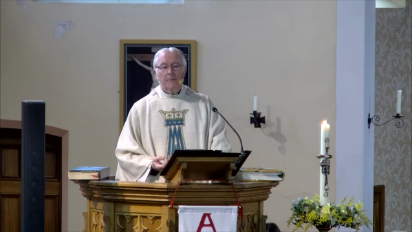
01.05.22 ~ THIRD SUNDAY OF EASTER
(To hear audio file ~ click here)
On a Saturday evening I usually have 5Live sport on in the background while I’m beavering away at something. Last Saturday lots of fans were complaining about the ill-tempered match between Liverpool, playing for the title, and Everton, trying to avoid relegation. Two or three Liverpool fans said, with relish, that they hoped Everton would go down. Not very sporting, you might think, but, for many today, sport is all about winning, tribalism, and in some cases, hatred of opposing teams.
For some reason that came to mind yesterday, when I was reading an article by Gwen Adshead, a forensic psychiatrist, who works in high security prisons, with people who have committed appalling crimes. She was saying how CS Lewis, in the Screwtape Letters, got it dead right about the power of the Devil to make any of us capable of vice and cruelty, and quoted his description of Hell: “Hell is a state of mind where everyone is perpetually concerned about their own dignity and advancement, everyone has a grievance, everyone lives in the deadly serious passions of envy, self-importance and resentment, and everyone wishes everyone else’s demotion and ruin; a state of mind which invites people to see themselves as passive victims of others, not responsible for their own actions”. Never mind the real Hell. I think that’s also a good description of what’s happening in the‘Hell on earth’ of today, eg in Ukraine. It’s a situation which couldn’t be further from where Christ wants us to be.
What’s the answer? It’s pretty obvious actually. From the evidence of her work with rehabilitating serious offenders, Gwen has found that the only way to change for the better, is to start with our own behaviour, to take responsibility for who we are, and for the story of our life, which, once again fits in with the answer CS Lewis gives: “Christian life is about thanking God for our forgiveness and healing, then getting up to walk in the way of the cross, asking for grace on a daily basis, to love and forgive our neighbour, and do whatever service we have been given to do”.
We see that answer lived out in Peter’s encounter with the risen Christ in today’s gospel. Peter had already acknowledged his betrayal of Christ when he went outside and wept bitterly but, as we see today, he is forgiven totally. He is also entrusted with the care of Jesus’ church, which will mean walking in the way of the cross, and needing God’s grace on a daily basis, to fulfill his mission.
It’s interesting that the apostles had caught nothing during the night but, as we sing in the Exultet at Easter, Christ, the light of the world, dispels the darkness. It’s no accident this takes place at first light, symbolically the dawn of the new reign of God, in which they will play an active part. On their own they have achieved nothing, but with Christ working through them they will achieve everything. When Jesus appears, there is a superabundant catch of fish, all of different kinds, expressing plenty, universality and variety. It symbolises how, through their apostolic work, all nations of the earth will be brought to Christ, a mission which is still ongoing, and of which we are privileged to be part.
Like them, we have work to do. We can’t sit here every week like people in a boat waiting for the fish to jump in. To paraphrase CS Lewis, as long as Christians are not doing anything to bring people to Christ, the Devil is content to laze around letting them destroy themselves by war, self absorption, greed, addiction or apathy. No contest! George Bernanos, a Catholic writer, said “One of the main culprits in losing souls is the mediocre priest, where the light and Word of Christ is not transparent. The same applies to the laity when this voice and light become inaudible, disappearing into the texture of society, colourless and bland”. So, we must go fishing, using whatever talents and gifts we have been blessed with. But, a word of warning! As soon as we resolve to become active for Christ, we become a challenge. The Devil is roused into life, swift to attack, ready and able to destroy our resolve before it gets going. That’s when we remember Peter and take courage. Like him, we are aware of our mistakes, but we also know that our sins are gone forever, forgiven and forgotten, and that like Peter Jesus has entrusted us with the care of his people and the mission of the Church today.
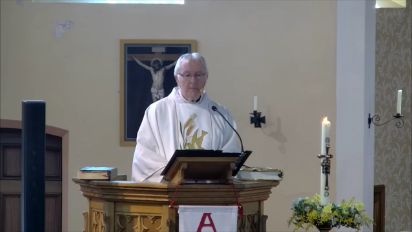
24.04.22 ~ SECOND SUNDAY OF EASTER
(To hear audio file ~ click here)
A couple of weeks ago I watched a film called ‘We bought a Zoo’, based on a true story. A widowed father of two children was having huge problems with his 13yr old son, who, after the death of his mother, was so consistently disruptive at school, that he had to be expelled. It was at this stage that the father decided to move away, find a quiet, peaceful place to make a new start for his family, and try to recapture some of the happiness they had before his wife died. The quiet, peaceful place he found turned out to be a zoo, which his 7yr old daughter loved, but his son hated, and vented all his pent-up rage at his father. It was a breakthrough moment, because the father himself, for the first time, yelled back at his son that he too was suffering and broken by the loss of their mother.
That film came to mind when reading the very familiar story of ‘Doubting Thomas’. The son in the story had become anti-social and obnoxious, because he had been robbed of his mother, whom he clearly worshipped, and obstinately refused to let anything console him. I wondered if Thomas was going through something similar over the loss of Jesus, whom he clearly loved. When grief of such magnitude touches us, it’s natural to feel dejected and inconsolable. When Thomas left the room, the atmosphere would have been one of great sadness, a sense that everything had gone wrong, and that’s how he expected it to be when he returned, only to find that it was buzzing with joy. Thomas, however, is unmoved. For a full eight days, he obstinately refuses to believe them, demanding incontrovertible proof. When given that, by Jesus himself, he immediately, without a further hint of doubt, goes to the opposite extreme, making the most uncompromising act of faith in Christ in the whole Bible – “My Lord and my God”.
We can look at Thomas and wonder why he was unmoved by the enthusiasm of his fellow apostles. But It’s also worth remembering that when the women came running from the tomb to say they had seen the risen Lord, none of the other apostles believed them. Only when they saw for themselves did they believe. So, I think that when Jesus said what he said to Thomas, he was addressing all of them, reminding them of how privileged they were “To see and hear what many longed to see and hear, but never saw or heard it.” By adding “Blessed who have not seen and yet believe”, he is also reminding them that they are not to glory in their privileged position over the people they will serve. What they’ll need is faith, humility, awareness of their limitations and complete reliance on him.
I think it’s fair to say that the apostles got that message, because they attributed everything to the power of the Holy Spirit. When Peter and John were dragged before the High Priest, the Sanhedrin and the Leaders of the people, to explain how they had cured a crippled man, they proclaimed it was by the name of Jesus, and fearlessly refused to obey their command to stop preaching in his name, with the result that ‘So many signs and wonders were worked by them, that people from all the towns nearby, laid their sick on beds and mats out in the streets, in the hope that the shadow of Peter might fall across them as he passed by and bring healing; all of them were cured’, it says.
With that kind of adulation, it would have been very easy for Peter to have started a personality cult. Lots of religious leaders do if they get a following, but when that happens, inevitably, the message gets blurred. For example, the name of Jesus is often used by charismatic preachers in our own time, to proclaim a gospel of prosperity, which usually makes themselves very rich indeed in the process. Others may not deliberately set out to put themselves at the centre, but do so by default, by relying on their own strengths rather than the power of Christ.
The acid test of authenticity in a Christian community is seen in the first reading, from the Acts of the Apostles, where we see that after the resurrection, the faith of all those who did not see Jesus rise, yet believe the preaching of the apostles, begins to bear fruit.
It’s a rather idealised picture, but it shows the essential and indispensable elements for every Christian parish. Union of hearts – The faithful all met by common consent. A place to meet - in the Portico of Solomon every Sunday. Welcome – the people were all loud in their praise. Missionary witness – the numbers who came to believe in the Lord increased steadily. Care of the sick – as we saw earlier. You could say it was the first Catholic parish.
Some of those elements are very alive in our own parish, and others we need to work on, especially Missionary Witness. All of us, not just religious leaders, are called to be witnesses of Christ and the Truth, to plant and water the seeds of faith, and we can do it if we are determined to be involved.
One way to be involved is to come to the Divine Renovation day in Manchester. The other is to take part in the Synodal process Pope Francis has inaugurated, which values every Catholic’s views, ideas and suggestions, for moving away from centralisation of authority, to a symphony of cooperation and life, through the working of the Holy Spirit.
As we move into a new phase in the life of the Church, may we remember that Jesus is as alive and present to us through his Holy Spirit, the Sacraments, his Word, and whenever we meet together in his name, as he was to the Apostles on Easter day, and only he can give the growth. All we need do is have complete faith and trust in whatever and wherever his Holy Spirit is leading us, and never ever be afraid, when he opportunity arises, to speak in Jesus’ name.
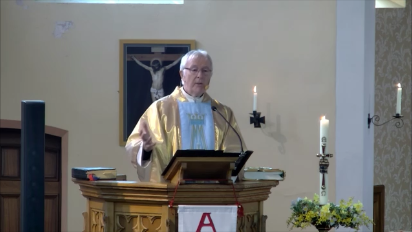
17.04.22 ~ EASTER SUNDAY - MASS OF THE RESURRECTION
(To hear audio file ~ click here)
As you may know, Stephen, our potential student for the Priesthood, is spending Holy Week at the English College at Valladolid. Valladolid is built on a plateau, so it was very cold in winter and blazing hot in the summer, which we would spend at country house. There we’d would work on the land in the morning, have a nice glass of wine at lunch, then take a siesta in the afternoon, because it was too hot to do anything else.
Occasionally, however, those soporific afternoons would be shattered by a violent storm. The sky would go incredibly black, and the birds would go silent thinking that night had come. Even the noise of the cicadas would stop. I used to like to go up on top flat to watch it approaching. First would come the deep roll of distant thunder, which exploded as it got nearer, with flashes of lightning cracking the darkness around us. It was quite an awesome experience and I often felt the power of God somehow behind this display of nature at its most majestic. When the storm passed, the sky would brighten again and all would be calm. The garden would be alive and fresh, and I’d usually go for a run in the nearby pine forest, to breath in its beautiful scent heightened by the warm rain.
The moment Christ died was like that stormy day. The sun stopped shining, the sky went black, there was darkness over the whole earth, all of which caused the Centurion in charge of the crucifixion party to exclaim, “In truth this was a son of God”. It was obvious to him, and I imagine to everyone there, that this was no ordinary death. However, the storm passed, the bodies were taken down and people went home. All was calm again, especially for the Chief priests, Scribes and Pharisees who had put an end to the religious storm Jesus had kicked up for them. But had they?
Certainly, it looked like the end. His mission was by and large a failure. His teaching on service, forgiveness of enemies, and turning the other cheek, were rejected as unworkable by all, except the faithful few. Things were not looking good. Then came Easter morning.
In the gospels there is confusion and total lack of perception of what was going on. In St Luke, the women stand in the empty tomb not knowing what to think, until the two men in white say Jesus is risen, and remind them, that he had told them in Galilee, that he would rise on the third day. When they tell the apostles they’re not believed. In St John, Mary is on her own at the empty tomb and reports “They’ve taken the Lord, and we don’t know where they’ve put him”. In Luke Peter, the leader of the apostles decides to run to the tomb. He sees the cloths Jesus was wrapped up in, then goes back home amazed at what had happened. In John, both Peter and John run to the tomb. John takes a look at the way the cloths are arranged and gets it straight away: “He saw and he believed”.
The difference between Peter’s response and john’s, is very like the confusion sometimes caused by a surrealist painting, or a work of art which nobody can make head nor tail of. unless you know the artist. Peter, of course, knew Jesus well but was often slow to comprehend things at a level deeper than the obvious. He had a great heart and always wanted to be helpful: build tents for Moses, Elijah and Jesus at the Transfiguration, fight the soldiers who came to arrest Jesus, but you sense he never got what Jesus was really about, until the resurrected Jesus appeared to them all in the upper room.
John, on the other hand, was ‘The disciple Jesus loved’. How come? You might say surely Jesus loved them all. I’ve a feeling he may have earned that title after Jesus admonished him and his brother James for wanting to sit one on his right and the other on his left in his kingdom. After that, John changed. Personal ambition disappeared. He was the youngest by far, so probably more open to Jesus’ constant message of love. Indeed, he became the apostle of love. His three letters and his gospel are full of it. I think it was because of that deep inner love, that he was able to cut through the confusion at the tomb, to an immediate understanding of what had just happened.
Like Peter, most of the baptised know Jesus, some better than others, but also like him during their years together, their understanding of who he truly is, and what he is about, may not have penetrated below the surface. For many, their relationship may be superficial.
For example, in my daily prayers for peace recently, I have focused mainly on Ukraine, where a war is being fought between two nations which profess belief in Christ. How does that fit in with ‘Love your enemies. Do good to those who persecute you’? But, as we know, there are people suffering injustice in many other parts of the world, China, Myanmar, Afghanistan, and not forgetting Syria. Men and women are enslaved by fellow human beings for the sake of territorial gain or ideology. You could say that the aggressors themselves are enslaved by the lust for power.
But what’s the point? Everyone knows that here we have no abiding city. They’ll all be dead in a few year’s time. Maybe, because they think death is the end, the final arbiter to whom they will lose everything, they feel they must not only cling on to what they’ve got, but take more and build bigger barns to store it all. Jesus does tell a story about the folly of doing that.
At Easter, that philosophy of death being the end, is made redundant and dare I say, foolish, because Christ has broken the chains of death. His resurrection was not a reanimation of a dead body like Lazarus. He died a second time. Christ will never die again and nor will we who believe in him.
Thank God there are enough of us in the world who do believe and put his gospel of love into practice. We are the Easter People and we have the power, through the Holy Spirit, to change the world for the better, but only if allow the Holy Spirit to move us on, as he did with Peter at Pentecost, from surface knowledge of Christ to intimate love of Christ, which, as with the one Jesus loved, will be the motivation for everything we do, and the way we choose to live.
God knows we’re not perfect, but because of Christ’s Passion, Death and Resurrection, we know that when our time comes, we will experience the intense joy, of the repentant thief hanging beside Jesus, who heard from his lips, the words of the greatest promise ever made. “Today, my friend, you will be with me in Paradise”.
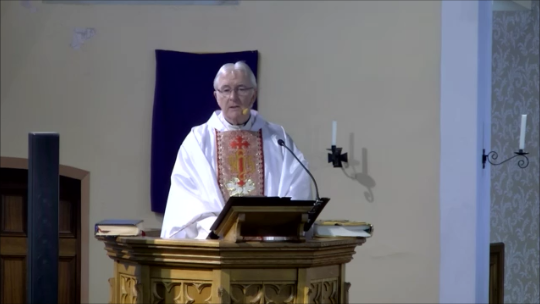
14.04.22 ~ MAUNDY THURSDAY - MASS OF THE LAST SUPPER
(To hear audio file ~ click here)
As we see in today’s first reading from Exodus, the Israelites celebrated a last supper immediately before they began their great adventure of escape from slavery and their perilous journey to the Promised Land. The starting gun for their move was fired with the shedding of much blood.
In the account we read tonight, we hear God saying, “I will see the blood and pass over you, and you will escape the mortal plague when I strike Egypt”. The ‘mortal plague’ would be the death of every first born in the land, animal and human, except for the first born of the Israelites. Only those signed with the blood of the lamb were spared, as the angel of death passed over.
In sparing the firstborn children of Israel, God was making it clear his opposition to human sacrifice, practised by some of the pagan nations they would into contact with on their travels.
From that night on, The Israelites would consider their first born as belonging and consecrated to the Lord, so they would present him to God, but then have him redeemed by a blood sacrifice – a lamb if the parents were wealthy: pigeons if they were poor. And, as we know, Jesus himself, as the firstborn, was presented in the temple and redeemed by a blood sacrifice.
This pivotal moment in their history was remembered every year with a Passover meal, which all Jews had to celebrate in memory of their liberation from slavery, and this was what Jesus and the apostles were doing at the Last Supper. But this particular meal took on a whole new meaning. Jesus himself becomes the sacrificial lamb, whose blood will be shed on the altar of the cross, to redeem, not only his own people, but the whole of humanity.
It is a once-for-all perfect sacrifice which Jesus makes available to all people of all times, so that they too can be set free from the slavery of sin. As in Exodus, after this last supper, much blood would be shed just before the great adventure of resurrection, and the journey to eternal life, in the promised land of heaven. With the death of Jesus, the Old Covenant with God comes to an end, and his blood seals God’s new Covenant with humanity, which we call the ‘New Testament’.
Every Mass we celebrate is rooted in the death and resurrection of Christ, the King who came to serve, not to be served, a point he makes very graphically, as he lowers himself to the level of a slave, to wash the apostles’ feet.
By our communion with him at Mass, and with his Spirit within us, we are given the strength to be his hands and feet in order to reach out to the poor, the marginalised, the lost and the lonely.
Every celebration of Mass is a call to, and the means of, entering more deeply into our Christian vocation to follow him who is the Way, the Truth and the Life, to be at the service of our fellow man, in a world which Jesus is still trying to set free from the slavery of sin and the many evils still rampant in our so-called civilised society, such as the slaughter of innocents in Ukraine at this very moment.
“Lamb of God who takes away the sins of the world, have mercy on us and grant us your peace”.
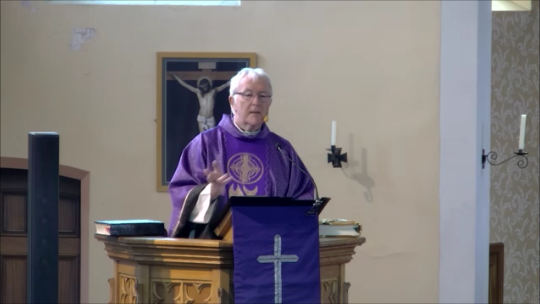
03.04.22 ~ 5th SUNDAY OF LENT
(To hear audio file ~ click here)
There’s a well-known phrase, which most of us hope to avoid being addressed to us, but which is very common in TV dramas: “You do not have to say anything, but it may harm your defence if you do not mention, when questioned, something which you later rely on in court”.
The incident of the woman caught in adultery is one of several incidents, quite close to his own arrest and trial, in which Jesus is put into a compromising position by his enemies. Another would be when they tried to trap him by asking whether it was lawful to pay taxes to Caesar or not. Their aim is to build up evidence they can use against him. As the woman’s accusers stand there fully armed with stones to smash her to bits, Jesus exercises his right to remain silent and bends down to write something in the sand. Maybe his looking down at the ground was an attempt to spare the woman’s shame. Having been caught in the act of adultery, it’s hardly likely her accusers would have politely asked her to put some clothes on, before dragging her out and making her stand in full view of everybody. Be that as it may, because they persist with their question Jesus feels compelled to break his silence which he does with a brilliant response. “If there is one of you here who has not sinned, let him be the first to throw a stone at her”. Brilliant, because who would dare to claim that he was without sin? St John says, “If anyone says he has not sinned, he’s a liar.”
We’re now coming to the climax of Lent when Jesus himself will be put on trial before the Sanhedrin and, as we’ll see, he exercises his right to remain silent, as he does in today’s story. It’s as though he is giving his accusers time to reflect on what they are about to do, and how they’d feel if they were the accused. The woman’s accusers clearly don’t care about how she feels, but put yourself in her shoes. Your sin is exposed, your dignity is gone, your fate is in the balance, you’re shaking with fear, terrified of the cruel death the obvious verdict of ‘guilty as charged’ will bring. Everything depends on what this man will answer. Your situation is hopeless. And then, suddenly, it's quiet. The shrieks of your accusers have stopped, the crowd has slipped away, and, still confused and frightened, you glance up to see only eyes of compassion, in a stranger, whose words have just saved your life. You listen, hardly able to believe you are safe, as he says, "Go in peace, and sin no more".
Ironically, because Jesus is the only person there without sin, he is the only one with authority to throw the first stone, but he doesn’t. He doesn’t condemn her but nor does he approve of what she has done. He doesn’t minimise it or look for mitigating circumstances. He knows she’s guilty as sin. What he does do is offer her a new start. This poor woman was clearly on the edge of despair but God despairs of no-one, as we saw in the parable of the Prodigal Son last week. The Church says the same: “Hate the sin, love the sinner.” As it says in the first reading “No need to recall the past, no need to think about what was done before. See I am doing a new deed”.
Like the men in the story, most people know they are sinners, but very few seek forgiveness in the sacrament of confession. Maybe some think they have a direct hotline to God and don’t need his forgiveness mediated by a priest, even though Jesus gave us this sacrament as the surefire way to get it. The Church teaches that we should go to confession at least once a year, even if we don't think we've done anything wrong. Why? Because we certainly will have - nobody’s perfect, and nobody is a judge in his own case. Some people carry a burden round for years unable to believe they can be forgiven. If you are one of them, think of today's gospel. Imagine yourself standing before Jesus, fully conscious of what you've done, which he knows already. Then remember his attitude to the woman, his understanding of her human weakness, and his readiness to forgive. He knows that, more often than not, we fail because we are at the mercy of our moods and desires, and that, deep down, each of us would like to go in peace and sin no more. In confession his understanding, compassion and forgiveness make that possible. Confession really is good for the soul.
I try to go every couple of months, but since my Confessor, Fr Dakin died, it’s getting more difficult to find an opportunity with so few priests around. However, that’s not the case for you. I’m in the confessional every Saturday morning from 1000-1030. If that’s not a good time, you can make an appointment over the phone or just ring the door bell of the presbytery, which I’m happy to say, some of you already do.
Finally, we have the Lenten penitential service Wednesday of Holy week at 6.30pm. It is not general absolution, but very user friendly, so do think about coming to receive the absolute certainty of God’s forgiveness in this wonderful sacrament.
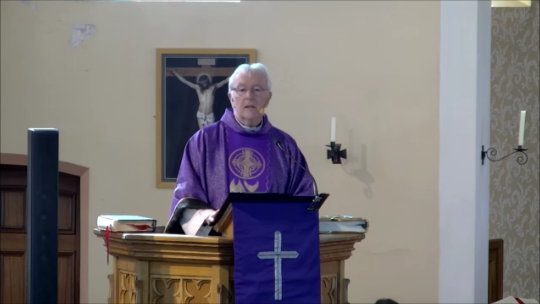
27.03.22 ~ 4th SUNDAY OF LENT
(To hear audio file ~ click here)
On Thursday Stephen and I were out delivering food when Oasis came on the radio, which got us talking about the older and younger Gallagher brothers who, in spite of their phenomenal success, hated each other and often got into fights. I am sure it was nothing to do with being City supporters. Later that day I was in class and asked the children what they have been doing in RE. As it happened, they’d been doing the story of Cain and Abel, the first two brothers we know of, which ended badly for both of them. Cain, the elder brother was resentful of Abel and killed him. When God asked Cain where his brother was, he angrily replied. “I don’t know. Am I my brother’s keeper?” Clearly, God thought so. Coincidentally, I recently came across an extract from a book by a man called Edmund Clowney, which tells the true story of a soldier missing in action during the Vietnam War. When his family could get no word of him through official channels, his older brother flew to Vietnam and, risking his own life, scoured the area he was last seen in, looking for his lost brother. He was never hurt, apparently because soldiers of both sides heard of his dedication and respected his quest. He was known simply as ‘The brother’.
That led me on to the two brothers in today’s gospel. In the parable maybe that’s what the elder brother should have thought of doing when he heard what his daft, immature younger brother had done. A true elder brother could have said to his father, “Our Jack’s made a right fool of himself, and will probably lose all you’ve given him. I’ll go and look for him and bring him home before he does himself too much damage”. But, as we know, such generosity of spirit is not in his armoury. He does nothing, and when his self-indulgent, undisciplined and ruined younger brother appears back on the scene, like Cain, the older brother is, to put it mildly, totally resentful of him, and even more of his father, who welcomes him back with impunity. His self-righteousness creates an unforgiving, judgemental spirit. He cannot, or will not, pardon his younger brother for the disgrace he has brought on the family and for squandering its wealth. He doesn’t even talk to him, but lays into his father for giving a feast to toast the return of his wastrel son.
When Jesus told this story, it was because the scribes and Pharisees were complaining about him welcoming
sinners and eating with them. It’s not hard to see that they are the elder brother in the story, resenting the fact that a Rabbi should be wasting his time on low-life, who do not obey the Law and have no integrity, unlike themselves. But, the whole point of Christ’s mission is to reconcile men to the Father and make of them a new creation. He is the ultimate big brother looking out for those of us who so easily go astray.
Making a new creation has a particular relevance today, I think, because we can dwell too much on the mistakes of the past, and never move forward. In the first reading. we see that after 40 yrs in the wilderness, the Israelites inherit the Promised Land. The manna dries up and for the first time they eat the produce of their new land. Taste and see that the Lord is good. His promises have been fulfilled. The Lord says to Joshua “Today I have taken the shame of Egypt away from you”. So, time to forget the past and move on. In our own time, I’m not sure I go along with all this apologising for what people, who are not us, did hundreds of years ago, as Prince William did in Jamaica about slavery. Where does it stop? Should today’s citizens of Rome apologise for enslaving us in 55 BC? Certainly, remembering the past is essential for avoiding similar mistakes in the future, but I don’t feel we have to apologise for something we didn’t do. That was then – this is now. It’s modern-day slavery and trafficking we should be trying to eradicate. As St Paul says ”For anyone who is in Christ, there is a new creation; the old creation has gone and the new one is here.”
St Paul also says “We are ambassadors for Christ; it is as though God is appealing through us, and the appeal we make in Christ’s name is: be reconciled to God”. The job of an ambassador is to represent and further the interests of his country or Sovereign. Our job as ambassadors of Christ is to give the same message he gives: salvation and forgiveness is for everyone without exception. We do this by trying to act in the way he himself would, when dealing with people who may not, at first sight, be the desirable company we should keep. We have to be an elder brother who understands, that, in God’s eyes, we definitely are our brother’s keeper.
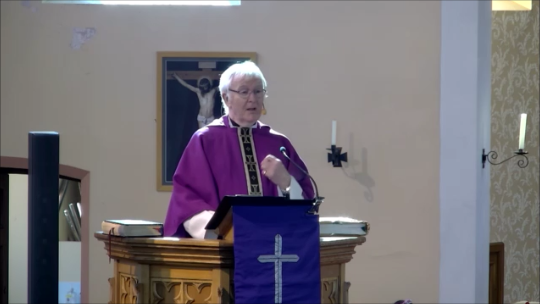
20.03.22 ~ 3rd SUNDAY OF LENT
(To hear audio file ~ click here)
On Thursday we celebrated the feast of St Patrick. After the gospel I told of a book I had read about a man called Damon Shakarian, a self-made millionaire in the Bible belt of the Southern States. In gratitude to God for his good fortune, he decided he would hire the local baseball stadium and give a testimony to God’s glory. It cost him a fortune but on the big night only a handful of people turned up. Crestfallen he went back to his Bible to try to understand why God had let this happen, and in St Peter’s first letter he read “Each one of you has been given a special grace, so put yourself at the service of others. If you are a speaker, speak in words that come from God; if you are a helper help as though everything is done at God’s orders so that God may receive the glory”. Bingo! I may be a useless speaker, but I’m a fantastic helper. So, he hired the stadium again, but this time he got the day’s most famous preacher to do the speaking, and it was a huge success.
There are two things to draw from this story. One is to find out what you are really gifted at, then use it for the common good, and, at the same time, acknowledge what you’re no good at and leave that to someone else. However, it can happen that you think you are gifted at something, but God has other plans for you. Eg, on Friday I was at Jane O’Donnell’s funeral at Saint Kent’s. Jane, like her sisters, had trained to be a nurse, which she enjoyed, but later changed careers to become a Catholic teacher, which turned out to be the real vocation God was calling her to, because she was exceptional. Not only did she give a living faith to her own children, all of whom still practice, but also to the children she taught, and the parents she nurtured and supported outside of school life, especially with preparation for the sacraments. It was no wonder that there was standing room only at the church. So, when you pray about your future, leave an open mind for the Holy Spirit to enlighten you. You never know what may happen. I wanted to be a policeman!
The second thing is that when you are doing something wonderful for God, never give up, which is easier said than done. Sometimes never giving up demands incredible bravery, which brings me back to St Patrick. He was an extraordinarily brave man, in that having escaped from slavery in pagan Ireland and become a priest, he made the choice to go back to bring the gospel to his erstwhile slave masters. If you want to put it in context, Imagine Nazanin Zaghari-Ratcliffe volunteering to go back to Iran in a few years’ time to convert her hostage takers. In today’s scriptures it’s the turn of Moses to go back. He had fled from Egypt, where he was wanted for murder, to the safety of the land of Midian. He had married, settled down and was living a comfy life. Now God was asking him to go back to Egypt, where his fellow Hebrews were being treated abominably, and stand up to Pharoah, the world’s most powerful man. No wonder he objected. Then, when he got to Egypt did all go smoothly? No, it definitely didn’t. For Moses, God’s end game didn’t seem to have been well thought out. Although they’d been set free, the people became Moses’ biggest headache, dancing round a golden calf and grumbling all the time. But he never gave up and, in the end, he got the job done.
St Paul reminds us that we’re on a similar journey to the Promised Land of Heaven, and warns us that, like Moses, we will have difficulties on the way. So, it helps to remember that what persuaded him to go back to Egypt was his encounter with God on holy ground, where he learned that he would be only an instrument in the liberation of his people, not the liberator himself. It is God who sets his people free. Every time we come into church, we too are on holy ground where we encounter God. Although we don’t take our shoes off, as the Muslims do when entering the Mosque, we bless ourselves as we enter, and we genuflect before the light of the world present in the tabernacle, symbolised by the burning light beside it. He will speak to us through the scriptures, encouraging us to live them with the strength he will provide, reassuring us that like Moses, in spite of difficulties all will be well. So, we must be brave and never give up. As we can see from the parable of the fig tree, on our journey every Christian is expected to produce fruit for the growth of the kingdom, and there’s a warning of what will happen if we don’t. But so long as we live, there will always be time to do so using the gifts we have been blessed with, even if we think we not particularly blessed or even useless. No person on this earth is useless. I once saw a guy coming towards me in a tee shirt which said on the front, “Stop telling me I’m good for nothing”. On the back “I can always be used as a bad example!”
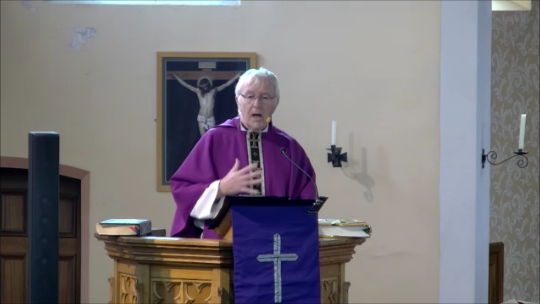
13.03.22 ~ 2nd SUNDAY OF LENT
(To hear audio file ~ click here)
When I heard last week that President Putin was thinking of bringing nuclear weapons into the war against Ukraine, it brought back memories of the Arms race of the last century, a crazy time of stockpiling tons of nuclear weapons, even though not many are needed, to guarantee mutually assured destruction, on a global scale. Naturally, this didn’t go unnoticed, and many protest songs were written, like Barry Maguires “Eve of Destruction”. My particular favourite, by the Dubliners, was ‘The Button Pusher’ about the man who would push the button to end the world. The most telling line in the song is “You don’t have to kill the whole bloody lot to make the people free”. Sadly, until Putin made his statement last week, we thought those crazy days were over, and even though, thank God, nuclear weapons have not so far come into play, conventional arms are still killing as many Ukrainians as possible – ostensibly, in order to make them free. Pure madness.
This land grab at the expense of the lives of so many innocent people is a classic example of what St Paul points out to the Philippians: “There are many who are behaving as enemies of the cross of Christ. They are proudest of what they should think shameful; the things they think important are earthly things”. There is complete ignorance, or rejection, of the Christian belief that “For us, our homeland is in heaven” that here we have no abiding city and, because of that common belief, we should spend this life seeking what unites rather than what divides, the golden rule being “Do unto others what you would have them do to you”.
We may wonder how it is that a self-professed Christian leader, can behave as an enemy of the cross of Christ, on which the greatest act of love known to man took place? But he’s not the first – Hitler, Stalin, Mugabe. Perhaps they never got beyond seeing only what the people of Jesus’ own time saw – an ordinary man. Maybe that’s why they could dismiss his teaching on how to exercise authority as naïve and unrealistic – the very idea of ruling over people by becoming their servant – preposterous! How different it could all be if they took to heart the lesson of service Jesus gave on the cross, and realise that one day he, not just an ordinary man, but the Son of God, will demand of them justice for the way they behaved. Many people think of Jesus as just a good man. Even the apostles, in spite of all they had seen him say and do, in their everyday life on the road, saw only the man Jesus, that is, until their encounter on the mountain in today’s gospel.
Throughout the scriptures mountains are the places where meetings with God occur. On Mt Ararat Noah sacrificed to God after the Flood. On Moriah Abraham was asked to sacrifice Isaac, On Sinai Moses received the Law. On Horeb Elijah saw God in the gentle breeze. On Mt Sion Solomon built the Temple. When we’re faced with great difficulties, we say we have a mountain to climb. Until we get to the top, we won’t see clearly what needs to be done. In battle those who hold the high ground have the advantage. If you ever go to Monte Casino, you will see by its sheer steepness, why so many allied troops lie buried at its base.
When we come to Mass, we come to the mountain of God where we encounter him in Word and sacrament as well as in each other, and from this high vantage point, hopefully we get a clearer view of what we need to do out there, back on the road, so to speak. Clearly, the time we spend here face to face with Jesus is vital – we learn from his word what he wants from us. That sense of belonging, made even better by the support we give each other, is a great feeling, but we can’t stay here all week. Like the apostles, we must come down from the mountain, into the messy world that needs our input to make things better. In this war President Zelensky occupies the moral high ground and could easily remain above the conflict in a safe place, but physically, he’s down there on the front line with the people he promised to serve. That’s true leadership.
On our ascent to our true home in heaven, all of us, especially those entrusted with leadership, must rise above nominal Christianity, remembering that Christians are not born but made, by the nitty gritty of putting the gospel into practice, which is very difficult if the only things you think are important are earthly like land, power, or one’s legacy. To have Christ at the centre of one’s personal life, or the life of a nation, means to measure ourselves and our actions, by the way he treated people just the same, whether friend or enemy.
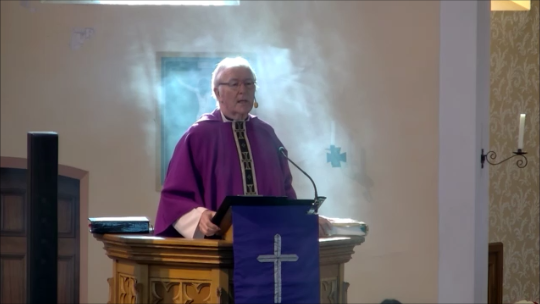
06.03.22 ~ 1st SUNDAY OF LENT
(To hear audio file ~ click here)
A PASTORAL LETTER FROM THE BISHOP OF LANCASTER for the First Sunday of Lent 2022
APPOINTED TO BE READ AT ALL PUBLIC MASSES IN ALL CHURCHES AND CHAPELS IN THE DIOCESE OF LANCASTER ON THE WEEKEND OF 5-6 MARCH 2022
My dear people,
The gift of Lent is given to us once more. Let us use it well, accepting it as an opportunity to reveal our hearts to the Lord, inviting Him to enter and make His home in us. Lent is our opportunity to prepare a worthy place for this most welcome guest. Prayer, fasting and sharing with the poor will be the three instruments we use to get the work done. Notice how none of these three needs public words; prayer is a conversation within the heart, fasting and alms-giving take place most effectively in silence and in private.
 On this first Sunday of Lent we hear how our Lord, after being baptised by Saint John the Baptist in the Jordan, was taken into the wilderness by the Spirit. When the Son of God was sent by the Father into the world, conceived in the womb of Mary, He came from heaven into the wilderness of fallen creation. Now, as He prepares to begin His public ministry, He enters into the wilderness of our hearts. Sadly, as we know, we are not ready to receive Him, having allowed ourselves to be distracted by so many other things. It is our good fortune that He comes to be our Saviour.
It is sometimes the case that we find things in life so difficult to deal with that we hide them away and don’t go in; we know it is there, but the mess is too much for us to deal with, so we leave it covered up. This may be true of our garages, lofts, drawers or emails! In a similar way we may be conscious of a health problem, and yet we fear to go to the doctor. More seriously, it can be true that my spirit needs attention and yet I do nothing.
On this first Sunday of Lent we hear how our Lord, after being baptised by Saint John the Baptist in the Jordan, was taken into the wilderness by the Spirit. When the Son of God was sent by the Father into the world, conceived in the womb of Mary, He came from heaven into the wilderness of fallen creation. Now, as He prepares to begin His public ministry, He enters into the wilderness of our hearts. Sadly, as we know, we are not ready to receive Him, having allowed ourselves to be distracted by so many other things. It is our good fortune that He comes to be our Saviour.
It is sometimes the case that we find things in life so difficult to deal with that we hide them away and don’t go in; we know it is there, but the mess is too much for us to deal with, so we leave it covered up. This may be true of our garages, lofts, drawers or emails! In a similar way we may be conscious of a health problem, and yet we fear to go to the doctor. More seriously, it can be true that my spirit needs attention and yet I do nothing.
 What is needed is for us to find someone who will help us get started and work with us. That person is Jesus. We may be surprised to find Him already getting on with this work. How did He get in? Mary gives Him the key to every heart. What motivates Him? It is the Father’s love for us. What can motivate us to cooperate in this work? It is the realisation that we have been loved first. We will also find motivation in realising that life is not what it should be.
These forty days of Lent will pass quickly, and we will find ourselves in Holy Week. By then a transformation will have taken place in the world around us. That change will be obvious to see, but it will be on the outside of things. What matters now for each of us is the inside, the personal, the hidden wilderness of the soul. Remember that our Faith is not just a private matter; our lives lived with Christ will benefit others for their good in this life and for their eternal life. United with Christ, your little sacrifices can achieve a great deal of good.
Lent must be penitential, but it is still good news, part of the Gospel. ‘Turn away from sin: Believe the Good News.’ There is immense benefit to be found in a Lent well kept. It is not designed to make our lives harder. Rather it serves to make them more honest, more humble, and more a place where Our Blessed Lord can find welcome. A priest made a comment in the retreat he gave us many years ago, ‘When you preach to the people on Sunday, don’t give them a hard time – they get that during the rest of their week. That’s not what they come for. Try to raise their spirits. Help them hear the Good News’.
What is needed is for us to find someone who will help us get started and work with us. That person is Jesus. We may be surprised to find Him already getting on with this work. How did He get in? Mary gives Him the key to every heart. What motivates Him? It is the Father’s love for us. What can motivate us to cooperate in this work? It is the realisation that we have been loved first. We will also find motivation in realising that life is not what it should be.
These forty days of Lent will pass quickly, and we will find ourselves in Holy Week. By then a transformation will have taken place in the world around us. That change will be obvious to see, but it will be on the outside of things. What matters now for each of us is the inside, the personal, the hidden wilderness of the soul. Remember that our Faith is not just a private matter; our lives lived with Christ will benefit others for their good in this life and for their eternal life. United with Christ, your little sacrifices can achieve a great deal of good.
Lent must be penitential, but it is still good news, part of the Gospel. ‘Turn away from sin: Believe the Good News.’ There is immense benefit to be found in a Lent well kept. It is not designed to make our lives harder. Rather it serves to make them more honest, more humble, and more a place where Our Blessed Lord can find welcome. A priest made a comment in the retreat he gave us many years ago, ‘When you preach to the people on Sunday, don’t give them a hard time – they get that during the rest of their week. That’s not what they come for. Try to raise their spirits. Help them hear the Good News’.
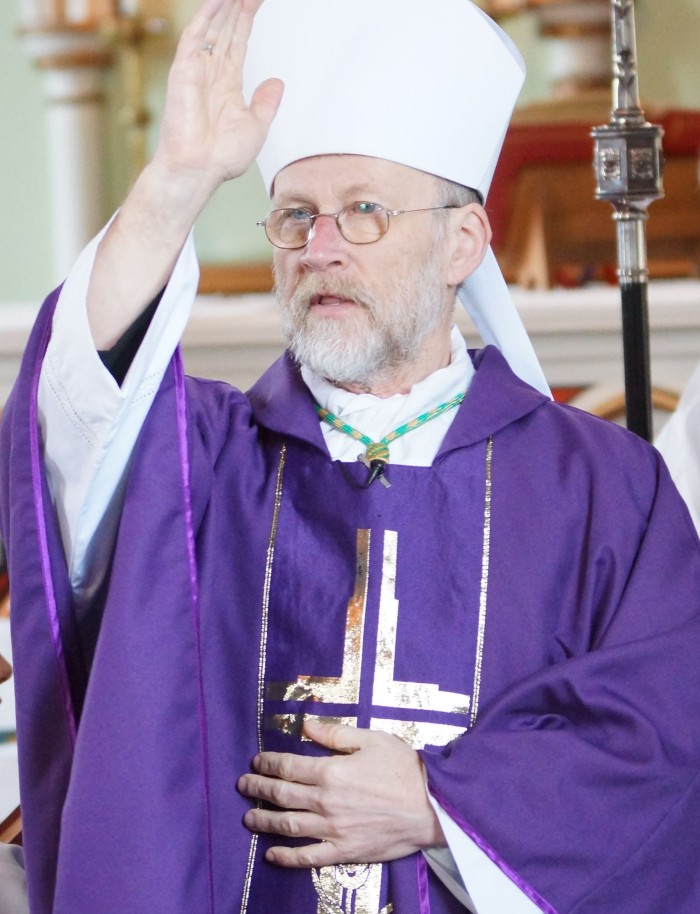 May this Lent help us all to hear the Gospel more clearly, and welcome it more generously, for all our sakes, but especially for those whose needs are greatest. We turn to Mary, the first to give Jesus shelter in the wilderness of this world. She has given Jesus the key to the wilderness of every heart. Although free from sin, she accepted to do penance for us all as a way to return love for love received. May we follow her example with joy and gratitude.
With my blessing for you and your families,
May this Lent help us all to hear the Gospel more clearly, and welcome it more generously, for all our sakes, but especially for those whose needs are greatest. We turn to Mary, the first to give Jesus shelter in the wilderness of this world. She has given Jesus the key to the wilderness of every heart. Although free from sin, she accepted to do penance for us all as a way to return love for love received. May we follow her example with joy and gratitude.
With my blessing for you and your families,

+Paul Swarbrick
Bishop of Lancaster
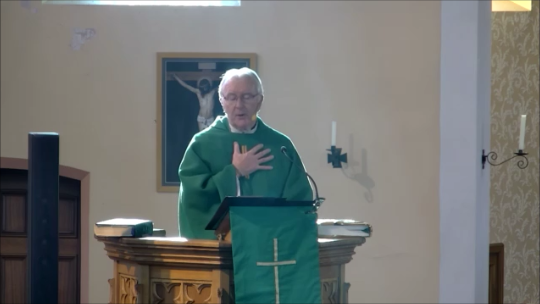
27.02.22 ~ 8th SUNDAY IN ORDINARY TIME
(To hear audio file ~ click here)
I was telling the children on Thursday about my dad. One night, when he was a little boy in Dublin, he was riding past a tenement block on his bike, when he heard some terrible screams and saw a man with a knife threatening a woman, presumably his wife. He rode as fast as he could until he found a policeman, and breathlessly told him what he’d seen, expecting the policeman to go tearing off to stop the murder. But, to his amazement, the policeman completely ignored what dad had said, and instead inspected his bike and told him off because his rear light was not working. In the light of today’s gospel, I think we can safely say the policeman had placed a plank in his own eye to avoid doing his sworn, albeit dangerous, duty, while insisting my dad did his very small speck of duty in comparison. It was the complete opposite of what Jesus advises in the gospel: if you want to direct others in the right way to go, you must yourself be clear-sighted. No point offering advice to someone if you don’t follow it yourself. Mahatma Gandhi was once asked by a woman in the compound to tell her son to stop eating so many sweets. After three weeks she said, ‘Why haven’t you spoken to my son?’ to which he replied, ‘Well, I haven’t managed it myself yet”.
In everyday life, to be aware of the plank in our own eye, is a great grace which can prevent us from making some horrible mistakes in our judgements. To deny responsibility, or pour blame entirely on another person, can have disastrous results, as in a recent high-profile case – “The grand old Duke of York, he had £12 million quid; he gave it to a woman he’d never met, for something he never did”.
Where it gets far more serious is on the grander scale of international relations where consequences are often tragic. The current war in Ukraine, if I understand it correctly, has come about because Putin who, like the Nazis, allows no legitimate opposition to his power, wants to rid Ukraine of Nazism (of which there is none) and genocide (which has not taken place). Blinded by the plank of corruption, coercion and lack of freedom in his own back yard, he wants to remove, what he sees as the splinter of Democracy, from the eye of a sovereign State, and to bring it under the same rigorous control he exercises on the Russian people. Let’s pray he doesn’t succeed and this war is soon over.
Later in today’s gospel, Jesus says “A good man draws what is good from the store of goodness in his heart; a bad man draws what is bad from the store of badness” which echoes Sirach in the first reading, “A man’s words betrays what he feels”. CS Lewis, in his wonderful book, ‘Mere Christianity’ gives a great example of how what we say often gives the game away about who we are. He remembers snapping at someone, then later excusing himself. “I’m not really like that. I was simply caught off guard by unexpected provocation”. However, he came to realise that what a man does when he is taken off guard, is probably the best evidence of what sort of man he is. So, in his case, the unexpectedness of the provocation did not turn him into an ill-tempered man; it demonstrated that he already was an ill-tempered man. He realised he had a plank in his eye and needed a change for the better. Although a good Christian, he knew he was a sinner, like the rest of men, and to change for the better was not something he could bring about solely by his own efforts. What he needed to change for the better could only be done by the grace of God.
Lent is just around the corner. It’s a wonderful gift, an opportunity given us every year to be honest with ourselves by acknowledging that we all need a change for the better. No doubt we will be thinking of what sacrifices we can make to help us progress in the spiritual life. Whatever penance we choose will be a good one, in the sense that it will be a physical reminder of what the purpose of our life is, and that ‘Man doesn’t live on bread alone’. But don’t let us make Lent a six weeks’ endurance test. Keep in mind that Jesus has left us a life to be imitated rather than rules to follow. So, as Fr Tom suggested, it would be a good idea to read a little scripture every day to build up that store of goodness in our heart, and make progress in the spiritual life. If we do that, we will become ever more aware of Christ living within us, prompting the words of life and love he needs us to speak to the world. Remember, “A man’s words flow out from what fills his heart”.
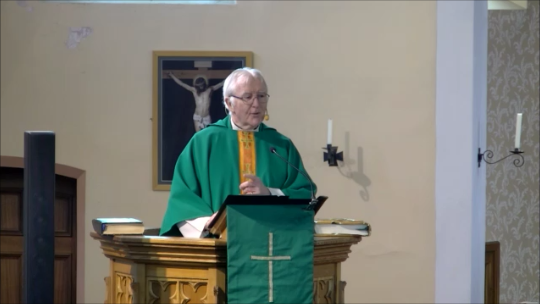
30.01.22 ~ 4th SUNDAY IN ORDINARY TIME
(To hear audio file ~ click here)
“Who the hell do you think you are?” is a phrase often used against someone who comes up with an unpopular opinion, and which forces them to appeal to a higher authority for why they’ve given it. So, in the first reading, Jeremiah has to justify himself, by affirming that it was God who ordered him to pronounce judgement against the people, hoping they get it, that he’s just the messenger. When somebody makes an accusation which makes for uncomfortable listening by those it’s aimed at, it’s natural for them to go on the attack, as the townsfolk of Nazareth did against Jesus. “This is Joseph’s son, surely? Who does he think he is?”
The way it’s done today, is to employ researchers to mine any information, scandals, skeletons in the cupboard etc, to discredit the messenger, so that it weakens or discredits his message. As you know, Pope Francis’ papacy has been marked throughout by his preaching of mercy and forgiveness, but his enemies refer back to his time as Jesuit Superior in Argentina, when he was less forgiving, a fact he has acknowledged and of which he is not proud. But that was then, and this is now. People can and do change, as he did, leading to his constant theme that love, mercy and forgiveness are not to be denied to anyone.What led Francis from being judgemental, to answering a question about homosexuality with the words “Who am I to judge?” was his understanding what St Paul means by ‘Love’.
This familiar passage is often used at weddings to try to express the emotional attachment the couple have for each other in a super strong way. But it’s really about the self-sacrifice and giving, that are necessary to live out the wedding vows they make to each other. The Greeks had four words to describe the different types of love: eros for sexual, philia for brotherly, storge for family and agape for unconditional love of others, enemies included, which is what Paul is describing here. Love is the greatest motivator we human beings have. If we truly love someone or something we are often prepared, as the late lamented Meatloaf sang, to do anything to prove it.
Last week St Paul talked about all of us being parts of the one Body of Christ, each with unique gifts and talents to offer for the common good. The problem is that they can be used grudgingly, automatically, or because we feel we have to, but, as Paul says, ‘without love it will do me no good whatever’. The same applies to our attitude to God. We all know Catholics, many in our own families, who say “You don’t have to go to Mass to be a Catholic”. But are they right? Yes, if they see it as an obligation. No, if they are motivated by love. You go to Mass because you want to. You go because you love God and, as with anyone you love, want to spend time with him. You go to express your gratitude toJesus who sacrificed everything for us, by doing what he asks of us, which is “Do this in memory of me”.
Do this in memory of me is not an unusual request or weird thing to understand. On Friday a mother came to Mass for her deceased daughter’s birthday, and afterwards the whole family went up to visit the grave and spend time there. They were doing it in memory of her, showing that they will never forget what she meant to them. People often sit at the graveside and talk to those they have lost, united in spirit. I do it all the time when I visit my mum and dad’s grave. It’s a perfectly natural thing to do, even though I don’t expect them to answer me back!Coming to Mass should never be out of duty, fear of going to Hell, habit, or any other reason except the love of God; to spend time in hispresence, and to keep Jesus’ memory alive, as he asked us to do, in a world which has largely forgotten him. It can be difficult to convince ourselves that Jesus is really and truly present here, because, as Paul again says, “Now we just see him as a dim reflection in a mirror, notface to face”. ‘Seeing’s believing’ as Doubting Thomas would say. But we all know what Jesus thought of that: ‘Blessed are those who believe without seeing’.
One of the greatest benefits of coming to Mass, is that we get fuelled up with God’s grace for the task of loving our neighbour during the week. We become the good soil Jesus talks about in the parable of the Sower, allowing the seed of the Word of God to take root in us, and produce its fruit, in whatever sphere of influence we live and move and have our being. We’re not talking about spectacular growth, like that amazing water lily in David Attenborough’s documentary on plants, which takes over the whole lake, by blocking all the other plants from the life-giving rays of the sun. We’re not in competition: quite the opposite. In the new church emerging after Covid, we are not looking for an overnight explosion of change, ordered from on high by the Vatican, but littleshoots of growth from all of us, and I’m very happy to say it is alreadyhappening in our parish. As a result of our recent Synod discussions, several people have stepped up with new ideas and initiatives, which you’ll soon hear about. So, what started in the first meeting as a general lament for what we’ve lost from the past, by the third, had moved on to positive ideas for our future, and a desire to keep the Synodal process going, with a quarterly meeting, in which everybody gets to have their say about the way ahead, with no danger whatsoever of anyone saying, “Who the hell do you think you are”?
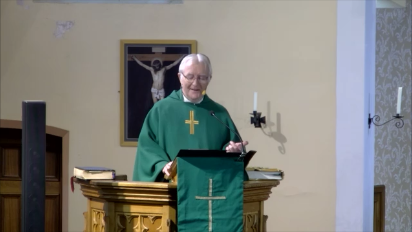
23.01.22 ~ 3rd SUNDAY IN ORDINARY TIME
(To hear audio file ~ click here)
The Synod Discussion meeting on Thursday was not as well attended as the first one, but still as lively. In fact it led me to a fairly sleepless night, due to a comment from one of lovely parishioners. Her grown-up children no longer go to Mass, and they lay the blame for not going firmly at the feet of the Church, because of its stance on same sex marriage, the paedophile scandals and unwelcoming priests. Fair enough, but what caused my lack of sleep, was her opinion that they were right. I thought, “Blimey, are they?” I can see where they’re coming from if their vision is limited to the Institutional Church. But that’s not the Church I know.
Most Institutions have the problem that the bigger they become, the further they get from their founding ideals, due to more administration, rules and management of structures. So, if you are not going to get involved until the Institution changes, you’re gonna have to wait a long time. Look at our voting system. How many years has the movement for proportional representation been waiting to change to a fairer way of choosing a Government than ‘First past the Post’? They’re still waiting!
Looking at the Church as an Institution, firstly, we have to acknowledge that the Magisterium is not man-made but divinely instituted. Peter and the apostles were given authority to teach in his name by Christ himself. “I give you the keys of the kingdom. Whosever sins you forgive they are forgiven; whosever sins you retain they are retained”. That power to bind and loose has been handed down to the bishops their successors, but it gives them no authority to teach something different from what Jesus taught, regardless of public opinion, or whatever changing fashions may be. Eg Jesus is quite clear that marriage can only be between one man and one woman. “A man must leave his parents and cling to his wife and the two become one flesh”. What the Bishops do have to do, however, is to keep their eyes on the signs of the times and be able to adapt his teaching without changing it. So, recently, without changing traditional teaching on chastity, the Church has allowed same-sex civil partnerships as a matter of justice, recognising that a same-sex partner should be entitled, like any other partner in a long-term relationship, to inherit what’s left when the other partner dies.
When they think of the Church as an Institution, some people have an image of grumpy old men, who have never married, and wouldn’t know one end of a saucepan from another, running the Church, hunkered down in the Vatican. It’s a fair one, and until now there was probably a lot of truth in that. But, as I said earlier, the Magisterium is a divine institution, which means the Holy Spirit runs the Church not old men in the Vatican, and Pope Francis is on a mission to get rid of those who still cling to clerical power. He is gradually replacing them with Bishops who have the smell of the sheep, ie live in the real world, and promoting lay men and women to positions of Authority. As for us at Parish level, the Synod is his chosen way of ensuring that everyone has a share in the process, very much based on the model of the Body of Christ Paul gives us in the second reading.
Getting back to the assertion that the Church itself is to blame for the defection of young and clever individuals, yes, it’s true that the “Church” has done awful things, often exercising worldly power like feudal Lords, rather than the Servant King, and, as we know, there have also been scandals. But that was then. This is now. We’ve got to stop looking back, being miserable about what happened in the past, and move on. After all, we’re not the only Institution with historic and recent failures, yet most people have not reacted by walking away from them, as they have from the Church.
Have people stopped watching the BBC because of how it let Jimmy Saville get away with sexually abusing hundreds of young people, or stopped donating to Stoke Mandeville Spinal Unit, because he was given his own keys, with access to paralysed patients unable to fight him off? Have they made a vow never to buy a German car because of the Holocaust, or a Japanese camera because of what was done to our FEPOW? Have people given up on the Police because of its reported institutional racism? Do they no longer vote because of corrupt politicians, or take part in Armed Forces Day because of the massacre of hundreds of Innocent people at Amritsar by the British Army? Have they cancelled their Sky Sports Subscription because of Corrupt FIFA Officials? Have they withdrawn their shares from companies where Chief Execs get an annual bonus, which is more than a shop-floor worker could earn in a lifetime? Probably not, yet they can still single out the Church as unworthy of their patronage. You could say that’s a back-handed compliment to the Church, because, clearly, higher standards are expected than from other Institutions. And, fair enough, it is tragic when those standards are dropped or, in some cases, lost altogether.
But guess what! The Church is made up of sinners and if people condemn it for being so, then, by all means, let them cast the first stone if, of course, they are without sin themselves. As you see from those examples, we don’t live in a perfect world, and we will never be a perfect church. That’s why Pope Francis describes it as a field hospital for the wounded. The Church most of us know and love, the real Church, is not a monolithic Institution but a family, the Body of Christ. Francis has called this Synod for every one of us to play our part in its healing, to contribute our accumulated wisdom and experience to turn things round, and become once again the Church Jesus always intended it to be.
And, don’t forget, there’s quite a lot of good stuff going on already. Catholic Social Teaching is renowned throughout the world, and borrowed from by Governments, because of the insights and solutions it offers to many of society’s major problems. It constantly reminds people of the importance of contributing to the Common Good, to solidarity, subsidiarity, human dignity, the sharing of the world’s resources and the care of our Common Home. We, the Church, are out there actively involved in the betterment of mankind, and putting the gospel into practice.
So, with regard to whether to belong to the church, there are two choices. To walk away, like walking away from a road accident unwilling to see what we can do to help. Or to stay and exercise our particular gifts for the common good, no matter how small we think our efforts are. Mother Theresa was once mocked by a journalist who said to her. “With so much poverty and deprivation in the world what you are doing is just a drop in the ocean” to which she replied, “Yes, but it’s a drop that wasn’t there before”. Every little helps! Saint Oscar Romero once said: “We plant a seed that will one day grow. We water seeds already planted, knowing that they hold future promise…We are prophets of a future not our own.” Who knows how much good our little contribution, as a member of the Body of Christ, united with all the other members, will make for the future of the new Church which is emerging after Covid?
In conclusion; you might ask “Why are you telling all this to us? We’re here!” Well, it could be that I might not, in every case, be preaching to the converted. It is simply to give you some ammo to help your discussions with those who have a very dim view of the Church, to see another side, and of course, to get it off my chest and help me to get a good night’s sleep!
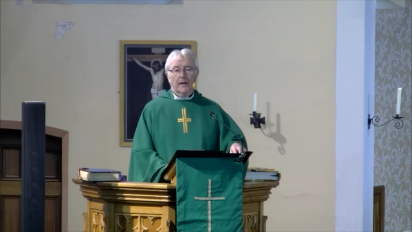
16.01.22 ~ 2nd SUNDAY IN ORDINARY TIME
(To hear audio file ~ click here)
There’s a lovely story of a young priest at the reception of a wedding he has just celebrated in a small Italian village. As the party gets bigger the family ask if they can extend onto the church patio. “Of course” he says. As it continues to grow they’re allowed to move into the parish garden, then eventually into the church itself, a good time had by all, until the Parish priest gets back. “Mama Mia! What are all these people doing partying in church?” “Well, you know Father, Jesus himself partied at a wedding”. “Yes, but not in front of the Blessed Sacrament!” (he’d obviously forgotten that Jesus is the Blessed Sacrament).
Today is Peace Sunday with the theme “Work and dialogue between generations”. At the Synod discussions on Thursday, a lot of time was devoted to the fact that vast numbers of the younger generation are missing from our churches, while the older generation feel at a loss to know why they don’t seem to have that feeling of belonging, which comes naturally to us. Some helpful suggestions were put forward, eg have a youth Mass once a month, introduce guitar hymns, make the liturgy more like the Castlerigg experience, more entertaining and less boring. The only trouble is no young people turned up to say what they thought, and, as you know, I’m a great believer in the maxim ‘Decisions about us, without us, are not for us’.
However, I don’t think the problem is primarily to do with liturgy, but with what people believe happens at Mass. Do all Catholics believe that Jesus is really and truly present in the Blessed Sacrament, that what they receive in Holy Communion is not a piece of bread, but the son of God himself, body, blood, soul and divinity, the God who keeps us in being and with whom we hope to spend eternity? If so, it doesn’t make sense to ignore him and fill your Sunday with alternate attractions? I have celebrated Mass on an upturned oil drum, a hostess trolley, in a cocktail bar, in a jungle clearing, and in many other situations where great liturgy was not possible, but the people came, because they knew Jesus was really and truly present in the host received at those Masses. We know he is also present in his Word, through the Holy Spirit, when a few of us are gathered in his name. In fact, he’s always with us but never more closely than in Holy Communion.
Going back to Jesus’ presence at Cana, I read an interesting article, asking what we today imagine he would be doing at the reception - sitting quietly to one side laughing at the trendy middle-aged men doing dad dancing, up on the dance floor himself strutting his stuff, propping up the bar telling jokes or grabbing the mike at the karaoke. I liked it. It made sense of one of the names he was given, Emmanuel, which means ‘God is with us’, not just on happy occasions like baptisms, weddings, rites of passage but in sad times too, as he was with Jean Sullivan on Friday as she lay dying. The other day I chanced to call in on someone to see how they were doing. As it happened the person was struggling with a painful memory and needed to talk to somebody. She said ‘God sent you to me today father’, and I said ‘Of course he did. That’s the way he works’
He's there too in the dialogue between the generations both in the angry hurts and the loving reconciliations that are part of family life. He also shows up globally when we see wells have run dry in Somalia and hear the whisper ‘they have no wine’, or when famine hits Ethiopia and we hear the words, ‘give them something to eat’. Jesus is the epitome of optimism. So it’s no wonder Mary says, “Do whatever he tells you”. She knows that in his hands the best is yet to come. The opposite of optimism is pessimism, a sort of helpless cynicism which says that nothing is ever going to get better so why bother trying? I have a friend of a certain age whose glass is always half empty. One of our other friends says of him, “Show him the light at the end of the tunnel, and he’ll soon put it out!” Maybe he’s forgotten what it’s like to be young. Our young people are full of optimism, still dare to dream and fabulous at facing up to injustice, eg Climate Change, but they also know older people have much wisdom and experience to pass on (as Shawn is finding out at Brenda’s craft club). Far better if we choose to live hope-filled lives together, young and old in friendship, strengthened in our faith by receiving the Body of Christ as one united family. At the end of the day, everyone is invited to the great wedding banquet of God’s kingdom, because that’s where we’ll find Jesus, at the heart of the party, rejoicing in human love, and renewing our delight in the goodness of life, and of each other.
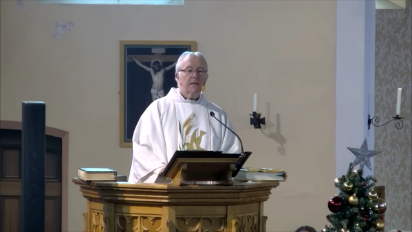
09.01.22 ~ FEAST OF THE BAPTISM OF THE LORD
(To hear audio file ~ click here)
On Wednesday evening, as you know, we met as a parish to discuss the future of St Edmund’s church building. There were no set procedures involved. Those who wanted to, threw in their own thoughts and everyone listened to what they had to say. There was a warm atmosphere, like you get with a group of friends who are trying to work out what is best for everyone, and thankfully we ended up with a consensus.
The reason I tell you this is because, for me, it was an example in microcosm of the kind of church Pope Francis wants to emerge from the Worldwide Synod he has called to take place in 2023. We all know that the Church emerging from the Covid crisis, is not going to be the same church most of us have known all our lives. To take just one example, we are running out of priests. But does that mean the Church is finished? Not at all. The Holy Spirit is clearly telling us something, and it’s for us to find out what it is.
Some people think the Synod will be a fruitless exercise and that things will be sorted out the Brian Clough way: “We talk about the dispute for about 20 minutes and then we decide I was right”. But Pope Francis sees things very differently. He wants to involve everyone. A Synod means walking the same road, walking together. When he set it up he said “It’s a mutual listening, in which everyone has something to learn; the Faithful, the College of Bishops, the Bishop of Rome, all listening to each other, and all listening to the Holy Spirit, in order to know what he is saying to the Church in the third millennium”. Did you notice the pecking order in that quote? He starts with the Laity, then the Bishops, then the Pope. That’s not the way it usually works in the Church. Francis is putting the Laity very firmly centre stage with the parish as the launchpad. It’s important to remember that it is the Catholics in the pew today, with their experience, problems and Catholic identity, who are the principal architects of tomorrow’s Church.
In today’s reading from Isaiah, the Israelites are promised that the glory of the Lord will be revealed. This is particularly relevant to today’s feast of The Baptism of the Lord, because here on the banks of the Jordan, a voice is heard from heaven – “You are my Son the beloved: my favour rests on you”. Jesus is the fulfilment of that prophecy. It’s a time of new beginnings. The Old Testament, (the old church you could say) is about to be transformed. God is doing something very new, and all will be invited by his Son to come on board.
This is a time for new beginnings for us too. Vat II was called by Pope John XXIII to bring the Church into the modern world, a work which was started with great enthusiasm and joy, but stymied over the years, relying on the fact that, no matter what happened in the world, the Church would always remain the same, strong, powerful, Mistress of all she surveys. But, as we have seen in recent years, that is no longer the case. Membership has declined even amongst the numbers who only come at Christmas.
So, how do we go about finding what the Holy Spirit is telling us? Pope Francis gives us three ways of doing this: Encounter, Listen, Discern. Encounter means taking time to look others in the eye and listen to what they have to say, to build rapport, to be sensitive to their questions and be enriched by the gifts and talents they have to offer. Listening means being aware of the concerns and hopes affecting us all as a people, a church and members of the human race, when faced with the challenges and changes the world is setting before us. Encounter and listening are not ends in themselves, otherwise things stay as they were before. Discernment means acting on what we have discovered from the other two for the greater good of all.
We are now at the Parish Discussion stage where we take the pulse of the parish, tap into feelings, gather opinions and harvest ideas. Bishop Paul says he wants us to confidently engage in a simple and prayerful dialogue, respectful of one another. There will be three sessions over the next three weeks. May I invite you all to come to the first one this Thursday from 7-8pm in the Green Hut. It would be good if you can have had a serious think about the questions given out today, but, as the Synod path is an open-ended process, bring along any other issues you would like to be included. I’ll finish with a note about participation which I hope will help us to build on the success of Wednesday’s meeting and point the way ahead for future discussions.
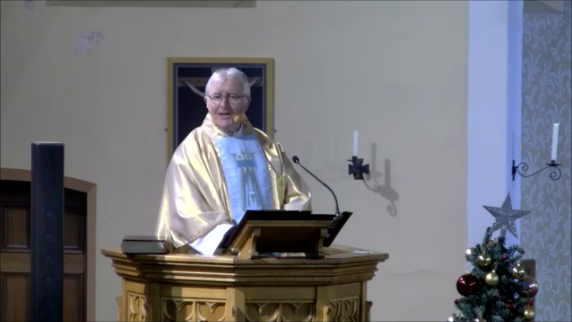
06.01.22 ~ FEAST OF THE EPIPHANY
(To hear audio file ~ click here)
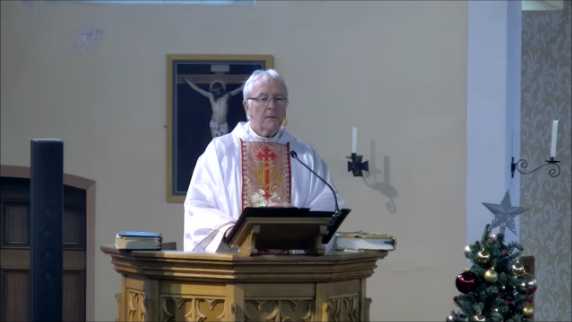
02.01.22 ~ 2nd SUNDAY OF CHRISTMAS
(To hear audio file ~ click here)
Looking back over the Pandemic, perhaps the toughest call for most people was being unable to give family or friends a hug or a cuddle. We remember pictures of elderly folk, often confused, wondering why their children won’t come into the care home, and their children in tears unable to explain. For them, and for others, living on their own, or self-isolating, it was a very lonely time. I think it taught us that food, shelter and warmth are not enough in themselves. Human beings need something more: the presence, time, love of others and the re-assurance that they are not forgotten. Gifts, letters and phone calls are good, but they can’t take the place of being together with someone.
In today’s first reading we see the world in a similar situation at the dawn of time. It is a poem in praise of Wisdom who is told to pitch her tent among God’s chosen people, to be there with them in their loneliness and isolation in the desert. This wisdom is not the fruit we pick up by learning from human experience, eg that it’s dangerous to skate on thin ice, but the word of God himself. I think it’s fair to say the Israelites never really got the full import of what that meant. They thought about wisdom more as the gift of the Law, which God gave them through Moses for harmonious living eg if we don’t steal, kill or lie about each other, we can all live in peace together.
St Paul however, in the second reading very much gets it, and gives thanks to God for the gift of his Son who is God’s wisdom personified. He also prays that God will give us wisdom so that we can perceive what was revealed and come to full knowledge of him. And what is revealed is that “In the beginning was the Word, and the Word was with God”. The Word, then, shares the divine life, which means that he too is Almighty, Creator, Lord of the universe and all then other things we attribute to God. As we saw earlier, the Jews saw the all-powerful God’s relationship with them as master to servant. Their part was simply to worship, honour and obey. In return they got food, shelter, warmth and protection but where was the love, the closeness of a child to its father?
It’s clear from what Paul writes that God had a plan from before the world was made, which is for us to be adopted in love as his sons and daughters. In the gospel that plan is revealed. “The Word was made flesh and lived among us”. The literal translation is that “He pitched his tent among us.” When Jesus, Son of God becomes human, he does actually live like a tent dweller, often on the move, of no fixed abode. “The Son of man has nowhere to lay his head”. John uses the word “Flesh” to underline the humility of what God was doing. He doesn’t say “He took the appearance of a human” but “He became man” ie truly human like you and me, able to be hurt, upset, let down by friends, vulnerable. Although he was in the world and the world did not know him, it doesn’t alter the fact that in him is the fullness of God. Suddenly we weren’t just getting messages and postcards from heaven, delivered by prophets and lawgivers anymore, but God himself had come to live among us.
Jesus’ lasting impact on history is manifold, but two major influences stand out. In a world where any hope of transforming sinful humanity was considered an illusion, he proved the opposite was possible through selfless love. Added to that, his victory over death gave the world the certainty of a common destiny for humankind, with the consequent belief that every person matters, because each of us is made in the image and likeness of God, made visible in the person of Jesus Christ.
In becoming Immanuel, ‘God is with us’, and sending us the gift of the Holy Spirit, he gives us the assurance that, even when we are feeling at our most isolated or lonely, he is with us all day, and every day, till the end of time.
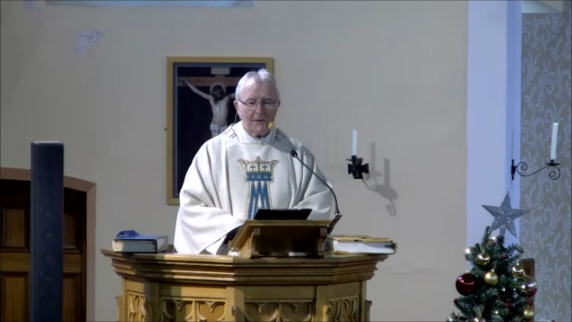
26.12.21 ~ SOLEMNITY OF THE HOLY FAMILY
(To hear audio file ~ click here)
A PASTORAL LETTER FROM THE BISHOP OF LANCASTER FOR THE SOLEMNITY OF THE HOLY FAMILY ~ 26.12.21
APPOINTED TO BE READ AT ALL PUBLIC MASSES IN ALL CHURCHES AND CHAPELS IN THE DIOCESE OF LANCASTER ON THE WEEKEND OF 26 DECEMBER 2021 (or shared in whatever way is possible).
My dear people,
Yesterday, in churches and homes, we began our celebration of Christ’s Nativity in Bethlehem. God has fulfilled His ancient promise to come and save us. How comforting and encouraging it is to know that Jesus comes as our Saviour.
Today, the first Sunday after Christmas Day, we keep the Feast of the Holy Family. They say it was Saint Francis of Assisi who introduced the tradition of building a crib to serve as a focus for devotion and instruction. It is a practice we can treasure and pass on to new generations.
We know that Mary’s pregnancy was a cause of deep initial concern to her, and that it even put at risk the relationship she had with Saint Joseph to whom she was betrothed. We know they must have spoken about the way forward, how to understand her pregnancy, and how to adjust their lives to this new life. We too can find it disturbing and inconvenient for our own plans when God enters us.
In today’s Gospel things have moved on considerably. Jesus is a boy on the threshold of adolescence, wanting to play His part in the world, but still under the care of His mother and step-father. Obviously, His time in Jerusalem has stirred something deep within Him. It has
been a pilgrimage and an adventure, bringing Him to a point where He is finding His public voice. His family should be proud of their boy. But, I smile when I see that even for the Holy Family things did not always go perfectly. The words of Mary reveal something of the panic
and fear she has gone through. Many parents unfortunately have been through experiences that did not have so fortunate an outcome. Mary’s heart would be traumatised again in lateryears as she saw her Son gradually drawing closer to the Cross. It is as though she is being schooled in suffering so that she might grow in trust.
The way God has chosen to come to us is remarkable. To be born as one of us is something astounding in itself; to live under the authority of those He came to save moves towards the incredulous. To comply obediently and willingly with the cultural norms of Jewish family life
begins to reveal to us the heart of the Father, entrusting His child to an unreliable world. This is something He still does. It tells me that God must still see enough good in us to entrust us with what is most dear to Him. It is a vote of confidence. In the face of all that is wrong, and all that could go wrong, He has not lost sight of the fundamental good that exists within creation and within us, made in His image and likeness.
The opening prayer speaks of how we want to imitate the Holy Family in practicing the virtues of family life, in the bonds of charity. That takes some learning. It also takes a decision. We aren’t being asked to reinvent the wheel, but we can be daunted from the outset, after all, those Christmas card scenes make it all look so simple! We can learn the art of keeping the Faith from older generations, and even different traditions. We must be grateful for so many who come to live in the UK from elsewhere and bring a strong example of Catholic family life. This comes at a time when family life in the UK generally is struggling. But perhaps that is not really new; perhaps it has always been a struggle.
The Holy Family is placed before us not with the intention of making life even more difficult, or to emphasise even more how far short of the line I am. One lesson it carries is to remind us of the value of family, yes, even yours! And before we begin with the ‘But . . . . . ’s we are shown that God simply uses what we can give Him, even when it appears to fall so far short of what is required. I recall Simon Peter’s words to Jesus after the miraculous catch of fish, ‘Leave me Lord, for I am a sinful man.’ It is not perfection Christ is looking for but an open heart and a welcome in. I recall the small boy sharing his five loaves and two fish, so little for the crowds, but it gave Our Blessed Lord something to get started with. He can do something good even with our families if we let Him.
I hold in prayer families throughout the Diocese, conscious that an immense amount of stress is being placed on them. Some appear to cope better than others, but we are not in competition to see whose is best. My heart goes out to families that are grieving or concerned for less able members. I am aware that some relationships have undoubtedly suffered, but you are not beyond the reach of Our Lord, He has not turned away from you. We think of so many families affected by warfare, famine, failing economies and of course lack of adequate healthcare during the pandemic. The problems are endless, and our help so little. The picture of the Holy Family is given to them too, so that even in their extreme need they may find something to give new heart, because ‘God is with them’.
As we move into the rich succession of Feasts and celebrations of Christmastide, do what you can to show that Christ is in your home. Simple things such as making sure there is a Crucifix and an image of the Madonna and child is all it might need. Your Faith may seem weak, but you have enough to welcome Christ in. Your family may seem scattered, dysfunctional or even just Weird(!), but it is enough to give Christ a place to work. He does not come to ‘catch-you-out’ but to unburden you and raise you up. That’s just what we all need as we prepare for the new year.
May we sense the closeness of our Blessed Lady, whose children we are, as we offer this prayer, perhaps by candlelight towards the evening of the day, within our own homes.
Kind mother of the Redeemer, who remain the open gate of heaven, and the Star of the Sea; help your falling people who want to rise, you who bore your holy Parent, while nature marvelled; a Virgin before and after, receiving that greeting from Gabriel’s mouth, have
mercy on us sinners.
With my blessing on all who hear or read this letter,

+ Paul Swarbrick
Bishop of Lancaster
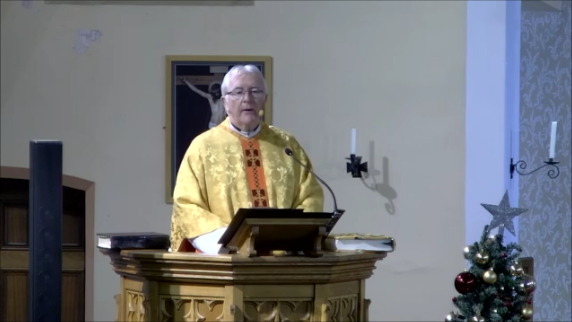
25.12.21 ~ THE NATIVITY OF OUR LORD
(To hear audio file ~ click here)
Apart from the ever-changing bulletins about new variants of Coronavirus, there have been very few news stories this week except, perhaps, for the record-breaking divorce settlement between the Ruler of Dubai and his ex-wife, which ended with her being awarded £550 million, in order to keep her and her children in the lifestyle they are accustomed to. And what a lifestyle! The children, both still at school, get an allowance of £10 million each to see them through the year. The judge even threw in an extra £5 million to buy a couple of horses for them.
If ever a story was needed to highlight the immeasurable gulf between rich and poor, or back the claim that 90% of the world’s wealth is owned by 10% of its population, this could be that story. Apparently, for the Sheik, £550 million is small change – he won’t miss it. What power, what influence such riches can buy. It’s the way of the world. Whether to a lesser or greater degree than the example I’ve given, there always has been, and probably always will be, fabulously rich people who live life on a completely different plane than the majority of mankind. At the other end of the scale, in a story that will never make the front pages of the world’s press, there have been, and always will be, people who live on less than one dollar a day, and others who have no money at all.
Into this world of such contrast was born a royal child, promised by the prophet Isaiah to the people of Israel as a Great Light to alleviate the darkness of their sorrow in exile. He would have the religious zeal of Moses, the bravery of David and the wisdom of Solomon all rolled into one. He would be Wonder Counsellor, Mighty God, Eternal Father, Prince of Peace, King of kings. Nobody would be able to compete in terms of the power and influence he would bring when he arrived, which would naturally be in glory and splendour, as befits one of untold riches and status. With all their hopes and dreams resting on this image of the Messiah, it’s little wonder that when Jesus turned out to be the exact opposite, so many of them rejected him.
As we saw from Jesus’ family tree at the beginning of Matthew’s gospel, last week, God often chose leaders of no renown or status, often poor or looked down on by the elite. Throughout the Bible there seems to be a fundamental option from God, for little and humble people, a classic example being the choice of lowly shepherds to be the first to hear the announcement of the birth of the Messiah. The sign of the joy they would see, a joy to be shared with everyone, was of a ‘baby wrapped in swaddling clothes and lying in a manger’ which must have had them scratching their heads. Surely, a saviour who is Christ the Lord, ie the anointed Messiah, should be in Herod’s palace, up the road in Jerusalem, surrounded by wealth and privilege. From the sign of the manger they learn what “Poverty in Person” is. Later, he himself would say “Foxes have holes, the birds of the air have nests, but the Son of Man has nowhere to lay his head”.
So, why did he forego all the trappings of riches and power, and opt for a low-profile entry into our history, and what does it mean for us? I doubt if many people envy the mega rich, but nor do they envy the ragged poor. Most of us are somewhere in the middle, people who have enough to live on, or at least to get by on, who will never know hunger, and will always have enough left over for other things. This should make us content with our lot and thankful for our good fortune. For some that is not enough, and huge amounts of energy and time are dedicated to the pursuit of riches, in spite of knowing you can’t take it with you!
If the humble birth of Christ teaches us anything, it is that real wealth lies in a person’s capacity for generosity especially to those less fortunate than ourselves. To show them compassion and give practical help is at the heart of Christianity, summed up in the two great commandments to love God and our neighbour. To the rich young man who asked Jesus what he must do to attain eternal life, he said, ‘Sell all you have, give it to the poor, then come follow me’. He couldn’t do that as he was extremely rich.
Luckily, most of us will never get to be that rich, so won’t be faced with such a difficult challenge, but we are rich in other ways. We are blessed with the gift of Faith – we know where we come from and where we are going, and we do understand the importance of generosity in all its forms, not just in giving money.
Christians don’t have a monopoly on generosity of course. As with last year, at the height of the pandemic, the response to our appeal, from people of all religions or none, for food and toys, has been overwhelming. Our store is like Aladdin’s cave, filled to the brim with presents which go out tonight. None of the families in need that we are aware of, in Fleetwood and throughout Wyre, will go without, this Christmas.
Generosity, of course, is not confined to Christmas. Throughout the year people are always giving me money for the Foodbank, and long may it continue, to show our practical help and compassion for those less fortunate than ourselves. Nor, as I said earlier, is generosity confined to giving money.
We belong to a wonderful parish family whose members comfort and support each other, especially when tragedy strikes, but also in every-day situations. For example, I got a text today asking would I bless some holy water, so that, when she goes to bless her own mother’s grave on Christmas day, she will visit the graves of other parishioners and bless theirs. On Wednesday, some of our choir went round to sing for a fellow member who is ill and can no longer attend church. I saw him today and he was deeply moved by it.
These things, like so many other examples I could give you of what goes on in the parish, are not spectacular, but they are generous. And from generosity given and received comes a sense of belonging to a family in which people feel valued and cared for, and, God knows, in this rather selfish world, it’s a joy many people would love to have. We would love them to have it too.
My prayer tonight, then, is that those of you who don’t join us very often, may think of the benefits and advantages of being here more often, with a real sense of belonging to a family who will support you in your own generous response to the gospel, as we all journey together, good times and bad, along the path of life the infant king has laid out for us.
May God bless you all, now and always.
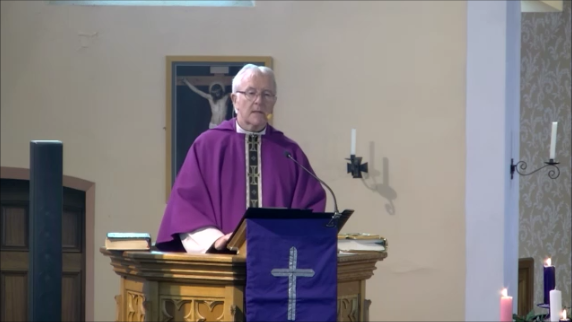
19.12.21 ~ 4th SUNDAY OF ADVENT
(To hear audio file ~ click here)
From time to time, I get letters and emails from far flung corners of the world, asking for help with information about family members baptized, married or buried from St Wulstan’s. They are from people researching their family history, a very popular pastime these days, as witnessed by the TV series, “Who do you think you are?” I haven’t watched many of them, but in the ones I have seen there has usually been the odd black sheep or colourful character no-one was expecting to find.
On Friday, in the first chapter of his gospel, we had the results of St Matthew’s research into Jesus’ family history, which very much backs up the prophet Micah’s words: “His origin goes back to the distant past”, and boy, what a past! Over 42 generations, divided into three parts, we see a ragbag of saints and sinners, some of whom did wicked things, like David, God’s Poster Boy, who arranged the murder of his lover’s husband and took her to be his own wife. I assure you, there are many more dubious characters along the way, to make you wonder what God was thinking of when he chose them.
The first group were the Patriarchs, starting with Abraham, Isaac and Jacob. Jacob lied to his father in order to steal his blessing. Surprisingly, it was not Joseph who saved Israel from starvation, who was chosen to be the father of David’s line, but Judah who had sold Joseph into slavery. The second group were the Kings. Under David and Solomon they enjoyed the high point of their history in the Promised Land, something the Patriarchs could only dream about. However, only two of the 14 kings were any good, so Israel was conquered and taken into exile in Babylon. We could call the third group the ‘Nondescripts’. Apart from Joseph and Mary at the very end of the list, nothing is written or known about them except their names. Yet it was these little people who brought about the restoration of their nation, brought to ruins by the rich and powerful. In each generation their upbeat story is one of growing expectation of the coming of the Messiah, which climaxes with John the Baptist when he proclaims that he has come.
What we take from this potted history of Jesus’ ancestry is that God doesn’t always chose the best, the most noble or saintly, but those he does chose, good or bad, achieve his purpose only by means of his grace. We see that in today’s scriptures when God chooses Mary, a lowly woman from the country, who will give birth to the Messiah in Bethlehem, described as the least of the clans of Judah.
The question arises, then, what does God’s way of operating mean? Well, the obvious answer is pure gospel, or good news. It’s good news for the poor, the marginalized, outcasts, and anyone who feels undervalued or ignored by the usual way people evaluate others. Jesus himself will operate in exactly the same way. In the light of how God works, St James teaches us to follow his lead, by avoiding the use of double standards in the way we treat people, fawning over the rich and ignoring the poor. It’s a message of hope and joy which has attracted many millions over the years to follow the Lord of the Dance, wherever we may be, and in whatever circumstances we find ourselves. Such was Elizabeth’s joy in greeting Mary in today’s gospel.
When the Ark of the Covenant was being taken up to Jerusalem, to be installed in the Holy of Holies, King David danced crazily before it all the way, consumed with joy that God had stayed faithful to his promises. Now, the infant John in Elizabeth’s womb, leaps for joy before Mary, the new Ark of the Covenant carrying the new Holy of Holies, while Elizabeth expresses her own joy that God’s promise has been fulfilled.
This choosing of the least expected, including sinners as well as saints, is a cause of great joy for everyone, because it shows that God never writes anyone off. The power of God shows itself in human weakness. We know this because the history of the Church is pretty much the same as the history of Israel. We’ve had our megastars, but we’ve also had 1st class hypocrites. Even today, we know that we too are a ragbag of saints and sinners, so no point trying to prove different, to people who can’t accept the church because it’s not perfect. Far from being a discouragement, knowing that we are as weak as everybody else is actually an encouragement, because it shows God’s grace can work in anyone, even people like us!
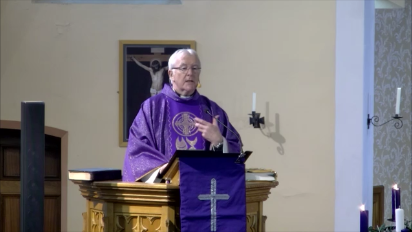
12.12.21 ~ 3rd SUNDAY OF ADVENT
(To hear audio file ~ click here)
On Wednesday a group of us went to a mini retreat, given by Donna Worthington, on Contemplative Christianity. It was based on the spirituality of the Desert Fathers and Mothers in the early days of the church. For the first three centuries they took refuge there from Roman persecution as outlaws for the Faith, but after Constantine ended persecution and made Christianity the State Religion, they were admitted back into Society. Life became very easy, and for some almost meaningless. They felt Christianity had lost its cutting edge to nominalists, believers in name only. This led to a huge move back to the desert to rediscover the ‘otherness’ of Christianity which makes it so precious and worthwhile having. The Retreat started with a drama set in a desert cave, performed by Donna herself with clever use of lighting to reflect the changing moods of the occupier, as various crises and changes in her life came and went. From time to time there would be a hint of a mysterious man in rags in the background. Could he be the answer? Could he be the one to give her what she needed to return to face the world and deal with the ordinary events of life?
Although the retreat was meant to take place before Covid, by a happy coincidence the timing was perfect for today’s scriptures, which are all about joy. “Gaudete” or “Rejoice” Sunday comes at a time when people all over the world are sending cards wishing each other a happy Christmas. In the secular world it’s part of ‘The season to be jolly’ which advertisers guarantee we will be, if we shop with them. Never mind all the stressing over what presents to buy, queueing for hours at the checkout, explaining to little Johnny that if he doesn’t stop whinging Santa will not be stopping at No 47, and all while listening to some lunatic singing “I wish it could be Christmas every day-y-y”. It does seem strange that we are encouraged to go full pelt, no expense spared, to be jolly for a particular season. What about the rest of the year? St Paul says he wants us to be happy always. “I repeat, what I want is your happiness”.
But what kind of happiness? What does he mean? Well, back to the desert. Before starting his public life, John the Baptist had spent many years there, living an ascetical life – hardly the best qualified person to talk about joy, you might think. For him the desert was a period of purification. He experienced temptation, isolation and loneliness, but also the joy of God’s shadowy presence always in the background, which enabled him to be ready, when the time came, to emerge from the desert resolute, and prepared for whatever lay ahead. Happiness for him was the peace of mind which enables you to deal with whatever life throws at you, the inner contentment of knowing you’re doing the right thing.
So, when the people ask him “What must we do?” John’s answer is not a quick fix or promise of the instant gratification you see on a child’s face when they open their presents. It’s not about excitedly waiting for the Messiah to sort everything out when he comes, extracting themselves from reality, but how to prepare for his coming in the day-to-day conduct of their ordinary lives. They have to get stuck in to the hurly burly of normal life and experience, each according to their particular circumstances “Tax collectors exact no more than your due! Soldiers no intimidation!” In a nutshell, preparing to welcome Christ is about the simple joy of loving people and being loved in return, not demanding more of others while giving less of yourself. This can be hard to do if we’re going through a bad patch, wondering where our life’s going and how we will cope, which is a sort of desert experience. But, as we’ve seen from John and the Desert Fathers, the desert is where God is often to be found. Even in our darkest times, the shadowy presence of the Holy Spirit is always there to call on, as Jesus promised he would be, to ease our troubled minds. That’s the kind of happiness and joy Paul wants us to have: inner peace which is for all seasons, not just for special times of the year.
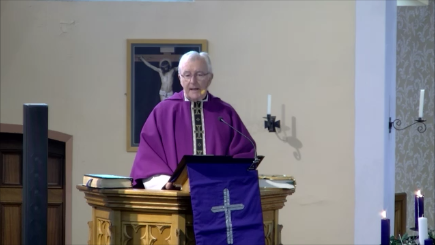
05.12.21 ~ 2nd SUNDAY OF ADVENT
(To hear audio file ~ click here)
Apart from sport and wildlife documentaries, my favourite TV is real life drama. Just recently I have been watching “Impeachment” which is the story of President Bill Clinton’s affair with Monica Lewinsky. Whatever you think of the rights and wrongs of the case, the fact is that he had all the big guns he needed to enable him to shrug it off and carry on, but for Monica it was the end of her career. Both were ridiculed in the media and lampooned on talk shows. For somebody in public life that’s fairly normal, so they deal with it, but for an unknown, suddenly thrust into the spotlight, it can be devastatingly cruel – and it was. One sketch in particular, portrayed her as a starry-eyed, overweight ingenue, willing to do anything for her Svengali.
Sketches like that, and similar stuff put on social media, are a good example of the kind of things people sometimes do to each other, without counting the cost of the effect on the victim. It’s a kind of inadvertent cruelty, often disguised as humour or banter, as in the recent England Cricket racism affair, which stems from an inability to empathise with the feelings of those being targeted. Nobody likes being humiliated. It’s cruel.
In Jesus’ time the world was very cruel. In the gospel Luke puts everything in very precise historical context, to show us that the Incarnation was true; that it took place at a specific time and in a specific country. We are given the names of the main players, their geographical locations, and the dates they were around. All of them have power which they exercise with varying degrees of cruelty. The Emperor Tiberius was a sexually depraved monster. Herod Antipas ordered the death of John the Baptist. He and his brother Philip were sons of Herod the Great who slaughtered babies in Bethlehem. Annas and Caiaphas helped secure the crucifixion of Jesus, and Pontius Pilate condemned him to death, even though he believed him to be innocent of all charges. This was the so-called Pax Romana, under which everyone was forced to live – effective but brutal.
Into this very unforgiving and merciless world, the word of God came to John, son of Zechariah, in the wilderness. Before John, there had been a long silence from God, during which the people had lost hope, and resigned themselves to life under foreign domination, just as their enslaved forefathers in Egypt had done, until Moses appeared. In contrast to the main players I mentioned earlier, John is a nobody, a voice crying in the wilderness, a person of no repute or influence, and yet he becomes the bridge between all that has been
promised in the Old Testament, and all that will be fulfilled and surpassed in the New. His task is to prepare the world for the advent of the Messiah, who will inaugurate an age of mercy and salvation, the very opposite of cruelty. With John, a new liberation from slavery begins, slavery from sin, the cause of cruelty. So, it is no surprise that he starts his ministry by calling everyone to repent and have their sins forgiven.
As you can imagine, for God’s people, John was a breath of fresh air. No wonder they got excited and flocked to the river. They were responding to the call from the prophet Baruch “Jerusalem, take off your dress of sorrow and distress, put on the beauty and glory of God for ever. See your sons returning, jubilant that God has remembered them, and brings them back to you, like royal princes carried back in glory”. Those words remind me of those fabulous pictures of Nelson Mandela walking free from prison after 23 years, with thousands of people surrounding him in jubilation, full of the hope he would bring for their future.
Powerful men are supposed to be the stuff of which history is made, yet theirs is a very brief passage through the limelight. We’d probably never have heard of those men in the gospel had it not been for what they did to John and Jesus. All despotic leaders who keep their people enslaved, eventually wither away like grass in the field, and many politicians are undone by corruption, but while they are in power it takes a lot of courage to stand up to them. But here’s the thing. You don’t have to be powerful to change the world. However, you do
have to be courageous. Like John the Baptist, we have to speak truth to the powerful. For example, every time there’s another move against the life of unborn children, I write to our MP to vote against it. She never does, but I write anyway. Perhaps one day she will. The same goes for any injustice we’re aware of. We should always make our voice heard. Remember, powerful people do not guide the overall purpose of life. They are here today, gone tomorrow, whereas we serve the unchangeable, all powerful, living God, the beginning and end of all things. He it is whose word inspired John the Baptist to prepare the way for his Son, who is our Way, Truth and Life. Through his Holy Spirit he is forever with us to guide, inspire and protect and to him, one day, all men, no matter how great they may be, or think they are, will be accountable.
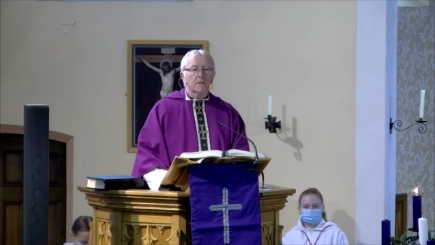
28.11.21 ~ 1st SUNDAY OF ADVENT
(To hear audio file ~ click here)

A PASTORAL LETTER FROM THE BISHOP OF LANCASTER For the First Sunday of Advent 2021
APPOINTED TO BE READ AT ALL PUBLIC MASSES IN ALL CHURCHES AND CHAPELS IN THE DIOCESE OF LANCASTER ON THE WEEKEND OF November 27/28 2021
(or shared in whatever way is possible).
My dear people, Many worthy matters will be competing for your attention in these days, matters ranging from the personal to the global. I address you as my flock, and ask for your attention as we move into the shortest days of what has been for many another difficult year. On this first Sunday of Advent there are matters of Faith that claim a priority on our time not only so that we celebrate Christmas as we ought, but also if we are to be found ready when the Lord comes.
We are moving into the darkest time of the year, but Christ is our unfailing Light. We look back over the many events of 2021 and see that Christ has been our constant companion. We plan as best and as wisely as we can for the year ahead, knowing that Christ’s plan is there for us. At times, our plans, even our best plans, must give way to His which is so much better. He will be our way, our guide and our loyal companion.
Today’s Gospel shows us some disturbing scenes that we would all prefer to avoid, but it does not take much effort to realise that, for all its beauty and blessings, life will always have unwelcome surprises. Some people seem more fortunate than others, leading charmed lives, but the uncertainties ahead of us can so easily level things out! There is no room for complacency. However, there is plenty of room for greater trust in Him who will come with mercy to judge the living and the dead, and, please God, call us into that place He has prepared for us from the beginning of time. That is what God wants. That is where He longs for us to be. If it was not so, He would not have sent His Son into the world.
So, let us remind ourselves that Advent is above all a season of joyful hope. It is similar to, but different from, Lent, which carries a more penitential tone. No doubt you have seen how many around us have already put up their decorations and lights. No Advent for them! ‘Let’s get on with it!’ they seem to be saying. But, no; we wait. Before we can ‘get on with it’ we take time to consider what exactly it is we want to ‘get on’ with. That will let us know how best to prepare ourselves as well as our homes, schools and work-places.
The point I want to remind us of is that the God we worship has loved us so much that He sent His only Son to be born into this life to save us from sin. We are familiar with the stories of creation, and with the tragedy of our first parents being cast out of paradise because of their betrayal. But even there, God was merciful: When they were removed from the garden they were allowed to keep their souls, their longing for God and their hope of one day being welcomed back. Deep within each of us there is that memory of the garden; we know this life is not all there is.
The life of the disciple of Jesus must be different from the lives of those who do not know Him or choose to follow Him. If this is not the case, why did Our Lord spend so much time teaching? Why did He interrupt the routine of people’s lives, calling them away from work and home to listen to Him? Why did He send them out into the world with His mission if it did not hold a treasure that would bring new hearts to all who welcomed it?
Of course, there is the temptation that we think that different makes us better than others. That way lies pride and arrogance. It will be for the Lord alone to decide who is welcomed home. We are to be different because we love one another as He has loved us. We are to strive to be holy because the Lord our God is Holy. A simple understanding of holiness is to be different because the Lord our God is different. We must strive to be different as He is.
Some practical matters. Make a crib the centre of your home. Get it ready over these coming weeks. What an excellent work it would be for our school children to make simple cribs to be given out to homes across our parishes, especially to the housebound. (They could be cut out and coloured, or constructed out of plasticine or whatever is to hand) Families could work with the younger members to make them at home, adding to them and improving them each year.
Make Holy Mass the heart of your Christmas celebration, and I would like to see more people choosing to go on Christmas day as well as Midnight. I fear that COVID has made us lazier Catholics in that it can be more convenient to ‘go to Mass’ online. For some this is a necessity; others may be using it as an excuse not to dare to return to our parishes. Perhaps it is becoming an easier option. Our Lord deserves better than that after all He has done for us.
I fear I may be speaking too late for some of you . . . . . wait before you put up your decorations! And don’t be in a hurry to take them down! Christmastide can be celebrated up to the Feast of Candlemas (2nd February). And if people ask why you still have your decorations or cards up it gives you a good opportunity to tell them.
Remember the poor. Find some way of reaching out to those far less fortunate – and there are plenty of them – who see themselves as lost causes.
Confession. Another fear I have is that this wonderful Sacrament is becoming even more neglected. Bother your priests to find some way of enabling individual celebrations of Confession. It is there for our good. As well as forgiveness remember that it brings healing. The simplest of prayers need to be rediscovered, especially the Rosary, and Mary’s prayer, the Magnificat.
In so many ways you may appear out of step with those around you, offering a different way. That is good! Don’t be put off. The world needs to see that difference. Saving the planet begins with the work of saving our souls. Unless that happens any progress will be short-lived.
If we are to be ready for Christmas we must prepare to refresh our Faith. Like Mary, we must prepare ourselves to let Christ be conceived in us, be formed in us. We must give Him a place to grow and to be born, to be welcomed and to be known and loved just as Mary did. He comes to take away the sins of the world, to share our life for a time so that we might share His for eternity.
With my blessing on all who hear or read this letter, and particularly those who are in the greatest need at this time,

Rt Rev Paul Swarbrick
Bishop of Lancaster
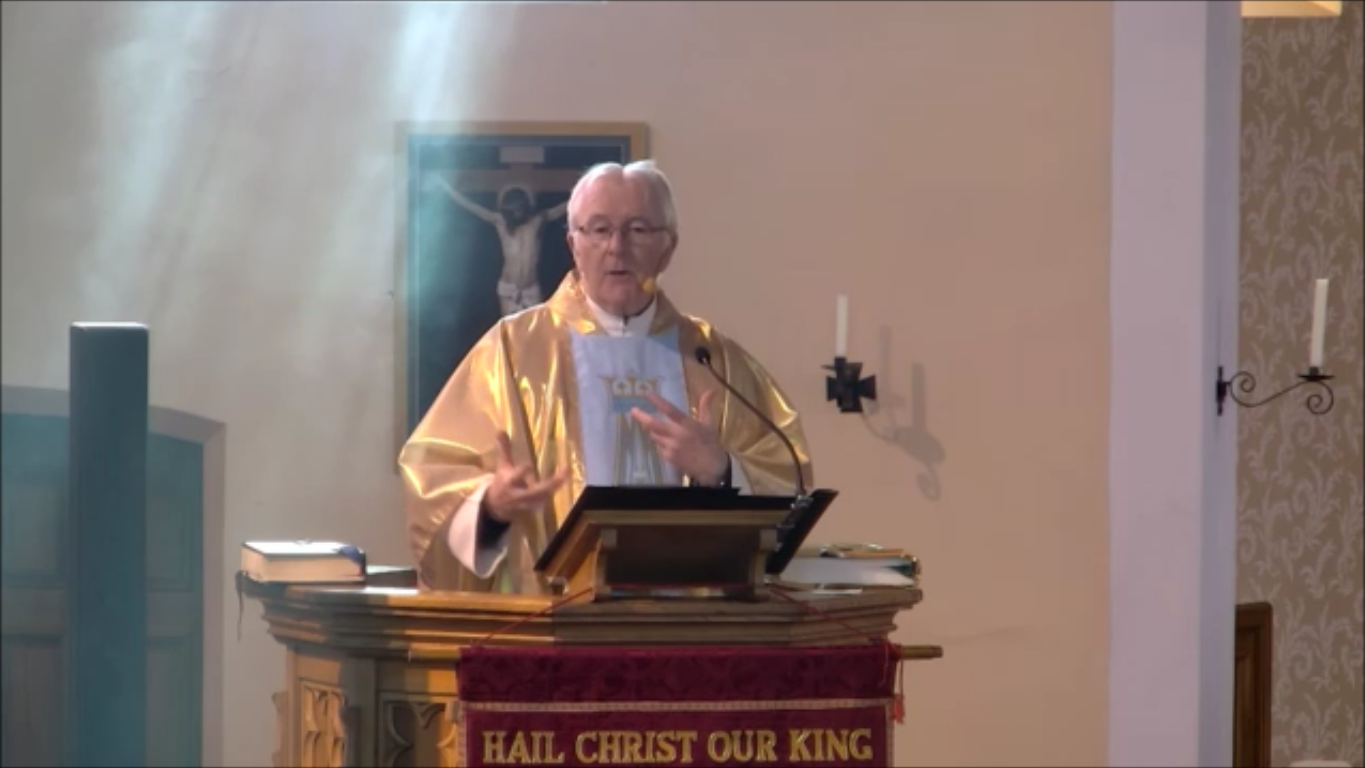
21.11.21 ~ FEAST OF CHRIST THE KING
(To hear audio file ~ click here)
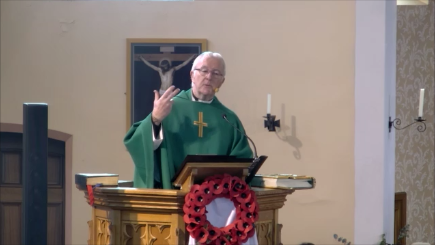
14.11.21 ~ 33rd SUNDAY IN ORDINARY TIME
(To hear audio file ~ click here)
On Thursday I was interviewed by Professor Linda Woodhead, a well-known leading sociologist, as part of a wide consultation on various aspects of life here in Fleetwood. There were five questions, the last one being, “If you had the opportunity to ask any question you like from an established and acknowledged person of wisdom, what would it be?” I had to think for a bit but then asked “How come that after the War, when we were on our knees economically, and rationing was in force, everything ran smoothly? We had free milk at school, a bus to take us there, plenty of Police walking the beat, well equipped Armed Forces and an NHS not strapped for cash. Now that we are one of the wealthiest nations in the world, little runs smoothly, and going to food banks is a way of life for many people. Then I said, “You’re a very wise person. What’s the answer?” One of her thoughts was that institutions, as they progress and get bigger, tend to concentrate on their infrastructure, and lose sight of their purpose. So, eg, in many professions, money that could pay to get much-needed boots on the ground, so to speak, is often spent on bigger and shinier admin offices.
This idea of losing sight of what is essential, is very much reflected in today’s scriptures in the context of what the purpose of our life is. Always at this time of the year, they deal with the second coming of Christ, often referred to as the end of the world, or the day of reckoning. At first sight, that looks like a pretty scary thing to contemplate. Daniel paints a picture of “A time of great distress, unparalleled since nations first came into existence, when some will awake to everlasting life and others to everlasting disgrace”. In the gospel Our Lord echoes his prophesy, leaving no doubt whatsoever, that there will come a great and terrible day, although no-one knows when that will be.
Because no-one knows when that will be, it’s very easy to think it never will, and so take our eyes off the ball. We live in a fast-moving, ever-changing world, often caught up in whatever is trending and, unintentionally perhaps, put eternal life on the back burner. This is not a new phenomenon. In the years 80-50 BC, many Jews living in the pagan world of Greek culture, with its pantheon of gods and idols, were quick to embrace what they saw as a more sophisticated and materially enriching life and so forgot the God who made them. That’s when and why the Book of Wisdom was written: not to condemn them for enjoying Greek culture, but to help them adapt in such a way that they could enjoy its benefits, without turning their back on God. In other words, to keep their eyes on the ball.
As I said earlier, talk of a time of great distress suddenly appearing out of the blue can be pretty scary, but that’s not it’s primary purpose. When Jesus talks of the sun being darkened and the moon losing its brightness, only for the day to be lit up by the coming of the son of Man, I wonder if he’s thinking of the day of his own death when the sky will turn black, only to be lit up three days later by the glory of the resurrection, and what that will mean for his followers. Don’t forget, he’s talking to people who believe that death is, literally, the end of the world for them, so he needs to give them hope that death is not the final arbiter. Its darkness will be overcome for all who put their faith in him. But he also knows eternal life is a gift easily lost. So, to concentrate our minds, he uses shocking images, as he often did, to shake us from our complacency, and encourage us to examine our priorities in life. If, instead of reacting positively to the signs of the times, eg climate change, we spend all our energy on building a monument to ourselves, we could be in for a rude awakening, and it could all happen in an instant. We could not only lose everything we have laboured for and built, but eternal life too. “What does it profit a man if he gains the whole world, yet loses his soul?”
Far from being meant to terrify us, today’s scriptures help, by reminding us that all the lovely things God has made - stars, sun, beautiful landscapes - will pale into insignificance when Christ comes again. So, it makes sense to stay focused on him at all times, enjoying things for what they are, but at the same time, being perfectly happy to drop everything when he calls us home.
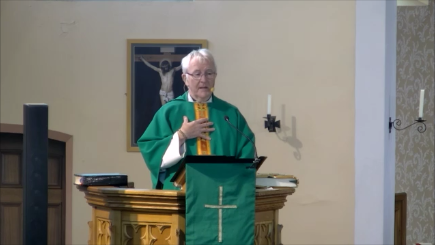
07.11.21 ~ 32nd SUNDAY IN ORDINARY TIME
(To hear audio file ~ click here)
There’s a lovely story of a man out walking in a remote area, who stumbles and falls off a huge cliff. Luckily, he manages to grab an overhanging branch. With no-one in sight to recue him, he cries out to God to save him. Amazingly, he hears a deep voice saying, “Let go of the branch. I will catch you”. “Who is that?” he shouts. “This is God. I heard your cry and I will save you, so let go of the branch”. The man thinks for a bit and then shouts back ”Is there anyone else up there?” In the story God is demanding total trust like that demanded of the poor widow of Sidon, when Elijah asked her to make a cake for him with the last handful of flour she had to live on. God will provide he promised. It's interesting that the miracle happened to a pagan woman in a pagan land, something that Jesus would recall when trying to show that salvation is meant for everyone, not just the chosen people.
Another widow features prominently in today’s gospel. She is in the same desperate straits as the lady in Sidon, but she also gives away all she had to live on, trusting, no doubt, in God to provide. Without a man, widows were dependent on other male relatives, if they had any, and in some circumstances would have been seen as just another mouth to feed. There was no such thing as an independent woman in those times. That’s why the early Church, as we see in the Acts of the Apostles, took very seriously its obligation to support widows. Having said all this, it’s quite ironic that these two widows, both with virtually nothing to give, show us what true generosity is.
In today’s gospel, Jesus contrasts their simple generosity with the ostentation of the Scribes and Pharisees. Why did they feel the need to show off? What can have happened to these good men whose vocation, under God, was to ensure justice and fairness for all? Now, they want to be greeted obsequiously in the streets, take the front seats in the synagogue and the place of honour at banquets. Could it be that, over the years, they had got so used to people’s respect for their high office in God’s service, that they misappropriated it to themselves? Similar things happened in the Army. Some Officers forgot that they were being saluted, not for who they were, but because they held the Queen’s Commission. In the Church too, we’ve had Prince Bishops and cardinals rejoicing in being addressed as Your Eminence, Your Grace, My Lord etc. Such clerical vanity does not impress Pope Francis, who is bent on bringing us back to being a much humbler Church.
The self-imposed status of the Pharisees had practical implications. As acknowledged experts in law it’s possible that they were charged with acting on behalf of widows, in regard to their deceased husband’s estate, prompting Our Lord’s accusation of swallowing widows’ property, while making a show of lengthy prayers. The word he uses for them on other occasions is Hypocrite. It reminded me of the time, as a newly ordained priest, I was filling in for the prison Chaplain in Preston. At Mass a young prisoner, with a very refined accent and perfect diction, read beautifully, and prayed throughout. I later remarked to the Chaplain what a nice bloke he was and asked what he was in for. “That Charmer” he said, “is a professional conman. He's doing five years for selling false insurance to elderly people and robbing them of their savings”. He certainly would have taken me in!
Some people think we’re hypocrites because we come to church, as if we’re here just to impress. I’m happy to say that in my experience very few people come to church to impress. Most of us come to Mass firstly to give, and what we give is ourselves. The gift that is offered on the altar, with the bread and wine, is our life of the past seven days. The successes we offer with joy, the failures we ask forgiveness for. We leave Mass with a blessing to love and serve the Lord in all he wants us to do for him and our neighbour in the week to come. That is not hypocrisy. Like the two widows we come before God not with a show of ostentatious piety, but in humble thanks for all our blessings, and in total trust that in handing our lives, with all its twists and turns, into his care, God will provide.
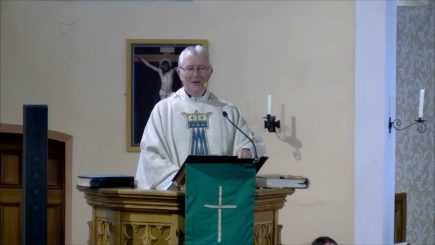
31.10.21 ~ FEAST OF ALL SAINTS
(To hear audio file ~ click here)
Good morning, my fellow saints! Who thinks he/she is not a saint? Why not? Think of all the good you do and the bad things you avoid, as mentioned in last week’s anonymous letter. Add to that, we come here every week to confess our sins and ask forgiveness, and with God’s grace, to do our best. Fair enough, one big thing the letter said we were missing was making disciples, but we’re working on that! St Paul often addressed the early Christians as saints, so let’s look at what makes a saint.
At Bible share on Thursday we began the book of Tobit. Of all the people who ever walked this earth, and worshipped God with his life, doing everything the law required, Tobit was up there with the best. Even after being deported to Assyria, working in the King’s household, surrounded by pagan idols and culture, he continued to honour God unreservedly. This put him in great danger. Although it was forbidden, he began to go out secretly at night to bury Jews killed by Sennacherib, rather than leave them to be scavenged by wild animals. Even his fellow Jews mocked him for doing it, saying he must have a death wish. But for him, duty to God came first. Tobit’s story reminded me of Sir David Amess who also served in public life, as a brilliant MP, but never bowed to the will of the majority on Right to Life matters, for which he was greatly respected. He remained true to the gospel of life and was tragically murdered by someone who thinks it’s ok to kill innocent people in God’s name. Like Tobit, Sir David was a saint, fully engaged as a citizen of the world, but always aware that as our time here is a mere pinprick, when viewed in the light of eternity, it’s a good idea to keep our main focus on God. As St Thomas More said on the scaffold, “I die the king’s good servant, but God’s first”.
Being holy is not so much about making great resolutions, which human weakness will probably blow apart, but having the knack of being at ease with God, trusting in his love, trying, with his help, to live up to the ideals Jesus sets out in the Beatitudes. We think of saints as superstars, exempt from ordinary faults and failings, but they’re not. If you read the lives of some of them, you soon see that bad character faults were not always overcome, nor did their passion for what they were doing for God, allow them to suffer fools gladly. Not very Christlike, you might think, yet, through the grace of God, they and their gifts were used fruitfully in the service of the gospel. They were just ordinary people like us, trying their best to reply to the love our Father lavishes on his children, in spite of their sins. The image of a vast multitude shows that sainthood is not just for the chosen few, but open to all, even little old you and me. St John Vianney once said to his parishioners, “We should all arrive at the gates of heaven together, in procession, with the parish priest at the head!”
The Beatitudes are the first proclamation of the Good News, although it doesn’t feel like it when you read things like “Blessed are those persecuted in the cause of right, or when people abuse you, and speak all kinds of calumny against you on my account”. But they are good news because they make very clear the approach to life God wants us to aspire to. They give us hope of what can be. If we manage even some of them, it shows that God’s blessing is working in us. As well as honouring the saints already in heaven, the feast of All Saints is also the celebration of what we, a mixture of saint and sinner, are in the process of becoming, the feast of the possible saint ie you and me. When St John wrote the Apocalypse for the early Christians, he made it very clear that in this world there is a conflict between the kingdom of God and Satan. In order to win they had to be holy in the way Jesus was holy, centered on God not the world. As with Tobit, this meant great danger, and as we saw with the Jews who mocked Tobit, they would be rejected by the world, and that would result in martyrdom for many of them under Roman persecution. But they did it, and so can we if we allow the Holy Spirit to keep us focused on the kingdom. If we do all we can to stay true to the gospel of life in spite of disappointments, the betrayal of friends, suffering for doing what we know is the right thing, missing out on promotion because of our principles, etc, we can take great consolation from Our Lord’s last words in today’s gospel “Rejoice and be glad, for your reward will be great in heaven”
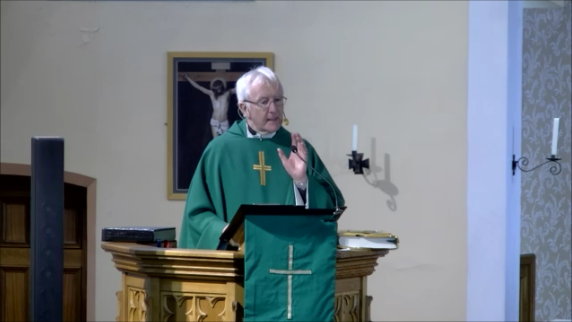
24.10.21 ~ 30th SUNDAY IN ORDINARY TIME
(To hear audio file ~ click here)
Last week, you may remember, the gospel was about the apostles, particularly James and John, jockeying for key positions in the kingdom Jesus was about to inaugurate. This week, the large crowd which left Jericho to go to Jerusalem with him for the Passover, seems to have the same idea as the apostles, that something spectacular was going to happen, and wanted to be part of it. They’d seen this new young Rabbi stir up a hornet’s nest with his teaching and miracles, and felt the old order was rapidly changing. No doubt they would have helped to organize his triumphal entry on Palm Sunday, looking forward to him taking over the reins of power.
Along the way there would have been lots of beggars, hoping to cash in on the size of the crowd. Many would have been submissive, quiet, like some we see today with a tin and a bit of card saying, “Hungry. Please help.” Bartimeus was not one of them. As soon as he heard it was Jesus of Nazareth, he began to roar until he made himself heard. With all the desperation of a drowning man, he understands immediately that he has one chance to change his life, and that if he misses it, he’ll never get another. The crowds tell him to shut up and scold him for daring to approach Jesus. As a blind person he’s obviously a sinner, not worthy, but he just shouts all the louder. I’m sure there would have been many other people calling out to Jesus for help, but it’s what Bartimeus shouts that could well be the reason he stops and calls him over. He shouts ‘Son of David’, only the second person in the gospels, after Peter, to recognize Jesus as the Messiah. Strange that no-one else recognizes who he is, considering that, unlike Bartimeus, they will have seen the miracles Jesus did.
What’s interesting about this encounter is that Jesus asks Bartimeus what he wants him to do for him, as if it wasn’t obvious. He has to state what is lacking in his life. It’s almost as if Jesus is challenging not only his faith but what he will do with the gift of sight if he restores it to him. What was he like before he became blind? Was he a man who never saw or noticed other people’s needs? If he is cured will he change, will it bring him closer to God or will he live just for himself? Thankfully, Bartimeus was the real deal. He threw off his cloak, perhaps his only possession, and followed Jesus along the road, leaving behind his old life. His faith had saved him. Just a few days later, the very crowd who scolded him would adopt his acclaim of Jesus as the Messiah, when they sang out “Hosanna to the Son of David” on Palm Sunday.
“What is it you want me to do for you?” is a question most of us can relate to. We all have weaknesses which we need to expose humbly to Christ, and ask his help for, in a specific way, as Bartimeus had to. We also have many gifts to offer in spite of those weaknesses, but may need his help to open our eyes, as to how to use them in God’s service. Many of us were moved by the anonymous letter from a parishioner I read out after Mass last week. I shared it with a group of priests on line, and they all asked for a copy. It put into writing what many of us feel, about failing to take the good news into the world, where it is greatly needed, staying in our comfort zone, keeping Jesus to ourselves instead of sharing him with others. We all know the Church doesn’t exist for its members, but to make disciples. Why does it sometimes take an illness, or near death experience, to get me started on all the good I’d always meant to do? To use that well known cliché, life is not a rehearsal. So, if you want to do something beautiful for God, do it now. Don’t keep putting it off until you are not able to. Ask God to open our eyes to the opportunities to be salt to the earth and light to the world.
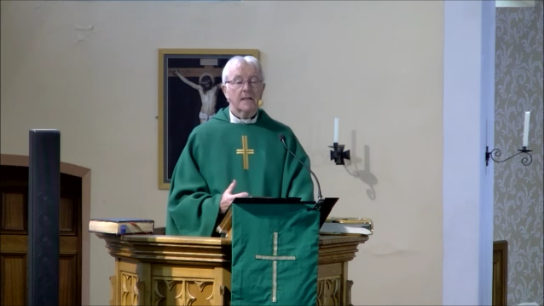
17.10.21 ~ 29th SUNDAY IN ORDINARY TIME
(To hear audio file ~ click here)
A PASTORAL LETTER FROM THE BISHOP OF LANCASTER FOR OUR SYNODAL JOURNEY
APPOINTED TO BE READ AT ALL PUBLIC MASSES IN ALL CHURCHES AND CHAPELS IN THE DIOCESE
OF LANCASTER ON THE WEEKEND OF 16/17 OCTOBER 2021 (or shared in whatever way is possible).
My dear People, Some of you may be aware that the Holy Father, Pope Francis, has called the whole Church to take part in a ‘synodal journey’; I suspect that many of you may not be aware of this, and that several of you are not particularly interested, and that the majority will be asking what it is anyway!
At heart, a synod is to do with sharing a journey (from the Greek, ‘together’ ‘way’). From the Gospels and the life of the early Christians we can see that it came to mean more than just another meeting. It became a characteristic of the way the Church lived and worked together. Pope Francis does not want us to lose this characteristic. He is telling us that we all have a place in the life and Mission of Christ, and that each of us has something to say, something to contribute to that Mission. In particular, the Holy Father wishes us to have conversations that draw people to Jesus as well as to one another. Such conversations will actually help us hear the voice of God, and recognize the Word of God.
This first phase of preparation is to take place throughout the Diocese, please God, in all the parishes. We are invited to pray, speaking our mind (with respect and charity of course!), careful listening, discernment and openness to the promptings of the Holy Spirit. The Bishops who meet in Rome in 2023 will have received your deliberations on the theme: For a Synodal Church: Communion, Participation and Mission.
I can hear some saying that we have been hear before, and that our meetings so easily become talking shops. I disagree. At this time we are in a new place, where we have never been before. Time is passing. Also, those meetings are listening-shops, when we respect one another, and when we are open to hear what the other is saying.
I am asking all our parishes to pray for the success of the Synod of Bishops due to take place in October 2023. As well as praying for the Synod, I want parishes to meet and actually help form the Church, making it Fit for Mission for these times. We are already well on along the road so please don’t think we are still only at the beginning. Those who laboured before us did not do so in vain. There is much to be encouraged by.
Remember that we do not meet as some sort of Parliament body, disputing over policies. We meet as fellow pilgrims, working together for the good of all, and what enables us to do that is our hearing the Holy Spirit, and following Christ the Good Shepherd.
The questions received for our attention in this Diocesan phase are both wide ranging and significant for the life of both the Universal Church and for our own local Church that is the Diocese of Lancaster. They invite us to 1) deepen our sense of communion in our parishes and diocese, as well as with the wider Catholic Church and Holy Father, 2) to affirm our baptismal dignity together with the gifts and charisms we share through our parishes, work and family life, 3) to deepen our adult formation as disciples of Christ for His Mission, building on what we received and promised in Baptism and Confirmation.
Father Jim Burns has agreed to be the contact person for the Synod process. At this stage we are still organizing ourselves to send material out to parishes in more detail about how you participate in the process. Many of us still recall the intense and extensive Fit for Mission consultation. This will not be on that scale. I would prefer if we aim for something far briefer, especially given the continued restrictions on social life. Of course there will be opportunity to use online facilities, but these are not easy for some, and can weaken parish communities as well as strengthen them. Let’s look after our local parishes as best we can. Rather than splinter groups of particular interest I want us to unite.
Whatever is submitted from parishes will be collated into a single report limited to ten pages (although they never specified the font size!) to be received by the beginning of February 2022. These Diocesan reports will feed into the Conference of England and Wales, 22 Dioceses. These will be collated into a report that will be fed into the European continental body, gathering from the various nations. Obviously they will collate what they receive and feed a report to Rome in advance of the October Synod 2023. The more focused and clear we are the better.
More detailed information will come your way very soon. I ask parishes to give this matter significant priority, although do not let it distort what you are already actively engaged with. We will use the Diocesan Website, the Catholic Voice, and parish communications to help provide information. The principal documentation from the Holy See can be freely accessed directly at: https://www.synod.va/en.html
An old Medieval proverb stated that ‘What touches all ought to be considered and approved by all’. Approval by all sounds ambitious, but it is one Faith we adhere to, and One Church that shelters us. We know all too well how easy it is to become divided as families and as a Church. The greatest threat to any strong party will come from within its own ranks rather than from the opposition party. We face many crucial issues, and any one of them could cause the flock to be scattered if we lose our bond with the Good Shepherd. He gave His life for our salvation; let us not allow indifference to be our response to so great a gift.
With all my thanks, prayers and every blessing,

+Paul Swarbrick
Bishop of Lancaster
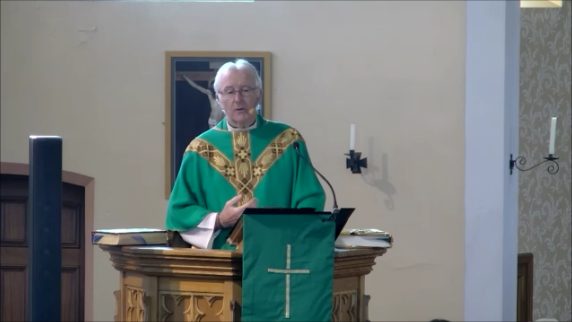
10.10.21 ~ 28th SUNDAY IN ORDINARY TIME
(To hear audio file ~ click here)
Money, money, money, must be funny in a rich man’s world. Money makes the world go round. Money can’t buy everything that’s true, but what money can’t buy I can’t use, give me money, that’s what I want. No prizes for guessing what today’s scriptures are about.
You will probably have heard of the recent buy out of Newcastle United by Saudi Arabia for £305 million, making it the most expensive football club in the world. The reaction on Tyneside has been mixed. Lots of Geordies have been dancing around St James’ Park with tea towels on their heads, but other fans are not happy with the deal. One guy on the radio wondered, in relation to the Saudi’s appalling record on human rights, would the half time entertainment now be a couple of beheadings? Another fan acknowledged the human rights question, but said he wanted quality football at St James, and money was the only way to get it. These very different approaches to such immense wealth reminded me of the story of a Butler ringing his Lordship, in the middle of winter while he was away skiing, with bad and good news. The bad news was that everything his master owned had gone up in flames, house, stables, collection of classic cars everything. Shell-shocked and devastated the Lord asked “What’s the good news?” to which the butler replied, “Well Sir, it would appear the intense heat generated by the fire, has brought the spring bulbs on earlier than usual”.
So, on to the gospel story of the rich young man. I think we will all be familiar with the experience of seeing someone’s face fall at the reception of bad news, especially if everything in the garden of that person’s life is rosy. An unexpected death of a friend, or close relative, would be a typical example guaranteed to spoil your day. Another example is being asked to do something so difficult that it cuts the ground from beneath you. Imagine the face of Abraham whose greatest wish, for so many years, to have a son, had been fulfilled, when God said, “Abraham, I want you to sacrifice your son, your only son Isaac”. His blood must have run cold. The reaction of the rich young man is similar. The happiness he derives from a life which seems to have been perfect in so many ways, both materially (he was a man of great wealth) and spiritually (“Master I have kept all these commandments from my earliest days”), is shattered by the sacrifice Jesus asks of him. No wonder his face fell.
The problem with being extremely rich, is that you can believe that money can buy anything. CS Lewis wrote: “One of the dangers of having a lot of money is that you may be quite satisfied with the kinds of happiness money can give, and so fail to realize your need for God. If everything seems to come simply by signing cheques, you may forget that you are, at every moment, totally dependent on God”. This is what Jesus was trying to tell the young man, who knew that everything had its price. His idea of being able to inherit eternal life was based on being able to earn it by doing something. He is quite pleased when Jesus commends him on the way he has kept the 7 commandments on love of neighbour, but when he asks him to focus on the 3 commandments, asking us to put all our trust in God rather than wealth, as the one thing he lacks, his face falls. He was sad, but so was Jesus, for here was a really good man, but not one who had meditated on today’s first reading, which says “I prayed, and Wisdom came to me. Compared with her, all gold is a pinch of sand, and beside her silver ranks as mud”. Wisdom is the Word of God which cuts through the skin, bone and gristle of worldly distractions, like money, right to the heart of the matter, to what is really important.
The heart of the matter is that salvation is a free gift, and the way to receive it is to trust God completely and let go of anything which gets in the way of it. Even though none of us is extremely rich, we should still cultivate the virtue of detachment. That doesn’t mean to say that we can’t enjoy any good fortune that comes our way, but not at the expense of forgetting the God who made us, keeps us in being, and will give us the overwhelming richness of eternal life. As the great German theologian and martyr Dietrich Bonhoeffer said, “It is only with gratitude that life becomes richer”.
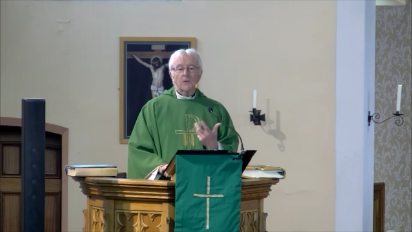
03.10.21 ~ 27th SUNDAY IN ORDINARY TIME
(To hear audio file ~ click here)
One of my favourite films is Kes. I think I may have mentioned it before. There’s a wonderful scene on a cold, wet, windy day, rather like the last few days here, of a school football match. None of the kids really want to play, and stand around freezing to death, while the tubby PT teacher, who’s also the referee, runs rings round them with the ball, imagining he’s Bobby Charlton. He falls over, claims he was tripped, and awards himself a penalty which he takes, scores and then does a lap of honour.
The theme of today’s scriptures is marriage, and reading through them, that scene of the teacher changing the rules to his own advantage, struck a chord, because that is what Jewish men in the Old Testament had done in respect to marriage. In Jewish Law, husband and wife were not equal: the woman is the property of her husband, a possession among others. But that’s not how it was in the beginning. Over time, they had reduced God’s vision of a community of life and love, as Vat II puts it, to a purely legalistic contract, concluded or annulled by human regulations. The husband simply had to hand his wife a writ of dismissal. A woman had no claim to the fidelity of her husband, who could not therefore in juridical terms, be accused of adultery. (Think of that poor woman caught in the act of adultery and thrown down in front of Jesus, to see if he would say she should be stoned to death. There’s no mention of the man involved although everyone knows it takes two to tango).
As we see in Genesis, there’s no way God intended such inequality. When the Pharisees tested Jesus about divorce, to see if he would contradict Moses, the great Lawgiver, he replied, “It was because you were so unteachable that Moses allowed you to divorce”. In other words – you wore him down. He did it for the sake of peace and quiet; it was only a concession. Divorce was never in God’s plan. “From the beginning he made them male and female, and what God has united, man must not divide”. However, as Jesus cannot deny that divorce is a reality, he can at least, strike a blow for the equality of women. He says that any man who divorces his wife and takes up with another is now also guilty of adultery. So, he couldn’t be clearer, on presenting marriage as the indissoluble unity of two persons who commit themselves as equals. To use a popular modern phrase, it’s about leveling up. The same goes for his teaching about children. Having no status, rights or power, children are receptive – everything is gift. Back in the house the disciples are told they must be equally receptive, not relying on the power and status they have as men. Jesus insists that a person’s significance is not gauged by power, strength, influence or status, but by how close they are to the kingdom”.
Jesus’ words on divorce are quite challenging because they emphasize that marriage is not based on convenience or personal satisfaction but on commitment. The ideal is the imitation of Christ’s love for the Church for whom he laid down his life. To create a beautiful relationship, sacrifices have to be made. It’s clear that God did not want his creation of marriage to be abused by selfish indulgence, to the extent that it becomes seen as a temporary state, valid only until it becomes tiresome, inconvenient, or until a better offer comes along. This is a real challenge to our culture today where fickleness and egocentric choice often dominate, and where some people change their partners like they change their socks.
In forbidding divorce, Jesus is recovering God’s original plan for marriage. He intended it to be a partnership for life. However, life isn’t always that straightforward and divorce is sometimes inevitable. If one of the partners is weak through drink, infidelity, laziness or cruelty, it can cause a great deal of suffering, and nobody has to endure that. Divorce is not something that people expect or want from marriage, but it happens, often bringing heartache and pain. We all know people who have experienced such pain, often through no fault of their own. It can happen to anyone and is a great pity when it does. It follows, then, that we as Christians, should do all we can to help those who need both emotional and practical support, as they try to get their lives back on track.
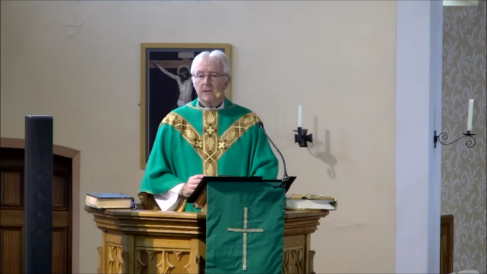
26.09.21 ~ 26th SUNDAY IN ORDINARY TIME
(To hear audio file ~ click here)
On radio 4 the other day there was a long article about an 18yr old girl who gave birth in jail, locked up in her cell. The baby died. There was a huge amount of sympathy from people phoning in. Many spoke of their own heartbreak in losing a child to miscarriage, cot death or a rare illness. Not one of them described the loss of a fetus, or a less-than-perfect baby, but only of a child. Next day, a young Downs Syndrome woman lost her case against the law which allows Downs children to be aborted up till birth. Ironically, then, came the wonderful news that that the BBC has taken on its first Downs Syndrome presenter, 20yr old George Webster. How is it that we can have two such diametrically opposed views on the value, or lack of it, of a human life? There’s something missing in the national psyche about the reality of sin and its destructive power, which today’s scriptures pick up on.
As we see in the first reading, St James has a real go at the rich - for two reasons: unbridled wealth is often the fruit of injustice, and it badly affects the poor. For example, in 2008 a firm called Auden Mackenzie took over the manufacture of hydrocortisone from MSD, which used to sell 30 tablets of 20mg for £1.07. Auden McKenzie, slowly increased the price until by 2010, it was £51.25 for exactly the same thing. Because hydrocortisone is essential for the survival of many patients, the NHS simply paid the increased cost. The price continued to rise annually until in 2017, it reached £147. Luckily, another firm called Genesis Pharmaceuticals, obtained a marketing licence, and began competing. Their hydrocortisone became available in November 2017, and the price gradually fell from £147 until now it’s only £3.55 for a month’s supply. Exploitation of the NHS, so all of us, on a grand scale.
Unbridled wealth is about power, not necessarily the power that money and status bring, but the power to do what you want over the rights of those who have no power. In the gospel Jesus is not quite so in your face as James, about the miseries those who exploit, or cause pain to others for personal gain, have got coming, but the message is the same. We don’t hear many sermons on hell, in case it gives the impression that our God is a vengeful God, bent on punishing us for our sins, but in today’s gospel, Jesus makes it very clear that, whether we like it or not, Hell is a distinct possibility. Hell is not God’s choice for us. He would rather have us all in heaven with him, but as I said last week, he has entrusted us with free will, so the choice is always ours.
So, how does someone choose Hell? Before I answer that, it’s very important to know that one-off sins, even the most deadly mortal sins, committed out of weakness, can be forgiven, through the sacrament of confession. God’s mercy and compassion is always available to those who seek it. However to choose to deliberately, persistently and fully consciously, live in a permanent state of sin, without repenting, could well bring about eternal suffering, and the complete utter loss of God, from whom we came, and with whom we are invited to spend eternity, in never-ending happiness. What’s even worse is if those people lead others astray, especially the young. So concerned is Jesus about this that he uses very strong language on how they should be dealt with. They should have a millstone tied around their neck and be thrown into the sea.
Nobody in their right mind wants to go to Hell and nobody has to. He doesn’t really want us to pluck our eyes out and cut off our hand, but to be conscious of what causes us to sin and take measures to prevent it. We have been given our bodily parts to use in God’s service. One day we will be asked to give an account of their use. Were my hands used to caress, soothe, help someone up or more often clenched into fists, or raised in anger to strike? Did my eyes look on others with compassion and understanding, or were they filled with lust or jealousy? Was my mouth a source of inspiration and wisdom, or did I give scandal to those little ones by malicious gossip or badmouthing people? Did I use my mind to discern where God is in all that’s going on, or to justify the things I do wrong? As it says in the Book of Deuteronomy, “See today I lay before you life and death: therefore choose life”.
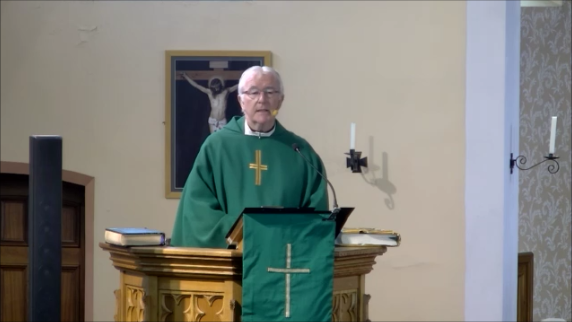
19.09.21 ~ 25th SUNDAY IN ORDINARY TIME
(To hear audio file ~ click here)
At Bible share on Thursday we began to look at the Book of Esther. Esther is a member of the Jewish race taken into captivity in Babylon. But she’s also very beautiful, and when King Ahasuerus needs a new Queen, she is the one selected from all the girls paraded before him. On selection, her uncle Mordecai instructs her to tell no-one that she is Jewish. This was for her own safety, as, in order to survive, the Jews kept a low profile and tried to blend in with the Babylonian culture. This didn’t stop some of them from staying faithful to the God of Israel, and, in fact, because of Mordecai’s refusal to bow down and reverence a pagan idol, things got very dangerous, not just for him, but for all his people. If you want to know what happens next come to Bible Share.
It’s tricky trying to stick to your faith when surrounded by people who don’t have it. When I joined the Army I lived in a Cavalry Officers Mess. Not only was I the only priest, but I was one of only two Catholics out of thirty others, none of them particularly religious, and many awkward and difficult questions came my way. I was often put on the spot to explain the Church’s teaching on some of the more controversial issues. However, that did give me the opportunity to say what we Catholics are about. Many people think it’s dead easy to be a Catholic. All you have to do is say a few prayers, maybe go to church occasionally, or jump through a few religious hoops to get your child into Catholic school. But that’s not enough to connect with God in a deep, life-giving way. Being a true Christian is a lot tougher. We are to love our enemies, do good to those who persecute us, speak out for justice, lobby our MP on pro-life issues, put our faith into practice. “Anyone who wants to be a follower of mine, must take up his cross and follow me”.
On the issue of taking up the cross, people sometimes question how such a loving God could ask his beloved son to go through such an horrendous ordeal. Why did Jesus need to suffer? I think it’s all to do with the fact that God created us in his own image and likeness, ie endowed with reason and the ability to choose. Having made that decision, he will never take away our free will. But he also knew that if people exercise that freedom to choose sin, then war, hatred, rivalry will always be a part of the human experience. So, although he could have used his power to subdue and make everyone conform to his will, he chose the more difficult way of appealing to the better nature of each individual person to choose good over evil. What he says is this: “I’m going to show you the way to combat evil with love, even when in extreme suffering. When you’ve seen how love conquers fear, and if you want to do the same, then pick up your cross and follow me”.
Referring back to Jesus’ question of what we discuss on the road of our lives, St James, as always, is useful. He points out that all wars and battles between men first start in the desires fighting inside them, the biggest desire being for greatness. Even the apostles were infected with it. These were lowly men dreaming of advancement, prestige and power in what they expected would be the new earthly kingdom. They know that all are equal in the sight of God, but that didn’t stop them arguing their case for why they should be top dog. It reminded me of communism. Yes, all men are equal, but does the peasant in his rice field, or the democracy protesters in Hong Kong, feel they are the equal of Xi Jinping or the party representatives in the Great Hall of the People? Clearly, as a Christian we should not covet authority and power, but if it comes our way, through promotion at work or whatever, our discussion should be how best to serve others in need with the skills we have to offer.
Choosing to use any power we have to serve, rather than for our own ends, is to challenge the way of the world, especially when we come up against the philosophy of ‘You must look after number one’. ‘Charity begins at home’ or ‘they’re not like us so why should we help?’ To accept Our Lord’s challenge to take up our cross, is to accept that suffering may be part of our discipleship. To do it willingly, is to know we are truly following in his footsteps, he who is the way the truth and the life.
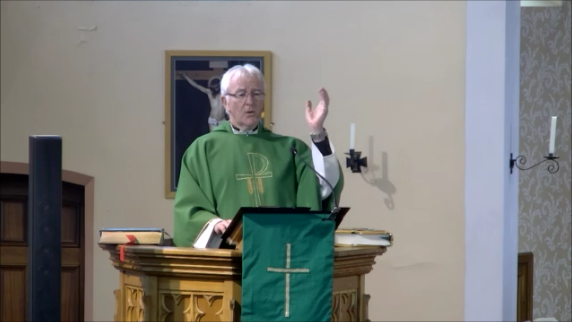
12.09.21 ~ 24th SUNDAY IN ORDINARY TIME
(To hear audio file ~ click here)
As some of you may know, I get the Sunday Times, mainly for the cryptic crossword I have to admit. It’s an ordinary Sunday newspaper with the usual content you’d expect, but sometimes there’s something you wouldn’t expect to see in an overtly secular newspaper. Rod Liddle who writes the comment page, is usually quite scathing about the latest fads, and often lampoons political correctness. This week he was bemoaning the loss of the values we used to have in the 70s. I don’t know if he is particularly religious, but this is what he wrote: “Bring back Jesus. He’s terribly unfashionable, yet many of today’s social problems are the consequence of the hole left by the swift eviction of Christianity from our lives. The decline of the nuclear family and the growth of single parenting. The rise of a non-judgmental relativism, the abandonment of deferred gratification. Community spirit replaced by an almost endless clamouring about gender identity. The lack of a clear distinction between right and wrong – instead, it’s “My truth” versus “Your truth”. None of this says that the 70s were a Utopia. They clearly weren’t. But before we became a secular state, the rules were clearer and easier to follow, and so, by and large, we followed them. The problem with the secular state is that nothing fills the hole left by the loss of Christianity”.
Of course, you and I know that Christianity has not disappeared from our land, but if people think it has, then maybe we are not being as up front as we should be in proclaiming it. In a webinar on inviting and welcoming people back to post pandemic church, the Bishop of Northampton said we have to let go of timidity. He used the word “Paresia” which means “Bold and confident”. He’s right, and we have a lot to be bold and confident about. For example, Catholic Social Teaching is admired around the world, and often borrowed from by political leaders. Why is that? Because its core message is all about working for the common good, the antidote to individualism, and what leader, who really had the interest of his people at heart, would not want to see people asking what can I do for my country, rather than what can my country do for me? Pope Francis too is a beacon of hope for a world which has lost its bearings, drawing on the strength of the gospel and the richness of our Apostolic Tradition, to focus our common humanity on what the really important issues are.
So, we should be proud of our Faith, and not be afraid of sharing it, as a way of helping people to deal with many of the social problems Rod Liddle highlighted in his article. After all, we know from experience that it works: people of faith generally cope much better when the shadow of the cross falls across their path. They suffer the same pain as anyone else, but the inner strength they get from their relationship with Christ somehow gets them through, so why not invite people to share this wonderful gift of faith? We received without charge, so we should give without charge. If we want to show people like Rod Liddle that Christianity is still alive and well and living in England, St James’ letter today is a good place to start. There’s a story told of an itinerant preacher giving an outdoor sermon on ‘love thy neighbour’ to an enthusiastic crowd. When he thinks he has them all in the palm of his hand he shouts “Do you believe? “Yes, we believe” So, if you had two houses would you give one to the poor?” “Yes” they all shout back. “Two cars?” “Yes” they roar. “Two shirts”? Not a sound, because everybody had two shirts! As James says, Faith not put into action is quite dead.
A faith which is never realized in good deeds remains purely theoretical or abstract. Many people say they believe in God, and some even study the Bible to learn more about him, but no amount of acquired knowledge will replace having a personal relationship with him, which is not hard to do. My relationship with Jesus is very simple. I talk with him every morning. Before I write a homily I ask him what he wants me to pass on to you. While I have his undivided attention, during thanksgiving after communion, I mention by name those for whom I am offering the Mass. Each day I ask his help in what he wants me to do. Most of you probably do the same. When faith comes from a truly personal relationship with Christ, it does the work he wants us to do, and this gives proof that it is alive.
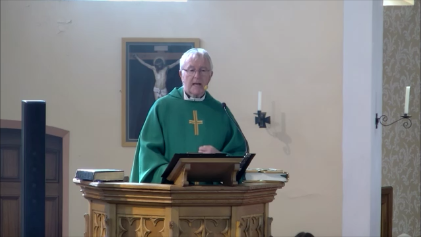
05.09.21 ~ 23rd SUNDAY IN ORDINARY TIME
(To hear audio file ~ click here)
While watching the news the other night, I was particularly struck by a woman in Louisiana, tears rolling down her cheeks, telling how her house and car had been swept away in the floods, and that she’d lost everything. The sad irony was that she was wearing a tee shirt with the words “Laissez les bon temps rouler” – let the good times roll. Good times they certainly were not for her. As we all know, we are reaching a critical time for taking action against Climate Change. Many world leaders, including Pope Francis, will be in Glasgow in November for the Cop26 talks. Even climate change sceptics, and petrol heads like Jeremy Clarkson, now acknowledge, grudgingly perhaps, that we have a serious problem. For those who still deny it, they only have to look at the disruptive weather patterns which are causing chaos, not only in impoverished countries like Haiti, but in the US too.
When disaster strikes, how do you cope, not just physically but mentally? You certainly need courage and you need perseverance. Today’s quote from the prophet Isaiah was written at a time when the Israelites were going through a terrible time of oppression by their Edomite captors. They can see no way out; their hearts are faint. But Isaiah says to them “Courage! Do not be afraid. Look your God is coming”. His message is rich in promise of the good times to come. These trials will not last forever, and your life will be better than it was before. The Messiah will change everything, but he could be a long time a coming. In the meantime they need courage, and never to give up hope.
I watched a film a few weeks ago of a family who got caught up in a terrorist attack in Cambodia. As the terrorists began killing all foreigners, they fled to the roof of the hotel, where the only escape was to leap across a 6’ gap 50’ above the ground. Terrified but screamed at by her husband, the wife made the leap. He then threw their children across the gap to her, then took a flying leap himself. Eventually they made it in a stolen boat to the safety of Vietnam. It was a story of personal courage born out of desperation and fueled by adrenalin. Courage is one of the 7 gifts of the Holy Spirit, specifically designed to help us to do the right thing, regardless of the pressure we’re under, and no doubt we’ve all had to exercise it at times when speaking up for ourselves or against injustice.
Personal courage is one thing, but what about when it’s needed on a national or universal scale? Not so easy to exercise. The oppression the Israelites suffered under the Edomites, has been repeated many times throughout history, and today is playing out for real in Afghanistan, in scenes we see on tele reminiscent of that film I saw. Sadly, many will not make it to the safety of Pakistan, England, Canada or the US. Those who are left will, like the Israelites, languish in exile for God knows how long. So, they will need to hear Isaiah’s same message of hope, from those of us in the free world, that one day things will get better. Clearly many of you have been greatly moved by their plight. I have a mountain of supplies in my hallway for the refugees. And things will get better.
History shows that, like all despotic regimes which make life unbearable for their people, there will come a time when they will be toppled, either by armed insurrection, or through the perseverance of good people who will keep plugging away for a change of heart in their oppressors. Just think how long it took for the abolitionists to finally outlaw slavery. Just down the road from Giant Axe field in Lancaster, where many Catholic martyrs were executed, now stands our Diocesan Catholic cathedral. Catholic emancipation took 350 years, but we got there. Remember Martin Luther King’s final speech. “I have seen the promised land. I might not get there with you”. He didn’t. He was shot dead the next day. But they did get there. Not long after his death segregation became illegal. God will never allow evil, even when it is rampant, to triumph over good forever. So, perhaps today we could offer a prayer for our Afghanistan brothers and sister to have courage, as they await God’s coming, however long that might be. Let’s also pray that in the meantime, they will be able to live a semi-normal life without persecution, and not lose all the freedoms gained over the last 20 years.
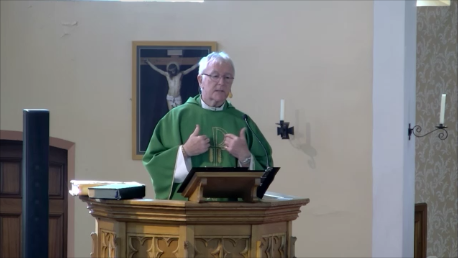
29.08.21 ~ 22nd SUNDAY IN ORDINARY TIME
(To hear audio file ~ click here)
There’s a clip going the rounds of a lady doing the theory part of her driving test. The examiner asks “You see an old man and a little kid in front of you. What do you hit? She answers “The old man: after all the kid has his whole life in front of him”. Then he says “The brakes. You hit the brakes”!
That story illustrates how easy it is, in everyday life, to miss the point, and missing the point is very much the theme of today’s scriptures. In Deuteronomy we see that God is not honoured by adding a multiplicity of ‘dos’ and ‘don’ts’ to the Law he has given Moses, but by the way we put our hearts into the way we serve him. The apostle James says the same thing and gives us a great example of how to put our heart into serving God – “Pure unspoilt religion in God’s eyes, is coming to the help of orphans and widows when they need it”, something we intend to do for those poor people fleeing Afghanistan who need our help right now, as you’ll see at the end of Mass.
In the gospel, the fact that the Pharisees and scribes have come all the way from Jerusalem to check out what Jesus was teaching, means they are taking very seriously what they’ve been hearing of his ‘cavalier’ approach to the Law, such as hob-nobbing with tax collectors and sinners, and allowing his apostles to pick ears of grain on the Sabbath. Now they ask him why his disciples break the tradition of the elders by eating with unwashed hands, but Jesus says tradition’s got nothing to do with it. Their problem is that they have added so many customs and human regulations to the traditional Law of Moses, that they have become more important than true worship of God. Their idea was to make religion inseparable from daily life, not a bad one in theory, but, as Frank Carson used to say, “It’s the way you tell ‘em”, and tying people down to all these add-ons, rather than helping them to worship in spirit and in truth was never going to convince the true believer. As we know, the Taliban want to make religion inseparable from daily life, by imposing unessential peripheral customs, eg full-grown beards for men and the hijab for women, but no-one, in their right mind, thinks it’s a good idea to force people, through fear of torture or death to conform to those customs. What’s the point of a religion like that if their hearts are not in it? It would be mere lip service.
In his latest book, ‘Let us Dream’ which I am reading for the second time – it’s that good - Pope Francis says “In the history of the Church, there have always existed groups who feel superior to the Body of Christ. In our own time there are those who will not accept Vatican II. In every case what marks them out is rigidity, an attempt to cling on to something petty, which eventually turns into an ideology. In this way they justify withholding themselves from the forward march of the people of God. Rather than throwing themselves into the great task of evangelizing our world, in communion with the whole Body of Christ, they remain huddled in “their” group of purists, self-appointed guardians of the truth, staying on the balcony while real life passes below”. Rigidity is not tradition.
Customs and things peripheral to our Faith are not tradition either. Languages change as do words. When I was a boy, Gay meant happy. ‘Tradition’ is to hand on what we have received, not what we have added on. We Christians did not invent our faith. It was handed on to us by the apostles who in turn received it from the Son of God himself. The essential, foundational truths of our Faith cannot change, but they do develop, taking account of the signs of the times, because in every generation, and indeed in every culture, they are received in a different context. Human society never stays still – it is always developing. Our task, then, is to listen, understand and interpret God’s word for today, so that we can faithfully hand on the treasure we have received, as fully and clearly as we can.
The way to do that is not to get hung up on human regulations or outward shows of piety, but to love God and our neighbour from the heart, the place where the decisions we make as free human beings are taken, the place where true religion and commitment to God lies.
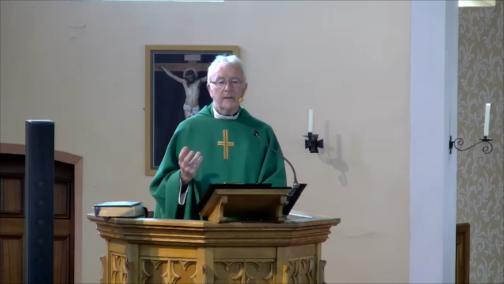
22.08.21 ~ 21st SUNDAY IN ORDINARY TIME
(To hear audio file ~ click here)
Joshua’s challenge “Choose today whom you wish to serve” (false gods or the one true God) came after a long speech, in which he outlined, in some detail, all that God had done for them, including their triumphal entry into the Promised Land, where they are now. The people answered, “Are you mad? It’s a no-brainer. We will serve the Lord, for he is our God”, a response which has echoes of a footballer kissing the badge on his shirt, as a symbol of undying loyalty to the club and the fans – ie until a better offer comes along. As you know the Israelites were forever changing sides, so to speak.
In the history of the eternal Covenant God has made with his people, this is a real turning point. The people are free to return to the gods they worshipped in Egypt, or to adapt to the pagan gods of the Amorites, among whom they will now settle. It’s a tricky one, because to remain faithful to the God of Israel, is to live by different values and customs from the neighbours, which nearly always causes problems, as we know only too well from what’s happening in Afghanistan right now. Moderate Muslims who have adapted to modern living, with education for girls, listening to music and women allowed to work, are faced with the terrifying prospect of having to live under strict Sharia Law, which includes hand amputation for stealing and stoning to death for adultery. It''s interesting that the Law doesn’t seem to apply to the Taliban themselves, who commit adultery by stealing other men’s wives, and kill without mercy those whom they judge not to be on message.
Another major turning point in life for many is the commitment to marriage. The way St Paul puts it is that the union of man and wife is so holy a mystery, that it symbolizes the marriage of Christ and his Church, which is the model put before every engaged couple, as they prepare to make their life- long commitment to their partner. Husband and wife must think less of themselves as individuals and more of each other as a couple. Recently in the parish, we have seen wonderful examples of this commitment in the celebration of three long-lasting wedding anniversaries of many years standing.
In the gospel there’s a major turning point for the followers of Jesus. These are not the Jews who were hostile to Jesus and always gave him a hard time, but his disciples, over 5000 of whom had followed him to this lonely place. Now, they are asked to choose. Will they turn away and join the ranks of the unbelievers, or will they give themselves freely and without reservation to Christ? As we see, most find what Jesus is proposing intolerable and do walk away. So, when the whole world is against you, what do you do? Normally you turn to your family, your closest friends, those who’ll stick by you, but in this case I wonder if he had a premonition of how they would all abandon him at the crucifixion when all but one of them ran away. “What about you: do you want to go away too?”
Everything Jesus has worked for hangs on their response to his question. So, imagine the relief and sheer joy of hearing “Lord, to whom shall we go? You have the words of eternal life”. In the face of near total rejection from the huge crowd, it’s a phenomenal act of faith, because, at this stage, they have only had a glimpse that Jesus has the message of eternal life. They know nothing of the resurrection, and have no idea what he means when he says “What if you should see the Son of Man ascend to where he was before?” Yet that glimpse is enough for them to commit their lives to him.
“What about you?” is a question Christ asks of all his disciples, in a world which largely rejects the gospel. Like Joshua, he always leaves us free to go, and many have gone. It’s understandable that people find it easier to blend in with what’s trending on social media, than keep to what the Church teaches. You can like or dislike without committing to anything. Just don’t speak up for what you truly believe if the ‘Thought Police’ are telling you different. But, that’s not the Christian way. Our priority is always to speak up for justice, peace and mercy, the words of eternal life Jesus has asked us to proclaim, and we must stay faithful to them because “We know he is the Holy One of God”
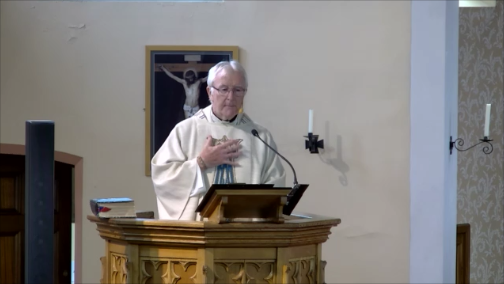
15.08.21 ~ ASSUMPTION OF THE BLESSED VIRGIN MARY
(To hear audio file ~ click here)
As I was writing notes for this homily, a phrase we use in Lancashire came to me: “First up, best dressed’. Mary was first to be assumed into heaven and must certainly be the best dressed as the Queen of Heaven in the glory of all the saints. Yesterday we celebrated the feast of one of the saints sharing her glory, St Maximilian Kolbe who, incidentally, had a lifelong devotion to her. He gave his life for a fellow prisoner in Auschwitz. After weeks of being starved, he was injected with a lethal dose of carbolic acid on August 14th, the eve of the Assumption. I’m sure Mary will have prayed for him at the hour of his death, then welcomed him home in time to celebrate her great feast in the kingdom of heaven. Such is the inspiration Mary, the perfect servant of Christ, can provide for us.
Although today we are celebrating her triumphant assumption to heaven, her true greatness is to be found in her faith. Like Abraham, Moses, Elijah, Jeremiah and most of the prophets, who, like her, had seemingly impossible tasks to do, she kept her faith and trust in God. Although she wasn’t called to be a public figure like them, she is certainly not a passive figure. On being told of the significance of the child which she would conceive through the Holy Spirit, she gave her consent freely. To human eyes she is simply a young village girl, probably not well educated but, in God’s eyes, the supreme representative of humanity. Together they created the Saviour of the world.
The significance of what God is doing is not lost on her, as we see in her outpouring of praise for him in the Magnificat, to which there are two parts – her own and the rest of humanity’s. As a lowly handmaid of the Lord, she is overwhelmed to have been chosen to be the mother of the Messiah, and praises God because he has done great things for her: “From this day forward, all generations will call me blessed”. In the second part she tells us that what God did for her is available to us too. “His mercy reaches from age to age for those who fear him”. In other words, God raises up all the poor and lowly who recognize their need for him. As for the proud of heart, those who think they have no need of God, they will routed, pulled down from their self-made thrones.
Because of Mary’s faithfulness, she is called the Archtype of the Church. That means she is the image of all the Church should be. When the infant church is about to be gobbled up by the seven headed dragon of Rome, the only thing it had was trust in the words of Jesus who told Peter “The gates of hell will never prevail against her”. Mary had already been there when her infant son was in danger from the murderous King Herod. All she had was trust God’s words that they would be safe in Egypt. Throughout her life as the handmaid of the Lord she is our model of perfect discipleship.
Now a slight diversion to do with the importance of women. After the finding of Jesus in the Temple, we don’t hear too much about Mary, apart from her intervention at Cana and her presence at the foot of the cross. I’m not sure if she followed Jesus during his public ministry. Maybe she was happy to entrust him to the care of the women who provided for him on his travels. Many priests like me can identify with that. I left my mothers’ care, and ever since have been looked after by women. Not only have they made meals, knitted jumpers and wooly hats for me, they’ve also taken a lead in liturgy, teaching, and helped me with the pastoral care of the church. We all know how much every parish benefits from what our talented ladies give. Maybe when we have that silent pause at the end of the bidding prayers, we could all pray for a woman who has made a real difference to our life.
But back to today’s feast, which is really about the joy of heaven. As Paul teaches in the second reading, Christ is the first fruits of all who have fallen asleep. After him, all those who belong to him, starting with his beloved mother, but including every one of us. If, like her, we stay faithful to her Son, no matter what life throws at us, or how lowly or unworthy we feel, we know that we too will one day be with Mary our mother in the glory of all the saints.
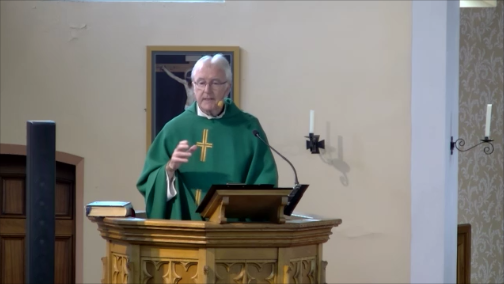
08.08.21 ~ 19th SUNDAY IN ORDINARY TIME
(To hear audio file ~ click here)
When my family lived in Germany we often went to the swimming pool in the summer. One day my dad decided to dive off the high board, but when he got up there, it looked a lot higher than it did from below, so he tried to come back down again, but there was a queue, so he had to dive. All I can say is that it wasn’t Tom Daly at his best; more of a resounding belly flop. My dad was my hero at the time, so when he eventually surfaced, some distance from where he went in, I shouted “Do it again Dad!” Dad never did teach me to dive, but he did teach me to ride a bike, gaining my trust by holding onto the saddle and running with me, until eventually he let go and I found myself peddling solo.
My experience of a parent taking time to gently draw a child on to achieving a skill, is something most people will have experienced, either from their own parents, or from others with their parents’ support. It’s natural for a parent to draw a child on, gently allowing for their disappointments, fear or mistakes. For example, one of the stand-out moments at the Olympics this week, was the bronze medal won by 13yr old Sky Brown for skateboarding, made more amazing by the fact that she broke her skull just a year ago, in a horrific fall. When interviewed, she made it very clear that without her parents’ encouragement she would never have got to where she is now.
In today’s gospel, like the parents in the examples I’ve just given, God our Father wants to teach us something new, which we can only learn from the one he has sent, his Son. Jesus says, “No-one can come to me unless he is drawn by the Father who sent me. To hear the teaching of the Father, and learn from it, is to come to me”. But the people are not willing to listen to his son, because they conclude that he’s just too human to be God, too much like us. You can understand where they are coming from. They know his family and his background, and I suppose it doesn’t help that, for 30 years, he has eaten the same bread as them, which is incapable of saving us from death, no matter how much we eat. So, when he tries to teach them that he is the bread of eternal life that a man may eat and not die, they will not accept him, and many of them walk away.
Many of our contemporaries have also walked away, so what is it that keeps us coming here every week to be fed with the bread of life? Well, if we were lucky enough to have parents who, during our formative years, gave us the opportunity to be drawn by the Father to his son Jesus, we have been given an unshakeable foundation on which to build a focused and stable life. And that’s really something, because History shows that we live in a world forever in turmoil of one kind or another. Some peoples’ way of coping is to pretend it’s not happening by creating a diversion. When the Roman Empire began to crumble, their rulers ordered that Bread and Circuses should be maintained at all costs. So long as the people had food and entertainment, they would be happy. We too have food in abundance and an unbelievable array of leisure activities, even on Sundays. The Olympics and Jack Grealish’s transfer to Man City for £100m, have, for a brief time, taken our minds off climate change, Covid 19, China’s persecution of the Uighars, Taliban resurgence in Afghanistan and all sorts of other problems which need fixing, and we know bread and circuses can’t do that.
So, how does receiving the Body of Christ help us with all this? For us it’s the antidote to indifference because it’s full of all those life-giving qualities which last forever – love, acceptance, forgiveness and healing, which is food to so many people starved of affection, burdened by failure, or let down by those in whom they put their trust. It keeps us focused on where we are going and how to get there. If we’re being fed by his word regularly and opening our hearts to let him in at Holy Communion, it’s more than likely that, having Christ alongside, will help us to keep things in perspective. For anyone who used to, but no longer feels the need to receive the bread of life, it might be worth re-considering what a tremendous grace it is, to have an intimate relationship with the Son of God, who gave himself for the life of the world. If you do, be assured that Our Lord will always be here in the Blessed Sacrament to welcome you home. God never takes back his gifts once given.
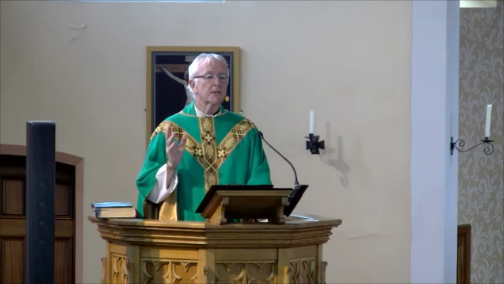
01.08.21 ~ 18th SUNDAY IN ORDINARY TIME
(To hear audio file ~ click here)
I was listening to a song the other day called ‘Man don’t cry’, which came out in the late 80s, about John McCarthy, who, at the time, was being held hostage in Beirut by Islamic Jihad. During their 5yr imprisonment, he and fellow hostage, Brian Keenan, used to fantasize about food, as a way to avoid thinking of the same old dish of rice they actually received. John’s favourite fantasy was of a school pudding - apricot crumble and custard. In today’s reading from Exodus, we see similar fantasizing going on by the Israelites in the wilderness, about the pans of meat, and bread which they ate to their heart’s content, back in Egypt. They complain to Moses that even slavery was better than this. How soon people forget! It’s only about 6 weeks since Moses led them out of slavery, brought them across the Red Sea to safety, and gave them water from the rock. If they’d stopped to think, all those events should have taught them that God will provide food too. As we see later, he certainly did.
The problem with the Israelites is they’re not really listening, in the sense of understanding, to what God is doing. The whole point of leading the Israelites into the desert was so that they could learn to trust him. If they had referred back to Abraham, Isaac, Jacob, Joseph and the other Patriarchs, they would have remembered, that teaching people to trust in a wisdom far greater than their own, is how God works. Even Jesus himself, before he began his public ministry, spent forty days in the desert, where he learned to put his trust completely in God, by overcoming the Devil’s temptations.
In St John’s gospel, Jesus often engages someone in a conversation which is clearly operating at two levels. So, for example, the Samaritan woman at the well thinks he is offering her ordinary drinking water and says it’s brilliant that she won’t have to come to the well anymore, in the heat of the day, to collect it, whereas he is using the image of water, which gives life, to talk of the Holy Spirit. In today’s encounter, at the obvious level, the people have had bread to eat and they want more, like their ancestors got from Moses, but Jesus is on another level. Life is about far more than simply satisfying physical needs. So, he talks of the bread which lasts forever, something far superior, and only available through faith in him. They too, like the Israelites, must learn to trust. In both these cases, and in all his encounters, Jesus is looking for a personal response and commitment to himself – “This is working for God; you must believe in the one he has sent. I am the Bread of Life. He who comes to me will never be hungry; he who believes in me will never thirst”.
Of course, with the benefit of hindsight, we know that Jesus is talking about the Eucharist, the Bread of Life, which we eat every time we receive Holy Communion. For those few minutes we see beyond the appearances of bread and wine, to the reality of his presence within us, Body, Blood, Soul and Divinity. We call it “God’s greatest gift”, and in receiving it, we are responding to the personal, intimate encounter with himself that he seeks from us. But, a word of caution. As we saw in Exodus, the Israelites got so used to the manna appearing, that they took it for granted. It didn’t seem anything special anymore nor did it bring them any closer to God, the source of their miraculous food, much to the frustration of Moses, who had to keep asking God to give them another chance.
Unfortunately, as we know from declining numbers of people coming to Mass, something similar has happened to many Catholics, for whom Sunday is nothing special anymore, and receiving the Body of Christ, the Bread of Life, is nothing to get excited about. Whether that’s because they don’t really believe Jesus is truly present in Holy Communion or whether other interests take precedence, I don’t know. Suffice it to say that for those who do respond to Jesus’ request to “Do this in memory of me” every Sunday, we know that eternal life is guaranteed. All it takes is a profound act of faith, like the one I once got from an old tinker lady, lying in bed with a small, white clay pipe in her mouth. As I held up the host and began the words “This is the lamb of God”, she replied, “Aye, I know it is lad”!
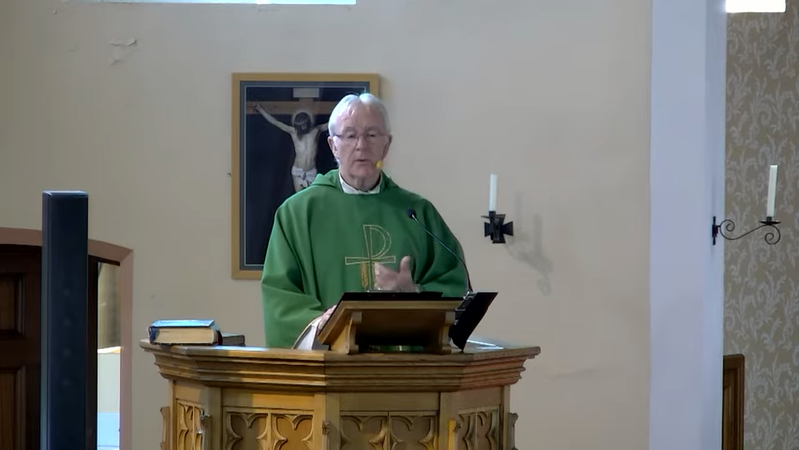
25.07.21 ~ 17th SUNDAY IN ORDINARY TIME
(To hear audio file ~ click here)
When I was a little boy, I lived on a small RAF camp out in the country. All of us kids used to play together, none of us having a best friend, that is until the little boy next door got a new pedal car. Suddenly, he became my very best friend whom I’d call for every day, until one day, when I knocked on the door to ask if he was coming out, his brother said, “Do you mean, is his car coming out?” The brother had rumbled me: he knew I wasn’t looking for his little brother, but to play with his car.
In today’s gospel, there’s something similar going on in the minds of the crowd. How come Jesus has attracted such a huge number, who are willing to follow him to the other side of the sea of Galilee, without taking any provisions for the journey? The answer is in the first verse. “They were impressed by the signs he gave by curing the sick”. Like me with the pedal car, they’re not really looking for him but for the miracles he can perform. However, Jesus knows they’re only here for the beer, as the old advert used to put it, yet he still goes on to work one of the most spectacular of his miracles, feeding 5000 men, women and children, after which he had to escape, in order to avoid their attempts to make him king, and, no doubt, be assured of free food and health care for life. The last thing he wanted to do was give the impression of manipulating gullible people, by promising them everything in exchange for their personal freedom, as we have seen happen recently, with some cults in America. In this case, he had simply felt sorry for them, so decided to feed them. Of course, he knew the deeper significance of what he was doing, and, as we’ll see over the next few weeks, will use the miracle as a launch pad for his teaching on the Eucharist.
One part we probably gloss over each time we read about the miracle, is the story of the leftovers. What do we make of it? In our throw-away society, who cares about leftovers when we’ve all been fed and satisfied? Why did Jesus insist that all the scraps get picked up, so that nothing gets wasted? By the way, it’s interesting that there are twelve baskets. Could Jesus be making a deliberate link between the twelve tribes of the Old Testament, and the twelve apostles of the New Testament, as if to show that what he is doing, is a direct continuation of what God did for his people in the past? But, back to the scraps. All twelve baskets end up full. Not only has God fed everybody, but there’s stacks left over, like the 40 gallons of wine at Cana. In other words, God’s gifts are superabundant: there’s plenty for everyone. Obviously, the Chosen people were fed first, and filled with the promise of salvation, but what was left over for us, is not any less precious, so none of it should be wasted. The abundant scraps left over are collected and put aside for all peoples, who will be invited, after the Lord’s resurrection, to the messianic feast at the end of time. That’s why, later, Jesus will insist on talking about working for food that will last. The bread the crowd ate was temporary, like the manna their fathers ate in the desert, but the bread he will give is food for eternal life.
Over the centuries, millions of us have benefitted from this greatest of God’s gifts, the eucharist, and continue to do so, but we can’t leave this story without regard for its other implications. In 2021, many parts of our world are still hungry: people are still dying of starvation or risking their lives to get to a country which has plenty of food. Yet we know there are mountains of food produced every year, because we throw away tons of what we have left over. God’s superabundance hasn’t stopped. There’s plenty of food to go round, but our sharing of the world’s resources leaves a lot to be desired. Gandhi once said, “There is enough in the world for man’s need, but not for his greed”. Finally, it’s interesting that Elisha and Jesus, though centuries apart use virtually the same words, “Give them something to eat” and the response from Elisha’s servant and the apostle Philip are the same “How can I?” It’s the same answer our Government gave when it slashed our foreign aid budget. But if we do what Elisha says, “They will eat and have some left over” which Jesus proves, the lesson being that If we are generous with what we have, like the lad with five loaves and two fish, the gifts of God will never cease to multiply.
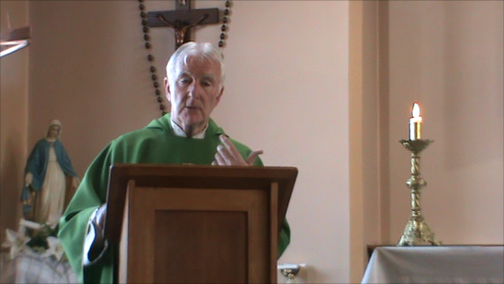
18.07.21 ~ 16th SUNDAY IN ORDINARY TIME
(To hear audio file ~ click here)
Well, as I said in the beginning of Mass as you know things will be changing after July 19th so I just want to say a little bit about that really. As you know we move into step four of the government's recovery roadmap on July 19th on Monday. But as you'll see when I read this, our bishops have advised a cautious approach.
The key watchwords are discernment of local prevailing conditions and careful consideration of what mitigations are needed in the light of these local situations. And in the light of the prevailing local conditions where we live here in Fleetwood in which the number of infections have gone up recently and seem to be on the rise, we need to take a graduated response to step four and not throw the baby out with the bathwater.
Being cautious has served us well. We’ve stayed open throughout the pandemic apart from the two lockdowns and have had not one single case of Covid as a result of people coming to mass here. We hope to keep it that way even though things are obviously relaxing now.
I’m going to read the statement from the Catholic Bishops of England, then I’ll read Bishop Paul’s letter to us in the Diocese of Lancaster, and after which I’ll mention some suggestions for our own parish.
So, this is the statement from the Catholic Bishops of England. It’s called Sunday it's our day.
~~~~~~~~~~~~~~~~
CATHOLIC BISHOPS’ CONFERENCE OF ENGLAND AND WALES
Statement from the Catholic Bishops of England
Sunday – it is our Day
On 19th July, the current legislative powers which assist the mitigations against the covid-19 virus transmission will be rescinded by HM Government. Nevertheless, there will be an encouragement to personal and corporate responsibility in this area; as the Prime Minister said in his most recent statement “The pandemic is not over.” Even without this legislation in place, the Church in England and Wales will be adopting a cautious approach to capacity and activity within our buildings, especially at corporate acts of worship.
We are mindful of the certain fact that the Covid-19 virus is still circulating in society. Vaccines provide genuine protection against the worst effects of the virus, yet we recognise the legitimate fear on the part of some who otherwise desire to gather for Holy Mass. It is our continuing judgement, therefore, that it is not possible at the present time for all of the faithful to attend Mass on a Sunday thus fulfilling their duty to God.
It is hoped that it will be possible for all Catholics in England and Wales to fulfil this most important Church precept, that of the Sunday Obligation, by the First Sunday in Advent 2021. In the meantime, all Catholics are asked to do their best to participate in the celebration of the weekly Sunday Mass and to reflect deeply on the centrality of Sunday worship in the life of the Church.
In April, following our Plenary Assembly, we offered a reflection on the experience of the extraordinary long months of the pandemic. It was titled The Day of the Lord. We also began to look at the way forward. We spoke about the important invitation to restore the Sunday Mass to its rightful centrality in our lives. We asked for a rekindling in our hearts of a yearning for the Real Presence of the Lord in the Eucharist, as our response to the total, sacrificial love that Jesus has for us. We said: “The Eucharist should be the cause of our deepest joy, our highest manner of offering thanks to God and for seeking his mercy and love. We need to make it the foundation stone of our lives.”
May this continue to be our striving during these coming months as we journey back to the full celebration of our Sunday Mass and our renewed observance of The Day of the Lord.
Now we have a more personal one from our own Bishop Paul of Lancaster, written to the clergy of the diocese:
~~~~~~~~~~~~~~~~
“Dear Father
Although most legal restrictions relating to the Covid pandemic are ending on Monday 19th July, a degree of caution is still needed where a large number of people gather in enclosed spaces, which of course, includes our churches.
Not only is the delta variant of the virus still spreading rapidly, it is also the case that those with supressed immune systems still need a degree of additional protection against the virus.
Whilst in broader society, there may well be those who will welcome 19th July with a complete abandonment of anti-Covid measures, we owe it to others to be prudent in what we do in our churches at this time.
With this in mind, and so that there is some uniformity of practise across our diocese, I would like the following to be adopted in our churches. Most of this is in the C.B.C.E.W. guidance.
Please read the additional note on the Sunday and Holyday obligation to attend Mass.
General Guidance:
1. Face coverings should still be worn by all those coming to a church service (exemptions for medical reasons excluded.). Those who do not wish to wear a covering should not be banned from entering, but they should be encouraged to sit a distance away from other people.
2. Social distancing will not be mandatory in our churches; however larger churches might consider still keeping some social distancing in place. Alternatively, if you have a building that can keep a section for those who would feel safer and less vulnerable by maintaining socially distanced sitting, then you could do so.
3. Hand sanitising will remain necessary as people arrive.
4. The numbers for weddings, funerals and baptisms are limited by the capacity of each building.
5. There is no longer a requirement to clean benches etc. between services; however, it will remain best practice to at least clean bench tops if there are two services on the same day. Frequently-touched surfaces, such as door handles should continue to be cleaned regularly.
Liturgical issues:
1. Holy Communion (in the hand) should be restored to its traditional place and with a Communion procession (trying to accommodate those who wish to retain social distancing.) It is recommended that stewards are used to invite people to the Communion procession row by row.
2. Communion on the tongue is permissible, and it should take place at the end of Communion, rather than after Mass, and the priests must use sanitiser after each communicant has presented themselves.
3. Holy Communion under both kinds will not be re-introduced at this time.
4. Singing can be restored, though you may need to consider if this works with face coverings. C.B.C.E.W. recommends a phased re-introduction of singing. Hymn books and service books can be used once in a day.
5. The collection basket/plate should still not be passed around, though collectors may move around with baskets, as previously advised.
6. The Procession of Gifts may be reinstated.
7. The Gloria, Creed, Prayers of the Faithful and Second Reading should be re-introduced if any of these has been omitted. However, Mass should still not be unnecessarily long.
8. A Sign of Peace involving contact with other persons should remain suspended.
9. We need to wait a little longer before the re-introduction of holy water in the stoups.
10. The dispersal of people immediately after Mass should be orderly.”
Yours sincerely in Christ
+Paul Swarbrick
Bishop of Lancaster
~~~~~~~~~~~~~~~~
We’ve had a meeting of people who lead on various things in the parish and these are the suggestions for us here in our parish.
We're aiming for a gradual reopening of various things with a view to getting back to full parish life activities by September, virus conditions depending, of course!
For example; bible study, children's liturgy, sacramental programs etc - we would hope to begin again in September.
From this week the Lady Chapel will be open every day for private prayer before the Blessed Sacrament.
Daily Mass will still be celebrated in the main church until September.
The toilets in the Green Hut will be open during Sunday mass as they used to be.
From next Sunday the Green Hut will be open - that's our parish social centre - for coffee and tea and cakes hopefully after Sunday Mass; for the Craft Club and the Wednesday Club.
Our altar servers can start back next week as well. I will have to write to them and ask them to come for retraining it's been a long time for those little people to remember everything.
Our Eucharistic ministers can take Holy Communion to the sick and our SVP can visit the house bound, providing of course that the housebound are ready to receive them into their homes.
The use of mass books and hymn books are allowed, as is singing as we heard from the Bishop.
We're going to introduce one hymn a week for the congregation during the summer and build up gradually. The choir will start rehearsing again in September.
Saint Edmund’s, our other church, will hopefully reopen for the vigil Mass in September.
At the end of the summer, we we plan to have a massive thanksgiving, with special mention of course for those who have lost people during the pandemic, followed by a big social Jacob’s Join.
Next Sunday, here, Mass will be live streamed from the main church and I will be asking how many would still want to ‘socially distance’ at Sunday Mass so we have an idea of how much of the church to keep for that.
So there we go, we have made a start and we are being very cautious but at the same time allowing for more freedom and hopefully all will be well.
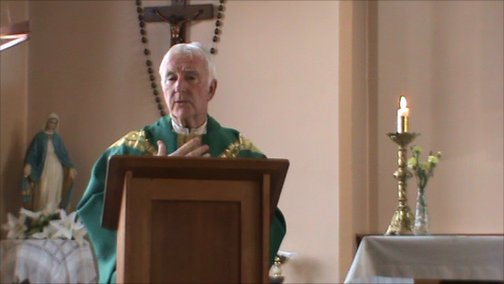
11.07.21 ~ 15th SUNDAY IN ORDINARY TIME
(To hear audio file ~ click here)
Some time ago, an Anglican Vicar friend told me of his frustration on how the Church of England is perceived. If it says something nice about the Royal family, it is praised as a valued part of the British Establishment. If, however, it produces a punchy document about poverty in the inner cities, it comes under attack, and its Bishops are told not to meddle in politics. It also bothered him that many of his people have no concept of the church as a means of growing in faith. For them, going to church is the decent thing to do, from time to time, and has a lot to do with saving the Queen. There’s something similar going on in our first reading today. Amaziah, priest of Bethel, thought of religion only in civil terms – it existed to promote loyalty to the State. His job was to prophesy things that would keep the people sweet. Amos, on the other hand, an outsider, not a priest, saw religion as loyalty to God’s Law. His job was to denounce the religious leaders for their injustices, and for getting rich and fat on the backs of the poor. In a similar way, the apostles, simple fishermen, with no status, no material back-up, and relying entirely on providence, are sent out to preach repentance. Regardless of not being made welcome, or of people refusing to listen, as with Amos, their message must get through.
Throughout history humble and unlikely people have been chosen to be prophets and messengers, to let people know that things are not as they should be. In our own time, see how little Greta Thunberg, in spite of often being ridiculed, has mobilised a whole generation of eco warriors, to help preserve God’s beautiful world for future generations. Prophets will always be needed to remind people of the need for justice, and to echo the call of the gospel to care for the most poor and marginalised. During Covid, it has been wonderful to see a huge upsurge in more care and consideration for others, which we were perhaps losing sight of before. That same sense of justice has led to new thinking about the purpose of the economy, whose focus in recent years has been profits before people. It’s also great to see that through pressure from ordinary people who swamped their MPs inboxes last week, the bill to introduce abortion up to birth has been withdrawn. So maybe, we’re beginning to turn the corner.
While we’re on Covid, one of the downsides is that mental health has become a huge issue. Because it is such an issue, lots of stuff is being written about it. By nature, we are creatures of hope. We are always hoping for things to get better, to be in good health, that our plans will succeed, that there’ll be sunshine tomorrow, that the Government will deliver. But that optimism has been dented by the failure of many of our hopes to be realised. For some it has led to a lack of motivation to carry on after a setback, such as missing exams or losing a job. So, how do we restore hope? When the human being fails, where do you go? Who or what do you put your hope in?
It is easy to see why people despair, but actually, the enemy of hope, the destroyer of optimism, is not despair but false hope, and unrealistic expectations. True hope is about reality. Hope flourishes in difficult times. People need to know that it is possible to be happy in a world of limitation, to live with a certain messiness, and adapt to ever changing circumstances, because not everything depends on me and human institutions. So our job, like that of Amos, is to surprise people with the gift that they didn’t know they needed, to help them to realise that they are missing something. We need to help them to rediscover God. Hope is about finding God at the centre of life.
I’ll leave the last word to Charles Hampton, a pastoral psychologist from Oxford, who says that depression settles on a sufferer, without their quite knowing how or why. He reckons that in the understandable desire to work out what’s going wrong and put it right, we have too much input of ourselves, and lose patience, as we might lose patience with a tiresomely unresponsive relative. This, he says is where religion comes in. We live in a society in which the human being has been placed firmly at the centre, and God at the margins. There is a lack of a sense of the transcendent, of being aware that there is someone greater than me who is in control, that we are not self-sufficient, that we must accept our limitations. Choosing to attend Mass introduces something much other than ourselves, into our inner world, where its mediation comes as a welcome relief. Relating to other Mass goers also strips away the isolation that self-absorption creates. It undoubtedly works. So, there you have it. Spread the word. Coming to Mass is good for your mental health.
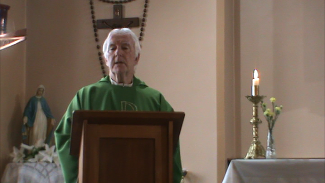
04.07.21 ~ 14th SUNDAY IN ORDINARY TIME
(To hear audio file ~ click here)
A few weeks ago I did something I’ve never done before, skimmed through the business pages of the Sunday Times. Normally it goes straight into the recycling bin, as I have no interest. As I skimmed, an article by James Timpson, of shoe repair fame, caught my eye. He hardly ever mentions his product but puts people at the centre. For example, employees get the day off for their birthday, anniversary or a significant personal milestone, which pays off in increased productivity. Last Sunday his by line was, “Bosses must raise their game to find stars in their ranks”. He says it makes financial sense to develop talent, as successful football clubs do, rather than buy it in from outside. Eg, Phil Foden was recruited by City as a four year old, brought up in the club’s culture and history, and is now one of the world’s most valuable players. At Timpsons, the policy is to find internal employees with the potential to be developed into superstars, thus ensuring a seamless succession.
It’s obvious that James Timpson is on to something, because it works, but I wonder how many other businesses think that way. Certainly, in football, clubs spend millions on a manager from outside the club who is a big name, rather than look at the potential of the Staff they already have. As we have seen with the steady turnover of managers at Chelsea, it doesn’t always work. Yet, if you were to ask the fans what they preferred, they’d probably go for the flash outsider. Those of you who remember Blackadder Goes Forth, may recall the episode where Baldrick and the Tommies go crazy over the dashing, devil- may-care Flying Corps Pilot, while ignoring their rather more boring Army officers.
There are certain things in all I have just said, that I think we can relate to the practice of our faith. In all three scripture readings today there is a common theme – rejection. Ezekiel is rejected by the Israelite rebels. Paul writes about the hardships and persecutions he goes through. Jesus is rejected by the people whom he grew up with. Why are they rejected? Was it because none of them were flashy or exotic enough for people to swoon over? Faith hesitates before the ordinary and familiar. Sometimes God does send us somebody spectacular, like John Pridmore, but most of the time he works through ordinary people like you and me. We know John travels the world speaking to hundreds of people at a time, but if you knew nothing of him and met him in a café, rather than in a church setting, he would be just another big geezer, nothing special, an ordinary bloke, which actually happened last week in a café on the prom. Seeing she was sad, John said to the waitress “I have a feeling that you are troubled”. She had no idea who he was, but burst into floods of tears, which gave John the opportunity to talk about God’s love and mercy. On the strength of what he said, she, the owner and his wife, went to confession to Fr Frankie, for the first time in 30 years. All of them had recognised the unpredictable presence of an ordinary person sent to them by God.
So, don’t ever let the fear of rejection prevent us from sharing God’s good news outside of this building. There’s no promise of success, or that our message will be welcomed. God’s call is simply to be faithful in carrying out our mission, to trust in his strength and not to be over concerned about results. Ezekiel is told to speak to the rebels whether they like it or not. We too have to be out there. On Thursday, a group of us met with the CEO of the NHS, to show her what we are doing for the health and wellbeing of our town. It was important for me to be there, to show that the church is out there in the community, working with people of all religions or none, helping to make life better.
Closer to home, many of you share my concern for our young families. Over the years we have put a lot of effort into encouraging them to feel welcome as baptised members of our family, but with little success in terms of numbers who come. However, we must stay faithful to the call to carry out our mission. Who knows what God may do in his own good time? So, never give up. Keep praying for them. Keep giving the example of an ordinary Catholic staying faithful to the Lord, who comes humbly amongst us, in this very ordinary little part of the world, to nourish us with the bread of life.
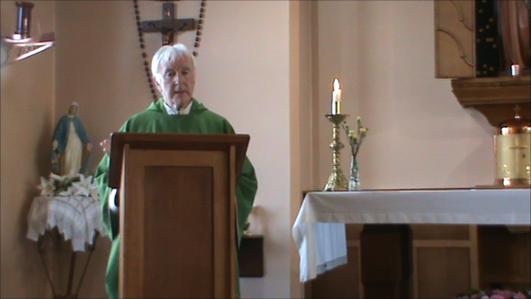
27.06.21 ~ 13th SUNDAY IN ORDINARY TIME
(To hear audio file ~ click here)
In the Sunday Times last week, dotted through its pages, were three articles which caught my eye. The first had a photo of Kylie Jenner, a lady with enormous assets, shall we say, surrounded by empty boxes of Louis Vuitton. Apparently it’s the latest craze. If you can’t afford a Rolex, a Tiffany necklace or a Prada handbag, you can just buy the packaging, and use it as a backdrop to your social media posts, to give the impression that you’ve just been on a high end shopping spree. The second was a portrait made of pixilated squares, on a computer, which a 3yr old could have done. It had just sold for £8.3m. The third was about a new breed of shoe detective, who identifies cheap imitations of trainers by sniffing the glue which binds their soles. A real designer trainer can sell for over £1m. He works in Ruislip, NW London and must be the only legal glue sniffer in England. Has the world gone completely mad, or am I just a little out of touch? Oh by the way, there was a fourth article which did, however, bring a semblance of reality back to the fantasy world we live in today. It was called ‘Banish the Bottle’ and reported that, unable to get their hair dyed throughout lockdown, a huge number of women have embraced their natural grey. Makes me feel a bit of a trend setter!
What’s this got to do with anything, you might ask? Well, it shows the trivial nature of much western culture, where people willingly pay over a million pounds for a pair of Michael Jordan’s trainers, while people in less fortunate parts of the world, try to survive on £1 a day. And what about those countries where many lives are lost to war or oppression, often by their own rulers, as witness Myanmar, North Korea, or Rwanda. In all those places people opposed to the regime are disposed of in a culture of death. In the West, although it’s not so blatant, we too have a culture of death, but it’s more subtle, and is justified under the label of expediency. For example, if an unborn child is an inconvenience, it’s perfectly legal to dispose of it, and, as we know, Euthanasia is next on the cards.
In today’s reading from the Book of Wisdom, we’re told, “God takes no pleasure in the extinction of the living. To be – for this he created all”, and not just to be, but to live life to the full. Life is an adventure. That means taking risks, having faith and launching out into the unknown sometimes, although in our country with health and safety, that’s not always as easy as it sounds. In school, the children were discussing global warming and, as many of them have never seen real snow, I told them how at their age, we used to make a huge slide on the ice in the playground. Of course we fell and hurt ourselves, but still took our turn for another go. I once took our youth club on Derwent water when it was frozen over, and we made sails from the bed sheets to whizz us across the ice. It was dangerous, but it was living, and, as St Irenaeus said “The glory of god is man fully alive”.
In today’s gospel, Jesus shows that he has come to bring life, and bring it to the full, the complete opposite of a culture of death. The lady with the haemorrhage had suffered for twelve years, the length of time the little girl had been alive. Both, it would seem, were beyond help, but at the risk of disappointment or rejection, reached out in faith to Jesus, the lady expressing hers by touching the hem of his robe, the father continuing to believe, despite having been told that his daughter had died. They weren’t rejected or disposed of. Their faith was rewarded with restored health and life.
As I said, there is still a great need for Gospel of Life in our broken world where people gloss over its troubles, by indulging in the kind of trivialities I mentioned earlier. We must stay focused on doing what we can to heal the injustices that cry out to God for healing. We should pester our MPs on pro-life matters and lobby for vaccines and aid to impoverished nations in solidarity with our brothers and sisters. If we try to live a life of service of others rather than wasting money on trivialities, then, when our time comes to turn our toes up, we’ll know we’ve lived a life worth living, and can look forward to meeting Jesus, Lord of life, time and eternity, who showed us in the miracle of Jairus’ daughter that death is only a sleep from which we wake, through faith, to a morning of resurrection.
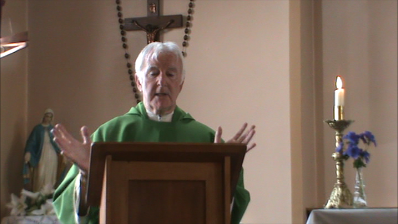
20.06.21 ~ 12th SUNDAY IN ORDINARY TIME
(To hear audio file ~ click here)
On Monday after golf, we were looking at some photos of our early days at seminary, in one of which there was a lad called John Case – we called him Justin. One morning I remember him asking me had I been frightened during the earthquake? He’d leapt out of bed fallen to his knees and prayed as the College shook. I and several others looked at him in mild concern for his mental welfare, as we hadn’t felt a thing. But it was true: an earthquake had taken place the night before, in Lisbon, and the aftershock had indeed reached us in central Spain.
I’m actually a very light sleeper, so how I slept through the earthquake, I really don’t know, There are people who can sleep through anything. It always amazed me in the Army how soldiers could sleep next to a noisy generator or a tank roaring into life. Some would say it was through exhaustion, others because of a good conscience. In the case of Jesus in today’s gospel, fast asleep while the storm rages, we can safely assume a good conscience, but he’s also exhausted, having just finished teaching for several hours at the the lakeside, where there were so many people, that he’d had to get into a boat, so that they could all see and hear him. No surprise then that he fell sound asleep, but a huge surprise as to what happened next.
In the second reading St Paul says "From now on we do not judge anyone by the standards of the flesh, because that’s not the way we know Christ, and for anyone who is in Christ, there’s a new creation". As the apostles unfurled the sails and made ready for cast off, I wonder if for them it was just another day at the office, like roadies packing up after a rock show. Once again they’d seen this man, whom they called their friend, transfix the crowd with a new way of teaching, as he always did. Time to move on, get some rest, have something to eat, as any other band of men would do. Certainly they never foresaw the drama that would soon unfold. If they had, they might have advised him not to set sail. After all, these men, until recently, had made their living from fishing these very waters, so knew their changing moods well.
Be that as it may, the storm did come. As it raged and got worse, they realised the mortal danger they were in, and, unable to believe that Jesus could calmly sleep on, did exactly what we would have done: woke him up. He’s tired and weary, maybe a bit cranky at being woken, as some of us would be. He stands up, rebukes the wind and calms the sea, but then he also rebukes the apostles, amazed at the fact that they thought he didn’t care about them, and would let them drown. “Why were you frightened when you know I am here?”
In that storm at sea, the apostles learnt the truth, in the most dramatic of ways, ‘that for anyone in Christ there is a new creation’. They had judged him by the standards of the flesh, just a man sleeping, apparently at peace, oblivious to the disaster about to befall them. But, once his true nature has been revealed to them by his power over the elements, they were probably more afraid after the storm than during it. “Who can this be? Even the wind and the sea obey him? The apostles came to know Christ in a new way, and for those of us who are in Christ, so must we. Christian living is based on having a relationship with Christ as the focal point of all aspects of our life, even in great danger, or when death is just around the corner. We have to know Christ in a different way than those who judge by appearances, and just think of him as an important man from history.
All of us are familiar with the image of storms in our personal lives, and when a severe one comes along, we may well feel as the apostles in the boat did; ‘Does God not care that I’m sinking, that I’m going under, that I feel completely overwhelmed? And yet, in the midst of it all, we know Jesus is there, even when he doesn’t seem to be around, or able to help. To journey with Jesus is to journey through storms, not to sail round them. This is dangerous work, sometimes. What keeps us going is our strong belief that, in spite of everything, he is Lord, Ruler of chaos, and that there is no storm which his presence in our lives will not calm.
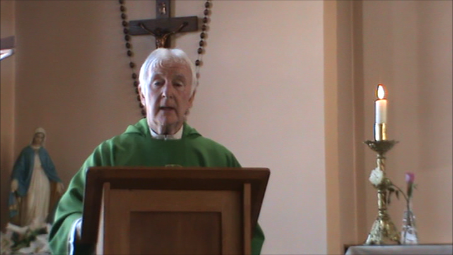
13.06.21 ~ 11th SUNDAY IN ORDINARY TIME
(To hear audio file ~ click here)
As I was shaving the other morning, there was a fascinating article on the news. It was a report about a scientist’s 20 year quest to defeat Dengue fever, a disease transmitted by mosquitos, for which there’s no cure and which kills about 50,000 people every year. Unbelievably, he has managed to successfully inject millions of mosquitos with a bacteria, which prevents them carrying the dengue virus, and released them into tropical areas, to mate with the wild mosquito population. The results have been phenomenal, a 77% reduction in infections. That news item was quite low in the pecking order and only lasted about three minutes. Do you know what was above it? The world-shattering news that Harry and Meghan may not have asked the Queen for permission to call their child Lilibet.
In our populist culture, where the rich and famous draw the banner headlines, it is easy to miss good news stories about things going on in the background, unheralded and given little attention. Yet for all our fascination with frivolous celebrity, where would we be without the steady growth of progress being made, for example by that scientist, beavering away for years, under the radar?
Today’s parable has a lot to say about progress under the radar in relation to the Church. Many articles you read today talk of its decline and the fall in numbers attending. Some people look back to the Church Triumphant of the 50s and sigh for the good old days, in a similar way to people who mourn the loss of Empire. Once we ruled the world. Now Putin calls us just an insignificant little island? Once the Church was the unassailable Rock. Now, as a result of scandal, more open to attack. But, in spite of our loss of status in the eyes of the world, God’s work still goes on in the background, in a Church which Pope Francis is trying very hard to make more humble, less concerned with status, more concerned with service. In “Let us Dream” he talks of “Our culture’s unthinking obsession with GDP, as the single overriding goal of economists and policy makers, which makes vast profits for shareholders, instead of creating an economy which helps to lift people out of poverty to participate in society and survive – an economy which sustains, protects and regenerates our Common Home”.
So, the Church is still here, as Christ promised it always will be –“The gates of Hell shall never prevail against it”, albeit not so high profile. But, we’ve been through times like this before. Here in England, when the whole country took against us, the Faith survived in secret, hidden like the seed growing deep down in the soil, but is now very much part of mainstream Christianity. So, keep calm and carry on. The parable tells us that the kingdom of God will come about, in God’s good time and by God’s means. All we need do is have faith and trust. However, we have to be careful about this parable, in that it could give the impression that human beings have no part to play in the process, and just reap the harvest. But that’s not true: the farmer had to plant the seed and water the ground. So we too have to plant the word of God and water it, confident it will flourish even if we don’t see any growth.
As you know I worry all the time about the absence from Mass of so many of our young parents. How can we have a future if they don’t water the seed of faith their child received in Baptism? But, what we do know is that, in spite of his apparent inactivity, God does not cease to act, and continues to call us to conversion. So, I don’t give up hope that one day, perhaps, they will hear his call. In one of my Army postings, I reaped a huge harvest of ten converts as a result of their spouses’ faith. No preaching, no fuss, just their consistency of coming to Mass every week, over the years, allowing the seed of faith planted deep within their hearts to quietly inspire a life of faith in their other halves.
What the parable teaches us is patience: that we’re in for the long haul. When Jesus talks to the apostles about the coming of the kingdom, he doesn’t give them dates or times, because it’s already here, bubbling under all the time, like the seed the farmer sowed. All he guarantees is that in spite of its lowly beginnings, like the mustard seed, the kingdom will grow and flourish to exceed every hope.
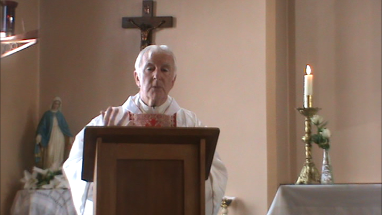
06.06.21 ~ CORPUS CHRISTI
(To hear audio file ~ click here)
I’m sure we’re all familiar with the saying, “There’s no such thing as a free meal”. When we use that expression we are implying that there has to be a catch. However, I’m also sure that, like me, you have probably had many a free meal where there simply is no catch. You are invited not just for food but to share something of the life of your hosts; the meal is almost incidental to the company. Families like to eat together, not just to make sure that the children eat their vegetables, but to enjoy being a family. Through shared meals a bond is formed.
When God wanted to bond himself to us, he also did it through a meal, albeit a very special one, the Last Supper. This wasn’t the first time he had tried to do this. Other bonds had been attempted and failed. In his relationship with the Chosen People, the covenant was sealed by God’s Word on the one hand, and the blood of a sacrificed animal on the other, making it a communion or bonding sacrifice. In every covenant God made with them, blood was the key element of the bond. The reason blood was so important is that it identified with the whole creature, not just what flowed through its veins and arteries. In other words, it signified life itself – it was sacred. That’s why the people were forbidden to eat flesh with blood in it. Koshe meat still today has to be drained of blood before it can be eaten by observant Jews.
In today’s reading from Exodus, half the blood of the sacrificed animals was poured over the altar, representing God, the other half was sprinkled over the people. Because it was the same blood, it bound God and the people in a covenant: both were committed to each other. As I said earlier, throughout their history, many such covenants were made and sealed in a blood sacrifice. Even in Jesus’ time, first-born sons had to be redeemed by the blood of a lamb or a pair of turtle doves.
But, in today’s gospel, we see a complete change from those covenants sealed by the blood of sacrificed animals. At the Last Supper Jesus took bread and wine and declared, “This is my Body, this is my Blood”. His words and actions were an advance notice of what he was going to do the next day, which was to become the sacrificial victim himself. His blood, his very life itself, would be poured out to establish, and seal, the new and everlasting Covenant with God, which could never be broken, regardless of man’s failure to live up to his side of the bargain.
In the Old Testament, people did not have direct access to God. Only the High Priest could enter the Holy of Holies in the Temple, and that on only one day of the year. But, as it says in the reading from Hebrews, “Christ, as the High Priest of all the blessings which were to come, has entered the sanctuary once and for all, taking with him not the blood of goats and bull calves, but his own blood, having won an eternal redemption for us”. So, he has direct access to God, in fact is in full union with him, and, because it is his very own blood which he gives us to drink, complete union with God is also possible for us. Each time we eat his flesh and drink his blood we have within us his whole Body, Blood, Soul and Divinity.
It’s God’s greatest gift to us, a pledge of love that he will be with us till the end of time. Every time the Mass is celebrated, he becomes really and truly present on the altar. “This is my Body broken for you: this is my Blood poured out for you.” The Eucharist draws us ever more close to Jesus, and, as we said earlier about the social effects of meals, closer to each other, working in harmony as parts of his body. Although we’re all different parts of his body, the Church, spread to all four corners of the world, what unites us with every other Catholic in the world is the Real Presence of Christ in the Blessed Sacrament, worshipped and adored in our communities, and received in Holy Communion. “Do this in memory of me” he said, something we’ve done ever since that first Mass in the Upper Room, and will do till he comes again. “The Eucharist is the source and summit of Catholic Life.”
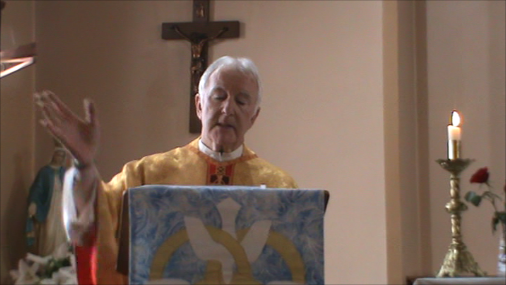
30.05.21 ~ TRINITY SUNDAY
(To hear audio file ~ click here)
Life is full of mysteries. Some might say life itself is a mystery. Be that as it may, most people would agree that some things in life are very perplexing indeed, for example golf. I’ve just had a few days at Slaley Hall. The weather was atrocious, but my golf was worse. I couldn’t put two shots together. The mystery for me is that, apart from cricket, I’ve always been fairly good at ball games, such as squash, tennis, football and rugby, but never quite mastered the golf ball. After years of pondering, I have solved the mystery. It’s because every shot is made with a dead ball. There is no chance to react naturally to a moving ball as in other sports. That means you need bags of concentration and attention to detail. Stance, grip, position of feet and hands, all are vital to getting the swing right. Make one mistake and off it goes, sliced out of bounds, hooked into trees, topped into a bunker or thinned into the pond. It’s not good for morale, if you see people diving for cover, when you address the ball. What’s even worse is that, unlike other ball games, you can’t blame anybody else.
As I say, golf is one of life’s mysteries, but it’s not an important one, not remotely like the mystery at the heart of today’s feast, the Blessed Trinity, Three Persons in one God. This is the fundamental mystery of Faith, which underlines the way we live and move and have our being. Like all mysteries it needs a great deal of pondering and concentration. Nobody has yet solved it, and nobody ever will, but many great minds have tried to make it user friendly, by showing that the most important thing is not to be able to explain the relationship between the three Persons, but to be drawn into it.
Naturally, I don’t claim to have the answer to the mystery either, but my idea of how we might be drawn into it, is to look at other relationships, for example, the everyday experience of a young couple falling in love. When a young man and woman are first attracted to each other, it is because there is a spark of interest, over and above what they see in the hundreds of other young men and women they meet. If that interest continues to grow, by spending more time together, the spark may ignite into a warm relationship. If that goes well, it may fire up into engagement and marriage, in which it becomes a flame of energy, spent in making a home, having babies, pursuing a career, taking the children to after-school clubs, and trying to fit a thousand things that need doing into a day. Then, one day, suddenly the children are grown up and gone, so the flame dies down to a less frantic existence: that is, until the grandchildren come along, when they then become the great unpaid babysitters and childminders. Old age is next on the list, in which words are no longer always necessary, in order to enjoy the warm glow of each other’s presence and company.
In this example, I’ve tried to show that the initial spark has come a long way. The spark is, of course, the spirit of love, which first attracted them to each other, sustained and motivated them through those frantic years, in good times and bad, joys and sorrows, and which now holds them together in their old age. Love, with its motivating power, has, to all intents and purpose, been the third person in their relationship, its life and soul, the real presence of the unseen spirit, the one Constant. And, of course, even when we lose the one we love, we know that love never dies.
The life of the Trinity, the relationship between the three Persons, is a bit like that, but much more intense. Father and Son are bound together by the Holy Spirit in such a powerful way, that the Spirit can be described as the Third Person in the relationship or, put another way, Love Personified, without which God could not exist. Now, because the Son of God became one of us, fully human without ceasing to be God, it follows that we are part of that relationship too, as is every other human being. We all have an immortal soul, a share of God’s spirit within us. As St John says, “God is love and the one who lives in love, lives in God and God lives in him”. So, when Jesus gives us his two simple commandments, he’s actually stating the obvious – “If you love God and love your neighbour as yourself, you are actually doing the same thing”, and that’s no mystery!
MARIA DOHERTY, 24/07/2020